- 1) अंतर में आनंद आयो
- 2) अंतर
- 3) अपना ही रंग मोहे
- 4) अभिनंदन--जगदानंदन
- 5) अरिहंत देव स्वामी शरण
- 6) अशरण जग में चंद्रनाथ जी
- 7) अशरीरी सिद्ध भगवान
- 8) आओ जिनमंदिर में आओ
- 9) आओ दिखायें हम शुभ नगरी
- 10) आगया शरण तिहारी आगया
- 11) आज खुशी तेरे दर्शन की
- 12) आज हम जिनराज
- 13) आदिनाथ--गाएँ जी गाएँ
- 14) आदिनाथ--जपलो रे आदीश्वर
- 15) आदिनाथ--देखो जी आदिश्वर
- 16) आदिनाथ--म्हारा आदीश्वर
- 17) आया तेरे दरबार में
- 18) आये आये रे जिनंदा
- 19) आयो आयो रे हमारो
- 20) एक तुम्हीं आधार हो
- 21) ओ जगत के शांति दाता
- 22) कभी वीर बनके
- 23) कर लो जिनवर का गुणगान
- 24) करता रहूँ गुणगान
- 25) करता हूं तुम्हारा सुमिरन
- 26) करुणा सागर भगवान
- 27) कुंथुनाथ--कुंथुन के प्रतिपाल
- 28) केसरिया केसरिया
- 29) कैसा अद्भुत शान्त स्वरूप
- 30) कैसी सुन्दर जिन प्रतिमा
- 31) कोई इत आओ जी
- 32) गंगा कल कल स्वर में
- 33) गा रे भैया
- 34) चंद्रनाथ--चंद्रानन
- 35) चंद्रनाथ--निरखत जिन चंद्रवदन
- 36) चरणों में आया हूं
- 37) चाँदनी फीकी पड़ जाए
- 38) चाह मुझे है दर्शन की
- 39) जपि माला जिनवर
- 40) जब कोई नहीं आता
- 41) जय जय जय जिनवर जी मेरी
- 42) जयवंतो जिनबिम्ब
- 43) जिन ध्याना गुण गाना
- 44) जिन पूजन कर लो ये ही
- 45) जिन मंदिर में आके हम
- 46) जिनजी के दरश मिले
- 47) जिनदेव से कीनी जाने प्रीत
- 48) जिनवर की भक्ति करेगा
- 49) जिनवर की वाणी में म्हारो
- 50) जिनवर की होवे जय जयकार
- 51) जिनवर तू है चंदा तो
- 52) जिनवर दरबार तुम्हारा
- 53) जो पूजा प्रभु की रचाता
- 54) झीनी झीनी उडे रे
- 55) तिहारे ध्यान की मूरत
- 56) तुम जैसा मैं भी
- 57) तुम्हारे दर्श बिन स्वामी
- 58) तुम्ही हो ज्ञाता
- 59) तू ज्ञान का सागर है
- 60) तेरी छत्रछाया भगवन् मेरे
- 61) तेरी परम दिगंबर मुद्रा को
- 62) तेरी शांत छवि
- 63) तेरी शीतल शीतल मूरत
- 64) तेरी सुंदर मूरत
- 65) तेरे दर्शन को मन
- 66) तेरे दर्शन से मेरा
- 67) दया करो भगवन् मुझपर
- 68) दयालु प्रभु से दया
- 69) दरबार तुम्हारा मनहर है
- 70) दिन रात स्वामी तेरे गीत
- 71) धन्य धन्य आज घडी
- 72) ध्यान धर ले प्रभू को
- 73) ना जिन द्वार आये ना
- 74) नाथ तुम्हारी पूजा
- 75) नाम तुम्हारा तारणहारा
- 76) निरखी निरखी मनहर
- 77) निरखो अंग अंग जिनवर
- 78) नेमि जिनेश्वर
- 79) नेमिनाथ--नेमिप्रभू की श्यामवरन
- 80) नेमिनाथ--रोम रोम में नेमि
- 81) नेमिनाथ--शौरीपुर वाले
- 82) पंचपरम परमेष्ठी
- 83) पद्मप्रभु--पद्मसद्म
- 84) पारसनाथ--चवलेश्वर पारसनाथ
- 85) पारसनाथ--तुमसे लागी लगन
- 86) पारसनाथ--पारस प्यारा लागो
- 87) पारसनाथ--पारस प्रभु का
- 88) पारसनाथ--पार्श्व प्रभुजी पार
- 89) पारसनाथ--मंगल थाल सजाकर
- 90) पारसनाथ--मेरे प्रभु का पारस
- 91) पारसनाथ--मैं करूँ वंदना
- 92) प्रभु दर्शन कर जीवन की
- 93) प्रभु हम सब का एक
- 94) प्रभुजी अब ना भटकेंगे
- 95) प्रभुजी मन मंदिर में आओ
- 96) बाहुबली भगवान
- 97) भगवान मेरी नैया उस
- 98) भटके हुए राही को
- 99) भावना की चूनरी
- 100) मंगल अरिहंत मंगल
- 101) मन ज्योत जला देना प्रभु
- 102) मन तड़फत प्रभु दरशन
- 103) मन भाये चित हुलसाये
- 104) मनहर तेरी मूरतियाँ
- 105) मनहर मूरत जिनन्द निहार
- 106) महाराजा स्वामी
- 107) महावीर--आज मैं महावीर
- 108) महावीर--आये तेरे द्वार
- 109) महावीर--एक बार आओ जी
- 110) महावीर--जय बोलो त्रिशला
- 111) महावीर--तुझे प्रभु वीर कहते
- 112) महावीर--मस्तक झुका के
- 113) महावीर--वर्तमान को वर्धमान
- 114) महावीर--वर्धमान ललना से
- 115) महावीर--वीर प्रभु के ये बोल
- 116) महावीर--हरो पीर मेरी
- 117) महावीर--हे वीर तुम्हारे
- 118) महावीर स्वामी
- 119) मिलता है सच्चा सुख
- 120) मूरत है बनी प्रभु की प्यारी
- 121) मेरे मन मंदिर में आन
- 122) मेरे सर पर रख दो
- 123) मैं तेरे ढिंग आया रे
- 124) मैं ये निर्ग्रंथ प्रतिमा
- 125) रंग दो जी रंग जिनराज
- 126) रंगमा रंगमा
- 127) रोम रोम पुलकित हो जाये
- 128) रोम रोम से निकले
- 129) लिया प्रभू अवतार जयजयकार
- 130) वासुपूज्य--जय जिन वासुपूज्य
- 131) वीतरागी देव
- 132) शुद्धातम की बात बता दो
- 133) श्री अरहंत सदा मंगलमय
- 134) श्री अरिहंत छवि लखिके
- 135) श्री जिनवर पद ध्यावें जे
- 136) सच्चे जिनवर सच्चे सारे
- 137) सांची कहें तोहरे दर्शन से
- 138) सुरपति ले अपने शीश
- 139) स्वर्ग से सुंदर अनुपम
- 140) हम यही कामना करते हैं
- 141) हे जिन तेरे मैं शरणै
- 142) हे जिन मेरी ऐसी बुधि
- 143) हे ज्ञान सिन्धु भगवान
- 144) हे प्रभो चरणों में
- 145) है कितनी मनहार बहती
- 1) अमृतझर झुरि झुरि आवे
- 2) इतनी शक्ति हमें देना माता
- 3) ओंकारमयी वाणी तेरी
- 4) करता हूं मैं अभिनंदन
- 5) चरणों में आ पडा हूं
- 6) जब एक रत्न अनमोल
- 7) जिन बैन सुनत मोरी
- 8) जिनवर की वाणी से
- 9) जिनवर चरण भक्ति वर गंगा
- 10) जिनवाणी अमृत रसाल
- 11) जिनवाणी को नमन करो
- 12) जिनवाणी जग मैया
- 13) जिनवाणी माँ आपका शुभ
- 14) जिनवाणी माँ जिनवाणी माँ
- 15) जिनवाणी माँ तेरे चरण
- 16) जिनवाणी माता दर्शन की
- 17) जिनवाणी माता रत्नत्रय निधि
- 18) जिनवाणी माता से बोले आतम नन्द लाला
- 19) जिनवाणी मोक्ष नसैनी है
- 20) जिनवाणी सुन उपदेशी
- 21) जिनवानी जान सुजान
- 22) तू कितनी मनहर है
- 23) धन्य धन्य जिनवाणी माता
- 24) धन्य धन्य वीतराग वाणी
- 25) नित्य बोधिनी माँ जिनवाणी
- 26) परम उपकारी जिनवाणी
- 27) प्राणां सूं भी प्यारी लागे
- 28) भवदधि तारक नवका जगमाहीं
- 29) मंगल बेला आई आज श्री
- 30) मन भाया, तेरे दर आया
- 31) महिमा है अगम
- 32) माँ जिनवाणी ज्ञायक बताय
- 33) माँ जिनवाणी तेरो नाम
- 34) माँ जिनवाणी बसो हृदय में
- 35) माता तू दया करके
- 36) मीठे रस से भरी जिनवाणी
- 37) म्हारी माँ जिनवाणी
- 38) ये शाश्वत सुख का प्याला
- 39) वीर हिमाचल तें निकसी
- 40) शरण कोई नहीं जग में
- 41) शांती सुधा बरसाये
- 42) शास्त्रों की बातों को मन
- 43) सांची तो गंगा
- 44) सारद तुम परसाद तैं
- 45) सीमंधर मुख से
- 46) सुन जिन बैन श्रवन सुख
- 47) सुन सुन रे चेतन प्राणी
- 48) हम लाए हैं विदह से
- 49) हमें निज धर्म पर चलना
- 50) हे जिनवाणी माता तुमको
- 51) हे शारदे माँ
- 1) उड़ चला पंछी रे
- 2) ऐसा योगी क्यों न अभयपद
- 3) ऐसे मुनिवर देखें
- 4) ऐसे साधु सुगुरु कब
- 5) कबधौं मिलै मोहि श्रीगुरु
- 6) गुरु निर्ग्रन्थ परिग्रह त्यागी
- 7) गुरु रत्नत्रय के धारी
- 8) गुरु समान दाता नहिं
- 9) गुरुदेव आये रे बड़े ही सौभाग्य से
- 10) गुरुवर तुम बिन कौन
- 11) जंगल में मुनिराज अहो
- 12) धनि हैं मुनि निज आतमहित
- 13) धन्य धन्य हे गुरु गौतम
- 14) धन्य मुनिराज हमारे हैं
- 15) धन्य मुनीश्वर आतम हित में
- 16) नित उठ ध्याऊँ गुण गाऊँ
- 17) निर्ग्रंथों का मार्ग
- 18) परम गुरु बरसत ज्ञान झरी
- 19) परम दिगम्बर मुनिवर देखे
- 20) परम दिगम्बर यती
- 21) मुनि दीक्षा लेके जंगल में
- 22) मुनिवर आज मेरी कुटिया में
- 23) मुनिवर को आहार
- 24) मैं परम दिगम्बर साधु
- 25) मोक्ष के प्रेमी हमने
- 26) म्हारा परम दिगम्बर मुनिवर
- 27) म्हारे आंगणे में आये मुनिराज
- 28) वनवासी सन्तों को नित ही
- 29) वे मुनिवर कब मिली हैं उपगारी
- 30) वेष दिगम्बर धार
- 31) शान्ति सुधा बरसा गये
- 32) शुद्धातम तत्व विलासी रे
- 33) श्री मुनि राजत समता संग
- 34) संत साधु बन के विचरूँ
- 35) सम आराम विहारी साधुजन
- 36) सिद्धों की श्रेणी में आने वाला
- 37) हे परम दिगम्बर यति
- 38) है परम दिगम्बर मुद्रा जिनकी
- 39) होली खेलें मुनिराज शिखर
- 1) आजा अपने धर्म की तू राह में
- 2) आप्त आगम गुरुवर
- 3) जय जिनेन्द्र बोलिए सर्व
- 4) जय जिनेन्द्र बोलिए
- 5) जिनशासन बड़ा निराला
- 6) जैन धर्म के हीरे मोती
- 7) बडे भाग्य से हमको मिला जिन धर्म
- 8) भावों में सरलता रहती है
- 9) मैं महापुण्य उदय से जिनधर्म
- 10) ये धरम है आतम ज्ञानी का
- 11) ये धर्म हमारा है हमें
- 12) लहर लहर लहराये केसरिया झंडा
- 13) लहराएगा लहराएगा झंडा
- 14) श्रीजिनधर्म सदा जयवन्त
- 15) सब जैन धर्म की जय बोलो
- 16) हर पल हर क्षण हर दम
- 1) आज गिरिराज निहारा
- 2) ऊंचे ऊंचे शिखरों वाला 1
- 3) ऊंचे ऊंचे शिखरों वाला 2
- 4) ऊंचे शिखरों पे बसा है
- 5) गगन मंडल में उड जाऊं
- 6) चलो सब मिल सिधगिरी
- 7) चांदखेड़ी ले चालो जी सांवरिया
- 8) जीयरा...जीयरा...जीयरा
- 9) नमो आदीश्वरम
- 10) नर तन रतन अमोल
- 11) नेमीनाथ--जहाँ नेमी के चरण
- 12) पारसनाथ--मधुबन के मंदिरों
- 13) पारसनाथ--सांवरिया पारसनाथ
- 14) पूजा पाठ रचाऊँ मेरे बालम
- 15) रे मन भज ले प्रभु का नाम
- 16) विश्व तीर्थ बडा प्यारा
- 17) सम्मेद शिखर पर मैं जाऊंगा
- 1) आदिनाथ--आज तो बधाई
- 2) आदिनाथ--आज नगरी में जन्मे
- 3) आदिनाथ--ऋषभदेव जनम्यौ
- 4) आदिनाथ--लिया रिषभ देव
- 5) आनंद अवसर आज सुरगण
- 6) आया पंच कल्याणक महान 2
- 7) आया पंच कल्याणक महान
- 8) आयो आयो पंचकल्याणक भविजन
- 9) इन्द्र नाचे तेरी भक्ति में
- 10) उड़ उड़ रे म्हारी ज्ञान चुनरियाँ
- 11) कल्पद्रुम यह समवसरण है
- 12) गर्भ कल्याणक आ गया
- 13) गावो री बधाईयां
- 14) घर घर आनंद छायो
- 15) चन्द्रोज्वल अविकार स्वामी जी
- 16) जागो जी माता जागन घड़ियाँ
- 17) झुलाय दइयो पलना
- 18) तेरे पांच हुये कल्याण प्रभु
- 19) दिन आयो दिन आयो
- 20) नाचे रे इन्दर देव
- 21) नेमिनाथ--गिरनारी पर तप
- 22) नेमिनाथ--जूनागढ़ में सज
- 23) नेमिनाथ--पंखिडा रे उड के आओ
- 24) नेमिनाथ--रोम रोम में नेमि
- 25) नेमिनाथ--विषयों की तृष्णा
- 26) पंखिड़ा तू उड़ के जाना स्वर्ग
- 27) पंचकल्याण मनाओ मेरे साथी
- 28) पारसनाथ--आज जन्मे हैं तीर्थंकर
- 29) पारसनाथ--आनंद अंतर मा आज
- 30) पारसनाथ--झूल रहा पलने में
- 31) पालकी उठाने का हमें अधिकार है
- 32) मंगल ये अवसर आंगण
- 33) महावीर--कुण्डलपुर में वीर हैं
- 34) महावीर--कुण्डलपुर वाले
- 35) महावीर--छायो रे छायो आनंद
- 36) महावीर--जनम लिया है महावीर
- 37) महावीर--जहाँ महावीर ने जन्म
- 38) महावीर--दिव्य ध्वनि वीरा
- 39) महावीर--देखा मैंने त्रिशला का
- 40) महावीर--पंखिडा रे उड के आओ
- 41) महावीर--बधाई आज मिल गाओ
- 42) महावीर--बाजे कुण्डलपुर में
- 43) महावीर--मणियों के पलने में
- 44) महावीर--मेरे महावीर झूले पलना
- 45) महावीरा झूले पलना
- 46) माता थारी परिणति तत्त्वमयी
- 47) मेरा पलने में
- 48) मोरी आली आज बधाई गाईयाँ
- 49) म्हारे आंगण आज आई
- 50) ये महामहोत्सव पंच कल्याणक
- 51) लिया प्रभू अवतार जयजयकार
- 52) सुरपति ले अपने शीश
- 53) स्वागत करते आज तुम्हारा
- 54) हो संसार लगने लगा अब
- 1) करना मन ध्यान महामंत्र
- 2) जप जप रे नवकार मंत्र
- 3) जप ले मंत्र सदा नवकार
- 4) जय जय जय कार परमेष्ठी
- 5) जो मंगल चार जगत में हैं
- 6) णमो अरिहंताणं णमो सिद्धाणं
- 7) णमोकार नाम का ये कौन मंत्र
- 8) णमोकार मंत्र
- 9) णमोकार मन्त्र को प्रणाम हो
- 10) नमन हमारा अरिहंतों को
- 11) नवकार मंत्र रागों में
- 12) पंच परम परमेष्ठी देखे
- 13) बने जीवन का मेरा आधार रे
- 14) मंत्र जपो नवकार मनुवा
- 15) मंत्र नवकार हमें प्राणों से प्यारा
- 16) मंत्र नवकारा हृदय में धर
- 17) महामंत्र णमोकार की रचना
- 18) म्हारा पंच प्रभु भगवान
- 19) ये तो सच है कि नवकार
- 20) श्री अरिहंत सदा मंगलमय
- 21) समरो मन्त्र भलो नवकार
- 1) अध्यात्म के शिखर पर
- 2) अपना करना हो कल्याण
- 3) अपनी सुधि पाय आप
- 4) अपने घर को देख बावरे
- 5) अपने में अपना परमातम
- 6) अब गतियों में नाहीं रुलेंगे
- 7) अब मेरे समकित सावन
- 8) अब हम अमर भये
- 9) अरे मोह में अब ना
- 10) आ तुझे अंतर में शांति मिलेगी
- 11) आओ झूलें मेरे चेतन
- 12) आओ रे आओ रे ज्ञानानंद की
- 13) आज खुशी है आज खुशी है
- 14) आज सी सुहानी
- 15) आतम अनुभव आवै
- 16) आतम अनुभव करना रे भाई
- 17) आतम अनुभव कीजै हो
- 18) आतम जानो रे भाई
- 19) आतमरूप अनूपम है
- 20) आतमरूप सुहावना
- 21) आत्म चिंतन का ये समय
- 22) आत्मा अनंत गुणों का धनी
- 23) आत्मा हमारा हुआ है क्यों काला
- 24) आत्मा हूँ आत्मा हूँ आत्मा
- 25) आनंद स्रोत बह रहा
- 26) आया कहां से
- 27) आर्जव--काहे पाप करे काहे छल
- 28) इस नगरी में किस विधि
- 29) उड़ उड़ रे म्हारी ज्ञान
- 30) ऐ आतम है तुझको नमन
- 31) ऐसे जैनी मुनिमहाराज
- 32) ऐसो नरभव पाय गंवायो
- 33) ओ जाग रे चेतन जाग
- 34) ओ जाननहारे जान जगत है
- 35) ओ जीवड़ा तू थारी
- 36) ओ प्यारे परदेशी पन्छी
- 37) कंकड़ पत्थर गले लगाए
- 38) कबधौं सर पर धर डोलेगा
- 39) कबै निरग्रंथ स्वरूप धरूंगा
- 40) कर कर आतमहित रे
- 41) करलो आतम ज्ञान परमातम
- 42) कहा मान ले ओ मेरे भैया
- 43) कहा मानले ओ मेरे भैया
- 44) कहाँ तक ये मोह के अंधेरे
- 45) किसको विपद सुनाऊँ हे नाथ
- 46) कृत पूरब कर्म मिटे
- 47) केवलिकन्ये वाङ्गमय
- 48) कैसो सुंदर अवसर आयो है
- 49) कोई राज महल में रोए
- 50) कोई लाख करे चतुराई
- 51) कौलो कहूँ स्वामी बतियाँ
- 52) क्या तन मांझना रे
- 53) क्यूं करे अभिमान जीवन
- 54) क्षणभंगुर जीवन है पगले
- 55) गाडी खडी रे खडी रे तैयार
- 56) गुरुवर जो आपने बताया
- 57) घटमें परमातम ध्याइये
- 58) चंद दिनों का जीना रे जिवड़ा
- 59) चतुर नर चेत करो भाई
- 60) चन्द क्षण जीवन के तेरे
- 61) चन्द्रगुप्त राजा के सोलह स्वप्न
- 62) चलता चल भाई मोक्षमार्ग
- 63) चलो रे भाई अपने वतन
- 64) चेतन अपनो रूप निहारो
- 65) चेतन चेत बुढ़ापो आयो रे
- 66) चेतन जाग रे
- 67) चेतन तूँ तिहुँ काल अकेला
- 68) चेतन नरभव ने तू पाकर
- 69) चेतन है तू ध्रुव
- 70) चेतना लक्षणम् आनंद
- 71) चेतो चेतन निज में आओ
- 72) चैतन्य के दर्पण में
- 73) चैतन्य मेरे निज ओर चलो
- 74) जगत में सम्यक उत्तम
- 75) जन्म जन्म तन धरने
- 76) जब चले आत्माराम
- 77) जहां सत्संग होता है
- 78) जानत क्यों नहिं रे
- 79) जाना नहीं निज आत्मा ज्ञानी
- 80) जायें तो जायें कहाँ ढूंढ
- 81) जिंदगी में घड़ी यह सुहानी
- 82) जिंदगी रत्न अनमोल है
- 83) जिया कब तक उलझेगा
- 84) जीव! तू भ्रमत सदैव
- 85) जीव तू समझ ले आतम
- 86) जीवन के किसी भी पल में
- 87) जीवन के परिनामनि की
- 88) जीवड़ा सुनत सुणावत इतरा
- 89) जैन धरम के हीरे मोती
- 90) जो अपना नहीं उसके अपनेपन
- 91) जो आज दिन है वो
- 92) जो इच्छा का दमन
- 93) जो जो देखी वीतराग
- 94) ज्ञानमय ओ चेतन तुझे
- 95) ज्ञानी का धन ज्ञान
- 96) ज्ञानी की ज्ञान गुफा में
- 97) तन पिंजरे के अन्दर बैठा
- 98) तू जाग रे चेतन देव
- 99) तू जाग रे चेतन प्राणी
- 100) तू निश्चय से भगवान
- 101) तू ही शुद्ध है तू ही
- 102) तेरे अंतर में भगवान है
- 103) तोड़ विषयों से मन
- 104) तोरी पल पल
- 105) तोड़ दे सारे बंधन सदा के लिए
- 106) थाने सतगुरु दे समुझाय
- 107) थोड़ा सा उपकार कर
- 108) दिवाली--अबके ऐसी दीवाली
- 109) देख तेरी पर्याय की हालत
- 110) देखा जब अपने अंतर को
- 111) देखो भाई आतमराम
- 112) देखोजी प्रभु करमन की
- 113) धन धन जैनी साधु
- 114) धनि ते प्रानि जिनके
- 115) धन्य धन्य है घड़ी आज
- 116) धिक धिक जीवन
- 117) धोली हो गई रे काली कामली
- 118) नर तन को पाकर के
- 119) निजरूप सजो भवकूप तजो
- 120) नेमिनाथ--नेमि पिया राजुल
- 121) परणति सब जीवन
- 122) परम गुरु बरसत ज्ञान झरी
- 123) परिग्रह डोरी से झूठ
- 124) परिणामों से मोक्ष प्राप्त हो
- 125) पल पल बीते उमरिया
- 126) पाना नहीं जीवन को
- 127) पाप मिटाता चल ओ बंधू
- 128) पावन हो गई आज ये धरती
- 129) पीजे पीजे रे चेतनवा पानी
- 130) पुद्गल का क्या विश्वासा
- 131) प्यारे काहे कूं ललचाय
- 132) प्रभु पै यह वरदान
- 133) प्रभु शांत छवि तेरी
- 134) बेला अमृत गया आलसी सो रहा
- 135) भगवंत भजन क्यों
- 136) भरतजी घर में ही वैरागी
- 137) भला कोई या विध मन
- 138) भले रूठ जाये ये सारा
- 139) भले रूठ जाये ये सारा
- 140) भव भव के दुखड़े हजार
- 141) भूल के अपना घर
- 142) मतवाले प्रभु गुण गाले
- 143) मन महल में दो
- 144) ममता की पतवार ना तोडी
- 145) ममता तू न गई मोरे
- 146) महावीर--वीर भज ले रे
- 147) माया में फ़ंसे इंसान
- 148) मार्दव--मान न कीजिये हो
- 149) मितवा रे सुवरण अवसर
- 150) मुझे है स्वामी उस बल
- 151) मुसाफिर क्यों पड़ा सोता
- 152) मेरा आज तलक प्रभु
- 153) मेरे शाश्वत शरण
- 154) मैं ऐसा देहरा बनाऊं
- 155) मैं क्या माँगू भगवान
- 156) मैं ज्ञान मात्र बस ज्ञायक हूँ
- 157) मैं ज्ञानानंद स्वभावी हूं
- 158) मैं दर्शन ज्ञान स्वरूपी हूं
- 159) मैं निज आतम कब
- 160) मैं राजा तिहुं लोक का
- 161) मैं हूँ आतमराम
- 162) मैनासुंदरी कहे पिता से
- 163) मोको कहाँ ढूंढें बन्दे
- 164) मोक्ष पद मिलता है धीरे धीरे
- 165) मोह की महिमा देखो
- 166) मोहे भावे न भैया थारो देश
- 167) म्हारा चेतन ज्ञानी घणो
- 168) यही इक धर्ममूल है
- 169) या संसार में कोई सुखी
- 170) ये प्रण है हमारा
- 171) ये शाश्वत सुख का प्याला
- 172) ये सर्वसृष्टि है नाट्यशाला
- 173) लुटेरे बहुत देखे हैं
- 174) वन्दे जिनवरम्
- 175) विराजै रामायण घटमाहिं
- 176) वीर जिनेश्वर अब तो मुझको
- 177) शुद्धात्मा का श्रद्धान
- 178) शौच--मूंजी धरी रहेली
- 179) संसार महा अघसागर
- 180) संसार में सुख सर्वदा
- 181) सजधज के जिस दिन
- 182) सन्त निरन्तर चिन्तत
- 183) सब जग को प्यारा
- 184) समकित सुंदर शांति अपार
- 185) समझ आत्मा के स्वरूप को
- 186) समझ मन स्वारथ का संसार
- 187) सहजानन्दी शुद्ध स्वभावी
- 188) साधना के रास्ते आत्मा के
- 189) सिद्धों से मिलने का मार्ग
- 190) सुन चेतन ज्ञानी क्यों
- 191) सुन रे जिया चिरकाल गया
- 192) सुन ले ओ भोले प्राणी
- 193) सुन सतगुरु की सीख
- 194) सुमर सदा मन आतमराम
- 195) सोते सोते ही निकल
- 196) स्वारथ का व्यवहार जग
- 197) हठ तजो रे बेटा हठ
- 198) हम अगर वीर वाणी
- 199) हम आतम ज्ञानी हम भेद
- 200) हम न किसीके कोई न हमारा
- 201) हमने तो घूमीं चार गतियाँ
- 202) हूँ स्वतंत्र निश्चल
- 203) हे चेतन चेत जा अब तो
- 204) हे परमात्मन तुझको पाकर
- 205) हे भविजन ध्याओ आतमराम
- 206) हे मन तेरी को कुटेव यह
- 207) हे सीमंधर भगवान शरण
- 208) होली--जे सहज होरी के
- 1) अपनी सुधि भूल आप
- 2) अब मोहि जानि परी
- 3) अभिनंदन--जगदानंदन
- 4) अरिरजरहस हनन प्रभु
- 5) अरे जिया जग धोखे
- 6) आज गिरिराज निहारा
- 7) आज मैं परम पदारथ
- 8) आतम रूप अनूपम अद्भुत
- 9) आदिनाथ--चलि सखि देखन
- 10) आदिनाथ--जय श्री ऋषभ
- 11) आदिनाथ--देखो जी आदिश्वर
- 12) आदिनाथ--निरख सखी ऋषिन
- 13) आदिनाथ--भज ऋषिपति
- 14) आदिनाथ--मेरी सुध लीजै
- 15) आप भ्रमविनाश आप
- 16) आपा नहिं जाना तूने
- 17) उरग सुरग नरईश शीस
- 18) ऐसा मोही क्यों न अधोगति
- 19) ऐसा योगी क्यों न अभयपद
- 20) और अबै न कुदेव सुहावै
- 21) और सबै जगद्वन्द
- 22) कबधौं मिलै मोहि श्रीगुरु
- 23) कुंथुनाथ--कुंथुन के प्रतिपाल
- 24) कुमति कुनारि नहीं है भली
- 25) गुरु कहत सीख इमि
- 26) घड़ि घड़ि पल पल
- 27) चंद्रनाथ--चंद्रानन
- 28) चंद्रनाथ--निरखत जिन चंद्रवदन
- 29) चंद्रनाथ--निरखि जिनचन्द री
- 30) चित चिंतकैं चिदेश
- 31) चिदराय गुण मुनो सुनो
- 32) चिन्मूरत दृग्धारी की
- 33) चेतन अब धरि सहज
- 34) चेतन कौन अनीति गही
- 35) चेतन तैं यौं ही भ्रम
- 36) चेतन यह बुधि कौन सयानी
- 37) छाँडत क्यों नहिं रे नर
- 38) छांडत क्यौं नहिं रे
- 39) छांडि दे या बुधि भोरी
- 40) जबतैं आनंदजननि दृष्टि
- 41) जम आन अचानक दाबेगा
- 42) जय जग भरम तिमिर हरन
- 43) जाऊँ कहाँ तज शरन
- 44) जिन बैन सुनत मोरी
- 45) जिन राग द्वेष त्यागा
- 46) जिनवर आनन भान
- 47) जिनवानी जान सुजान
- 48) जिया तुम चालो अपने
- 49) जीव तू अनादिहीतैं भूल्यौ
- 50) ज्ञानी जीव निवार भरमतम
- 51) तुम सुनियो श्रीजिननाथ
- 52) तोहि समझायो सौ सौ
- 53) त्रिभुवन आनंदकारी जिन
- 54) थारा तो बैनामें सरधान
- 55) धन धन साधर्मीजन मिलन
- 56) धनि मुनि जिन यह
- 57) धनि मुनि जिनकी लगी
- 58) धनि हैं मुनि निज आतमहित
- 59) ध्यानकृपान पानि गहि नासी
- 60) न मानत यह जिय निपट
- 61) नमिनाथ--अहो नमि जिनप
- 62) नाथ मोहि तारत क्यों ना
- 63) निजहितकारज करना
- 64) नित पीज्यौ धी धारी
- 65) निरख सुख पायो जिनमुख
- 66) नेमिनाथ--नेमिप्रभू की श्यामवरन
- 67) नेमिनाथ--लाल कैसे जावोगे
- 68) पद्मप्रभु--पद्मसद्म
- 69) पारसनाथ--पारस जिन चरन निरख
- 70) पारसनाथ--पास अनादि अविद्या
- 71) पारसनाथ--वामा घर बजत बधाई
- 72) पारसनाथ--सांवरिया के नाम
- 73) प्यारी लागै म्हाने जिन छवि
- 74) प्रभु थारी आज महिमा जानी
- 75) भविन सरोरूहसूर
- 76) मत कीजो जी यारी यह
- 77) मत कीज्यो जी यारी घिन
- 78) मत राचो धीधारी भव रंभ
- 79) मनवचतन करि शुद्ध
- 80) महावीर--जय शिव कामिनि
- 81) महावीर--जय श्री वीर जिन
- 82) महावीर--जय श्री वीर जिनेन्द्र
- 83) महावीर--वंदों अद्भुत चन्द्र वीर
- 84) महावीर--सब मिल देखो हेली
- 85) महावीर--हमारी वीर हरो भवपीर
- 86) मान ले या सिख मोरी
- 87) मानत क्यों नहिं रे हे नर
- 88) मेरे कब ह्वै वा
- 89) मैं आयौ जिन शरन तिहारी
- 90) मैं भाखूं हित तेरा सुनि हो
- 91) मोहि तारो जी क्यों ना
- 92) मोहिड़ा रे जिय हितकारी
- 93) मोही जीव भरमतम ते नहि
- 94) राचि रह्यो परमाहिं
- 95) लखो जी या जिय भोरे
- 96) वासुपूज्य--जय जिन वासुपूज्य
- 97) विषयोंदा मद भानै ऐसा
- 98) शांतिनाथ--वारी हो बधाई या
- 99) शिवपुर की डगर समरस
- 100) सुधि लीज्यो जी म्हारी
- 101) सुनि जिन बैन श्रवन सुख
- 102) सुनो जिया ये सतगुरु
- 103) सौ सौ बार हटक नहिं
- 104) हम तो कबहुँ न निज गुन
- 105) हम तो कबहुँ न निज घर
- 106) हम तो कबहूँ न हित उपजाये
- 107) हे जिन तेरे मैं शरणै
- 108) हे जिन तेरो सुजस
- 109) हे जिन मेरी ऐसी बुधि
- 110) हे नर भ्रम नींद क्यों न
- 111) हे मन तेरी को कुटेव यह
- 112) हे हितवांछक प्रानी रे
- 113) हो तुम त्रिभुवन तारी
- 114) हो तुम शठ अविचारी जियरा
- 115) होली--ज्ञानी ऐसे होली मचाई
- 116) होली--मेरो मन ऐसी खेलत
- 1) अतिसंक्लेश विशुद्ध शुद्ध पुनि
- 2) अहो यह उपदेश माहीं
- 3) आकुल रहित होय इमि
- 4) आतम अनुभव आवै
- 5) आवै न भोगन में तोहि
- 6) ऐसे जैनी मुनिमहाराज
- 7) ऐसे विमल भाव जब पावै
- 8) ऐसे साधु सुगुरु कब
- 9) करो रे भाई तत्त्वारथ
- 10) चन्द्रोज्वल अविकार स्वामी जी
- 11) जिन स्व पर हिताहित चीना
- 12) जीव! तू भ्रमत सदैव
- 13) जीवन के परिनामनि की
- 14) जे दिन तुम विवेक बिन
- 15) ज्ञानी जीवनि के भय होय
- 16) तुम परम पावन देख जिन
- 17) धन धन जैनी साधु
- 18) धनि ते प्रानि जिनके
- 19) धन्य धन्य है घड़ी आज
- 20) परणति सब जीवन
- 21) प्रभु पै यह वरदान
- 22) महिमा है अगम
- 23) मार्दव--मान न कीजिये हो
- 24) यह मोह उदय दुख पावै
- 25) यही इक धर्ममूल है
- 26) श्री मुनि राजत समता संग
- 27) सन्त निरन्तर चिन्तत
- 28) सफल है धन्य धन्य वा
- 29) सम आराम विहारी साधुजन
- 30) सुमर सदा मन आतमराम
- 31) होली--जे सहज होरी के
- 1) अजितनाथ सों मन लावो रे
- 2) अब मोहे तार लेहु महावीर
- 3) अब हम अमर भये
- 4) अब हम आतम को पहिचान्यौ
- 5) अरहंत सुमर मन बावरे
- 6) अहो भवि प्रानी चेतिये हो
- 7) आतम अनुभव करना रे भाई
- 8) आतम अनुभव कीजिये यह
- 9) आतम अनुभव कीजै हो
- 10) आतम अनुभव सार हो
- 11) आतम काज सँवारिये
- 12) आतम जान रे जान रे जान
- 13) आतम जानो रे भाई
- 14) आतमज्ञान लखैं सुख होई
- 15) आतमरूप अनूपम है
- 16) आतमरूप सुहावना
- 17) आदिनाथ--ऋषभदेव जनम्यौ
- 18) आदिनाथ--जाकौं इंद
- 19) आदिनाथ--तेरैं मोह नहीं
- 20) आदिनाथ--देखो नाभिनंदन
- 21) आदिनाथ--फूली बसन्त जहँ
- 22) आदिनाथ--भज रे मन
- 23) आदिनाथ--भज श्रीआदिचरन
- 24) आदिनाथ--रुल्यो चिरकाल
- 25) आदिनाथ तारन तरनं
- 26) आपा प्रभु जाना मैं जाना
- 27) आरति कीजै श्रीमुनिराज की
- 28) आरती--करौं आरती वर्द्धमान
- 29) आरती--मंगल आरती आतमराम
- 30) आरती--मंगल आरती कीजे भोर
- 31) आरती श्रीजिनराज तिहारी
- 32) एक ब्रह्म तिहुँलोकमँझार
- 33) ऐसो सुमिरन कर मेरे भाई
- 34) कर कर आतमहित रे
- 35) कर मन निज आतम चिंतौन
- 36) कर मन वीतराग को ध्यान
- 37) कर रे तू आतम हित
- 38) कलि में ग्रन्थ बड़े उपगारी
- 39) कहत सुगुरु करि सुहित
- 40) कहिवे को मन सूरमा
- 41) काया तेरी दुख की ढेरी
- 42) कारज एक ब्रह्महीसेती
- 43) काहे को सोचत अति भारी
- 44) किसकी भगति किये हित
- 45) क्षमा--काहे क्रोध करे
- 46) क्षमा--क्रोध कषाय न मैं
- 47) क्षमा--सबसों छिमा छिमा कर
- 48) गलता नमता कब आवैगा
- 49) गहु सन्तोष सदा मन
- 50) गुरु समान दाता नहिं
- 51) घटमें परमातम ध्याइये
- 52) चेतन नागर हो तुम चेतो
- 53) चेतन प्राणी चेतिये हो
- 54) जग में प्रभु पूजा सुखदाई
- 55) जगत में सम्यक उत्तम
- 56) जानत क्यों नहिं रे
- 57) जानो धन्य सो धन्य सो धीर
- 58) जानौं पूरा ज्ञाता सोई
- 59) जिन नाम सुमर मन बावरे
- 60) जिनके हिरदै प्रभुनाम नहीं
- 61) जिनवरमूरत तेरी शोभा
- 62) जीव तैं मूढ़पना कित पायो
- 63) जो तैं आतमहित नहिं कीना
- 64) ज्ञान का राह दुहेला रे
- 65) ज्ञान का राह सुहेला रे
- 66) ज्ञान को पंथ कठिन है
- 67) ज्ञान ज्ञेयमाहिं नाहि ज्ञेय
- 68) ज्ञान बिना दुख पाया रे
- 69) ज्ञानी ऐसो ज्ञान विचारै
- 70) ज्ञानी जीव दया नित पालैं
- 71) तुम प्रभु कहियत दीनदयाल
- 72) तुमको कैसे सुख ह्वै मीत
- 73) तू जिनवर स्वामी मेरा
- 74) तू तो समझ समझ रे
- 75) दरसन तेरा मन भाये
- 76) देखे जिनराज आज राजऋद्धि
- 77) देखे सुखी सम्यकवान
- 78) देखो भाई आतमराम
- 79) देखो भाई श्रीजिनराज विराजैं
- 80) धनि ते साधु रहत वनमाहीं
- 81) धनि धनि ते मुनि गिरी
- 82) धिक धिक जीवन
- 83) नेमिनाथ--अब हम नेमिजी की
- 84) नेमिनाथ--देख्या मैंने नेमिजी
- 85) नेमिनाथ--भजि मन प्रभु
- 86) परम गुरु बरसत ज्ञान झरी
- 87) प्रभु तेरी महिमा किहि
- 88) प्राणी आतमरूप अनूप है
- 89) प्राणी लाल छांडो मन चपलाई
- 90) प्रानी ये संसार असार है
- 91) भाई अब मैं ऐसा जाना
- 92) भाई कहा देख गरवाना रे
- 93) भाई कौन कहै घर मेरा
- 94) भाई कौन धरम हम पालें
- 95) भाई जानो पुद्गल न्यारा रे
- 96) भाई ज्ञान बिना दुख पाया रे
- 97) भाई ज्ञानी सोई कहिये
- 98) भाई ब्रह्म विराजै कैसा
- 99) भाई ब्रह्मज्ञान नहिं जाना रे
- 100) भैया सो आतम जानो रे
- 101) भोर भयो भज श्रीजिनराज
- 102) भ्रम्यो जी भ्रम्यो संसार महावन
- 103) मगन रहु रे शुद्धातम में
- 104) मन मेरे राग भाव निवार
- 105) महावीर जीवाजीव छीर नीर
- 106) मानुषभव पानी दियो जिन
- 107) मेरे घट ज्ञान घनागम
- 108) मेरे मन कब ह्वै है बैराग
- 109) मैं निज आतम कब
- 110) मोहि कब ऐसा दिन आय
- 111) राम भरतसों कहैं सुभाइ
- 112) राम सीता संवाद
- 113) रे जिय क्रोध काहे करै
- 114) रे जिय जनम लाहो लेह
- 115) रे जिय भजो आतमदेव
- 116) रे भाई करुना जान रे
- 117) रे भाई मोह महा दुखदाता
- 118) रे मन भज भज दीन दयाल
- 119) लागा आतमराम सों नेहरा
- 120) वीरशासन जयंती--जब बानी खिरी
- 121) वे कोई निपट अनारी
- 122) शौच--जियको लोभ महा
- 123) श्रीजिनधर्म सदा जयवन्त
- 124) सँभाल जगजाल में काल दरहाल
- 125) सब जग को प्यारा
- 126) सबको एक ही धरम सहाय
- 127) सबमें हम हममें सब ज्ञान
- 128) समझत क्यों नहिं वानी
- 129) साधो छांडो विषय विकारी
- 130) सील सदा दिढ़ राखि हिये
- 131) सुन चेतन इक बात हमारी
- 132) सुन चेतन लाड़ले यह चतुराई
- 133) सुपार्श्वनाथ--प्रभुजी प्रभ सुपास
- 134) सोई ज्ञान सुधारस पीवै
- 135) सोग न कीजे बावरे मरें
- 136) हम न किसीके कोई न हमारा
- 137) हम लागे आतमराम सों
- 138) हमको कैसैं शिवसुख होई
- 139) हमारो कारज ऐसे होय
- 140) हमारो कारज कैसें होय
- 141) हो भविजन ज्ञान सरोवर सोई
- 142) हो भैया मोरे कहु कैसे सुख
- 143) होली--आयो सहज बसन्त खेलैं
- 144) होली--खेलौंगी होरी आये
- 145) होली--चेतन खेलै होरी
- 1) अध्यात्म के शिखर पर
- 2) अय नाथ ना बिसराना आये
- 3) अष्ठाह्निका पर्व--आयो आयो पर्व अठाई
- 4) आज सी सुहानी
- 5) आर्जव--काहे पाप करे काहे छल
- 6) आर्जव--चार दिनां को जीवन मेलो
- 7) ओ वीर जिन जी तुम्हें हम
- 8) कबधौं सर पर धर डोलेगा
- 9) कलश देखने आया जी
- 10) कहा मानले ओ मेरे भैया
- 11) किये भव भव भव में फेरे
- 12) कोई जब साथ न आये
- 13) क्षमा--करल्यो क्षमा धरम न धारण
- 14) जहाँ रागद्वेष से रहित
- 15) जो आज दिन है वो
- 16) ज्यों सरवर में रमै माछली
- 17) तप--तप बिन नीर न बरसे
- 18) तेरी कहाँ गई मतिमारी
- 19) तेरे दर्शन को मन
- 20) तेरे दर्शन से मेरा
- 21) तोड़ विषयों से मन
- 22) तोरी पल पल
- 23) त्याग बिना जीवन की गाड़ी
- 24) दया कर दो मेरे स्वामी तेरे
- 25) धन्य धन्य आज घडी
- 26) धोली हो गई रे काली कामली
- 27) ध्यान धर ले प्रभू को
- 28) नचा मन मोर ठौर
- 29) नमन तुमको करते हैं महावीर
- 30) नमेँ मात वामा के पारस
- 31) नित उठ ध्याऊँ गुण गाऊँ
- 32) निरखी निरखी मनहर
- 33) नेमी जिनेश्वरजी काहे कसूर
- 34) पर्युषण--पर्वराज पर्युषण आया
- 35) पल पल बीते उमरिया
- 36) बधाई आज मिल गाओ
- 37) बिन ज्ञान जिया तो जीना
- 38) ब्रह्मचर्य--क्षमाशील सो धर्म
- 39) भव भव रुले हैं
- 40) भाया थारी बावली जवानी
- 41) मन महल में दो
- 42) महावीर--त्रिशला के नन्द
- 43) महावीर--दुःख मेटो वीर
- 44) मार्दव--मानी थारा मान
- 45) मार्दव--मानी मनुआ मद
- 46) मेरे भगवन यह क्या हो गया
- 47) मेरे मन मन्दिर में आन
- 48) मैं हूँ आतमराम
- 49) म्हानै पतो बताद्यो थाँसू
- 50) म्हारा परम दिगम्बर मुनिवर
- 51) लहराएगा लहराएगा झंडा
- 52) लिया प्रभू अवतार जयजयकार
- 53) वीरशासन जयंती--प्राणां सूं भी प्यारी
- 54) शौच--मूंजी धरी रहेली
- 55) संसार महा अघसागर
- 56) सत्य--आओ सत्य धरम
- 57) सत्य--लागे सत्य सुमन
- 58) साँवरे बनवासी काहे छोड
- 59) स्वामी तेरा मुखडा
- 60) हे परम दिगम्बर यति
- 1) अजितनाथ--अजित जिन विनती
- 2) अजितनाथ--अजित जिनेश्वर
- 3) अज्ञानी पाप धतूरा
- 4) अन्तर उज्जल करना रे
- 5) अब नित नेमि नाम भजौ
- 6) अब पूरी कर नींदड़ी
- 7) अब मेरे समकित सावन
- 8) अरे हाँ चेतो रे भाई
- 9) आदिनाथ--आज गिरिराज के
- 10) आदिनाथ--आदिपुरुष मेरी आस
- 11) आदिनाथ--मेरी जीभ आठौं
- 12) आदिनाथ--रटि रसना मेरी
- 13) आदिनाथ--लगी लौ नाभिनंदन
- 14) आयो रे बुढ़ापो मानी
- 15) ऐसी समझ के सिर धूल
- 16) ऐसो श्रावक कुल तुम
- 17) और सब थोथी बातैं भज
- 18) करम गति टारी नाहिं टरे
- 19) करुणाष्टक
- 20) काया गागरि जोजरी तुम
- 21) गरव नहिं कीजै रे
- 22) गाफिल हुवा कहाँ तू डोले
- 23) चरखा चलता नाहीं रे
- 24) चादर हो गई बहुत
- 25) चित्त चेतन की यह विरियां
- 26) जग में जीवन थोरा रे
- 27) जग में श्रद्धानी जीव
- 28) जगत जन जूवा हारि चले
- 29) जपि माला जिनवर
- 30) जिनराज चरन मन मति बिसरै
- 31) जिनराज ना विसारो मति
- 32) जीवदया व्रत तरु बड़ो
- 33) जै जगपूज परमगुरु नामी
- 34) तुम जिनवर का गुण गावो
- 35) तुम तरनतारन भवनिवारन
- 36) तुम सुनियो साधो मनुवा
- 37) ते गुरु मेरे मन बसो
- 38) थांकी कथनी म्हानै प्यारी
- 39) देखे देखे जगत के देव
- 40) देखो भाई आतमदेव
- 41) नेमिनाथ--अहो बनवासी पिया
- 42) नेमिनाथ--त्रिभुवनगुरु स्वामी
- 43) नेमिनाथ--देखो गरब गहेली
- 44) नैननि को वान परी
- 45) पारसनाथ--पारस प्रभु को नाऊँ
- 46) पुलकन्त नयन चकोर पक्षी
- 47) प्रभु गुन गाय रै यह
- 48) भगवंत भजन क्यों
- 49) भलो चेत्यो वीर नर
- 50) भवि देखि छबी भगवान
- 51) मन मूरख पंथी उस मारग
- 52) मन हंस हमारी लै शिक्षा
- 53) महावीर--बीरा थारी बान परी
- 54) महावीर--वीर हिमाचल तें
- 55) मेरे चारौं शरन सहाई
- 56) मेरे मन सूवा जिनपद
- 57) म्हें तो थांकी आज महिमा
- 58) यह तन जंगम रूखड़ा
- 59) वे कोई अजब तमासा
- 60) वे मुनिवर कब मिली हैं उपगारी
- 61) सब विधि करन उतावला
- 62) सीमंधर--वा पुर के वारौँ
- 63) सीमंधर स्वामी
- 64) सुन ज्ञानी प्राणी श्रीगुरु
- 65) सुनि सुजान पांचों रिपु
- 66) सुनी ठगनी माया तैं सब
- 67) सो गुरुदेव हमारा है
- 68) सो मत सांचो है मन मेरे
- 69) स्वामीजी सांची सरन
- 70) होरी खेलूंगी घर आए
- 71) होली--अहो दोऊ रंग भरे
- 1) अब तू जान रे चेतन जान
- 2) अब थे क्यों दुख पावो
- 3) आगैं कहा करसी भैया
- 4) आज मनरी बनी छै जिनराज
- 5) उत्तम नरभव पायकै
- 6) और ठौर क्यों हेरत प्यारा
- 7) काल अचानक ही ले
- 8) किंकर अरज करत जिन
- 9) गुरु दयाल तेरा दुःख
- 10) चंद्रनाथ--थे म्हारे मन भायाजी
- 11) जगत में होनहार सो होवै
- 12) जिनवाणी की सुनै सो
- 13) ज्ञानी थारी रीति रौ अचंभौ
- 14) तेरो करिलै काज बखत
- 15) तैं क्या किया नादान तैं
- 16) देखा मैंने आतमरामा
- 17) धनि सरधानी जग में
- 18) धरम बिन कोई नहीं
- 19) नरभव पाय फेरि दुख
- 20) पतितउधारक पतित
- 21) परम जननी धरम कथनी
- 22) प्रात भयो सब भविजन
- 23) बाबा मैं न काहू का
- 24) भज जिन चतुर्विंशति नाम
- 25) भजन बिन योंही जनम गमायो
- 26) भवदधि तारक नवका जगमाहीं
- 27) मति भोगन राचौ जी
- 28) मुनि बन आये जी बना
- 29) मेरा सांई तौ मोमैं नाहीं
- 30) मेरी अरज कहानी सुनीए
- 31) मेरो मनवा अति हर्षाय
- 32) या नित चितवो उठिकै
- 33) सम्यग्ज्ञान बिना तेरो जनम
- 34) सारद तुम परसाद तैं
- 35) सुणिल्यो जीव सुजान
- 36) सुनकर वाणी जिनवर
- 37) हम शरन गह्यो जिन चरन
- 38) हमकौ कछू भय ना
- 39) हे आतमा देखी दुति तोरी
- 40) हो जिनवाणी जू तुम
- 41) होली--अब घर आये चेतनराज
- 42) होली--और सब मिलि होरि
- 43) होली--खेलूंगी होरी श्रीजिनवर
- 44) होली--चेतन खेल सुमति संग
- 45) होली--चेतन तोसौं आज होरी
- 46) होली--निजपुर में आज मची
- 1) अरे उड़ चला हंस सैलानी
- 2) पर्युषण--धर्म के दशलक्षण
- 1) अपने निजपद को मत खोय
- 2) अमोलक मनुष जनम प्यारे
- 3) अरे यह क्या किया नादान
- 4) आदिनाथ--भगवन मरुदेवी के
- 5) कर सकल विभाव अभाव
- 6) क्यों परमादी रे चेतनवा
- 7) घर आवो सुमति वरनार
- 8) चेतो चेतोरे चेतनवा
- 9) तन मन सारो जी सांवरिया
- 10) तुम्हारे दर्श बिन स्वामी
- 11) दया दिल में धारो प्यारे
- 12) परदेसिया में कौन चलेगो
- 13) मत तोरे मेरे शील का सिंगार
- 14) विषय भोग में तूने ऐ जिया
- 15) विषय सेवन में कोई
- 16) होली--भ्रात ऐसी खेलिये
- 1) ऐसैं क्यों प्रभु पाइये
- 2) ऐसैं यों प्रभु पाइये
- 3) कित गये पंच किसान
- 4) चेतन उलटी चाल चले
- 5) चेतन तूँ तिहुँ काल अकेला
- 6) चेतन तोहि न नेक संभार
- 7) चेतन रूप अनुप अमूरत
- 8) जगत में सो देवन
- 9) दुविधा कब जैहै या
- 10) देखो भाई महाविकल
- 11) भेदविज्ञान जग्यौ जिन्हके
- 12) भोंदू भाई ते हिरदे की आँखें
- 13) भोंदू भाई समुझ सबद
- 14) मगन ह्वै आराधो साधो
- 15) मूलन बेटा जायो रे
- 16) मेरा मन का प्यारा जो
- 17) या चेतन की सब सुधि
- 18) रे मन कर सदा संतोष
- 19) वा दिन को कर सोच
- 20) विराजै रामायण घट माँहिं
- 21) सुण ज्ञानी भाई खेती
- 22) हम बैठे अपनी मौन सौं
- 23) होली--चलो सखी खेलन होरी
- 1) अवधू सूतां क्या इस मठ
- 2) क्योंकर महल बनावै पियारे
- 3) भोर भयो उठ जागो मनुवा
- 1) अरे मन पापनसों नित डरिये
- 2) इक योगी असन बनावे
- 3) ऐसो नरभव पाय गंवायो
- 4) जड़ता बिन आप लखें
- 5) लिया आज प्रभु जी ने
- 6) हिंसा झूठ वचन अरु
- 1) अष्ठाह्निका--जय सिद्धचक्र देवा
- 2) क्षमा--मेरी उत्तम क्षमा न जाय
- 3) तुम सुनो सुहागन नार
- 4) भाग्य बिना कछु हाथ न आवे
- 5) मोहि सुन सुन आवे हाँसी
- 6) ये आत्मा क्या रंग दिखाता
- 1) अमृतझर झुरि झुरि आवे
- 2) कुमति को छाड़ो भाई
- 3) चिदानंद भूलि रह्यो सुधि
- 4) जीव तू भ्रमत भ्रमत
- 5) जीव निज रस राचन खोयो
- 6) देखो पुद्गल का परिवारा
- 7) देखो भूल हमारी हम
- 8) निज घर नाय पिछान्या
- 9) महावीर--सिद्धारथ राजा दरबारे
- 10) विषय रस खारे इन्हैं छाड़त
- 1) चिद्रूप हमारा इसका
- 2) भैया मेरे नरभव विषयों
- 1) अष्ठाह्निका पर्व--आयो आयो पर्व अठाई
- 2) अष्ठाह्निका पर्व--आयो पर्व अठाई
- 3) जिनमंदिर का शिलान्यास
- 4) दिवाली--अबके ऐसी दीवाली
- 5) पर्युषण--दश धर्मों को धार सोलह
- 6) पर्युषण--दशलक्षण के दश धर्मों
- 7) पर्युषण--दस लक्षणों को ध्याके
- 8) पर्युषण--दसलक्षण पर्व का समा
- 9) पर्युषण--धर्म के दशलक्षण
- 10) पर्युषण--पर्व दशलक्षण मंगलकार
- 11) पर्युषण--पर्व दस लक्षण खुशी से
- 12) पर्युषण--पर्व पर्युषण आया आनंद
- 13) पर्युषण--पर्व पर्युषण आया है
- 14) पर्युषण--पर्वराज पर्युषण आया
- 15) पर्युषण--पर्वराज पर्यूषण आया
- 16) पर्युषण--ये पर्व पर्युषण प्यारा है
- 17) महावीर--दिव्य ध्वनि वीरा
- 18) महावीर जयंती आई
- 19) मोक्ष सप्तमी--मंगल गाओ
- 20) रक्षाबंधन--जय मुनिवर विष्णुकुमार
- 21) वीर शासन जयंती--वीर की वाणी
- 22) वीर शासन जयंती--वैशाख शुक्ल
- 23) वीरशासन जयंती--जब बानी खिरी
- 24) वीरशासन जयंती--प्राणां सूं भी प्यारी
- 25) वीरशासनजयंती--वैशाख शुक्ल
- 26) श्रुत पंचमी--आचार्य श्री धरसेन जो
- 27) श्रुत पंचमी--भूतबली श्री पुष्पदन्त
- 28) सिद्ध चक्र--मंगल महोत्सव भला आ गया
- 29) होरी खेलूंगी घर आए
- 30) होली--अब घर आये चेतनराज
- 31) होली--अरे मन कैसी होली
- 32) होली--अहो दोऊ रंग भरे
- 33) होली--आयो सहज बसन्त खेलैं
- 34) होली--और सब मिलि होरि
- 35) होली--कहा बानि परी पिय
- 36) होली--कैसे होरी खेलूँ होरी
- 37) होली--खेलूंगी होरी श्रीजिनवर
- 38) होली--खेलौंगी होरी आये
- 39) होली--चलो सखी खेलन होरी
- 40) होली--चेतन खेल सुमति संग
- 41) होली--चेतन खेलै होरी
- 42) होली--जे सहज होरी के
- 43) होली--ज्ञानी ऐसे होली मचाई
- 44) होली--निजपुर में आज मची
- 45) होली--भ्रात ऐसी खेलिये
- 46) होली--मेरो मन ऐसी खेलत
- 47) होली खेलें मुनिराज शिखर
- 1) अजितनाथ--अजित जिन विनती
- 2) अजितनाथ--अजित जिनेश्वर
- 3) अजितनाथ सों मन लावो रे
- 4) अभिनंदन--जगदानंदन
- 5) आदिनाथ--आज गिरिराज के
- 6) आदिनाथ--आज तो बधाई
- 7) आदिनाथ--आज नगरी में जन्मे
- 8) आदिनाथ--आदिपुरुष मेरी आस
- 9) आदिनाथ--ऋषभदेव जनम्यौ
- 10) आदिनाथ--गाएँ जी गाएँ
- 11) आदिनाथ--चलि सखि देखन
- 12) आदिनाथ--जपलो रे आदीश्वर
- 13) आदिनाथ--जय श्री ऋषभ
- 14) आदिनाथ--जाकौं इंद
- 15) आदिनाथ--तेरैं मोह नहीं
- 16) आदिनाथ--देखो जी आदिश्वर
- 17) आदिनाथ--देखो नाभिनंदन
- 18) आदिनाथ--निरख सखी ऋषिन
- 19) आदिनाथ--फूली बसन्त जहँ
- 20) आदिनाथ--भगवन मरुदेवी के
- 21) आदिनाथ--भज ऋषिपति
- 22) आदिनाथ--भज रे मन
- 23) आदिनाथ--भज श्रीआदिचरन
- 24) आदिनाथ--मेरी जीभ आठौं
- 25) आदिनाथ--मेरी सुध लीजै
- 26) आदिनाथ--म्हारा आदीश्वर
- 27) आदिनाथ--रटि रसना मेरी
- 28) आदिनाथ--रुल्यो चिरकाल
- 29) आदिनाथ--लगी लौ नाभिनंदन
- 30) आदिनाथ--लिया रिषभ देव
- 31) चंद्रनाथ--चंद्रानन
- 32) चंद्रनाथ--थे म्हारे मन भायाजी
- 33) चंद्रनाथ--निरखत जिन चंद्रवदन
- 34) चंद्रनाथ--निरखि जिनचन्द री
- 35) नमिनाथ--अहो नमि जिनप
- 36) नेमजी की जान बणी भारी
- 37) नेमि जिनेश्वर
- 38) नेमिनाथ--अब हम नेमिजी की
- 39) नेमिनाथ--अहो बनवासी पिया
- 40) नेमिनाथ--त्रिभुवनगुरु स्वामी
- 41) नेमिनाथ--देखो गरब गहेली
- 42) नेमिनाथ--देख्या मैंने नेमिजी
- 43) नेमिनाथ--निर्मोही नेमी जाओ ना
- 44) नेमिनाथ--नेमि पिया राजुल
- 45) नेमिनाथ--नेमिप्रभू की श्यामवरन
- 46) नेमिनाथ--भजि मन प्रभु
- 47) नेमिनाथ--लाल कैसे जावोगे
- 48) नेमी जिनेश्वरजी काहे कसूर
- 49) पद्मप्रभु--पद्मसद्म
- 50) पारसनाथ--आज जन्मे हैं तीर्थंकर
- 51) पारसनाथ--आनंद अंतर मा आज
- 52) पारसनाथ--चवलेश्वर पारसनाथ
- 53) पारसनाथ--झूल रहा पलने में
- 54) पारसनाथ--तुमसे लागी लगन
- 55) पारसनाथ--पारस जिन चरन निरख
- 56) पारसनाथ--पारस प्यारा लागो
- 57) पारसनाथ--पारस प्रभु का
- 58) पारसनाथ--पारस प्रभु को नाऊँ
- 59) पारसनाथ--पार्श्व प्रभुजी पार
- 60) पारसनाथ--पास अनादि अविद्या
- 61) पारसनाथ--मंगल थाल सजाकर
- 62) पारसनाथ--मधुबन के मंदिरों
- 63) पारसनाथ--मेरे प्रभु का पारस
- 64) पारसनाथ--मैं करूँ वंदना
- 65) पारसनाथ--वामा घर बजत बधाई
- 66) पारसनाथ--सांवरिया के नाम
- 67) पारसनाथ--सांवरिया पारसनाथ
- 68) महावीर--आज मैं महावीर
- 69) महावीर--आये तेरे द्वार
- 70) महावीर--एक बार आओ जी
- 71) महावीर--कुण्डलपुर में वीर हैं
- 72) महावीर--कुण्डलपुर वाले
- 73) महावीर--छायो रे छायो आनंद
- 74) महावीर--जनम लिया है महावीर
- 75) महावीर--जय बोलो त्रिशला
- 76) महावीर--जय शिव कामिनि
- 77) महावीर--जय श्री वीर जिन
- 78) महावीर--जय श्री वीर जिनेन्द्र
- 79) महावीर--जहाँ महावीर ने जन्म
- 80) महावीर--तुझे प्रभु वीर कहते
- 81) महावीर--त्रिशला के नन्द
- 82) महावीर--दिव्य ध्वनि वीरा
- 83) महावीर--दुःख मेटो वीर
- 84) महावीर--देखा मैंने त्रिशला का
- 85) महावीर--पंखिडा रे उड के आओ
- 86) महावीर--बधाई आज मिल गाओ
- 87) महावीर--बाजे कुण्डलपुर में
- 88) महावीर--बीरा थारी बान परी
- 89) महावीर--मणियों के पलने में
- 90) महावीर--मस्तक झुका के
- 91) महावीर--मेरे महावीर झूले पलना
- 92) महावीर--वंदों अद्भुत चन्द्र वीर
- 93) महावीर--वर्तमान को वर्धमान
- 94) महावीर--वर्धमान ललना से
- 95) महावीर--वीर प्रभु के ये बोल
- 96) महावीर--वीर हिमाचल तें
- 97) महावीर--सब मिल देखो हेली
- 98) महावीर--हमारी वीर हरो भवपीर
- 99) महावीर--हरो पीर मेरी
- 100) महावीर--हे वीर तुम्हारे
- 101) महावीर जीवाजीव छीर नीर
- 102) महावीर स्वामी
- 103) महावीरा झूले पलना
- 104) वासुपूज्य--जय जिन वासुपूज्य
- 1) आरती--बाहुबली भगवान
- 2) बाहुबली भगवान
- 3) हम यही कामना करते हैं
- 1) आर्जव--कपटी नर कोई साँच न बोले
- 2) आर्जव--काहे पाप करे काहे छल
- 3) आर्जव--चार दिनां को जीवन मेलो
- 4) आर्जव--तज कपट महा दुखकारी
- 5) क्षमा--करल्यो क्षमा धरम न धारण
- 6) क्षमा--काहे क्रोध करे
- 7) क्षमा--क्रोध कषाय न मैं
- 8) क्षमा--जिया तूं चेतत क्यों नहिं ज्ञानी
- 9) क्षमा--थाँकी उत्तम क्षमा पै
- 10) क्षमा--दस धरम में बस क्षमा
- 11) क्षमा--मेरी उत्तम क्षमा न जाय
- 12) क्षमा--सबसों छिमा छिमा कर
- 13) तप--तप बिन नीर न बरसे
- 14) त्याग--तैने दियो नहीं है दान
- 15) ब्रह्मचर्य--क्षमाशील सो धर्म
- 16) ब्रह्मचर्य--परनारी विष बेल
- 17) ब्रह्मचर्य--शील शिरोमणी रतन
- 18) मार्दव--त्यागो रे भाई यह मान बडा
- 19) मार्दव--धर्म मार्दव को सब मिल
- 20) मार्दव--मत कर तू
- 21) मार्दव--मान न कीजिये हो
- 22) मार्दव--मानी थारा मान
- 23) मार्दव--मानी मनुआ मद
- 24) रे भाई मोह महा दुखदाता
- 25) शौच--जियको लोभ महा
- 26) शौच--जैनी धारियोजी
- 27) शौच--मूंजी धरी रहेली
- 28) सत्य--आओ सत्य धरम
- 29) सत्य--इस जग में थोड़े दिन
- 30) सत्य--ओ जी थे झूठ
- 31) सत्य--जिया तोहे बार बार
- 32) सत्य--लागे सत्य सुमन
- 1) उठे सब के कदम
- 2) चाहे अंधियारा हो या
- 3) चौबीस तीर्थंकर नाम चिह्न
- 4) छोटा सा मंदिर
- 5) जगमग आरती कीजे आदीश्वर
- 6) जिनमंदिर आना सभी
- 7) ज्ञाता दृष्टा राही हूं
- 8) ज्ञानी का ध्यानी का सबका
- 9) ठंडे ठंडे पानी से नहाना
- 10) तुझे बेटा कहूँ कि वीरा
- 11) नन्हे मुन्ने बच्चे तेरी
- 12) पाठशाला जाना पढ़कर
- 13) माँ मुझे सुना गुरुवर
- 14) माँ सुनाओ मुझे वो कहानी
- 15) ये जैन होने का परिचय
- 16) रेल चली भई रेल चली
- 17) वंदे शासन
- 18) वर्धमान बोलो भैया बोलो
- 19) सारे जहां में अनुपम
- 20) सुबह उठे मम्मी से बोले
- 21) सूरत प्यारी प्यारी है
- 22) हम होंगे ज्ञानवान एक दिन
- 1) आर्जव--चार दिनां को जीवन मेलो
- 2) कठिन नर तन है पायो
- 3) क्षमा--थाँकी उत्तम क्षमा पै
- 4) गलती आपाँ री न जाणी
- 5) चन्द्रगुप्त राजा के सोलह स्वप्न
- 6) चाँदनी फीकी पड़ जाए
- 7) चेतन नरभव ने तू पाकर
- 8) छवि नयन पियारी जी
- 9) जीवड़ा सुनत सुणावत इतरा
- 10) धोली हो गई रे काली कामली
- 11) नेमिनाथ--निर्मोही नेमी जाओ ना
- 12) पारस प्यारा लागो
- 13) प्राणां सूं भी प्यारी लागे
- 14) महाराजा स्वामी
- 15) म्हानै पतो बताद्यो थाँसू
- 16) म्हारा चेतन ज्ञानी घणो
- 17) लगी म्हारा नैना री डोरी
- 18) शौच--मूंजी धरी रहेली
- 19) हजूरिया ठाडो
- 1) आतम अनुभव आवै
- 2) आतम जानो र भाई
- 3) आवै न भोगन में तोहि
- 4) इक योगी असन बनावे
- 5) कर कर आतमहित रे
- 6) काहे को सोचत अति भारी
- 7) घटमें परमातम ध्याइये
- 8) जपि माला जिनवर
- 9) जिनशासन बड़ा निराला
- 10) जे दिन तुम विवेक बिन
- 11) तुझे बेटा कहूँ कि वीरा
- 12) तू तो समझ समझ रे
- 13) नेमिनाथ--जूनागढ़ में सज
- 14) नेमिनाथ--निर्मोही नेमी जाओ ना
- 15) परम गुरु बरसत ज्ञान झरी
- 16) पुद्गल का क्या विश्वासा
- 17) भगवंत भजन क्यों
- 18) मेरो मनवा अति हर्षाय
- 19) मोक्ष के प्रेमी हमने
- 20) रंग दो जी रंग जिनराज
- 21) रे भाई मोह महा दुखदाता
- 22) रे मन भज भज दीन दयाल
- 23) साधो छांडो विषय विकारी
- 24) सिद्धों की श्रेणी में आने वाला
- 25) हमकौ कछू भय ना
- 26) हे भविजन ध्याओ आतमराम
- 27) होली--जे सहज होरी के
- 1) श्री-मंगलाष्टक-स्तोत्र
- 2) दर्शनं-देव-देवस्य
- 3) दर्शन-पाठ--पण्डित-बुधजन
- 4) दर्शन-पाठ
- 5) प्रतिमा-प्रक्षाल-विधि-पाठ
- 6) अभिषेक-पाठ-भाषा--पण्डित-हरजसराय
- 7) अभिषेक-पाठ-लघु
- 8) मैंने-प्रभुजी-के-चरण
- 9) अमृत-से-गगरी-भरो
- 10) महावीर-की-मूंगावरणी
- 11) विनय-पाठ-दोहावली
- 12) विनय-पाठ-लघु
- 13) मंगलपाठ
- 14) भजन-मैं-थाने-पूजन-आयो
- 15) पूजा-विधि-प्रारंभ
- 16) अर्घ
- 17) स्वस्ति-मंगल-विधान
- 18) स्वस्ति-मंगल-विधान-हिंदी
- 19) चतुर्विंशति-तीर्थंकर-स्वस्ति-विधान
- 20) अथ-परमर्षि-स्वस्ति-मंगल-विधान
- 21) स्तुति--पण्डित-बुधजन
- 1) देव-शास्त्र-गुरु--पण्डित-जुगल-किशोर
- 2) देव-शास्त्र-गुरु--पण्डित-द्यानतराय
- 3) देव-शास्त्र-गुरु--पण्डित-हुकमचन्द-भारिल्ल
- 4) देव-शास्त्र-गुरु--पण्डित-रवीन्द्रजी
- 5) देव-शास्त्र-गुरु--पण्डित-राजमल-पवैया
- 6) समुच्च-पूजा--ब्रह्मचारी-सरदारमल
- 7) पंचपरमेष्ठी--पण्डित-राजमल-पवैया
- 8) नवदेवता-पूजन--पण्डित-राजमल-पवैया
- 9) नवदेवता-पूजन--आर्यिका-ज्ञानमती
- 10) सिद्धपूजा--पण्डित-राजमल-पवैया
- 11) सिद्धपूजा--पण्डित-हुकमचन्द-भारिल्ल
- 12) सिद्धपूजा--पण्डित-जुगल-किशोर
- 13) सिद्धपूजा--पण्डित-हीराचंद
- 14) त्रिकाल-चौबीसी-पूजन--पण्डित-द्यानतराय
- 15) चौबीस-तीर्थंकर--पण्डित-वृन्दावनदास
- 16) चौबीस-तीर्थंकर--पण्डित-द्यानतराय
- 17) अनन्त-तीर्थंकर-पूजन--पण्डित-राजमल-पवैया
- 18) श्री-वीतराग-पूजन--पण्डित-रवीन्द्रजी
- 19) रत्नत्रय-पूजन--पण्डित-द्यानतराय
- 20) सम्यकदर्शन--पण्डित-द्यानतराय
- 21) सम्यकज्ञान--पण्डित-द्यानतराय
- 22) सम्यकचारित्र--पण्डित-द्यानतराय
- 23) दशलक्षण-धर्म--पण्डित-द्यानतराय
- 24) सोलहकारण-भावना--पण्डित-द्यानतराय
- 25) सरस्वती-पूजन--पण्डित-द्यानतराय
- 26) सीमन्धर-भगवान--पण्डित-राजमल-पवैया
- 27) सीमन्धर-भगवान--पण्डित-हुकमचन्द-भारिल्ल
- 28) विद्यमान-बीस-तीर्थंकर--पण्डित-राजमल-पवैया
- 29) विद्यमान-बीस-तीर्थंकर--पण्डित-द्यानतराय
- 30) बाहुबली-भगवान--पण्डित-राजमल-पवैया
- 31) बाहुबली-भगवान--ब्रह्मचारी-रवीन्द्र
- 32) पंचमेरु-पूजन--पण्डित-द्यानतराय
- 33) नंदीश्वर-द्वीप-पूजन--पण्डित-द्यानतराय
- 34) निर्वाणक्षेत्र--पण्डित-द्यानतराय
- 35) कृत्रिमाकृत्रिम-चैत्यालय-पूजन--पण्डित-राजमल-पवैया
- 36) अष्टापद-कैलाश-पूजन
- 37) आ-कुंदकुंद-पूजन
- 1) श्रीआदिनाथ--पण्डित-राजमल-पवैया
- 2) आदिनाथ-भगवान--पण्डित-जिनेश्वरदास
- 3) श्रीआदिनाथ-पूजन--पण्डित-वृन्दावनदास
- 4) श्रीअजितनाथ-पूजन--पण्डित-वृन्दावनदास
- 5) श्रीसंभवनाथ-पूजन--पण्डित-वृन्दावनदास
- 6) श्रीअभिनन्दननाथ-पूजन--पण्डित-वृन्दावनदास
- 7) श्रीसुमतिनाथ-पूजन--पण्डित-वृन्दावनदास
- 8) श्रीपद्मप्रभ-पूजन--पण्डित-राजमल-पवैया
- 9) श्रीपद्मप्रभ-पूजन--पण्डित-वृन्दावनदास
- 10) श्रीसुपार्श्वनाथ-पूजन--पण्डित-वृन्दावनदास
- 11) श्रीचन्द्रप्रभनाथ-पूजन--पण्डित-वृन्दावनदास
- 12) श्रीपुष्पदन्त-पूजन--पण्डित-वृन्दावनदास
- 13) श्रीशीतलनाथ-पूजन--पण्डित-वृन्दावनदास
- 14) श्रीश्रेयांसनाथ-पूजन--पण्डित-वृन्दावनदास
- 15) श्रीवासुपूज्य-पूजन--पण्डित-राजमल-पवैया
- 16) श्रीवासुपूज्य-पूजन--पण्डित-वृन्दावनदास
- 17) श्रीविमलनाथ-पूजन--पण्डित-वृन्दावनदास
- 18) श्रीअनन्तनाथ-पूजन--पण्डित-वृन्दावनदास
- 19) श्रीधर्मनाथ-पूजन--पण्डित-वृन्दावनदास
- 20) श्रीशांतिनाथ-पूजन--पण्डित-बख्तावर
- 21) श्रीशांतिनाथ-पूजन--पण्डित-राजमल-पवैया
- 22) श्रीशांतिनाथ-पूजन--पण्डित-वृन्दावनदास
- 23) श्रीकुंथुनाथ-पूजन--पण्डित-वृन्दावनदास
- 24) श्रीअरहनाथ-पूजन--पण्डित-वृन्दावनदास
- 25) श्रीमल्लिनाथ-पूजन--पण्डित-वृन्दावनदास
- 26) श्रीमुनिसुव्रतनाथ-पूजन--पण्डित-वृन्दावनदास
- 27) श्रीनमिनाथ-पूजन--पण्डित-वृन्दावनदास
- 28) श्रीनेमिनाथ-पूजन--पण्डित-राजमल-पवैया
- 29) श्रीनेमिनाथ-पूजन--पण्डित-वृन्दावनदास
- 30) श्रीपार्श्वनाथ-पूजन--पण्डित-बख्तावर
- 31) श्रीपार्श्वनाथ-पूजन--पण्डित-राजमल-पवैया
- 32) श्रीपार्श्वनाथ-पूजन-पण्डित-वृन्दावनदास
- 33) श्रीमहावीर-पूजन--पण्डित-राजमल-पवैया
- 34) श्रीमहावीर-पूजन--पण्डित-वृन्दावनदास
- 35) श्रीमहावीर-पूजन--पण्डित-हुकमचंद-भारिल्ल
- 1) क्षमावणी
- 2) अक्षय-तृतीया--पण्डित-राजमल-पवैया
- 3) दीपावली-पूजन--पण्डित-राजमल-पवैया
- 4) रक्षाबंधन--पण्डित-राजमल-पवैया
- 5) वीरशासन-जयन्ती--पण्डित-राजमल-पवैया
- 6) श्रुतपंचमी--पण्डित-राजमल-पवैया
- 1) अर्घ्य
- 2) महाअर्घ्य
- 3) समुच्चय-महाअर्घ्य
- 4) शांति-पाठ
- 5) शांति-पाठ-भाषा
- 6) विसर्जन-पाठ
- 7) भगवान-आदिनाथ-चालीसा
- 8) भगवान-महावीर-चालीसा
- 1) देव-स्तुति--पण्डित-भूधरदास
- 2) मेरी-भावना--पण्डित-जुगलकिशोर जी 'मुख्तार'
- 3) बारह-भावना--पण्डित-जयचंद-छाबडा
- 4) बारह-भावना--पण्डित-भूधरदास
- 5) बारह-भावना--पण्डित.-मंगतराय
- 6) महावीर-वंदना--पण्डित-हुकमचंद-भारिल्ल
- 7) समाधिमरण--पण्डित-द्यानतराय
- 8) समाधि-भावना--पण्डित-शिवराम
- 9) समाधिमरण-भाषा--पण्डित-सूरचंद
- 10) दर्शन-स्तुति--पण्डित-दौलतराम
- 11) जिनवाणी-स्तुति
- 12) आराधना-पाठ--पण्डित-द्यानतराय
- 13) आर्हत-वंदना--पण्डित-जुगल-किशोर
- 14) आलोचना-पाठ--पण्डित-जौहरिलाल
- 15) दुखहरन-विनती--पण्डित-वृन्दावनदास
- 16) अमूल्य-तत्त्व-विचार--श्रीमद-राजचन्द्र
- 17) बाईस-परीषह--आर्यिका-ज्ञानमती
- 18) सामायिक-पाठ--आचार्य-अमितगति
- 19) सामायिक-पाठ--पण्डित-महाचंद्र
- 20) सामायिक-पाठ--पण्डित-जुगल-किशोर
- 21) निर्वाण-कांड--पण्डित-भगवतीदास
- 22) देव-शास्त्र-गुरु-वंदना
- 23) वैराग्य-भावना--पण्डित-भूधरदास
- 24) भूधर-शतक--पण्डित-भूधरदास
- 25) आत्मबोध-शतक--आर्यिका-पूर्णमति
- 26) चौबीस-तीर्थंकर-स्तवन--पण्डित-अभयकुमार
- 27) लघु-प्रतिक्रमण
- 28) मृत्युमहोत्सव
- 29) अपूर्व-अवसर--श्रीमद-राजचंद्र
- 30) कुंदकुंद-शतक--पण्डित-हुकमचंद-भारिल्ल
- 31) सिद्ध-श्रुत-आचार्य-भक्ति
- 32) ध्यान-सूत्र-शतक--आचार्य-माघनंदी
- 33) पखवाड़ा--पण्डित-द्यानतराय
- 34) श्री-गोम्टेश्वर-स्तुति
- 35) श्रीजिनेन्द्रगुणसंस्तुति--श्रीपात्रकेसरिस्वामि
- 36) रत्नाकर-पंचविंशतिका--पण्डित-रामचरित
- 37) भूपाल-पंचविंशतिका--पण्डित-भूधरदास
- 38) सच्चा-जैन--रवीन्द्र-जी-आत्मन
- 39) सरस्वती-वंदना
- 1) छहढाला--पण्डित-द्यानतराय
- 2) छहढाला--पं-दौलतराम
- 3) छहढाला--पं-बुधजन
- 1) स्वयंभू-स्तोत्र-भाषा--आचार्य-समंतभद्र
- 2) स्वयंभू-स्तोत्र-भाषा--पण्डित-द्यानतराय
- 3) स्वयंभू-स्तोत्र--आचार्य-विद्यासागर
- 4) पार्श्वनाथ-स्त्रोत्र--पण्डित-द्यनतराय
- 5) महावीराष्टक-स्तोत्र--पण्डित-भागचन्द्र
- 6) वीतराग-स्तोत्र--मुनि-क्षमासागर
- 7) कल्याणमन्दिरस्तोत्रम--आचार्य-कुमुदचंद्र
- 8) कल्याणमन्दिर-स्तोत्र-हिंदी--आर्यिका-चंदानामती
- 9) भक्तामर--आचार्य-मानतुंग
- 10) भक्तामर--पण्डित-हेमराज
- 11) भक्तामर--मुनि-श्रीरसागर
- 12) एकीभाव-स्तोत्र--आचार्य-वादीराज
- 13) विषापहारस्तोत्रम्--कवि-धनञ्जय
- 14) विषापहारस्तोत्र--पण्डित-शांतिदास
- 15) अकलंक-स्तोत्र
- 16) गणधरवलय-स्तोत्र
- 17) मंदालसा-स्तोत्र
- 18) श्रीमज्जिनसहस्रनाम-स्तोत्र
- 1) पंच-परमेष्ठी-आरती--पण्डित-द्यानतराय
- 2) भगवान-चंदाप्रभु-आरती
- 3) भगवान-पार्श्वनाथ-आरती
- 4) भगवान-महावीर-आरती
- 5) भगवान-बाहुबली-आरती
- 1) समयसार--कुन्दकुन्दाचार्य
- 2) प्रवचनसार--कुन्दकुन्दाचार्य
- 3) पन्चास्तिकाय--कुन्दकुन्दाचार्य
- 4) द्रव्यसंग्रह--नेमिचंद्र-सिद्धांतचक्रवर्ती
- 5) समाधितन्त्र--आचार्य-पूज्यपाद
- 6) स्वरूप-संबोधन--अकलंक-देव
- 7) इष्टोपदेश--आचार्य-पूज्यपाद
- 8) परमात्मप्रकाश--योगींदुदेव
- 9) योगसार-प्राभृत--अमितगति-आचार्य
- 10) तत्त्वार्थसूत्र--आचार्य-उमास्वामी
- 11) योगसार--योगींदुदेव
- 12) पंचाध्यायी
- 13) पाहुड-दोहा--राम-सिंह-मुनि
- 14) परम-अध्यात्म-तरंगिणी--अमृतचंद्राचार्य
- 15) तत्त्वज्ञान-तरंगिणी--भट्टारक-ज्ञानभूषण
- 16) सिद्धान्त-सार--भट्टारक-सकलकीर्ति
- 17) अमृताशीति--योगींदुदेव
- 18) तत्त्वसार--देवसेनाचार्य
- 1) नियमसार--कुन्दकुंदाचार्य
- 2) श्रीअष्टपाहुड--कुन्दकुंदाचार्य
- 3) मूलाचार--वट्टकेराचार्य
- 4) वारासाणुवेक्खा--स्वामि-कार्तिकेय
- 5) पुरुषार्थसिद्ध्युपाय--आ-अमृतचन्द्र
- 6) बारसणुपेक्खा--कुन्दकुन्दाचार्य
- 7) रत्नकरण्ड-श्रावकाचार--समन्तभद्राचार्य
- 8) आराधनासार--देवसेनाचार्य
- 9) ज्ञानार्णव--शुभचंद्राचार्य
- 10) भगवती-आराधना--शिवाचार्य
- 11) पद्मनंदी-पंचविन्शतिका--आ-पद्मनंदी
- 12) आत्मानुशासन--आ-गुणभद्र
- 13) रयणसार--कुन्दकुंदाचार्य
- 14) उपासकाध्ययन--सोमदेवाचार्य
- 1) लब्धिसार--नेमिचंद्र-आचार्य
- 2) गोम्मटसार-जीवकांड--नेमिचंद्र-आचार्य
- 3) गोम्मटसार-कर्मकांड--नेमिचंद्र-आचार्य
- 4) आस्रव-त्रिभंगी--श्रुतमुनी
- 5) भाव-संग्रह--वामदेव-आचार्य
- 1) आराधना-कथा-कोश--ब्र-नेमिदत्त
- 2) उत्तरपुराण--गुणभद्राचार्य
- 3) उत्तरपुराण-संस्कृत--गुणभद्राचार्य
- 4) पद्मपुराण--रविषेणाचार्य
- 5) आदिपुराण--जिनसेनाचार्य
- 6) महावीर-पुराण--सकलकीर्ति-भट्टारक
- 7) जम्बूस्वामी-चारित्र
- 8) सुकुमाल-चरित्र--सकलकीर्ति-भट्टारक
- 9) सुदर्शन-चरित्र--सकलकीर्ति-भट्टारक
- 10) सम्यक्त्व-कौमुदि
- 11) धर्मामृत--नयसेनाचार्य
- 1) आप्त-मीमांसा
- 2) लघीयस्त्रय--भट्टाकलंकदेव
- 3) परीक्षामुख
- 4) आलापपद्धति--देवसेनाचार्य
- 5) युक्त्यनुशासन--समंतभद्राचार्य
- 6) सन्मतितर्क--सिद्धसेनाचार्य
- 1) श्रुतावतार--इंद्रनंदी-आचार्य
- 2) दर्शनसार--देवसेनाचार्य
- 1) Notes
- 2) Stories
- 3) लोकप्रिय-कथाएँ
- 4) Remember
- 5) समयसार-नाटक
- 6) अर्धकथानक--बनारसीदास
ॐ
🙏

ꣽ
श्री
卐
देव
- 1) अंतर में आनंद आयो
- 2) अंतर
- 3) अपना ही रंग मोहे
- 4) अभिनंदन--जगदानंदन
- 5) अरिहंत देव स्वामी शरण
- 6) अशरण जग में चंद्रनाथ जी
- 7) अशरीरी सिद्ध भगवान
- 8) आओ जिनमंदिर में आओ
- 9) आओ दिखायें हम शुभ नगरी
- 10) आगया शरण तिहारी आगया
- 11) आज खुशी तेरे दर्शन की
- 12) आज हम जिनराज
- 13) आदिनाथ--गाएँ जी गाएँ
- 14) आदिनाथ--जपलो रे आदीश्वर
- 15) आदिनाथ--देखो जी आदिश्वर
- 16) आदिनाथ--म्हारा आदीश्वर
- 17) आया तेरे दरबार में
- 18) आये आये रे जिनंदा
- 19) आयो आयो रे हमारो
- 20) एक तुम्हीं आधार हो
- 21) ओ जगत के शांति दाता
- 22) कभी वीर बनके
- 23) कर लो जिनवर का गुणगान
- 24) करता रहूँ गुणगान
- 25) करता हूं तुम्हारा सुमिरन
- 26) करुणा सागर भगवान
- 27) कुंथुनाथ--कुंथुन के प्रतिपाल
- 28) केसरिया केसरिया
- 29) कैसा अद्भुत शान्त स्वरूप
- 30) कैसी सुन्दर जिन प्रतिमा
- 31) कोई इत आओ जी
- 32) गंगा कल कल स्वर में
- 33) गा रे भैया
- 34) चंद्रनाथ--चंद्रानन
- 35) चंद्रनाथ--निरखत जिन चंद्रवदन
- 36) चरणों में आया हूं
- 37) चाँदनी फीकी पड़ जाए
- 38) चाह मुझे है दर्शन की
- 39) जपि माला जिनवर
- 40) जब कोई नहीं आता
- 41) जय जय जय जिनवर जी मेरी
- 42) जयवंतो जिनबिम्ब
- 43) जिन ध्याना गुण गाना
- 44) जिन पूजन कर लो ये ही
- 45) जिन मंदिर में आके हम
- 46) जिनजी के दरश मिले
- 47) जिनदेव से कीनी जाने प्रीत
- 48) जिनवर की भक्ति करेगा
- 49) जिनवर की वाणी में म्हारो
- 50) जिनवर की होवे जय जयकार
- 51) जिनवर तू है चंदा तो
- 52) जिनवर दरबार तुम्हारा
- 53) जो पूजा प्रभु की रचाता
- 54) झीनी झीनी उडे रे
- 55) तिहारे ध्यान की मूरत
- 56) तुम जैसा मैं भी
- 57) तुम्हारे दर्श बिन स्वामी
- 58) तुम्ही हो ज्ञाता
- 59) तू ज्ञान का सागर है
- 60) तेरी छत्रछाया भगवन् मेरे
- 61) तेरी परम दिगंबर मुद्रा को
- 62) तेरी शांत छवि
- 63) तेरी शीतल शीतल मूरत
- 64) तेरी सुंदर मूरत
- 65) तेरे दर्शन को मन
- 66) तेरे दर्शन से मेरा
- 67) दया करो भगवन् मुझपर
- 68) दयालु प्रभु से दया
- 69) दरबार तुम्हारा मनहर है
- 70) दिन रात स्वामी तेरे गीत
- 71) धन्य धन्य आज घडी
- 72) ध्यान धर ले प्रभू को
- 73) ना जिन द्वार आये ना
- 74) नाथ तुम्हारी पूजा
- 75) नाम तुम्हारा तारणहारा
- 76) निरखी निरखी मनहर
- 77) निरखो अंग अंग जिनवर
- 78) नेमि जिनेश्वर
- 79) नेमिनाथ--नेमिप्रभू की श्यामवरन
- 80) नेमिनाथ--रोम रोम में नेमि
- 81) नेमिनाथ--शौरीपुर वाले
- 82) पंचपरम परमेष्ठी
- 83) पद्मप्रभु--पद्मसद्म
- 84) पारसनाथ--चवलेश्वर पारसनाथ
- 85) पारसनाथ--तुमसे लागी लगन
- 86) पारसनाथ--पारस प्यारा लागो
- 87) पारसनाथ--पारस प्रभु का
- 88) पारसनाथ--पार्श्व प्रभुजी पार
- 89) पारसनाथ--मंगल थाल सजाकर
- 90) पारसनाथ--मेरे प्रभु का पारस
- 91) पारसनाथ--मैं करूँ वंदना
- 92) प्रभु दर्शन कर जीवन की
- 93) प्रभु हम सब का एक
- 94) प्रभुजी अब ना भटकेंगे
- 95) प्रभुजी मन मंदिर में आओ
- 96) बाहुबली भगवान
- 97) भगवान मेरी नैया उस
- 98) भटके हुए राही को
- 99) भावना की चूनरी
- 100) मंगल अरिहंत मंगल
- 101) मन ज्योत जला देना प्रभु
- 102) मन तड़फत प्रभु दरशन
- 103) मन भाये चित हुलसाये
- 104) मनहर तेरी मूरतियाँ
- 105) मनहर मूरत जिनन्द निहार
- 106) महाराजा स्वामी
- 107) महावीर--आज मैं महावीर
- 108) महावीर--आये तेरे द्वार
- 109) महावीर--एक बार आओ जी
- 110) महावीर--जय बोलो त्रिशला
- 111) महावीर--तुझे प्रभु वीर कहते
- 112) महावीर--मस्तक झुका के
- 113) महावीर--वर्तमान को वर्धमान
- 114) महावीर--वर्धमान ललना से
- 115) महावीर--वीर प्रभु के ये बोल
- 116) महावीर--हरो पीर मेरी
- 117) महावीर--हे वीर तुम्हारे
- 118) महावीर स्वामी
- 119) मिलता है सच्चा सुख
- 120) मूरत है बनी प्रभु की प्यारी
- 121) मेरे मन मंदिर में आन
- 122) मेरे सर पर रख दो
- 123) मैं तेरे ढिंग आया रे
- 124) मैं ये निर्ग्रंथ प्रतिमा
- 125) रंग दो जी रंग जिनराज
- 126) रंगमा रंगमा
- 127) रोम रोम पुलकित हो जाये
- 128) रोम रोम से निकले
- 129) लिया प्रभू अवतार जयजयकार
- 130) वासुपूज्य--जय जिन वासुपूज्य
- 131) वीतरागी देव
- 132) शुद्धातम की बात बता दो
- 133) श्री अरहंत सदा मंगलमय
- 134) श्री अरिहंत छवि लखिके
- 135) श्री जिनवर पद ध्यावें जे
- 136) सच्चे जिनवर सच्चे सारे
- 137) सांची कहें तोहरे दर्शन से
- 138) सुरपति ले अपने शीश
- 139) स्वर्ग से सुंदर अनुपम
- 140) हम यही कामना करते हैं
- 141) हे जिन तेरे मैं शरणै
- 142) हे जिन मेरी ऐसी बुधि
- 143) हे ज्ञान सिन्धु भगवान
- 144) हे प्रभो चरणों में
- 145) है कितनी मनहार बहती
शास्त्र
- 1) अमृतझर झुरि झुरि आवे
- 2) इतनी शक्ति हमें देना माता
- 3) ओंकारमयी वाणी तेरी
- 4) करता हूं मैं अभिनंदन
- 5) चरणों में आ पडा हूं
- 6) जब एक रत्न अनमोल
- 7) जिन बैन सुनत मोरी
- 8) जिनवर की वाणी से
- 9) जिनवर चरण भक्ति वर गंगा
- 10) जिनवाणी अमृत रसाल
- 11) जिनवाणी को नमन करो
- 12) जिनवाणी जग मैया
- 13) जिनवाणी माँ आपका शुभ
- 14) जिनवाणी माँ जिनवाणी माँ
- 15) जिनवाणी माँ तेरे चरण
- 16) जिनवाणी माता दर्शन की
- 17) जिनवाणी माता रत्नत्रय निधि
- 18) जिनवाणी माता से बोले आतम नन्द लाला
- 19) जिनवाणी मोक्ष नसैनी है
- 20) जिनवाणी सुन उपदेशी
- 21) जिनवानी जान सुजान
- 22) तू कितनी मनहर है
- 23) धन्य धन्य जिनवाणी माता
- 24) धन्य धन्य वीतराग वाणी
- 25) नित्य बोधिनी माँ जिनवाणी
- 26) परम उपकारी जिनवाणी
- 27) प्राणां सूं भी प्यारी लागे
- 28) भवदधि तारक नवका जगमाहीं
- 29) मंगल बेला आई आज श्री
- 30) मन भाया, तेरे दर आया
- 31) महिमा है अगम
- 32) माँ जिनवाणी ज्ञायक बताय
- 33) माँ जिनवाणी तेरो नाम
- 34) माँ जिनवाणी बसो हृदय में
- 35) माता तू दया करके
- 36) मीठे रस से भरी जिनवाणी
- 37) म्हारी माँ जिनवाणी
- 38) ये शाश्वत सुख का प्याला
- 39) वीर हिमाचल तें निकसी
- 40) शरण कोई नहीं जग में
- 41) शांती सुधा बरसाये
- 42) शास्त्रों की बातों को मन
- 43) सांची तो गंगा
- 44) सारद तुम परसाद तैं
- 45) सीमंधर मुख से
- 46) सुन जिन बैन श्रवन सुख
- 47) सुन सुन रे चेतन प्राणी
- 48) हम लाए हैं विदह से
- 49) हमें निज धर्म पर चलना
- 50) हे जिनवाणी माता तुमको
- 51) हे शारदे माँ
गुरु
- 1) उड़ चला पंछी रे
- 2) ऐसा योगी क्यों न अभयपद
- 3) ऐसे मुनिवर देखें
- 4) ऐसे साधु सुगुरु कब
- 5) कबधौं मिलै मोहि श्रीगुरु
- 6) गुरु निर्ग्रन्थ परिग्रह त्यागी
- 7) गुरु रत्नत्रय के धारी
- 8) गुरु समान दाता नहिं
- 9) गुरुदेव आये रे बड़े ही सौभाग्य से
- 10) गुरुवर तुम बिन कौन
- 11) जंगल में मुनिराज अहो
- 12) धनि हैं मुनि निज आतमहित
- 13) धन्य धन्य हे गुरु गौतम
- 14) धन्य मुनिराज हमारे हैं
- 15) धन्य मुनीश्वर आतम हित में
- 16) नित उठ ध्याऊँ गुण गाऊँ
- 17) निर्ग्रंथों का मार्ग
- 18) परम गुरु बरसत ज्ञान झरी
- 19) परम दिगम्बर मुनिवर देखे
- 20) परम दिगम्बर यती
- 21) मुनि दीक्षा लेके जंगल में
- 22) मुनिवर आज मेरी कुटिया में
- 23) मुनिवर को आहार
- 24) मैं परम दिगम्बर साधु
- 25) मोक्ष के प्रेमी हमने
- 26) म्हारा परम दिगम्बर मुनिवर
- 27) म्हारे आंगणे में आये मुनिराज
- 28) वनवासी सन्तों को नित ही
- 29) वे मुनिवर कब मिली हैं उपगारी
- 30) वेष दिगम्बर धार
- 31) शान्ति सुधा बरसा गये
- 32) शुद्धातम तत्व विलासी रे
- 33) श्री मुनि राजत समता संग
- 34) संत साधु बन के विचरूँ
- 35) सम आराम विहारी साधुजन
- 36) सिद्धों की श्रेणी में आने वाला
- 37) हे परम दिगम्बर यति
- 38) है परम दिगम्बर मुद्रा जिनकी
- 39) होली खेलें मुनिराज शिखर
धर्म
- 1) आजा अपने धर्म की तू राह में
- 2) आप्त आगम गुरुवर
- 3) जय जिनेन्द्र बोलिए सर्व
- 4) जय जिनेन्द्र बोलिए
- 5) जिनशासन बड़ा निराला
- 6) जैन धर्म के हीरे मोती
- 7) बडे भाग्य से हमको मिला जिन धर्म
- 8) भावों में सरलता रहती है
- 9) मैं महापुण्य उदय से जिनधर्म
- 10) ये धरम है आतम ज्ञानी का
- 11) ये धर्म हमारा है हमें
- 12) लहर लहर लहराये केसरिया झंडा
- 13) लहराएगा लहराएगा झंडा
- 14) श्रीजिनधर्म सदा जयवन्त
- 15) सब जैन धर्म की जय बोलो
- 16) हर पल हर क्षण हर दम
तीर्थ
- 1) आज गिरिराज निहारा
- 2) ऊंचे ऊंचे शिखरों वाला 1
- 3) ऊंचे ऊंचे शिखरों वाला 2
- 4) ऊंचे शिखरों पे बसा है
- 5) गगन मंडल में उड जाऊं
- 6) चलो सब मिल सिधगिरी
- 7) चांदखेड़ी ले चालो जी सांवरिया
- 8) जीयरा...जीयरा...जीयरा
- 9) नमो आदीश्वरम
- 10) नर तन रतन अमोल
- 11) नेमीनाथ--जहाँ नेमी के चरण
- 12) पारसनाथ--मधुबन के मंदिरों
- 13) पारसनाथ--सांवरिया पारसनाथ
- 14) पूजा पाठ रचाऊँ मेरे बालम
- 15) रे मन भज ले प्रभु का नाम
- 16) विश्व तीर्थ बडा प्यारा
- 17) सम्मेद शिखर पर मैं जाऊंगा
कल्याणक
- 1) आदिनाथ--आज तो बधाई
- 2) आदिनाथ--आज नगरी में जन्मे
- 3) आदिनाथ--ऋषभदेव जनम्यौ
- 4) आदिनाथ--लिया रिषभ देव
- 5) आनंद अवसर आज सुरगण
- 6) आया पंच कल्याणक महान 2
- 7) आया पंच कल्याणक महान
- 8) आयो आयो पंचकल्याणक भविजन
- 9) इन्द्र नाचे तेरी भक्ति में
- 10) उड़ उड़ रे म्हारी ज्ञान चुनरियाँ
- 11) कल्पद्रुम यह समवसरण है
- 12) गर्भ कल्याणक आ गया
- 13) गावो री बधाईयां
- 14) घर घर आनंद छायो
- 15) चन्द्रोज्वल अविकार स्वामी जी
- 16) जागो जी माता जागन घड़ियाँ
- 17) झुलाय दइयो पलना
- 18) तेरे पांच हुये कल्याण प्रभु
- 19) दिन आयो दिन आयो
- 20) नाचे रे इन्दर देव
- 21) नेमिनाथ--गिरनारी पर तप
- 22) नेमिनाथ--जूनागढ़ में सज
- 23) नेमिनाथ--पंखिडा रे उड के आओ
- 24) नेमिनाथ--रोम रोम में नेमि
- 25) नेमिनाथ--विषयों की तृष्णा
- 26) पंखिड़ा तू उड़ के जाना स्वर्ग
- 27) पंचकल्याण मनाओ मेरे साथी
- 28) पारसनाथ--आज जन्मे हैं तीर्थंकर
- 29) पारसनाथ--आनंद अंतर मा आज
- 30) पारसनाथ--झूल रहा पलने में
- 31) पालकी उठाने का हमें अधिकार है
- 32) मंगल ये अवसर आंगण
- 33) महावीर--कुण्डलपुर में वीर हैं
- 34) महावीर--कुण्डलपुर वाले
- 35) महावीर--छायो रे छायो आनंद
- 36) महावीर--जनम लिया है महावीर
- 37) महावीर--जहाँ महावीर ने जन्म
- 38) महावीर--दिव्य ध्वनि वीरा
- 39) महावीर--देखा मैंने त्रिशला का
- 40) महावीर--पंखिडा रे उड के आओ
- 41) महावीर--बधाई आज मिल गाओ
- 42) महावीर--बाजे कुण्डलपुर में
- 43) महावीर--मणियों के पलने में
- 44) महावीर--मेरे महावीर झूले पलना
- 45) महावीरा झूले पलना
- 46) माता थारी परिणति तत्त्वमयी
- 47) मेरा पलने में
- 48) मोरी आली आज बधाई गाईयाँ
- 49) म्हारे आंगण आज आई
- 50) ये महामहोत्सव पंच कल्याणक
- 51) लिया प्रभू अवतार जयजयकार
- 52) सुरपति ले अपने शीश
- 53) स्वागत करते आज तुम्हारा
- 54) हो संसार लगने लगा अब
महामंत्र
- 1) करना मन ध्यान महामंत्र
- 2) जप जप रे नवकार मंत्र
- 3) जप ले मंत्र सदा नवकार
- 4) जय जय जय कार परमेष्ठी
- 5) जो मंगल चार जगत में हैं
- 6) णमो अरिहंताणं णमो सिद्धाणं
- 7) णमोकार नाम का ये कौन मंत्र
- 8) णमोकार मंत्र
- 9) णमोकार मन्त्र को प्रणाम हो
- 10) नमन हमारा अरिहंतों को
- 11) नवकार मंत्र रागों में
- 12) पंच परम परमेष्ठी देखे
- 13) बने जीवन का मेरा आधार रे
- 14) मंत्र जपो नवकार मनुवा
- 15) मंत्र नवकार हमें प्राणों से प्यारा
- 16) मंत्र नवकारा हृदय में धर
- 17) महामंत्र णमोकार की रचना
- 18) म्हारा पंच प्रभु भगवान
- 19) ये तो सच है कि नवकार
- 20) श्री अरिहंत सदा मंगलमय
- 21) समरो मन्त्र भलो नवकार
अध्यात्म
- 1) अध्यात्म के शिखर पर
- 2) अपना करना हो कल्याण
- 3) अपनी सुधि पाय आप
- 4) अपने घर को देख बावरे
- 5) अपने में अपना परमातम
- 6) अब गतियों में नाहीं रुलेंगे
- 7) अब मेरे समकित सावन
- 8) अब हम अमर भये
- 9) अरे मोह में अब ना
- 10) आ तुझे अंतर में शांति मिलेगी
- 11) आओ झूलें मेरे चेतन
- 12) आओ रे आओ रे ज्ञानानंद की
- 13) आज खुशी है आज खुशी है
- 14) आज सी सुहानी
- 15) आतम अनुभव आवै
- 16) आतम अनुभव करना रे भाई
- 17) आतम अनुभव कीजै हो
- 18) आतम जानो रे भाई
- 19) आतमरूप अनूपम है
- 20) आतमरूप सुहावना
- 21) आत्म चिंतन का ये समय
- 22) आत्मा अनंत गुणों का धनी
- 23) आत्मा हमारा हुआ है क्यों काला
- 24) आत्मा हूँ आत्मा हूँ आत्मा
- 25) आनंद स्रोत बह रहा
- 26) आया कहां से
- 27) आर्जव--काहे पाप करे काहे छल
- 28) इस नगरी में किस विधि
- 29) उड़ उड़ रे म्हारी ज्ञान
- 30) ऐ आतम है तुझको नमन
- 31) ऐसे जैनी मुनिमहाराज
- 32) ऐसो नरभव पाय गंवायो
- 33) ओ जाग रे चेतन जाग
- 34) ओ जाननहारे जान जगत है
- 35) ओ जीवड़ा तू थारी
- 36) ओ प्यारे परदेशी पन्छी
- 37) कंकड़ पत्थर गले लगाए
- 38) कबधौं सर पर धर डोलेगा
- 39) कबै निरग्रंथ स्वरूप धरूंगा
- 40) कर कर आतमहित रे
- 41) करलो आतम ज्ञान परमातम
- 42) कहा मान ले ओ मेरे भैया
- 43) कहा मानले ओ मेरे भैया
- 44) कहाँ तक ये मोह के अंधेरे
- 45) किसको विपद सुनाऊँ हे नाथ
- 46) कृत पूरब कर्म मिटे
- 47) केवलिकन्ये वाङ्गमय
- 48) कैसो सुंदर अवसर आयो है
- 49) कोई राज महल में रोए
- 50) कोई लाख करे चतुराई
- 51) कौलो कहूँ स्वामी बतियाँ
- 52) क्या तन मांझना रे
- 53) क्यूं करे अभिमान जीवन
- 54) क्षणभंगुर जीवन है पगले
- 55) गाडी खडी रे खडी रे तैयार
- 56) गुरुवर जो आपने बताया
- 57) घटमें परमातम ध्याइये
- 58) चंद दिनों का जीना रे जिवड़ा
- 59) चतुर नर चेत करो भाई
- 60) चन्द क्षण जीवन के तेरे
- 61) चन्द्रगुप्त राजा के सोलह स्वप्न
- 62) चलता चल भाई मोक्षमार्ग
- 63) चलो रे भाई अपने वतन
- 64) चेतन अपनो रूप निहारो
- 65) चेतन चेत बुढ़ापो आयो रे
- 66) चेतन जाग रे
- 67) चेतन तूँ तिहुँ काल अकेला
- 68) चेतन नरभव ने तू पाकर
- 69) चेतन है तू ध्रुव
- 70) चेतना लक्षणम् आनंद
- 71) चेतो चेतन निज में आओ
- 72) चैतन्य के दर्पण में
- 73) चैतन्य मेरे निज ओर चलो
- 74) जगत में सम्यक उत्तम
- 75) जन्म जन्म तन धरने
- 76) जब चले आत्माराम
- 77) जहां सत्संग होता है
- 78) जानत क्यों नहिं रे
- 79) जाना नहीं निज आत्मा ज्ञानी
- 80) जायें तो जायें कहाँ ढूंढ
- 81) जिंदगी में घड़ी यह सुहानी
- 82) जिंदगी रत्न अनमोल है
- 83) जिया कब तक उलझेगा
- 84) जीव! तू भ्रमत सदैव
- 85) जीव तू समझ ले आतम
- 86) जीवन के किसी भी पल में
- 87) जीवन के परिनामनि की
- 88) जीवड़ा सुनत सुणावत इतरा
- 89) जैन धरम के हीरे मोती
- 90) जो अपना नहीं उसके अपनेपन
- 91) जो आज दिन है वो
- 92) जो इच्छा का दमन
- 93) जो जो देखी वीतराग
- 94) ज्ञानमय ओ चेतन तुझे
- 95) ज्ञानी का धन ज्ञान
- 96) ज्ञानी की ज्ञान गुफा में
- 97) तन पिंजरे के अन्दर बैठा
- 98) तू जाग रे चेतन देव
- 99) तू जाग रे चेतन प्राणी
- 100) तू निश्चय से भगवान
- 101) तू ही शुद्ध है तू ही
- 102) तेरे अंतर में भगवान है
- 103) तोड़ विषयों से मन
- 104) तोरी पल पल
- 105) तोड़ दे सारे बंधन सदा के लिए
- 106) थाने सतगुरु दे समुझाय
- 107) थोड़ा सा उपकार कर
- 108) दिवाली--अबके ऐसी दीवाली
- 109) देख तेरी पर्याय की हालत
- 110) देखा जब अपने अंतर को
- 111) देखो भाई आतमराम
- 112) देखोजी प्रभु करमन की
- 113) धन धन जैनी साधु
- 114) धनि ते प्रानि जिनके
- 115) धन्य धन्य है घड़ी आज
- 116) धिक धिक जीवन
- 117) धोली हो गई रे काली कामली
- 118) नर तन को पाकर के
- 119) निजरूप सजो भवकूप तजो
- 120) नेमिनाथ--नेमि पिया राजुल
- 121) परणति सब जीवन
- 122) परम गुरु बरसत ज्ञान झरी
- 123) परिग्रह डोरी से झूठ
- 124) परिणामों से मोक्ष प्राप्त हो
- 125) पल पल बीते उमरिया
- 126) पाना नहीं जीवन को
- 127) पाप मिटाता चल ओ बंधू
- 128) पावन हो गई आज ये धरती
- 129) पीजे पीजे रे चेतनवा पानी
- 130) पुद्गल का क्या विश्वासा
- 131) प्यारे काहे कूं ललचाय
- 132) प्रभु पै यह वरदान
- 133) प्रभु शांत छवि तेरी
- 134) बेला अमृत गया आलसी सो रहा
- 135) भगवंत भजन क्यों
- 136) भरतजी घर में ही वैरागी
- 137) भला कोई या विध मन
- 138) भले रूठ जाये ये सारा
- 139) भले रूठ जाये ये सारा
- 140) भव भव के दुखड़े हजार
- 141) भूल के अपना घर
- 142) मतवाले प्रभु गुण गाले
- 143) मन महल में दो
- 144) ममता की पतवार ना तोडी
- 145) ममता तू न गई मोरे
- 146) महावीर--वीर भज ले रे
- 147) माया में फ़ंसे इंसान
- 148) मार्दव--मान न कीजिये हो
- 149) मितवा रे सुवरण अवसर
- 150) मुझे है स्वामी उस बल
- 151) मुसाफिर क्यों पड़ा सोता
- 152) मेरा आज तलक प्रभु
- 153) मेरे शाश्वत शरण
- 154) मैं ऐसा देहरा बनाऊं
- 155) मैं क्या माँगू भगवान
- 156) मैं ज्ञान मात्र बस ज्ञायक हूँ
- 157) मैं ज्ञानानंद स्वभावी हूं
- 158) मैं दर्शन ज्ञान स्वरूपी हूं
- 159) मैं निज आतम कब
- 160) मैं राजा तिहुं लोक का
- 161) मैं हूँ आतमराम
- 162) मैनासुंदरी कहे पिता से
- 163) मोको कहाँ ढूंढें बन्दे
- 164) मोक्ष पद मिलता है धीरे धीरे
- 165) मोह की महिमा देखो
- 166) मोहे भावे न भैया थारो देश
- 167) म्हारा चेतन ज्ञानी घणो
- 168) यही इक धर्ममूल है
- 169) या संसार में कोई सुखी
- 170) ये प्रण है हमारा
- 171) ये शाश्वत सुख का प्याला
- 172) ये सर्वसृष्टि है नाट्यशाला
- 173) लुटेरे बहुत देखे हैं
- 174) वन्दे जिनवरम्
- 175) विराजै रामायण घटमाहिं
- 176) वीर जिनेश्वर अब तो मुझको
- 177) शुद्धात्मा का श्रद्धान
- 178) शौच--मूंजी धरी रहेली
- 179) संसार महा अघसागर
- 180) संसार में सुख सर्वदा
- 181) सजधज के जिस दिन
- 182) सन्त निरन्तर चिन्तत
- 183) सब जग को प्यारा
- 184) समकित सुंदर शांति अपार
- 185) समझ आत्मा के स्वरूप को
- 186) समझ मन स्वारथ का संसार
- 187) सहजानन्दी शुद्ध स्वभावी
- 188) साधना के रास्ते आत्मा के
- 189) सिद्धों से मिलने का मार्ग
- 190) सुन चेतन ज्ञानी क्यों
- 191) सुन रे जिया चिरकाल गया
- 192) सुन ले ओ भोले प्राणी
- 193) सुन सतगुरु की सीख
- 194) सुमर सदा मन आतमराम
- 195) सोते सोते ही निकल
- 196) स्वारथ का व्यवहार जग
- 197) हठ तजो रे बेटा हठ
- 198) हम अगर वीर वाणी
- 199) हम आतम ज्ञानी हम भेद
- 200) हम न किसीके कोई न हमारा
- 201) हमने तो घूमीं चार गतियाँ
- 202) हूँ स्वतंत्र निश्चल
- 203) हे चेतन चेत जा अब तो
- 204) हे परमात्मन तुझको पाकर
- 205) हे भविजन ध्याओ आतमराम
- 206) हे मन तेरी को कुटेव यह
- 207) हे सीमंधर भगवान शरण
- 208) होली--जे सहज होरी के
पं दौलतराम कृत
- 1) अपनी सुधि भूल आप
- 2) अब मोहि जानि परी
- 3) अभिनंदन--जगदानंदन
- 4) अरिरजरहस हनन प्रभु
- 5) अरे जिया जग धोखे
- 6) आज गिरिराज निहारा
- 7) आज मैं परम पदारथ
- 8) आतम रूप अनूपम अद्भुत
- 9) आदिनाथ--चलि सखि देखन
- 10) आदिनाथ--जय श्री ऋषभ
- 11) आदिनाथ--देखो जी आदिश्वर
- 12) आदिनाथ--निरख सखी ऋषिन
- 13) आदिनाथ--भज ऋषिपति
- 14) आदिनाथ--मेरी सुध लीजै
- 15) आप भ्रमविनाश आप
- 16) आपा नहिं जाना तूने
- 17) उरग सुरग नरईश शीस
- 18) ऐसा मोही क्यों न अधोगति
- 19) ऐसा योगी क्यों न अभयपद
- 20) और अबै न कुदेव सुहावै
- 21) और सबै जगद्वन्द
- 22) कबधौं मिलै मोहि श्रीगुरु
- 23) कुंथुनाथ--कुंथुन के प्रतिपाल
- 24) कुमति कुनारि नहीं है भली
- 25) गुरु कहत सीख इमि
- 26) घड़ि घड़ि पल पल
- 27) चंद्रनाथ--चंद्रानन
- 28) चंद्रनाथ--निरखत जिन चंद्रवदन
- 29) चंद्रनाथ--निरखि जिनचन्द री
- 30) चित चिंतकैं चिदेश
- 31) चिदराय गुण मुनो सुनो
- 32) चिन्मूरत दृग्धारी की
- 33) चेतन अब धरि सहज
- 34) चेतन कौन अनीति गही
- 35) चेतन तैं यौं ही भ्रम
- 36) चेतन यह बुधि कौन सयानी
- 37) छाँडत क्यों नहिं रे नर
- 38) छांडत क्यौं नहिं रे
- 39) छांडि दे या बुधि भोरी
- 40) जबतैं आनंदजननि दृष्टि
- 41) जम आन अचानक दाबेगा
- 42) जय जग भरम तिमिर हरन
- 43) जाऊँ कहाँ तज शरन
- 44) जिन बैन सुनत मोरी
- 45) जिन राग द्वेष त्यागा
- 46) जिनवर आनन भान
- 47) जिनवानी जान सुजान
- 48) जिया तुम चालो अपने
- 49) जीव तू अनादिहीतैं भूल्यौ
- 50) ज्ञानी जीव निवार भरमतम
- 51) तुम सुनियो श्रीजिननाथ
- 52) तोहि समझायो सौ सौ
- 53) त्रिभुवन आनंदकारी जिन
- 54) थारा तो बैनामें सरधान
- 55) धन धन साधर्मीजन मिलन
- 56) धनि मुनि जिन यह
- 57) धनि मुनि जिनकी लगी
- 58) धनि हैं मुनि निज आतमहित
- 59) ध्यानकृपान पानि गहि नासी
- 60) न मानत यह जिय निपट
- 61) नमिनाथ--अहो नमि जिनप
- 62) नाथ मोहि तारत क्यों ना
- 63) निजहितकारज करना
- 64) नित पीज्यौ धी धारी
- 65) निरख सुख पायो जिनमुख
- 66) नेमिनाथ--नेमिप्रभू की श्यामवरन
- 67) नेमिनाथ--लाल कैसे जावोगे
- 68) पद्मप्रभु--पद्मसद्म
- 69) पारसनाथ--पारस जिन चरन निरख
- 70) पारसनाथ--पास अनादि अविद्या
- 71) पारसनाथ--वामा घर बजत बधाई
- 72) पारसनाथ--सांवरिया के नाम
- 73) प्यारी लागै म्हाने जिन छवि
- 74) प्रभु थारी आज महिमा जानी
- 75) भविन सरोरूहसूर
- 76) मत कीजो जी यारी यह
- 77) मत कीज्यो जी यारी घिन
- 78) मत राचो धीधारी भव रंभ
- 79) मनवचतन करि शुद्ध
- 80) महावीर--जय शिव कामिनि
- 81) महावीर--जय श्री वीर जिन
- 82) महावीर--जय श्री वीर जिनेन्द्र
- 83) महावीर--वंदों अद्भुत चन्द्र वीर
- 84) महावीर--सब मिल देखो हेली
- 85) महावीर--हमारी वीर हरो भवपीर
- 86) मान ले या सिख मोरी
- 87) मानत क्यों नहिं रे हे नर
- 88) मेरे कब ह्वै वा
- 89) मैं आयौ जिन शरन तिहारी
- 90) मैं भाखूं हित तेरा सुनि हो
- 91) मोहि तारो जी क्यों ना
- 92) मोहिड़ा रे जिय हितकारी
- 93) मोही जीव भरमतम ते नहि
- 94) राचि रह्यो परमाहिं
- 95) लखो जी या जिय भोरे
- 96) वासुपूज्य--जय जिन वासुपूज्य
- 97) विषयोंदा मद भानै ऐसा
- 98) शांतिनाथ--वारी हो बधाई या
- 99) शिवपुर की डगर समरस
- 100) सुधि लीज्यो जी म्हारी
- 101) सुनि जिन बैन श्रवन सुख
- 102) सुनो जिया ये सतगुरु
- 103) सौ सौ बार हटक नहिं
- 104) हम तो कबहुँ न निज गुन
- 105) हम तो कबहुँ न निज घर
- 106) हम तो कबहूँ न हित उपजाये
- 107) हे जिन तेरे मैं शरणै
- 108) हे जिन तेरो सुजस
- 109) हे जिन मेरी ऐसी बुधि
- 110) हे नर भ्रम नींद क्यों न
- 111) हे मन तेरी को कुटेव यह
- 112) हे हितवांछक प्रानी रे
- 113) हो तुम त्रिभुवन तारी
- 114) हो तुम शठ अविचारी जियरा
- 115) होली--ज्ञानी ऐसे होली मचाई
- 116) होली--मेरो मन ऐसी खेलत
पं भागचंद कृत
- 1) अतिसंक्लेश विशुद्ध शुद्ध पुनि
- 2) अहो यह उपदेश माहीं
- 3) आकुल रहित होय इमि
- 4) आतम अनुभव आवै
- 5) आवै न भोगन में तोहि
- 6) ऐसे जैनी मुनिमहाराज
- 7) ऐसे विमल भाव जब पावै
- 8) ऐसे साधु सुगुरु कब
- 9) करो रे भाई तत्त्वारथ
- 10) चन्द्रोज्वल अविकार स्वामी जी
- 11) जिन स्व पर हिताहित चीना
- 12) जीव! तू भ्रमत सदैव
- 13) जीवन के परिनामनि की
- 14) जे दिन तुम विवेक बिन
- 15) ज्ञानी जीवनि के भय होय
- 16) तुम परम पावन देख जिन
- 17) धन धन जैनी साधु
- 18) धनि ते प्रानि जिनके
- 19) धन्य धन्य है घड़ी आज
- 20) परणति सब जीवन
- 21) प्रभु पै यह वरदान
- 22) महिमा है अगम
- 23) मार्दव--मान न कीजिये हो
- 24) यह मोह उदय दुख पावै
- 25) यही इक धर्ममूल है
- 26) श्री मुनि राजत समता संग
- 27) सन्त निरन्तर चिन्तत
- 28) सफल है धन्य धन्य वा
- 29) सम आराम विहारी साधुजन
- 30) सुमर सदा मन आतमराम
- 31) होली--जे सहज होरी के
पं द्यानतराय कृत
- 1) अजितनाथ सों मन लावो रे
- 2) अब मोहे तार लेहु महावीर
- 3) अब हम अमर भये
- 4) अब हम आतम को पहिचान्यौ
- 5) अरहंत सुमर मन बावरे
- 6) अहो भवि प्रानी चेतिये हो
- 7) आतम अनुभव करना रे भाई
- 8) आतम अनुभव कीजिये यह
- 9) आतम अनुभव कीजै हो
- 10) आतम अनुभव सार हो
- 11) आतम काज सँवारिये
- 12) आतम जान रे जान रे जान
- 13) आतम जानो रे भाई
- 14) आतमज्ञान लखैं सुख होई
- 15) आतमरूप अनूपम है
- 16) आतमरूप सुहावना
- 17) आदिनाथ--ऋषभदेव जनम्यौ
- 18) आदिनाथ--जाकौं इंद
- 19) आदिनाथ--तेरैं मोह नहीं
- 20) आदिनाथ--देखो नाभिनंदन
- 21) आदिनाथ--फूली बसन्त जहँ
- 22) आदिनाथ--भज रे मन
- 23) आदिनाथ--भज श्रीआदिचरन
- 24) आदिनाथ--रुल्यो चिरकाल
- 25) आदिनाथ तारन तरनं
- 26) आपा प्रभु जाना मैं जाना
- 27) आरति कीजै श्रीमुनिराज की
- 28) आरती--करौं आरती वर्द्धमान
- 29) आरती--मंगल आरती आतमराम
- 30) आरती--मंगल आरती कीजे भोर
- 31) आरती श्रीजिनराज तिहारी
- 32) एक ब्रह्म तिहुँलोकमँझार
- 33) ऐसो सुमिरन कर मेरे भाई
- 34) कर कर आतमहित रे
- 35) कर मन निज आतम चिंतौन
- 36) कर मन वीतराग को ध्यान
- 37) कर रे तू आतम हित
- 38) कलि में ग्रन्थ बड़े उपगारी
- 39) कहत सुगुरु करि सुहित
- 40) कहिवे को मन सूरमा
- 41) काया तेरी दुख की ढेरी
- 42) कारज एक ब्रह्महीसेती
- 43) काहे को सोचत अति भारी
- 44) किसकी भगति किये हित
- 45) क्षमा--काहे क्रोध करे
- 46) क्षमा--क्रोध कषाय न मैं
- 47) क्षमा--सबसों छिमा छिमा कर
- 48) गलता नमता कब आवैगा
- 49) गहु सन्तोष सदा मन
- 50) गुरु समान दाता नहिं
- 51) घटमें परमातम ध्याइये
- 52) चेतन नागर हो तुम चेतो
- 53) चेतन प्राणी चेतिये हो
- 54) जग में प्रभु पूजा सुखदाई
- 55) जगत में सम्यक उत्तम
- 56) जानत क्यों नहिं रे
- 57) जानो धन्य सो धन्य सो धीर
- 58) जानौं पूरा ज्ञाता सोई
- 59) जिन नाम सुमर मन बावरे
- 60) जिनके हिरदै प्रभुनाम नहीं
- 61) जिनवरमूरत तेरी शोभा
- 62) जीव तैं मूढ़पना कित पायो
- 63) जो तैं आतमहित नहिं कीना
- 64) ज्ञान का राह दुहेला रे
- 65) ज्ञान का राह सुहेला रे
- 66) ज्ञान को पंथ कठिन है
- 67) ज्ञान ज्ञेयमाहिं नाहि ज्ञेय
- 68) ज्ञान बिना दुख पाया रे
- 69) ज्ञानी ऐसो ज्ञान विचारै
- 70) ज्ञानी जीव दया नित पालैं
- 71) तुम प्रभु कहियत दीनदयाल
- 72) तुमको कैसे सुख ह्वै मीत
- 73) तू जिनवर स्वामी मेरा
- 74) तू तो समझ समझ रे
- 75) दरसन तेरा मन भाये
- 76) देखे जिनराज आज राजऋद्धि
- 77) देखे सुखी सम्यकवान
- 78) देखो भाई आतमराम
- 79) देखो भाई श्रीजिनराज विराजैं
- 80) धनि ते साधु रहत वनमाहीं
- 81) धनि धनि ते मुनि गिरी
- 82) धिक धिक जीवन
- 83) नेमिनाथ--अब हम नेमिजी की
- 84) नेमिनाथ--देख्या मैंने नेमिजी
- 85) नेमिनाथ--भजि मन प्रभु
- 86) परम गुरु बरसत ज्ञान झरी
- 87) प्रभु तेरी महिमा किहि
- 88) प्राणी आतमरूप अनूप है
- 89) प्राणी लाल छांडो मन चपलाई
- 90) प्रानी ये संसार असार है
- 91) भाई अब मैं ऐसा जाना
- 92) भाई कहा देख गरवाना रे
- 93) भाई कौन कहै घर मेरा
- 94) भाई कौन धरम हम पालें
- 95) भाई जानो पुद्गल न्यारा रे
- 96) भाई ज्ञान बिना दुख पाया रे
- 97) भाई ज्ञानी सोई कहिये
- 98) भाई ब्रह्म विराजै कैसा
- 99) भाई ब्रह्मज्ञान नहिं जाना रे
- 100) भैया सो आतम जानो रे
- 101) भोर भयो भज श्रीजिनराज
- 102) भ्रम्यो जी भ्रम्यो संसार महावन
- 103) मगन रहु रे शुद्धातम में
- 104) मन मेरे राग भाव निवार
- 105) महावीर जीवाजीव छीर नीर
- 106) मानुषभव पानी दियो जिन
- 107) मेरे घट ज्ञान घनागम
- 108) मेरे मन कब ह्वै है बैराग
- 109) मैं निज आतम कब
- 110) मोहि कब ऐसा दिन आय
- 111) राम भरतसों कहैं सुभाइ
- 112) राम सीता संवाद
- 113) रे जिय क्रोध काहे करै
- 114) रे जिय जनम लाहो लेह
- 115) रे जिय भजो आतमदेव
- 116) रे भाई करुना जान रे
- 117) रे भाई मोह महा दुखदाता
- 118) रे मन भज भज दीन दयाल
- 119) लागा आतमराम सों नेहरा
- 120) वीरशासन जयंती--जब बानी खिरी
- 121) वे कोई निपट अनारी
- 122) शौच--जियको लोभ महा
- 123) श्रीजिनधर्म सदा जयवन्त
- 124) सँभाल जगजाल में काल दरहाल
- 125) सब जग को प्यारा
- 126) सबको एक ही धरम सहाय
- 127) सबमें हम हममें सब ज्ञान
- 128) समझत क्यों नहिं वानी
- 129) साधो छांडो विषय विकारी
- 130) सील सदा दिढ़ राखि हिये
- 131) सुन चेतन इक बात हमारी
- 132) सुन चेतन लाड़ले यह चतुराई
- 133) सुपार्श्वनाथ--प्रभुजी प्रभ सुपास
- 134) सोई ज्ञान सुधारस पीवै
- 135) सोग न कीजे बावरे मरें
- 136) हम न किसीके कोई न हमारा
- 137) हम लागे आतमराम सों
- 138) हमको कैसैं शिवसुख होई
- 139) हमारो कारज ऐसे होय
- 140) हमारो कारज कैसें होय
- 141) हो भविजन ज्ञान सरोवर सोई
- 142) हो भैया मोरे कहु कैसे सुख
- 143) होली--आयो सहज बसन्त खेलैं
- 144) होली--खेलौंगी होरी आये
- 145) होली--चेतन खेलै होरी
पं सौभाग्यमल कृत
- 1) अध्यात्म के शिखर पर
- 2) अय नाथ ना बिसराना आये
- 3) अष्ठाह्निका पर्व--आयो आयो पर्व अठाई
- 4) आज सी सुहानी
- 5) आर्जव--काहे पाप करे काहे छल
- 6) आर्जव--चार दिनां को जीवन मेलो
- 7) ओ वीर जिन जी तुम्हें हम
- 8) कबधौं सर पर धर डोलेगा
- 9) कलश देखने आया जी
- 10) कहा मानले ओ मेरे भैया
- 11) किये भव भव भव में फेरे
- 12) कोई जब साथ न आये
- 13) क्षमा--करल्यो क्षमा धरम न धारण
- 14) जहाँ रागद्वेष से रहित
- 15) जो आज दिन है वो
- 16) ज्यों सरवर में रमै माछली
- 17) तप--तप बिन नीर न बरसे
- 18) तेरी कहाँ गई मतिमारी
- 19) तेरे दर्शन को मन
- 20) तेरे दर्शन से मेरा
- 21) तोड़ विषयों से मन
- 22) तोरी पल पल
- 23) त्याग बिना जीवन की गाड़ी
- 24) दया कर दो मेरे स्वामी तेरे
- 25) धन्य धन्य आज घडी
- 26) धोली हो गई रे काली कामली
- 27) ध्यान धर ले प्रभू को
- 28) नचा मन मोर ठौर
- 29) नमन तुमको करते हैं महावीर
- 30) नमेँ मात वामा के पारस
- 31) नित उठ ध्याऊँ गुण गाऊँ
- 32) निरखी निरखी मनहर
- 33) नेमी जिनेश्वरजी काहे कसूर
- 34) पर्युषण--पर्वराज पर्युषण आया
- 35) पल पल बीते उमरिया
- 36) बधाई आज मिल गाओ
- 37) बिन ज्ञान जिया तो जीना
- 38) ब्रह्मचर्य--क्षमाशील सो धर्म
- 39) भव भव रुले हैं
- 40) भाया थारी बावली जवानी
- 41) मन महल में दो
- 42) महावीर--त्रिशला के नन्द
- 43) महावीर--दुःख मेटो वीर
- 44) मार्दव--मानी थारा मान
- 45) मार्दव--मानी मनुआ मद
- 46) मेरे भगवन यह क्या हो गया
- 47) मेरे मन मन्दिर में आन
- 48) मैं हूँ आतमराम
- 49) म्हानै पतो बताद्यो थाँसू
- 50) म्हारा परम दिगम्बर मुनिवर
- 51) लहराएगा लहराएगा झंडा
- 52) लिया प्रभू अवतार जयजयकार
- 53) वीरशासन जयंती--प्राणां सूं भी प्यारी
- 54) शौच--मूंजी धरी रहेली
- 55) संसार महा अघसागर
- 56) सत्य--आओ सत्य धरम
- 57) सत्य--लागे सत्य सुमन
- 58) साँवरे बनवासी काहे छोड
- 59) स्वामी तेरा मुखडा
- 60) हे परम दिगम्बर यति
पं भूधरदास कृत
- 1) अजितनाथ--अजित जिन विनती
- 2) अजितनाथ--अजित जिनेश्वर
- 3) अज्ञानी पाप धतूरा
- 4) अन्तर उज्जल करना रे
- 5) अब नित नेमि नाम भजौ
- 6) अब पूरी कर नींदड़ी
- 7) अब मेरे समकित सावन
- 8) अरे हाँ चेतो रे भाई
- 9) आदिनाथ--आज गिरिराज के
- 10) आदिनाथ--आदिपुरुष मेरी आस
- 11) आदिनाथ--मेरी जीभ आठौं
- 12) आदिनाथ--रटि रसना मेरी
- 13) आदिनाथ--लगी लौ नाभिनंदन
- 14) आयो रे बुढ़ापो मानी
- 15) ऐसी समझ के सिर धूल
- 16) ऐसो श्रावक कुल तुम
- 17) और सब थोथी बातैं भज
- 18) करम गति टारी नाहिं टरे
- 19) करुणाष्टक
- 20) काया गागरि जोजरी तुम
- 21) गरव नहिं कीजै रे
- 22) गाफिल हुवा कहाँ तू डोले
- 23) चरखा चलता नाहीं रे
- 24) चादर हो गई बहुत
- 25) चित्त चेतन की यह विरियां
- 26) जग में जीवन थोरा रे
- 27) जग में श्रद्धानी जीव
- 28) जगत जन जूवा हारि चले
- 29) जपि माला जिनवर
- 30) जिनराज चरन मन मति बिसरै
- 31) जिनराज ना विसारो मति
- 32) जीवदया व्रत तरु बड़ो
- 33) जै जगपूज परमगुरु नामी
- 34) तुम जिनवर का गुण गावो
- 35) तुम तरनतारन भवनिवारन
- 36) तुम सुनियो साधो मनुवा
- 37) ते गुरु मेरे मन बसो
- 38) थांकी कथनी म्हानै प्यारी
- 39) देखे देखे जगत के देव
- 40) देखो भाई आतमदेव
- 41) नेमिनाथ--अहो बनवासी पिया
- 42) नेमिनाथ--त्रिभुवनगुरु स्वामी
- 43) नेमिनाथ--देखो गरब गहेली
- 44) नैननि को वान परी
- 45) पारसनाथ--पारस प्रभु को नाऊँ
- 46) पुलकन्त नयन चकोर पक्षी
- 47) प्रभु गुन गाय रै यह
- 48) भगवंत भजन क्यों
- 49) भलो चेत्यो वीर नर
- 50) भवि देखि छबी भगवान
- 51) मन मूरख पंथी उस मारग
- 52) मन हंस हमारी लै शिक्षा
- 53) महावीर--बीरा थारी बान परी
- 54) महावीर--वीर हिमाचल तें
- 55) मेरे चारौं शरन सहाई
- 56) मेरे मन सूवा जिनपद
- 57) म्हें तो थांकी आज महिमा
- 58) यह तन जंगम रूखड़ा
- 59) वे कोई अजब तमासा
- 60) वे मुनिवर कब मिली हैं उपगारी
- 61) सब विधि करन उतावला
- 62) सीमंधर--वा पुर के वारौँ
- 63) सीमंधर स्वामी
- 64) सुन ज्ञानी प्राणी श्रीगुरु
- 65) सुनि सुजान पांचों रिपु
- 66) सुनी ठगनी माया तैं सब
- 67) सो गुरुदेव हमारा है
- 68) सो मत सांचो है मन मेरे
- 69) स्वामीजी सांची सरन
- 70) होरी खेलूंगी घर आए
- 71) होली--अहो दोऊ रंग भरे
पं बुधजन कृत
- 1) अब तू जान रे चेतन जान
- 2) अब थे क्यों दुख पावो
- 3) आगैं कहा करसी भैया
- 4) आज मनरी बनी छै जिनराज
- 5) उत्तम नरभव पायकै
- 6) और ठौर क्यों हेरत प्यारा
- 7) काल अचानक ही ले
- 8) किंकर अरज करत जिन
- 9) गुरु दयाल तेरा दुःख
- 10) चंद्रनाथ--थे म्हारे मन भायाजी
- 11) जगत में होनहार सो होवै
- 12) जिनवाणी की सुनै सो
- 13) ज्ञानी थारी रीति रौ अचंभौ
- 14) तेरो करिलै काज बखत
- 15) तैं क्या किया नादान तैं
- 16) देखा मैंने आतमरामा
- 17) धनि सरधानी जग में
- 18) धरम बिन कोई नहीं
- 19) नरभव पाय फेरि दुख
- 20) पतितउधारक पतित
- 21) परम जननी धरम कथनी
- 22) प्रात भयो सब भविजन
- 23) बाबा मैं न काहू का
- 24) भज जिन चतुर्विंशति नाम
- 25) भजन बिन योंही जनम गमायो
- 26) भवदधि तारक नवका जगमाहीं
- 27) मति भोगन राचौ जी
- 28) मुनि बन आये जी बना
- 29) मेरा सांई तौ मोमैं नाहीं
- 30) मेरी अरज कहानी सुनीए
- 31) मेरो मनवा अति हर्षाय
- 32) या नित चितवो उठिकै
- 33) सम्यग्ज्ञान बिना तेरो जनम
- 34) सारद तुम परसाद तैं
- 35) सुणिल्यो जीव सुजान
- 36) सुनकर वाणी जिनवर
- 37) हम शरन गह्यो जिन चरन
- 38) हमकौ कछू भय ना
- 39) हे आतमा देखी दुति तोरी
- 40) हो जिनवाणी जू तुम
- 41) होली--अब घर आये चेतनराज
- 42) होली--और सब मिलि होरि
- 43) होली--खेलूंगी होरी श्रीजिनवर
- 44) होली--चेतन खेल सुमति संग
- 45) होली--चेतन तोसौं आज होरी
- 46) होली--निजपुर में आज मची
पं मंगतराय कृत
पं न्यामतराय कृत
- 1) अपने निजपद को मत खोय
- 2) अमोलक मनुष जनम प्यारे
- 3) अरे यह क्या किया नादान
- 4) आदिनाथ--भगवन मरुदेवी के
- 5) कर सकल विभाव अभाव
- 6) क्यों परमादी रे चेतनवा
- 7) घर आवो सुमति वरनार
- 8) चेतो चेतोरे चेतनवा
- 9) तन मन सारो जी सांवरिया
- 10) तुम्हारे दर्श बिन स्वामी
- 11) दया दिल में धारो प्यारे
- 12) परदेसिया में कौन चलेगो
- 13) मत तोरे मेरे शील का सिंगार
- 14) विषय भोग में तूने ऐ जिया
- 15) विषय सेवन में कोई
- 16) होली--भ्रात ऐसी खेलिये
पं बनारसीदास कृत
- 1) ऐसैं क्यों प्रभु पाइये
- 2) ऐसैं यों प्रभु पाइये
- 3) कित गये पंच किसान
- 4) चेतन उलटी चाल चले
- 5) चेतन तूँ तिहुँ काल अकेला
- 6) चेतन तोहि न नेक संभार
- 7) चेतन रूप अनुप अमूरत
- 8) जगत में सो देवन
- 9) दुविधा कब जैहै या
- 10) देखो भाई महाविकल
- 11) भेदविज्ञान जग्यौ जिन्हके
- 12) भोंदू भाई ते हिरदे की आँखें
- 13) भोंदू भाई समुझ सबद
- 14) मगन ह्वै आराधो साधो
- 15) मूलन बेटा जायो रे
- 16) मेरा मन का प्यारा जो
- 17) या चेतन की सब सुधि
- 18) रे मन कर सदा संतोष
- 19) वा दिन को कर सोच
- 20) विराजै रामायण घट माँहिं
- 21) सुण ज्ञानी भाई खेती
- 22) हम बैठे अपनी मौन सौं
- 23) होली--चलो सखी खेलन होरी
पं ज्ञानानन्द कृत
पं नयनानन्द कृत
पं मख्खनलाल कृत
पं बुध महाचन्द्र
सहजानन्द वर्णी
पर्व
- 1) अष्ठाह्निका पर्व--आयो आयो पर्व अठाई
- 2) अष्ठाह्निका पर्व--आयो पर्व अठाई
- 3) जिनमंदिर का शिलान्यास
- 4) दिवाली--अबके ऐसी दीवाली
- 5) पर्युषण--दश धर्मों को धार सोलह
- 6) पर्युषण--दशलक्षण के दश धर्मों
- 7) पर्युषण--दस लक्षणों को ध्याके
- 8) पर्युषण--दसलक्षण पर्व का समा
- 9) पर्युषण--धर्म के दशलक्षण
- 10) पर्युषण--पर्व दशलक्षण मंगलकार
- 11) पर्युषण--पर्व दस लक्षण खुशी से
- 12) पर्युषण--पर्व पर्युषण आया आनंद
- 13) पर्युषण--पर्व पर्युषण आया है
- 14) पर्युषण--पर्वराज पर्युषण आया
- 15) पर्युषण--पर्वराज पर्यूषण आया
- 16) पर्युषण--ये पर्व पर्युषण प्यारा है
- 17) महावीर--दिव्य ध्वनि वीरा
- 18) महावीर जयंती आई
- 19) मोक्ष सप्तमी--मंगल गाओ
- 20) रक्षाबंधन--जय मुनिवर विष्णुकुमार
- 21) वीर शासन जयंती--वीर की वाणी
- 22) वीर शासन जयंती--वैशाख शुक्ल
- 23) वीरशासन जयंती--जब बानी खिरी
- 24) वीरशासन जयंती--प्राणां सूं भी प्यारी
- 25) वीरशासनजयंती--वैशाख शुक्ल
- 26) श्रुत पंचमी--आचार्य श्री धरसेन जो
- 27) श्रुत पंचमी--भूतबली श्री पुष्पदन्त
- 28) सिद्ध चक्र--मंगल महोत्सव भला आ गया
- 29) होरी खेलूंगी घर आए
- 30) होली--अब घर आये चेतनराज
- 31) होली--अरे मन कैसी होली
- 32) होली--अहो दोऊ रंग भरे
- 33) होली--आयो सहज बसन्त खेलैं
- 34) होली--और सब मिलि होरि
- 35) होली--कहा बानि परी पिय
- 36) होली--कैसे होरी खेलूँ होरी
- 37) होली--खेलूंगी होरी श्रीजिनवर
- 38) होली--खेलौंगी होरी आये
- 39) होली--चलो सखी खेलन होरी
- 40) होली--चेतन खेल सुमति संग
- 41) होली--चेतन खेलै होरी
- 42) होली--जे सहज होरी के
- 43) होली--ज्ञानी ऐसे होली मचाई
- 44) होली--निजपुर में आज मची
- 45) होली--भ्रात ऐसी खेलिये
- 46) होली--मेरो मन ऐसी खेलत
- 47) होली खेलें मुनिराज शिखर
चौबीस तीर्थंकर
- 1) अजितनाथ--अजित जिन विनती
- 2) अजितनाथ--अजित जिनेश्वर
- 3) अजितनाथ सों मन लावो रे
- 4) अभिनंदन--जगदानंदन
- 5) आदिनाथ--आज गिरिराज के
- 6) आदिनाथ--आज तो बधाई
- 7) आदिनाथ--आज नगरी में जन्मे
- 8) आदिनाथ--आदिपुरुष मेरी आस
- 9) आदिनाथ--ऋषभदेव जनम्यौ
- 10) आदिनाथ--गाएँ जी गाएँ
- 11) आदिनाथ--चलि सखि देखन
- 12) आदिनाथ--जपलो रे आदीश्वर
- 13) आदिनाथ--जय श्री ऋषभ
- 14) आदिनाथ--जाकौं इंद
- 15) आदिनाथ--तेरैं मोह नहीं
- 16) आदिनाथ--देखो जी आदिश्वर
- 17) आदिनाथ--देखो नाभिनंदन
- 18) आदिनाथ--निरख सखी ऋषिन
- 19) आदिनाथ--फूली बसन्त जहँ
- 20) आदिनाथ--भगवन मरुदेवी के
- 21) आदिनाथ--भज ऋषिपति
- 22) आदिनाथ--भज रे मन
- 23) आदिनाथ--भज श्रीआदिचरन
- 24) आदिनाथ--मेरी जीभ आठौं
- 25) आदिनाथ--मेरी सुध लीजै
- 26) आदिनाथ--म्हारा आदीश्वर
- 27) आदिनाथ--रटि रसना मेरी
- 28) आदिनाथ--रुल्यो चिरकाल
- 29) आदिनाथ--लगी लौ नाभिनंदन
- 30) आदिनाथ--लिया रिषभ देव
- 31) चंद्रनाथ--चंद्रानन
- 32) चंद्रनाथ--थे म्हारे मन भायाजी
- 33) चंद्रनाथ--निरखत जिन चंद्रवदन
- 34) चंद्रनाथ--निरखि जिनचन्द री
- 35) नमिनाथ--अहो नमि जिनप
- 36) नेमजी की जान बणी भारी
- 37) नेमि जिनेश्वर
- 38) नेमिनाथ--अब हम नेमिजी की
- 39) नेमिनाथ--अहो बनवासी पिया
- 40) नेमिनाथ--त्रिभुवनगुरु स्वामी
- 41) नेमिनाथ--देखो गरब गहेली
- 42) नेमिनाथ--देख्या मैंने नेमिजी
- 43) नेमिनाथ--निर्मोही नेमी जाओ ना
- 44) नेमिनाथ--नेमि पिया राजुल
- 45) नेमिनाथ--नेमिप्रभू की श्यामवरन
- 46) नेमिनाथ--भजि मन प्रभु
- 47) नेमिनाथ--लाल कैसे जावोगे
- 48) नेमी जिनेश्वरजी काहे कसूर
- 49) पद्मप्रभु--पद्मसद्म
- 50) पारसनाथ--आज जन्मे हैं तीर्थंकर
- 51) पारसनाथ--आनंद अंतर मा आज
- 52) पारसनाथ--चवलेश्वर पारसनाथ
- 53) पारसनाथ--झूल रहा पलने में
- 54) पारसनाथ--तुमसे लागी लगन
- 55) पारसनाथ--पारस जिन चरन निरख
- 56) पारसनाथ--पारस प्यारा लागो
- 57) पारसनाथ--पारस प्रभु का
- 58) पारसनाथ--पारस प्रभु को नाऊँ
- 59) पारसनाथ--पार्श्व प्रभुजी पार
- 60) पारसनाथ--पास अनादि अविद्या
- 61) पारसनाथ--मंगल थाल सजाकर
- 62) पारसनाथ--मधुबन के मंदिरों
- 63) पारसनाथ--मेरे प्रभु का पारस
- 64) पारसनाथ--मैं करूँ वंदना
- 65) पारसनाथ--वामा घर बजत बधाई
- 66) पारसनाथ--सांवरिया के नाम
- 67) पारसनाथ--सांवरिया पारसनाथ
- 68) महावीर--आज मैं महावीर
- 69) महावीर--आये तेरे द्वार
- 70) महावीर--एक बार आओ जी
- 71) महावीर--कुण्डलपुर में वीर हैं
- 72) महावीर--कुण्डलपुर वाले
- 73) महावीर--छायो रे छायो आनंद
- 74) महावीर--जनम लिया है महावीर
- 75) महावीर--जय बोलो त्रिशला
- 76) महावीर--जय शिव कामिनि
- 77) महावीर--जय श्री वीर जिन
- 78) महावीर--जय श्री वीर जिनेन्द्र
- 79) महावीर--जहाँ महावीर ने जन्म
- 80) महावीर--तुझे प्रभु वीर कहते
- 81) महावीर--त्रिशला के नन्द
- 82) महावीर--दिव्य ध्वनि वीरा
- 83) महावीर--दुःख मेटो वीर
- 84) महावीर--देखा मैंने त्रिशला का
- 85) महावीर--पंखिडा रे उड के आओ
- 86) महावीर--बधाई आज मिल गाओ
- 87) महावीर--बाजे कुण्डलपुर में
- 88) महावीर--बीरा थारी बान परी
- 89) महावीर--मणियों के पलने में
- 90) महावीर--मस्तक झुका के
- 91) महावीर--मेरे महावीर झूले पलना
- 92) महावीर--वंदों अद्भुत चन्द्र वीर
- 93) महावीर--वर्तमान को वर्धमान
- 94) महावीर--वर्धमान ललना से
- 95) महावीर--वीर प्रभु के ये बोल
- 96) महावीर--वीर हिमाचल तें
- 97) महावीर--सब मिल देखो हेली
- 98) महावीर--हमारी वीर हरो भवपीर
- 99) महावीर--हरो पीर मेरी
- 100) महावीर--हे वीर तुम्हारे
- 101) महावीर जीवाजीव छीर नीर
- 102) महावीर स्वामी
- 103) महावीरा झूले पलना
- 104) वासुपूज्य--जय जिन वासुपूज्य
बाहुबली भगवान
बधाई
दस धर्म
- 1) आर्जव--कपटी नर कोई साँच न बोले
- 2) आर्जव--काहे पाप करे काहे छल
- 3) आर्जव--चार दिनां को जीवन मेलो
- 4) आर्जव--तज कपट महा दुखकारी
- 5) क्षमा--करल्यो क्षमा धरम न धारण
- 6) क्षमा--काहे क्रोध करे
- 7) क्षमा--क्रोध कषाय न मैं
- 8) क्षमा--जिया तूं चेतत क्यों नहिं ज्ञानी
- 9) क्षमा--थाँकी उत्तम क्षमा पै
- 10) क्षमा--दस धरम में बस क्षमा
- 11) क्षमा--मेरी उत्तम क्षमा न जाय
- 12) क्षमा--सबसों छिमा छिमा कर
- 13) तप--तप बिन नीर न बरसे
- 14) त्याग--तैने दियो नहीं है दान
- 15) ब्रह्मचर्य--क्षमाशील सो धर्म
- 16) ब्रह्मचर्य--परनारी विष बेल
- 17) ब्रह्मचर्य--शील शिरोमणी रतन
- 18) मार्दव--त्यागो रे भाई यह मान बडा
- 19) मार्दव--धर्म मार्दव को सब मिल
- 20) मार्दव--मत कर तू
- 21) मार्दव--मान न कीजिये हो
- 22) मार्दव--मानी थारा मान
- 23) मार्दव--मानी मनुआ मद
- 24) रे भाई मोह महा दुखदाता
- 25) शौच--जियको लोभ महा
- 26) शौच--जैनी धारियोजी
- 27) शौच--मूंजी धरी रहेली
- 28) सत्य--आओ सत्य धरम
- 29) सत्य--इस जग में थोड़े दिन
- 30) सत्य--ओ जी थे झूठ
- 31) सत्य--जिया तोहे बार बार
- 32) सत्य--लागे सत्य सुमन
बच्चों के भजन
- 1) उठे सब के कदम
- 2) चाहे अंधियारा हो या
- 3) चौबीस तीर्थंकर नाम चिह्न
- 4) छोटा सा मंदिर
- 5) जगमग आरती कीजे आदीश्वर
- 6) जिनमंदिर आना सभी
- 7) ज्ञाता दृष्टा राही हूं
- 8) ज्ञानी का ध्यानी का सबका
- 9) ठंडे ठंडे पानी से नहाना
- 10) तुझे बेटा कहूँ कि वीरा
- 11) नन्हे मुन्ने बच्चे तेरी
- 12) पाठशाला जाना पढ़कर
- 13) माँ मुझे सुना गुरुवर
- 14) माँ सुनाओ मुझे वो कहानी
- 15) ये जैन होने का परिचय
- 16) रेल चली भई रेल चली
- 17) वंदे शासन
- 18) वर्धमान बोलो भैया बोलो
- 19) सारे जहां में अनुपम
- 20) सुबह उठे मम्मी से बोले
- 21) सूरत प्यारी प्यारी है
- 22) हम होंगे ज्ञानवान एक दिन
मारवाड़ी
- 1) आर्जव--चार दिनां को जीवन मेलो
- 2) कठिन नर तन है पायो
- 3) क्षमा--थाँकी उत्तम क्षमा पै
- 4) गलती आपाँ री न जाणी
- 5) चन्द्रगुप्त राजा के सोलह स्वप्न
- 6) चाँदनी फीकी पड़ जाए
- 7) चेतन नरभव ने तू पाकर
- 8) छवि नयन पियारी जी
- 9) जीवड़ा सुनत सुणावत इतरा
- 10) धोली हो गई रे काली कामली
- 11) नेमिनाथ--निर्मोही नेमी जाओ ना
- 12) पारस प्यारा लागो
- 13) प्राणां सूं भी प्यारी लागे
- 14) महाराजा स्वामी
- 15) म्हानै पतो बताद्यो थाँसू
- 16) म्हारा चेतन ज्ञानी घणो
- 17) लगी म्हारा नैना री डोरी
- 18) शौच--मूंजी धरी रहेली
- 19) हजूरिया ठाडो
selected
- 1) आतम अनुभव आवै
- 2) आतम जानो र भाई
- 3) आवै न भोगन में तोहि
- 4) इक योगी असन बनावे
- 5) कर कर आतमहित रे
- 6) काहे को सोचत अति भारी
- 7) घटमें परमातम ध्याइये
- 8) जपि माला जिनवर
- 9) जिनशासन बड़ा निराला
- 10) जे दिन तुम विवेक बिन
- 11) तुझे बेटा कहूँ कि वीरा
- 12) तू तो समझ समझ रे
- 13) नेमिनाथ--जूनागढ़ में सज
- 14) नेमिनाथ--निर्मोही नेमी जाओ ना
- 15) परम गुरु बरसत ज्ञान झरी
- 16) पुद्गल का क्या विश्वासा
- 17) भगवंत भजन क्यों
- 18) मेरो मनवा अति हर्षाय
- 19) मोक्ष के प्रेमी हमने
- 20) रंग दो जी रंग जिनराज
- 21) रे भाई मोह महा दुखदाता
- 22) रे मन भज भज दीन दयाल
- 23) साधो छांडो विषय विकारी
- 24) सिद्धों की श्रेणी में आने वाला
- 25) हमकौ कछू भय ना
- 26) हे भविजन ध्याओ आतमराम
- 27) होली--जे सहज होरी के
प्रारम्भ
- 1) श्री-मंगलाष्टक-स्तोत्र
- 2) दर्शनं-देव-देवस्य
- 3) दर्शन-पाठ--पण्डित-बुधजन
- 4) दर्शन-पाठ
- 5) प्रतिमा-प्रक्षाल-विधि-पाठ
- 6) अभिषेक-पाठ-भाषा--पण्डित-हरजसराय
- 7) अभिषेक-पाठ-लघु
- 8) मैंने-प्रभुजी-के-चरण
- 9) अमृत-से-गगरी-भरो
- 10) महावीर-की-मूंगावरणी
- 11) विनय-पाठ-दोहावली
- 12) विनय-पाठ-लघु
- 13) मंगलपाठ
- 14) भजन-मैं-थाने-पूजन-आयो
- 15) पूजा-विधि-प्रारंभ
- 16) अर्घ
- 17) स्वस्ति-मंगल-विधान
- 18) स्वस्ति-मंगल-विधान-हिंदी
- 19) चतुर्विंशति-तीर्थंकर-स्वस्ति-विधान
- 20) अथ-परमर्षि-स्वस्ति-मंगल-विधान
- 21) स्तुति--पण्डित-बुधजन
नित्य पूजा
- 1) देव-शास्त्र-गुरु--पण्डित-जुगल-किशोर
- 2) देव-शास्त्र-गुरु--पण्डित-द्यानतराय
- 3) देव-शास्त्र-गुरु--पण्डित-हुकमचन्द-भारिल्ल
- 4) देव-शास्त्र-गुरु--पण्डित-रवीन्द्रजी
- 5) देव-शास्त्र-गुरु--पण्डित-राजमल-पवैया
- 6) समुच्च-पूजा--ब्रह्मचारी-सरदारमल
- 7) पंचपरमेष्ठी--पण्डित-राजमल-पवैया
- 8) नवदेवता-पूजन--पण्डित-राजमल-पवैया
- 9) नवदेवता-पूजन--आर्यिका-ज्ञानमती
- 10) सिद्धपूजा--पण्डित-राजमल-पवैया
- 11) सिद्धपूजा--पण्डित-हुकमचन्द-भारिल्ल
- 12) सिद्धपूजा--पण्डित-जुगल-किशोर
- 13) सिद्धपूजा--पण्डित-हीराचंद
- 14) त्रिकाल-चौबीसी-पूजन--पण्डित-द्यानतराय
- 15) चौबीस-तीर्थंकर--पण्डित-वृन्दावनदास
- 16) चौबीस-तीर्थंकर--पण्डित-द्यानतराय
- 17) अनन्त-तीर्थंकर-पूजन--पण्डित-राजमल-पवैया
- 18) श्री-वीतराग-पूजन--पण्डित-रवीन्द्रजी
- 19) रत्नत्रय-पूजन--पण्डित-द्यानतराय
- 20) सम्यकदर्शन--पण्डित-द्यानतराय
- 21) सम्यकज्ञान--पण्डित-द्यानतराय
- 22) सम्यकचारित्र--पण्डित-द्यानतराय
- 23) दशलक्षण-धर्म--पण्डित-द्यानतराय
- 24) सोलहकारण-भावना--पण्डित-द्यानतराय
- 25) सरस्वती-पूजन--पण्डित-द्यानतराय
- 26) सीमन्धर-भगवान--पण्डित-राजमल-पवैया
- 27) सीमन्धर-भगवान--पण्डित-हुकमचन्द-भारिल्ल
- 28) विद्यमान-बीस-तीर्थंकर--पण्डित-राजमल-पवैया
- 29) विद्यमान-बीस-तीर्थंकर--पण्डित-द्यानतराय
- 30) बाहुबली-भगवान--पण्डित-राजमल-पवैया
- 31) बाहुबली-भगवान--ब्रह्मचारी-रवीन्द्र
- 32) पंचमेरु-पूजन--पण्डित-द्यानतराय
- 33) नंदीश्वर-द्वीप-पूजन--पण्डित-द्यानतराय
- 34) निर्वाणक्षेत्र--पण्डित-द्यानतराय
- 35) कृत्रिमाकृत्रिम-चैत्यालय-पूजन--पण्डित-राजमल-पवैया
- 36) अष्टापद-कैलाश-पूजन
- 37) आ-कुंदकुंद-पूजन
तीर्थंकर
- 1) श्रीआदिनाथ--पण्डित-राजमल-पवैया
- 2) आदिनाथ-भगवान--पण्डित-जिनेश्वरदास
- 3) श्रीआदिनाथ-पूजन--पण्डित-वृन्दावनदास
- 4) श्रीअजितनाथ-पूजन--पण्डित-वृन्दावनदास
- 5) श्रीसंभवनाथ-पूजन--पण्डित-वृन्दावनदास
- 6) श्रीअभिनन्दननाथ-पूजन--पण्डित-वृन्दावनदास
- 7) श्रीसुमतिनाथ-पूजन--पण्डित-वृन्दावनदास
- 8) श्रीपद्मप्रभ-पूजन--पण्डित-राजमल-पवैया
- 9) श्रीपद्मप्रभ-पूजन--पण्डित-वृन्दावनदास
- 10) श्रीसुपार्श्वनाथ-पूजन--पण्डित-वृन्दावनदास
- 11) श्रीचन्द्रप्रभनाथ-पूजन--पण्डित-वृन्दावनदास
- 12) श्रीपुष्पदन्त-पूजन--पण्डित-वृन्दावनदास
- 13) श्रीशीतलनाथ-पूजन--पण्डित-वृन्दावनदास
- 14) श्रीश्रेयांसनाथ-पूजन--पण्डित-वृन्दावनदास
- 15) श्रीवासुपूज्य-पूजन--पण्डित-राजमल-पवैया
- 16) श्रीवासुपूज्य-पूजन--पण्डित-वृन्दावनदास
- 17) श्रीविमलनाथ-पूजन--पण्डित-वृन्दावनदास
- 18) श्रीअनन्तनाथ-पूजन--पण्डित-वृन्दावनदास
- 19) श्रीधर्मनाथ-पूजन--पण्डित-वृन्दावनदास
- 20) श्रीशांतिनाथ-पूजन--पण्डित-बख्तावर
- 21) श्रीशांतिनाथ-पूजन--पण्डित-राजमल-पवैया
- 22) श्रीशांतिनाथ-पूजन--पण्डित-वृन्दावनदास
- 23) श्रीकुंथुनाथ-पूजन--पण्डित-वृन्दावनदास
- 24) श्रीअरहनाथ-पूजन--पण्डित-वृन्दावनदास
- 25) श्रीमल्लिनाथ-पूजन--पण्डित-वृन्दावनदास
- 26) श्रीमुनिसुव्रतनाथ-पूजन--पण्डित-वृन्दावनदास
- 27) श्रीनमिनाथ-पूजन--पण्डित-वृन्दावनदास
- 28) श्रीनेमिनाथ-पूजन--पण्डित-राजमल-पवैया
- 29) श्रीनेमिनाथ-पूजन--पण्डित-वृन्दावनदास
- 30) श्रीपार्श्वनाथ-पूजन--पण्डित-बख्तावर
- 31) श्रीपार्श्वनाथ-पूजन--पण्डित-राजमल-पवैया
- 32) श्रीपार्श्वनाथ-पूजन-पण्डित-वृन्दावनदास
- 33) श्रीमहावीर-पूजन--पण्डित-राजमल-पवैया
- 34) श्रीमहावीर-पूजन--पण्डित-वृन्दावनदास
- 35) श्रीमहावीर-पूजन--पण्डित-हुकमचंद-भारिल्ल
पर्व पूजन
विसर्जन
पाठ
- 1) देव-स्तुति--पण्डित-भूधरदास
- 2) मेरी-भावना--पण्डित-जुगलकिशोर जी 'मुख्तार'
- 3) बारह-भावना--पण्डित-जयचंद-छाबडा
- 4) बारह-भावना--पण्डित-भूधरदास
- 5) बारह-भावना--पण्डित.-मंगतराय
- 6) महावीर-वंदना--पण्डित-हुकमचंद-भारिल्ल
- 7) समाधिमरण--पण्डित-द्यानतराय
- 8) समाधि-भावना--पण्डित-शिवराम
- 9) समाधिमरण-भाषा--पण्डित-सूरचंद
- 10) दर्शन-स्तुति--पण्डित-दौलतराम
- 11) जिनवाणी-स्तुति
- 12) आराधना-पाठ--पण्डित-द्यानतराय
- 13) आर्हत-वंदना--पण्डित-जुगल-किशोर
- 14) आलोचना-पाठ--पण्डित-जौहरिलाल
- 15) दुखहरन-विनती--पण्डित-वृन्दावनदास
- 16) अमूल्य-तत्त्व-विचार--श्रीमद-राजचन्द्र
- 17) बाईस-परीषह--आर्यिका-ज्ञानमती
- 18) सामायिक-पाठ--आचार्य-अमितगति
- 19) सामायिक-पाठ--पण्डित-महाचंद्र
- 20) सामायिक-पाठ--पण्डित-जुगल-किशोर
- 21) निर्वाण-कांड--पण्डित-भगवतीदास
- 22) देव-शास्त्र-गुरु-वंदना
- 23) वैराग्य-भावना--पण्डित-भूधरदास
- 24) भूधर-शतक--पण्डित-भूधरदास
- 25) आत्मबोध-शतक--आर्यिका-पूर्णमति
- 26) चौबीस-तीर्थंकर-स्तवन--पण्डित-अभयकुमार
- 27) लघु-प्रतिक्रमण
- 28) मृत्युमहोत्सव
- 29) अपूर्व-अवसर--श्रीमद-राजचंद्र
- 30) कुंदकुंद-शतक--पण्डित-हुकमचंद-भारिल्ल
- 31) सिद्ध-श्रुत-आचार्य-भक्ति
- 32) ध्यान-सूत्र-शतक--आचार्य-माघनंदी
- 33) पखवाड़ा--पण्डित-द्यानतराय
- 34) श्री-गोम्टेश्वर-स्तुति
- 35) श्रीजिनेन्द्रगुणसंस्तुति--श्रीपात्रकेसरिस्वामि
- 36) रत्नाकर-पंचविंशतिका--पण्डित-रामचरित
- 37) भूपाल-पंचविंशतिका--पण्डित-भूधरदास
- 38) सच्चा-जैन--रवीन्द्र-जी-आत्मन
- 39) सरस्वती-वंदना
स्तोत्र
- 1) स्वयंभू-स्तोत्र-भाषा--आचार्य-समंतभद्र
- 2) स्वयंभू-स्तोत्र-भाषा--पण्डित-द्यानतराय
- 3) स्वयंभू-स्तोत्र--आचार्य-विद्यासागर
- 4) पार्श्वनाथ-स्त्रोत्र--पण्डित-द्यनतराय
- 5) महावीराष्टक-स्तोत्र--पण्डित-भागचन्द्र
- 6) वीतराग-स्तोत्र--मुनि-क्षमासागर
- 7) कल्याणमन्दिरस्तोत्रम--आचार्य-कुमुदचंद्र
- 8) कल्याणमन्दिर-स्तोत्र-हिंदी--आर्यिका-चंदानामती
- 9) भक्तामर--आचार्य-मानतुंग
- 10) भक्तामर--पण्डित-हेमराज
- 11) भक्तामर--मुनि-श्रीरसागर
- 12) एकीभाव-स्तोत्र--आचार्य-वादीराज
- 13) विषापहारस्तोत्रम्--कवि-धनञ्जय
- 14) विषापहारस्तोत्र--पण्डित-शांतिदास
- 15) अकलंक-स्तोत्र
- 16) गणधरवलय-स्तोत्र
- 17) मंदालसा-स्तोत्र
- 18) श्रीमज्जिनसहस्रनाम-स्तोत्र
ग्रंथ
द्रव्यानुयोग
- 1) समयसार--कुन्दकुन्दाचार्य
- 2) प्रवचनसार--कुन्दकुन्दाचार्य
- 3) पन्चास्तिकाय--कुन्दकुन्दाचार्य
- 4) द्रव्यसंग्रह--नेमिचंद्र-सिद्धांतचक्रवर्ती
- 5) समाधितन्त्र--आचार्य-पूज्यपाद
- 6) स्वरूप-संबोधन--अकलंक-देव
- 7) इष्टोपदेश--आचार्य-पूज्यपाद
- 8) परमात्मप्रकाश--योगींदुदेव
- 9) योगसार-प्राभृत--अमितगति-आचार्य
- 10) तत्त्वार्थसूत्र--आचार्य-उमास्वामी
- 11) योगसार--योगींदुदेव
- 12) पंचाध्यायी
- 13) पाहुड-दोहा--राम-सिंह-मुनि
- 14) परम-अध्यात्म-तरंगिणी--अमृतचंद्राचार्य
- 15) तत्त्वज्ञान-तरंगिणी--भट्टारक-ज्ञानभूषण
- 16) सिद्धान्त-सार--भट्टारक-सकलकीर्ति
- 17) अमृताशीति--योगींदुदेव
- 18) तत्त्वसार--देवसेनाचार्य
चरणानुयोग
- 1) नियमसार--कुन्दकुंदाचार्य
- 2) श्रीअष्टपाहुड--कुन्दकुंदाचार्य
- 3) मूलाचार--वट्टकेराचार्य
- 4) वारासाणुवेक्खा--स्वामि-कार्तिकेय
- 5) पुरुषार्थसिद्ध्युपाय--आ-अमृतचन्द्र
- 6) बारसणुपेक्खा--कुन्दकुन्दाचार्य
- 7) रत्नकरण्ड-श्रावकाचार--समन्तभद्राचार्य
- 8) आराधनासार--देवसेनाचार्य
- 9) ज्ञानार्णव--शुभचंद्राचार्य
- 10) भगवती-आराधना--शिवाचार्य
- 11) पद्मनंदी-पंचविन्शतिका--आ-पद्मनंदी
- 12) आत्मानुशासन--आ-गुणभद्र
- 13) रयणसार--कुन्दकुंदाचार्य
- 14) उपासकाध्ययन--सोमदेवाचार्य
करणानुयोग
प्रथमानुयोग
- 1) आराधना-कथा-कोश--ब्र-नेमिदत्त
- 2) उत्तरपुराण--गुणभद्राचार्य
- 3) उत्तरपुराण-संस्कृत--गुणभद्राचार्य
- 4) पद्मपुराण--रविषेणाचार्य
- 5) आदिपुराण--जिनसेनाचार्य
- 6) महावीर-पुराण--सकलकीर्ति-भट्टारक
- 7) जम्बूस्वामी-चारित्र
- 8) सुकुमाल-चरित्र--सकलकीर्ति-भट्टारक
- 9) सुदर्शन-चरित्र--सकलकीर्ति-भट्टारक
- 10) सम्यक्त्व-कौमुदि
- 11) धर्मामृत--नयसेनाचार्य
न्याय
द्रव्यानुयोग
चरणानुयोग
करणानुयोग
प्रथमानुयोग
इतिहास
Notes
द्रव्यानुयोग
- 1) समयसार--कुन्दकुन्दाचार्य
- 2) प्रवचनसार--कुन्दकुन्दाचार्य
- 3) पन्चास्तिकाय--कुन्दकुन्दाचार्य
- 4) द्रव्यसंग्रह--नेमिचंद्र-सिद्धांतचक्रवर्ती
- 5) समाधितन्त्र--आचार्य-पूज्यपाद
- 6) स्वरूप-संबोधन--अकलंक-देव
- 7) इष्टोपदेश--आचार्य-पूज्यपाद
- 8) परमात्मप्रकाश--योगींदुदेव
- 9) योगसार-प्राभृत--अमितगति-आचार्य
- 10) तत्त्वार्थसूत्र--आचार्य-उमास्वामी
- 11) योगसार--योगींदुदेव
- 12) पंचाध्यायी
- 13) पाहुड-दोहा--राम-सिंह-मुनि
- 14) परम-अध्यात्म-तरंगिणी--अमृतचंद्राचार्य
- 15) तत्त्वज्ञान-तरंगिणी--भट्टारक-ज्ञानभूषण
- 16) सिद्धान्त-सार--भट्टारक-सकलकीर्ति
- 17) अमृताशीति--योगींदुदेव
- 18) तत्त्वसार--देवसेनाचार्य
चरणानुयोग
- 1) नियमसार--कुन्दकुंदाचार्य
- 2) श्रीअष्टपाहुड--कुन्दकुंदाचार्य
- 3) मूलाचार--वट्टकेराचार्य
- 4) वारासाणुवेक्खा--स्वामि-कार्तिकेय
- 5) पुरुषार्थसिद्ध्युपाय--आ-अमृतचन्द्र
- 6) बारसणुपेक्खा--कुन्दकुन्दाचार्य
- 7) रत्नकरण्ड-श्रावकाचार--समन्तभद्राचार्य
- 8) आराधनासार--देवसेनाचार्य
- 9) ज्ञानार्णव--शुभचंद्राचार्य
- 10) भगवती-आराधना--शिवाचार्य
- 11) पद्मनंदी-पंचविन्शतिका--आ-पद्मनंदी
- 12) आत्मानुशासन--आ-गुणभद्र
- 13) रयणसार--कुन्दकुंदाचार्य
- 14) उपासकाध्ययन--सोमदेवाचार्य
करणानुयोग
प्रथमानुयोग
- 1) आराधना-कथा-कोश--ब्र-नेमिदत्त
- 2) उत्तरपुराण--गुणभद्राचार्य
- 3) उत्तरपुराण-संस्कृत--गुणभद्राचार्य
- 4) पद्मपुराण--रविषेणाचार्य
- 5) आदिपुराण--जिनसेनाचार्य
- 6) महावीर-पुराण--सकलकीर्ति-भट्टारक
- 7) जम्बूस्वामी-चारित्र
- 8) सुकुमाल-चरित्र--सकलकीर्ति-भट्टारक
- 9) सुदर्शन-चरित्र--सकलकीर्ति-भट्टारक
- 10) सम्यक्त्व-कौमुदि
- 11) धर्मामृत--नयसेनाचार्य
न्याय
द्रव्यानुयोग
- 1) समयसार--कुन्दकुन्दाचार्य
- 2) प्रवचनसार--कुन्दकुन्दाचार्य
- 3) पन्चास्तिकाय--कुन्दकुन्दाचार्य
- 4) द्रव्यसंग्रह--नेमिचंद्र-सिद्धांतचक्रवर्ती
- 5) समाधितन्त्र--आचार्य-पूज्यपाद
- 6) स्वरूप-संबोधन--अकलंक-देव
- 7) इष्टोपदेश--आचार्य-पूज्यपाद
- 8) परमात्मप्रकाश--योगींदुदेव
- 9) योगसार-प्राभृत--अमितगति-आचार्य
- 10) तत्त्वार्थसूत्र--आचार्य-उमास्वामी
- 11) योगसार--योगींदुदेव
- 12) पंचाध्यायी
- 13) पाहुड-दोहा--राम-सिंह-मुनि
- 14) परम-अध्यात्म-तरंगिणी--अमृतचंद्राचार्य
- 15) तत्त्वज्ञान-तरंगिणी--भट्टारक-ज्ञानभूषण
- 16) सिद्धान्त-सार--भट्टारक-सकलकीर्ति
- 17) अमृताशीति--योगींदुदेव
- 18) तत्त्वसार--देवसेनाचार्य
चरणानुयोग
- 1) नियमसार--कुन्दकुंदाचार्य
- 2) श्रीअष्टपाहुड--कुन्दकुंदाचार्य
- 3) मूलाचार--वट्टकेराचार्य
- 4) वारासाणुवेक्खा--स्वामि-कार्तिकेय
- 5) पुरुषार्थसिद्ध्युपाय--आ-अमृतचन्द्र
- 6) बारसणुपेक्खा--कुन्दकुन्दाचार्य
- 7) रत्नकरण्ड-श्रावकाचार--समन्तभद्राचार्य
- 8) आराधनासार--देवसेनाचार्य
- 9) ज्ञानार्णव--शुभचंद्राचार्य
- 10) भगवती-आराधना--शिवाचार्य
- 11) पद्मनंदी-पंचविन्शतिका--आ-पद्मनंदी
- 12) आत्मानुशासन--आ-गुणभद्र
- 13) रयणसार--कुन्दकुंदाचार्य
- 14) उपासकाध्ययन--सोमदेवाचार्य
करणानुयोग
प्रथमानुयोग
- 1) आराधना-कथा-कोश--ब्र-नेमिदत्त
- 2) उत्तरपुराण--गुणभद्राचार्य
- 3) उत्तरपुराण-संस्कृत--गुणभद्राचार्य
- 4) पद्मपुराण--रविषेणाचार्य
- 5) आदिपुराण--जिनसेनाचार्य
- 6) महावीर-पुराण--सकलकीर्ति-भट्टारक
- 7) जम्बूस्वामी-चारित्र
- 8) सुकुमाल-चरित्र--सकलकीर्ति-भट्टारक
- 9) सुदर्शन-चरित्र--सकलकीर्ति-भट्टारक
- 10) सम्यक्त्व-कौमुदि
- 11) धर्मामृत--नयसेनाचार्य
न्याय
Youtube -- शास्त्र गाथा
Youtube -- Animations
- भगवान नमिनाथ
- भगवान बाहुबली
- सुकुमाल मुनि
- कुन्दकुन्द आचार्य
- रक्षाबंधन की कथा
- समवसरण
- चार-गति
- श्रुत-पंचमी
- अक्षय-तृतीया
- उद्दायन राजा
- राजा श्रेणिक और मेंढक
- अंजन-चोर की कथा
- पांच-पाप
- जीव-दया
- गर्भ-कल्याणक
- जन्म-कल्याणक
- तप-कल्याणक
- णमोकार-मंत्र
- कुलाचार
- स्थावर-जीव
- तीर्थंकर
- जीव-अजीव
- चतुर्विध-संघ
- प्रात:कालीन वन्दना
प्रमाण
PDF शास्त्र
- गोम्मटसार-जीवकांड
- तत्त्वार्थसूत्र-चार्ट
- तत्त्वार्थसूत्र-English
- पाहुड-दोहा
- तत्त्वानुशासन
- लघुतत्त्व-स्फोट
- परम-अध्यात्म-तरंगिनी
- ज्ञानार्णव
- भगवती-आराधना
- आराधानासार
- जैन-सिद्धांत-प्रवेशिका
- समयसार
- योगसार
- प्रवचनसार
- पन्चास्तिकाय
- द्रव्यसंग्रह
- दर्शनसार
- तत्त्वार्थसूत्र
- आलापपद्धति
- इष्टोपदेश
- परमात्मप्रकाश
- पुरुषार्थसिद्ध्युपाय
- बारसणुपेक्_खा
- रत्नकरण्ड-श्रावकाचार
- श्रीअष्टपाहुड
- समाधितन्त्र
- स्वरूप-संबोधन
- उत्तर-पुराण
- आदि-पुराण
- आराधना-कथा-कोश
Jain Comics
- FruitsOfAuspiciousActs
- JeevandharSwami
- अज्ञात-प्रतिमा-की-खोज
- आटे-का-मुर्गा
- ऋषभदेव
- कविवर-बनारसीदास
- कुन्दकुन्दाचार्य
- गए-जा-गीत-अपन-के
- गोमटेश्वर-बाहुबली
- चंदनबाला
- चौबीस-तीर्थंकर-१
- चौबीस-तीर्थंकर-२
- जनक-नन्दिनी-सीता
- जीवंधर-स्वामी
- जो-करे-सो-भरे
- टीले-वाले-बाबा
- ताली-एक-हाथ-से-बजती-रही
- तीन-दिन-में
- धर्म-के-दश-लक्षण
- पुण्य-का-फल
- प्रद्युम्न-हरण
- प्रेय-की-भभूत
- महादानी-भामाशाह
- महाबली-हनूमान
- महारानी-चेलना-की-विजय
- मुनि-रक्षा
- राजुल
- रूप-जो-बदला-नहीं-जाता
- सिकन्दर-और-कल्याण-मुनि
Print Granth
Kids Games
छहढाला
मंगलाचरण
पं दौलतराम कृत
तीन भुवन में सार, वीतराग विज्ञानता
शिवस्वरुप शिवकार, नमहुँ त्रियोग सम्हारिकैं ॥१॥
तीन भुवन में सार, वीतराग विज्ञानता
शिवस्वरुप शिवकार, नमहुँ त्रियोग सम्हारिकैं ॥१॥
अन्वयार्थ : [तीन भुवन में] तीन लोक में [सार] उत्तम वस्तु [शिवस्वरूप] आनन्द-स्वरूप (और) [शिवकार] मोक्ष के कारण [वीतराग] राग-द्वेष रहित [विज्ञानता] केवलज्ञान को [त्रियोग] तीन योग को [सम्हारिकैं] सम्हाल कर [नमहुं] नमस्कार करता हूं ।
Meaning : In whole universe (upper, middle and lower worlds), Passionless right knowledge (omniscience) is the only thing worthwhile attaining, bestowing extreme happiness and leading to liberation. That is why with utmost care, I (Daulatram- the author) with my mind, speech and body, bow down to this omniscient knowledge.
ढाल-1
ग्रन्थ-रचना का उद्देश्य और जीवों की इच्छा
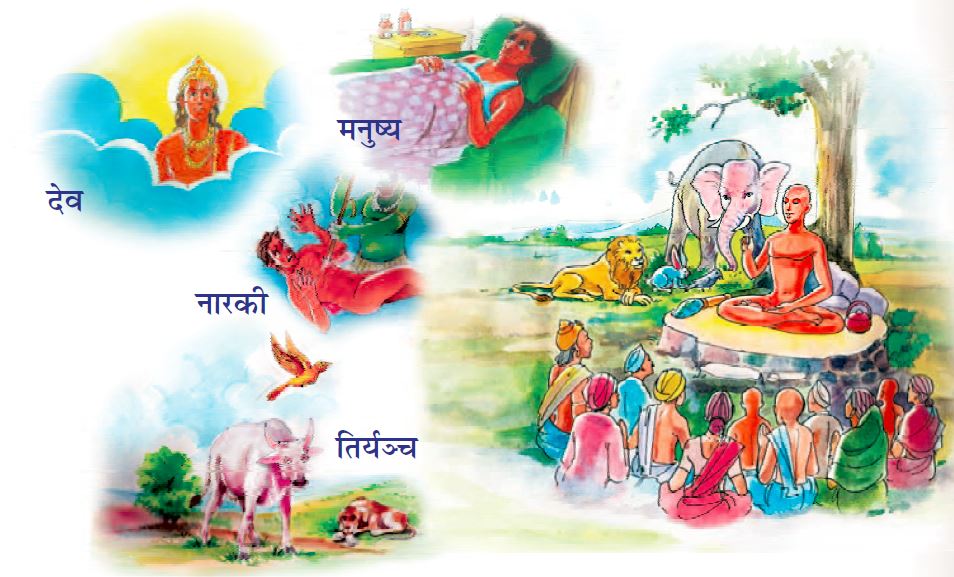
जे त्रिभुवन में जीव अनंत, सुख चाहें दुःखतै भयवंत
तातैं दुखहारी सुखकार, कहैं सीख गुरु करुणा धार ॥१॥
तातैं दुखहारी सुखकार, कहैं सीख गुरु करुणा धार ॥१॥
अन्वयार्थ : [त्रिभुवन में] तीनों लोकों में [जे] जो [अनन्त] अनन्त [जीव] प्राणी (हैं वे) [सुख] सुख की [चाहैं] इच्छा करते हैं और [दुखतैं] दुःख से [भयवन्त] डरते हैं [तातैं] इसलिये [गुरू] आचार्य [करूणा] दया [धार] करके [दुःखहारी] दुःख का नाश करनेवाली और [सुखकार] सुख को देनेवाली [सीख] शिक्षा [कहैं] कहते हैं ।
Meaning : In the three parts of the universe, there are infinite numbers of living beings. They are all afraid of sufferings and are looking for happiness. Therefore, with compassion, the learned preceptor gives the right advise to the mundane soul about how to destroy sufferings and to achieve happiness.
गुरु-शिक्षा सुनने का आदेश तथा संसार-परिभ्रमण का कारण
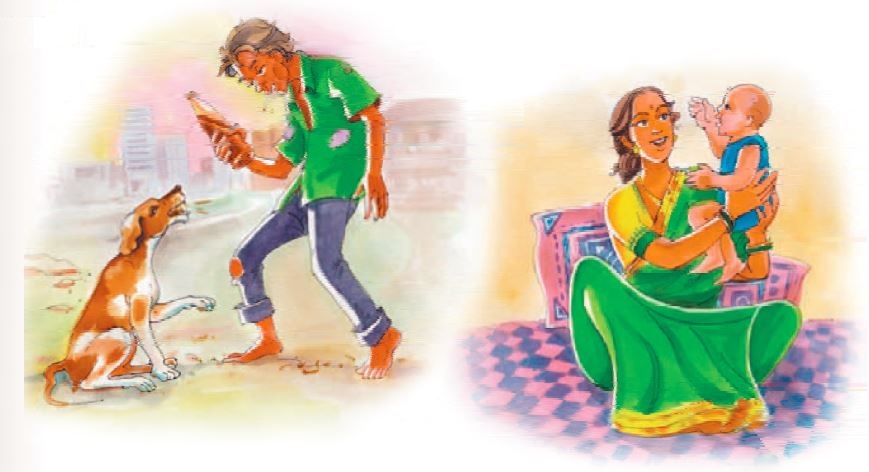
ताहि सुनो भवि मन थिर आन, जो चाहो अपनो कल्यान
मोह महामद पियो अनादि, भूल आपको भरमत वादि ॥२॥
मोह महामद पियो अनादि, भूल आपको भरमत वादि ॥२॥
अन्वयार्थ : [भवि] हे भव्यजीवों ! [जो] यदि [अपनो] अपना [कल्यान] हित [चाहो] चाहते हो (तो) [ताहि] गुरू की वह शिक्षा [मन] मन को [थिर] स्थिर [आन] करके [सुनो] सुनो (कि इस संसार में प्रत्येक प्राणी) [अनादि] अनादिकाल से [मोह महामद] मोहरूपी महामदिरा [पिया] पीकर, [आपको] अपने आत्मा को [भूल] भूलकर [वादि] व्यर्थ [भरमत] भटक रहा है ।
Meaning : O bhavya jiva! (he one who is capable of attaining salvation) if you desire the welfare of the self, then with utmost concentration, listen to the advice of the spiritual preceptor. Since time infinite the person has been drinking the strong wine of delusion. As a result, he is wandering the universe in the miserable cycle of life and death and has never realized his own true nature.
इस ग्रन्थ की प्रामाणिकता और निगोद का दुःख
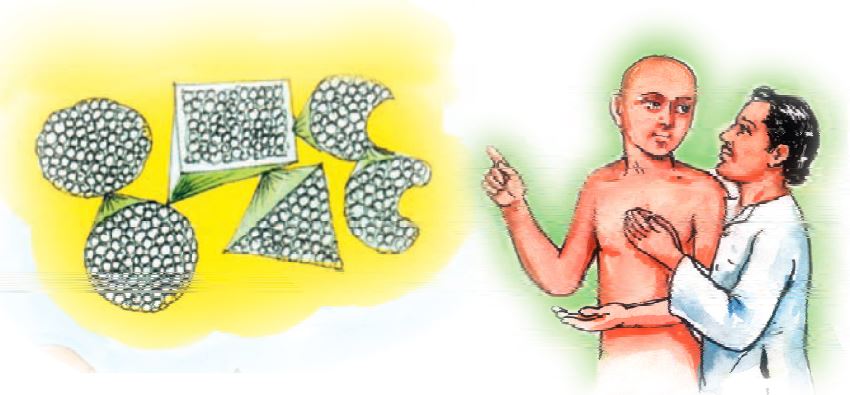
तास भ्रमण की है बहु कथा, पै कुछ कहूँ कही मुनि यथा
काल अनंत निगोद मंझार, बीत्यो एकेंद्री तन धार ॥३॥
काल अनंत निगोद मंझार, बीत्यो एकेंद्री तन धार ॥३॥
अन्वयार्थ : [तास] उस संसार में [भ्रमन की] भटकने की [कथा] कथा [बहु] बड़ी [है] है [पै] तथापि [यथा] जैसी [मुनि] पूर्वाचार्यों ने [कही] कहीं है (तदनुसार मैं भी) [कछु] थोड़ी-सी [कहूं] कहता हूं (कि इस जीव का) [निगोद मझार] निगोद में [एकेन्द्री] एकेन्द्रिय जीव के [तन] शरीर [धार] धारण करके [अनंत] अनंत [काल] काल [वीत्यो] व्यतीत हुआ है ।
Meaning : The ascetics in bygone literature have depicted many accounts of the sufferings of life and death in the transmigratory circle. I (Pandit Daulatram) will also narrate the same, albeit as a shorter version. The living being has passed an infinite time in the lowest form of life nigodh, with only one sense organ.
निगोद का दुःख और वहाँ से निकलकर प्राप्त की हुई पर्यायें
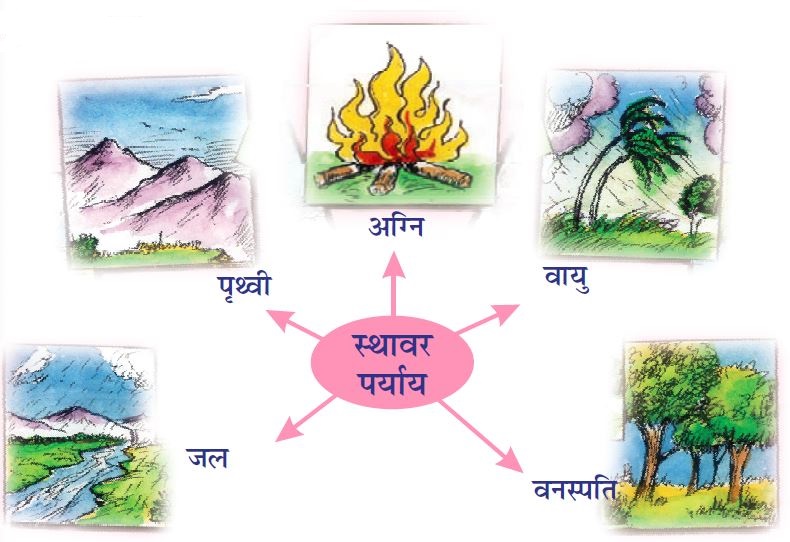
एक श्वास में अठदस बार, जन्म्यो मर्यो भर्यो दुखभार
निकसि भूमि जल पावक भयो, पवन प्रत्येक वनस्पति थयो ॥४॥
निकसि भूमि जल पावक भयो, पवन प्रत्येक वनस्पति थयो ॥४॥
अन्वयार्थ : (निगोद में यह जीव) [एक श्वास में] एक सांस में [अठदस बार] अठारह बार [जन्म्यो] जनमा और [मरयो] मरा (तथा) [दुखभार] दुःखों के समूह [भरयो] सहन किये (और वहां से) [निकसि] निकलकर [भूमि] पृथ्वीकायिक, [जल] जलकायिक, [पावक] अग्निकायिक [भयो] हुआ तथा [पवन] वायुकायिक (और) [प्रत्येक वनस्पति] प्रत्येक वनस्पतिकायिक जीव [थयो] हुआ ।
Meaning : In the state of the lowest form of life- the soul suffered immensely. In one breathing, soul went through the cycle of birth and death eighteen times. When the soul got the opportunity to come out of this, he was born into an earth body, water body, fire body, air body and then as an individual plant body. All these migrations were in one sensed life.
तिर्यंचगति में त्रसपर्याय की दुर्लभता और उसका दुःख
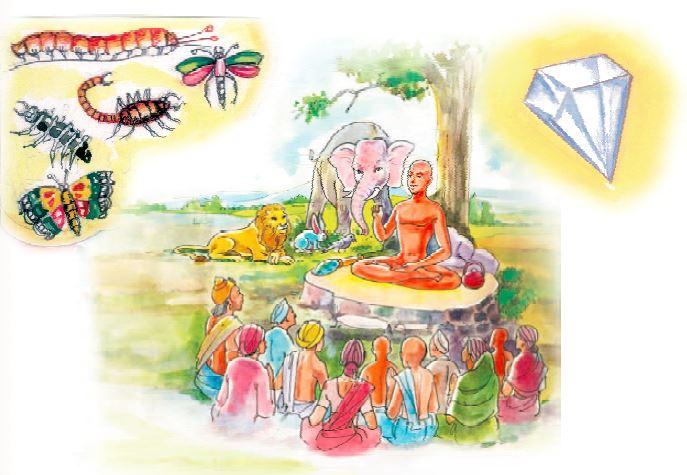
दुर्लभ लहि ज्यों चिन्तामणि, त्यों पर्याय लही त्रसतणी
लट पिपील अलि आदि शरीर, धर धर मर्यो सही बहु पीर ॥५॥
लट पिपील अलि आदि शरीर, धर धर मर्यो सही बहु पीर ॥५॥
अन्वयार्थ : [ज्यों] जिसप्रकार [चिन्तामणि] चिन्तामणि-रत्न [दुर्लभ] कठिनाई से [लहि] प्राप्त होता है [त्यों] उसीप्रकार [त्रसतणी] त्रस-पर्याय (बड़ी कठिनाई से) [लहि] प्राप्त हुई । (वहां भी) [लट] इल्ली [पिपील] चींटी [अलि] भंवरा [आदि] इत्यादि के [शरीर] शरीर [धर धर] बारम्बार धारण करके [मरयो] मरण को प्राप्त हुआ (और) [बहु पीर] अत्यन्त पीड़ा [सही] सहन की ।
Meaning : Just as it is rare to find a precious jewel, so it is equally as rare for the living being to transgress from the stationary life of one sensed being to a mobile life of two to four sensed being such as a worm, two sensed creature; ant, three sensed creature; beetle, four sensed creature. Yet again in all these states the living being continues to endure sufferings.
तिर्यंचगति में असंज्ञी तथा संज्ञी के दुःख

कबहूँ पंचेन्द्रिय पशु भयो, मन बिन निपट अज्ञानी थयो
सिंहादिक सैनी ह्वै क्रूर, निबल पशु हति खाये भूर ॥६॥
सिंहादिक सैनी ह्वै क्रूर, निबल पशु हति खाये भूर ॥६॥
अन्वयार्थ : (यह जीव) [कबहूं] कभी [पंचेन्द्रिय] पंचेन्द्रिय [पशु] तिर्यंच [भयो] हुआ (तो) [मन बिन] मन के बिना [निपट] अत्यंत [अज्ञानी] मूर्ख [थयो] हुआ (और) [सैनी] संज्ञी (भी) [ह्वै] हुआ (तो) [सिंहादिक] सिंह आदि [क्रूर] क्रूर जीव [ह्वै] होकर [निबल] अपने से निर्बल, [भूर] अनेक [पशु] तिर्यंच [हति] मार-मारकर [खाये] खाये ।
Meaning : Every so often, the soul took birth as a five-sensed animal without the power of rational thoughts. In this case such a soul would be ignorant about his true nature. Even if an opportunity arose to take birth as a five sensed animal with the power of rational thinking, it may take birth as a wild or cruel beast such as a lion or a tiger, which kills and eat many weaker animals like deer and rabbits etc.
तिर्यंचगति में निर्बलता तथा दुःख
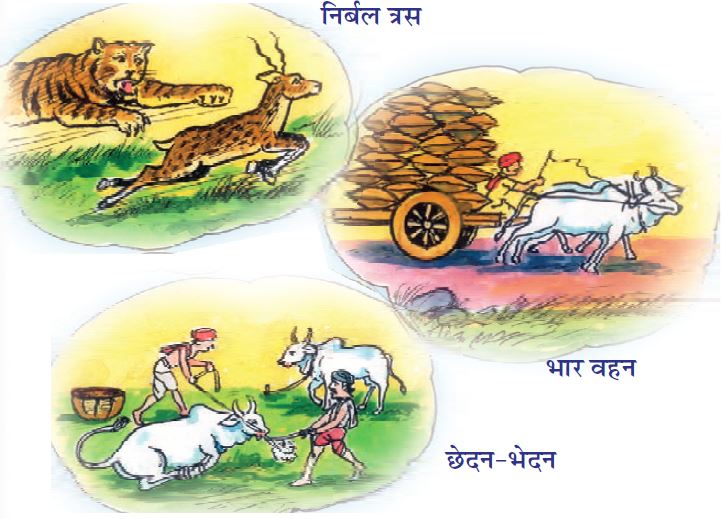
कबहूँ आप भयो बलहीन, सबलनि करि खायो अतिदीन
छेदन भेदन भूख पियास, भार-वहन, हिम, आतप त्रास ॥७॥
छेदन भेदन भूख पियास, भार-वहन, हिम, आतप त्रास ॥७॥
अन्वयार्थ : (यह जीव तिर्यंच गति में) [कबहूं] कभी [आप] स्वयं [बलहीन] निर्बल [भयो] हुआ (तो) [अतिदीन] असमर्थ होने से [सबलनि करि] अपने से बलवान प्राणियों द्वारा [खायो] खाना गया (और) [छेदन] छेदा जाना, [भेदन] भेदा जाना, [भूख] भूख [पियास] प्यास, [भार-वहन] बोझ ढोना, [हिम] ठण्ड [आतप] गर्मी (आदि के) [त्रास] दुःख सहन किये ।
Meaning : Occasionally this living being was born as a weak animal, such as a deer, rabbit etc that might be eaten by a stronger animal In this form of life, the living being had to face many sufferings due to piercing, cutting, hunger, thirst, carrying loads, cold and heat etc.
तिर्यंच के दुःख की अधिकता और नरक गति की प्राप्ति का कारण
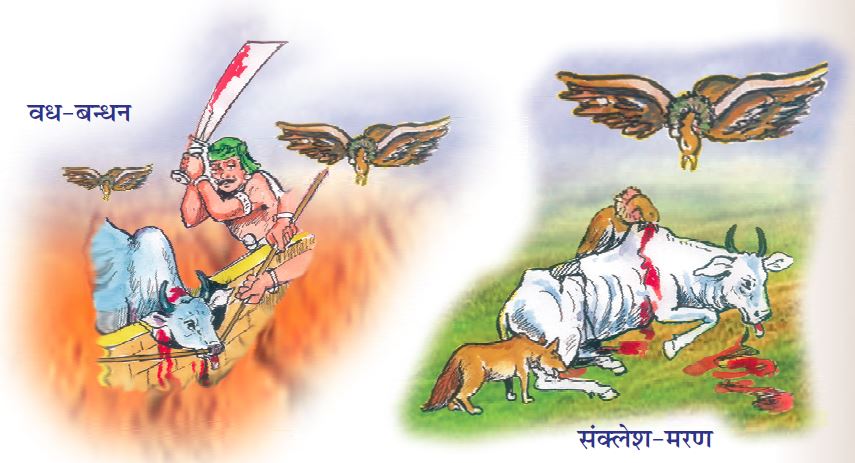
बध बंधन आदिक दुख घने, कोटि जीभ तैं जात न भने
अति संक्लेश भावतैं मर्यो, घोर श्वभ्रसागर में पर्यो ॥८॥
अति संक्लेश भावतैं मर्यो, घोर श्वभ्रसागर में पर्यो ॥८॥
अन्वयार्थ : (इस तिर्यंचगति में जीव ने अन्य भी) [वध] मारा जाना, [बंधन] बंधना [आदिक] आदि [घने] अनेक [दुख] दुःख सहन किये; (वे) [कोटि] करोड़ों [जीभतैं] जीभों से [भने न जात] नहीं कहे जा सकते । (इस कारण) [अति संक्लेश] अत्यंत बुरे [भावतैं] परिणामों से [मरयो] मारकर [घोर] भयानक [श्वभ्रसागर में] नरकरूपी समुद्र में [परयो] जा गिरा ।
Meaning : As an animal, the soul faces being butchered and bound. The suffering is so intense that it cannot be narrated by millions of tongues. Thus it dies under extreme torture and falls in to the terrible infernal (hell) realm.
नरकों की भूमि और नदियों का वर्णन
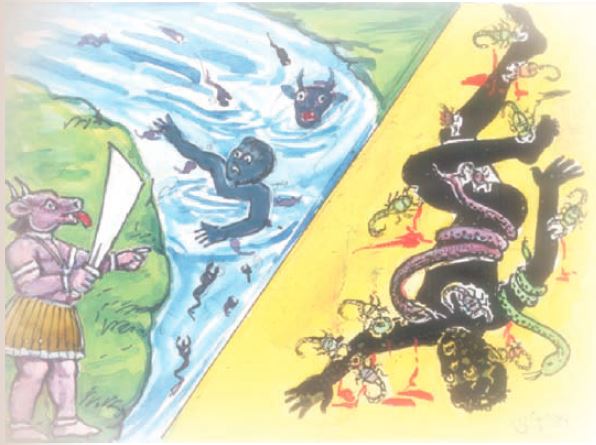
तहाँ भूमि परसत दुख इसो, बिच्छू सहस डसे नहिं तिसो
तहाँ राध-श्रोणितवाहिनी, कृमि-कुल-कलित, देह-दाहिनी ॥९॥
तहाँ राध-श्रोणितवाहिनी, कृमि-कुल-कलित, देह-दाहिनी ॥९॥
अन्वयार्थ : [तहां] उन नरक में [भूमि] धरती [परसत] स्पर्श करने से [इसो] ऐसा [दुख] दुःख होता है (कि) [सहस] हजारों [बिच्छू] बिच्छू [डसे] डंक मारें, तथापि [नहिं तिसो] उसने समान दुःख नहीं होता (तथा) [तहां] वहां (नरक में) [राधा-श्रोणितवाहिनी] रक्त और मवाद बहानेवाली नदी (वैतरणी नामक नदी) है, जो [कृमिकुललित] छोटे-छोटे क्षुद्र कीड़ों से भरी हैं तथा [देहदाहिनी] शरीर में दाह उत्पन्न करनेवाली है ।
Meaning : In the infernal realm just merely touching the ground causes pain likened to the sting of thousands of scorpions. The flow of the river 'vaitarni' is full of pus and blood along with swamps of worms and all these cause severe burning sensation to the body.
नरकों के सेमल वृक्ष तथा सर्दी-गर्मी के दुःख

सेमर तरु दलजुत असिपत्र, असि ज्यों देह विदारैं तत्र
मेरु समान लोह गलि जाय, ऐसी शीत उष्णता थाय ॥१०॥
मेरु समान लोह गलि जाय, ऐसी शीत उष्णता थाय ॥१०॥
अन्वयार्थ : [तत्र] उन नरको में, [असिपत्र ज्यों] तलवार की धार की भांति तीक्ष्ण [दलजुत] पत्तोंवाले [सेमर तरू] सेमल के वृक्ष (हैं, जो) [देह] शरीर को [असि ज्यों] तलवार की भांति [विदारैं] चीर देते हैं (और) [तत्र] वहां (उस नरक में) [ऐसी] ऐसी [शीत] ठण्ड (और) [उष्णता] गरमी [थाय] होती है (कि) [मेरू समान] मेरू पर्वत के बाराबर [लोह] लोहे का गोला भी [गलि] गल जाय ।
Meaning : In the infernal realm, there are leaves of the 'Sevar' trees that have sharp edges like a sword. When they fall on the inhabitants they pierce through the body. The climate is so intensely hot that a lump of iron as big as mount Meru can melt just like the wax of the candle and it is also so cold that the same lump of iron melts away as if the salt into the water.
नरकों में अन्य नारकी, असुरकुमार तथा प्यास का दुःख
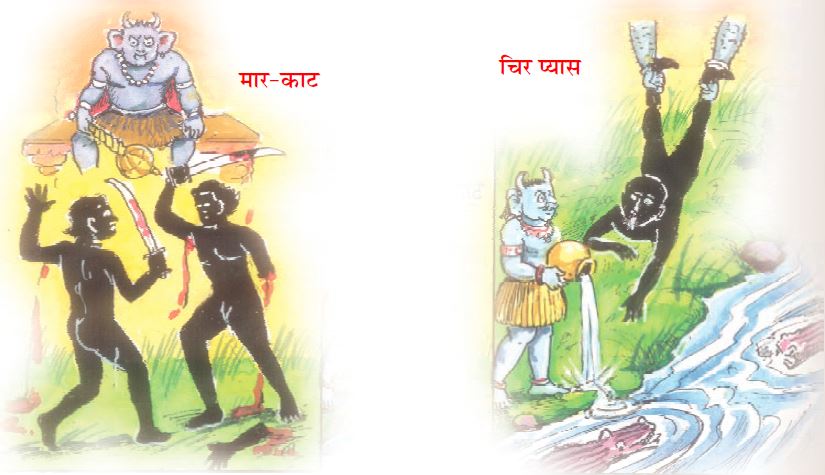
तिल-तिल करैं देह के खण्ड, असुर भिड़ावैं दुष्ट प्रचण्ड
सिन्धुनीर तैं प्यास न जाय, तो पण एक न बूँद लहाय ॥११॥
सिन्धुनीर तैं प्यास न जाय, तो पण एक न बूँद लहाय ॥११॥
अन्वयार्थ : (उन नरकों में नारकी जीव एक-दूसरे के ) [देह के] शरीर के [तिल-तिल] तिल्ली के दाने बराबर [खण्ड] टुकड़े [करें] कर डालते हैं (और) [प्रचण्ड] अत्यंत [दुष्ट] क्रूर [असुर] असुरकुमार जाति के देव (एक-दूरे के साथ) [भिड़ावैं] लड़ाते हैं; (तथा इतनी) (प्यास) प्यास (लगती है कि) [सिन्धुनीर तैं] समुद्रभर पानी पीने से भी (न जाय) शांत न हो, (तो पण) तथापि (एक बूंद) एक बूंदी भी (न लहाय) नहीं मिलती ।
Meaning : Inhabitants of the infernal life fight and chop the bodies of each other into small pieces. They are incited to fight amongst themselves by wicked and fierce celestial beings known as 'Asur kumaar'. They have extreme thirst, which cannot be quenched by the water of an entire ocean. Despite this they do not get even one drop of water to drink.
नरकों की भूख, आयु और मनुष्यगति प्राप्ति का वर्णन
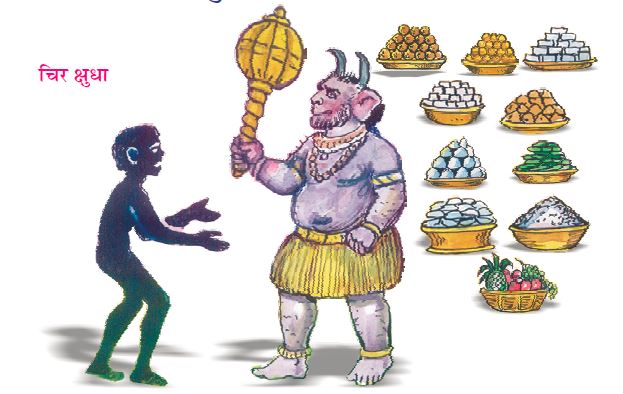
तीनलोक को नाज जु खाय, मिटै न भूख कणा न लहाय
ये दुख बहु सागर लौं सहै, करम जोगतैं नरगति लहै ॥१२॥
ये दुख बहु सागर लौं सहै, करम जोगतैं नरगति लहै ॥१२॥
अन्वयार्थ : (उन नरकों में इतनी भूख लगती है कि) [तीन लोक को] तीनों लोक का [नाज] अनाज [जुखाय] खा जाये तथापि [भूख] क्षुधा [न मिटै] शांत न हो (परंतु खाने के लिए) [कणा] एक दाना भी [न लहाय] नही मिलता। [ये दुख] ऐसे दुःख [बहु सागर लौं] अनेक सागरोपम काल तक [सहै] सहन करता है, [कमर जोगतैं] किसी विशेष शुभ-कर्म के योग से [नरगति] मनुष्य-गति [लहै] प्राप्त करता है ।
Meaning : Even if infernal living beings were given entire food stocks of the three worlds of the universe, their hunger would not be satisfied and yet, they receive not a grain to eat. Here in this life, the soul has .suffered natural and other intense sufferings for very long periods of time. At the end of the infernal life, by fruition of auspicious karma the soul is born as a human being.
मनुष्यगति में गर्भ-निवास तथा प्रसवकाल के दुःख
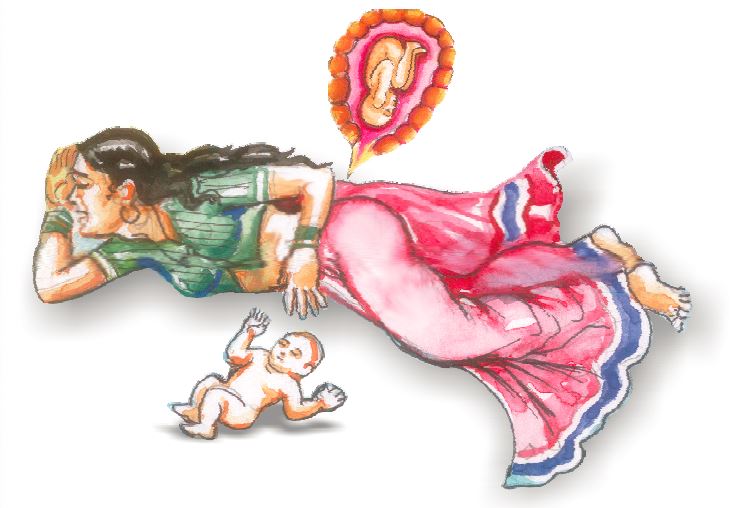
जननी उदर वस्यो नव मास, अंग सकुचतैं पायो त्रास
निकसत जे दुख पाये घोर, तिनको कहत न आवे ओर ॥१३॥
निकसत जे दुख पाये घोर, तिनको कहत न आवे ओर ॥१३॥
अन्वयार्थ : (मनुष्यगति में भी यह जीव) [नव मास] नौ महीने तक [जननी] माता के [उदर] पेट में [वस्यो] रहा; (तब वहां) [अंग] शरीर [सकुचतैं] सिकोड़कर रहने से [त्रास] दुःख [पायो] पाया (और) [निकसत] निकलते समय [जे] जो [घोर] भयंकर [दुख पाये] दुःख पाये [तिलको] उन दुःखों को [कहत] कहने से [ओर] अंत [न आवे] नहीं आ सकता ।
Meaning : In the human form of life, the living being was confined for nine months in the womb of the mother, wherein on account of bodily contractions, it had to suffer pains. The intense pain he had to suffer at the time of taking birth is beyond narration.
मनुष्यगति में बाल, युवा और वृद्धावस्था के दुःख
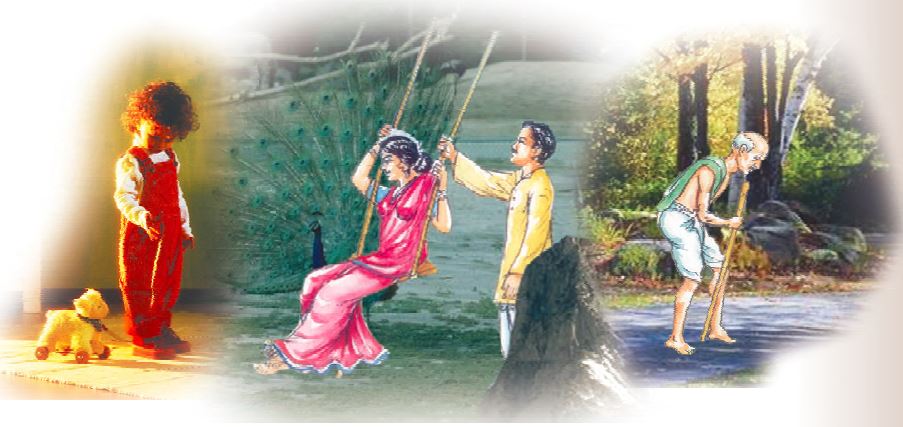
बालपने में ज्ञान न लह्यो, तरुण समय तरुणी-रत रह्यो
अर्ध-मृतक-सम बूढ़ापनो, कैसे रूप लखै आपनो ॥१४॥
अर्ध-मृतक-सम बूढ़ापनो, कैसे रूप लखै आपनो ॥१४॥
अन्वयार्थ : (मनुष्यगति में) [बालपने में] बचपन में [ज्ञान] ज्ञान [न लह्यो] प्राप्त नहीं कर सका (और) [तरूण समय] युवावस्था में [तरूणी-रत] युवती स्त्री में लीन [रह्यो] रहा, (और) [बूढापनो] वृद्धावस्था [अर्धमृतकसम] अधमरा जैसा (रहा, ऐसी दशा में) [कैसे] किस प्रकार (जीव) [अपनी] अपना [रूप] स्वरूप [लखै] देखे - विचारे ।
Meaning : During childhood one did not acquire true knowledge. In youth, one remained engrossed in sensual pleasures with the spouse. In old age, one is almost half dead. How can then one obtain a chance for the realization of ones own true nature?
देवगति में भवनत्रिक का दुःख
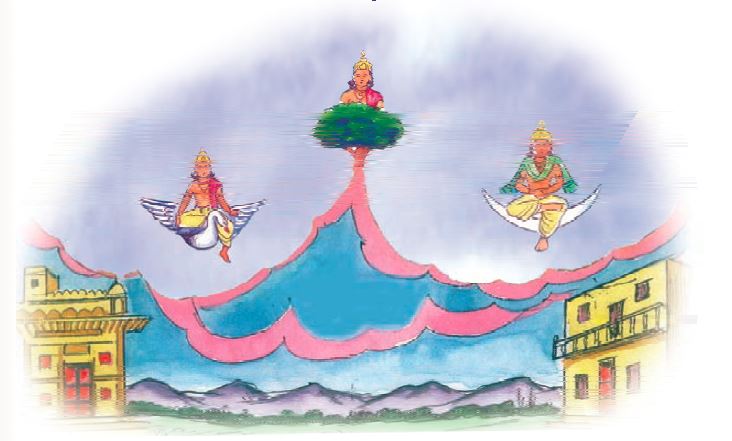
कभी अकामनिर्जरा करै, भवनत्रिक में सुरतन धरै
विषय-चाह-दावानल दह्यो, मरत विलाप करत दुख सह्यो ॥१५॥
विषय-चाह-दावानल दह्यो, मरत विलाप करत दुख सह्यो ॥१५॥
अन्वयार्थ : (इस जीव ने) [कभी] कभी [अकाम निर्जरा] अकाम निर्जरा [करै] की (तो मरने के पश्चात्) [भवनत्रिक] भवनवासी, व्यंतर और ज्योतिषी में [सुरतन] देवपर्याय [धरै] धारण की, (परंतु वहां भी) [विषय चाह] पांच इन्द्रियों के विषयों की इच्छारूपी [दावानल] भयंकर अग्नि में [दह्यो] जलता रहा (और) (मरत) मरते समय [विलाप करत] रो-रोकर [दुख सह्यो] दुःख सहन किया ।
Meaning : As a result of involuntary dissociation of karma (akaam nirjaraa), the living being is now born as a celestial being. Here he could be born as a mansion dwelling (bhavanpati), a wandering (vyantar) or as a stellar (jyotistha) celestial living being. In these lives the living being is burning with sensual desire like a wild fire. At the time of death, he weeps bitterly and suffers intense agony.
देवगति में वैमानिक देवों का दुःख

जो विमानवासी हू थाय, सम्यग्दर्शन बिन दुख पाय
तहँतें चय थावर तन धरै, यों परिवर्तन पूरे करै ॥१६॥
तहँतें चय थावर तन धरै, यों परिवर्तन पूरे करै ॥१६॥
अन्वयार्थ : [जो] यदि [विमानवासी] वैमानिक देव [हू] भी [थाय] हुआ (तो वहां) [सम्यग्दर्शन] सम्यग्दर्शन [बिना] बिना [दुख] दुःख [पाय] प्राप्त किया (और) [तहंतैं] वहां से [चय] मरकर [थावर तन] स्थावर जीव का शरीर [धरै] धारण करता है; [यों] इसप्रकार (यह जीव) [परिवर्तन] पांच परावर्तन [पूरे करै] पूर्ण करता रहता है ।
Meaning : The living being continues to suffer, if born as the empyrean type of celestial being without the right faith. Falling from there, he is reborn as an immobile organism. Thus the living being continues the cycle of - mundane transmigration.
ढाल-2
संसार में परिभ्रमण का कारण
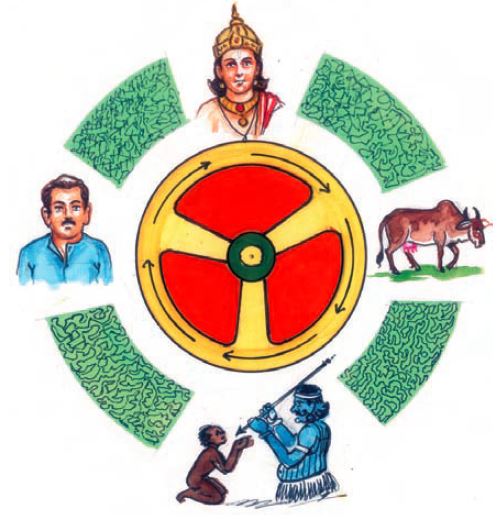
ऐसे मिथ्या दृग-ज्ञान-चर्णवश, भ्रमत भरत दुख जन्म-मर्ण
तातैं इनको तजिये सुजान, सुन तिन संक्षेप कहूँ बखान ॥१॥
तातैं इनको तजिये सुजान, सुन तिन संक्षेप कहूँ बखान ॥१॥
अन्वयार्थ : [मिथ्यादृग-ज्ञान-चर्णवश] मिथ्यादर्शन, मिथ्याज्ञान और मिथ्याचारित्र के वश होकर [ऐसे] इस प्रकार [भ्रमत भरत दुख जन्म-मरण ] जन्म और मरण के दुःखों को भोगता हुआ भटकता फिरता है । [तातैं इनको] इसलिये इन (तीनों) को [तजिये सुजान] भली-भाँति जानकर छोड़ना चाहिये । [सुन तिन संक्षेप कहूँ बखान] इनका संक्षेप से वर्णन करता हूँ, उसे सुनो ।
Meaning : The living being wanders in this universe and suffers the pains of birth and death because of wrong faith, wrong knowledge and wrong conduct. Therefore after knowing them well, leave them. I (the author Daulatram) describe these three in brief, please listen.
अगृहीत-मिथ्यादर्शन और जीवतत्त्व का लक्षण
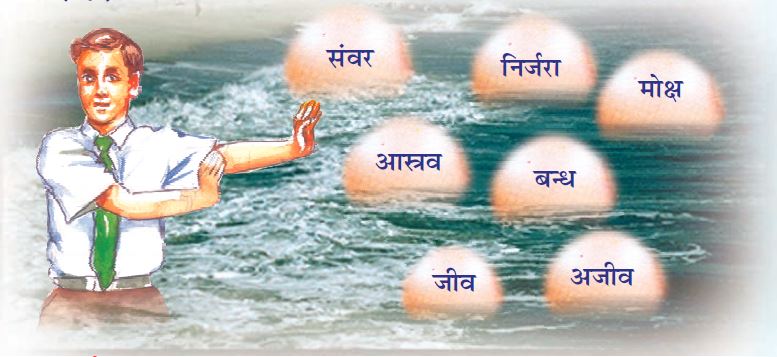
जीवादि प्रयोजनभूत तत्त्व, सरधैं तिनमाहिं विपर्ययत्व
चेतन को है उपयोग रूप, बिनमूरत चिन्मूरत अनूप ॥२॥
चेतन को है उपयोग रूप, बिनमूरत चिन्मूरत अनूप ॥२॥
अन्वयार्थ : [जीवादि] जीव आदि (जीव, अजीव, आस्रव, बंध, संवर, निर्जरा और मोक्ष) प्रयोजनभूत तत्त्व हैं, [सरधैं तिनमांहि विपर्ययत्व] उनमें विपरीत श्रद्धान करना (सो अग्रहीत मिथ्यादर्शन है); [चेतन को है उपयोग रूप] आत्मा का स्वरूप उपयोग (दर्शन-ज्ञान) है, और वह [बिनमूरत चिन्मूरत अनूप] अमूर्तिक, चैतन्यमय और उपमा-रहित है ।
Meaning : With a vision towards the true nature of the soul, when one truly believes in the nature of seven realities of living, non-living, inflow, bondage, stoppage, shedding and the liberation, then one obtains true faith. Therefore it is essential to know these seven realities. To understand these seven realities in the wrong way is known as the inborn wrong belief (agruhit mithyaatva). The true faith of the (seven) realties like living, non-living etc. is relevant to our purpose. In fact the characteristics of the soul is attentive consciousness (upayog). Soul is unique and sentient and not perceived with sense organs.
जीव-तत्त्व के विषय में मिथ्यात्व
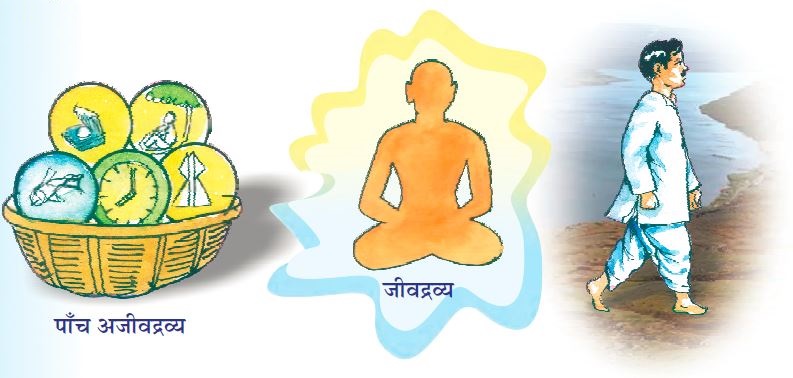
पुद्गल नभ धर्म अधर्म काल, इनतैं न्यारी है जीव चाल
ताकों न जान विपरीत मान, करि करै देह में निज पिछान ॥३॥
ताकों न जान विपरीत मान, करि करै देह में निज पिछान ॥३॥
अन्वयार्थ : पुद्गल [नभ] आकाश, धर्म, अधर्म, काल [इनतैं] इनसे [न्यारी है जीव चाल] जीव का स्वभाव भिन्न है; (तथापि मिथ्यादृष्टि जीव) [ताकों न जान] उस (स्वभाव) को नहीं जानता और विपरीत [मान करि] मानकर [देह में निज पिछान] शरीर में आत्मा की पहिचान करता है ।
Meaning : Matter, medium of motion, medium of rest, space and time are the five non-sentient substances of the universe. The soul is forever an embodiment of knowledge (gyaan swaroop) and is separate from these non-living non-sentient substances. The soul with the wrong belief has no true understanding of this fact. In ignorance he believes himself to be the body, and further believes that he can perform the activities of the body and that the body is functioning with his desire. This wrong belief makes him under -stand that the body and the soul are one and the same. This is the wrong belief about the understanding of the living element (jiva tattva).
मिथ्यादृष्टि का शरीर तथा पर-वस्तुओं सम्बन्धी विचार
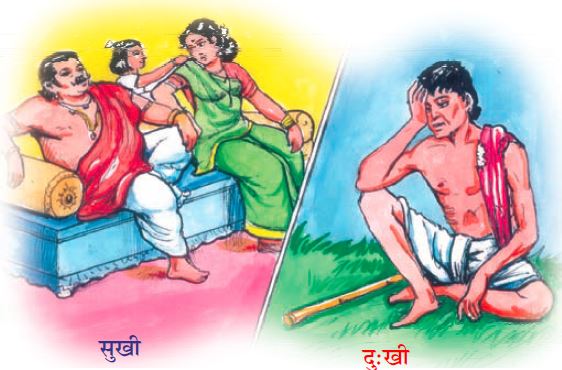
मैं सुखी दुखी मैं रंक राव, मेरे धन गृह गो-धन प्रभाव
मेरे सुत तिय मैं सबल दीन, बेरूप सुभग मूरख प्रवीण ॥४॥
मेरे सुत तिय मैं सबल दीन, बेरूप सुभग मूरख प्रवीण ॥४॥
अन्वयार्थ : (मिथ्यादृष्टि जीव मिथ्यादर्शन के कारण से मानता है कि) [मैं सुखी दुखी] मैं सुखी हूँ, दुःखी हूँ, [रंक राव] निर्धन हूँ, राजा हूँ, [मेरे धन] मेरे यहाँ रुपया-पैसा आदि [गृह गोधन] घर, गाय-भैंस आदि [प्रभाव] बड़प्पन (है; और) [मेरे सुत] मेरी संतान तथा [तिय] मेरी स्त्री है; [मैं सबल] मैं बलवान, [दीन] निर्बल, [बेरूप] कुरूप, [सुभग] सुन्दर, [मूरख] मूर्ख और [प्रवीण] चतुर हूँ ।
Meaning : Instead of knowing the true nature of soul being forever consciousness, the ignorant soul thinks that he is the body, and performs the functions of the body. If the body is healthy then it is beneficial to him. He is happy with the favorable external surroundings and unhappy with unfavorable situations. He is poor or rich. He is strong or weak. He is human and is handsome or ugly. He is wise or a fool. He believes to have wife, sons, wealth, house and animal wealth.
अजीव और आस्रव-तत्त्व की विपरीत श्रद्धा
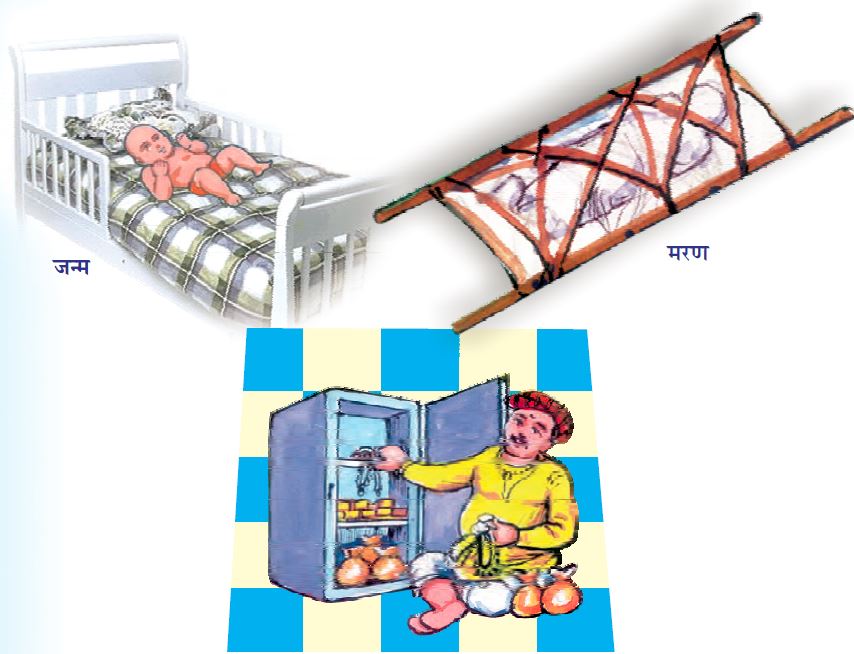
तन उपजत अपनी उपज जान, तन नशत आपको नाश मान
रागादि प्रगट ये दु:ख देन, तिनही को सेवत गिनत चैन ॥५॥
रागादि प्रगट ये दु:ख देन, तिनही को सेवत गिनत चैन ॥५॥
अन्वयार्थ : (मिथ्यादृष्टि जीव) [तन] शरीर के [उपजत] उत्पन्न होने से [अपनी] अपना आत्मा [उपज] उत्पन्न हुआ [जान] मानता है और [तन] शरीर के [नशत] नाश होने से [आपको] आत्मा का [नाश] मरण हुआ ऐसा [मान] मानता है । [रागादि] राग, द्वेष, मोहादि [ये प्रगट] जो स्पष्ट रूप से [दुख देन] दुःख देनेवाले हैं, [तिनही को] उनकी [सेवत] सेवाता हुआ [चैन गिनत] सुख मानता है ।
Meaning : The Wrong believer thinks that with the birth of the body he is born, and with the body's demise, he will die. He believes to have favorable or unfavorable modifications occurring within himself when actually the changes occur in the body. This is his misconception regarding the non living element.
The ignorant soul believes that alien substances produce happiness to him and as a result embraces them. He believes the alien substances are the reason for his likes dislikes and deluded state. He does not accept the fact that any alien substances can never give happiness or unhappiness to him.
In fact the belief that one can do the activity of alien substances (kartutva) or to keep the ownership in alien substances (mamatva) is a wrong belief. This produces unhappiness and is the reason for bondage of karma. This is the misconception regarding the inflow element.
The ignorant soul believes that alien substances produce happiness to him and as a result embraces them. He believes the alien substances are the reason for his likes dislikes and deluded state. He does not accept the fact that any alien substances can never give happiness or unhappiness to him.
In fact the belief that one can do the activity of alien substances (kartutva) or to keep the ownership in alien substances (mamatva) is a wrong belief. This produces unhappiness and is the reason for bondage of karma. This is the misconception regarding the inflow element.
बन्ध और संवर तत्त्व की विपरीत श्रद्धा
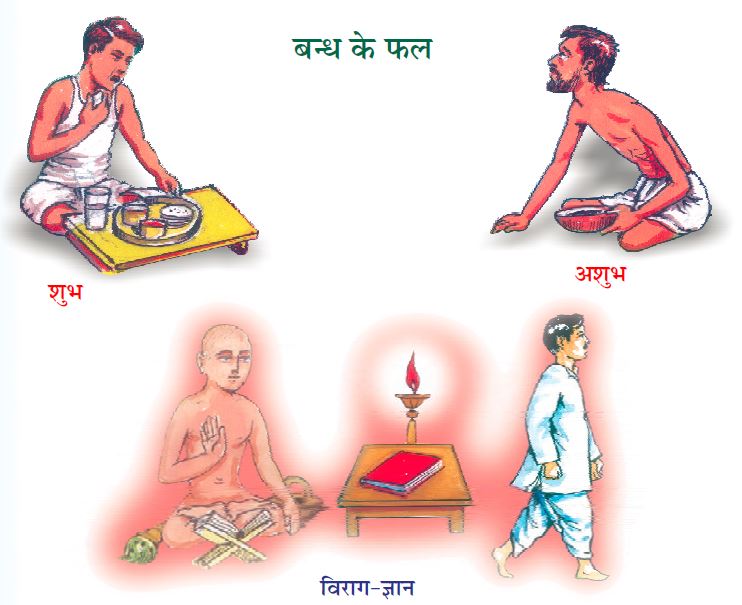
शुभ-अशुभ बंध के फल मंझार, रति-अरति करै निज पद विसार
आतमहित हेतु विराग ज्ञान, ते लखै आपको कष्टदान ॥६॥
आतमहित हेतु विराग ज्ञान, ते लखै आपको कष्टदान ॥६॥
अन्वयार्थ : (मिथ्यादृष्टि जीव) [निजपद] आत्मा के स्वरूप को [विसार] भूलकर [बंध के] कर्म-बन्ध के [शुभ] अच्छे [फल मंझार] फल में [रति] प्रेम [करै] करता है और कर्म-बन्ध के [अशुभ] बुरे फल से [अरति] द्वेष करता है; (तथा जो) [विराग] राग-द्वेष का अभाव (अपने यथार्थ स्वभाव में स्थिरतारूप सम्यक्चारित्र) और [ज्ञान] सम्यग्ज्ञान (और सम्यग्दर्शन) [आतमहित] आत्मा के हित के [हेतु] कारण हैं, [ते] उन्हें [आपको] आत्मा को [कष्टदान]
दुःख देनेवाले [लखै] मानता है ।
दुःख देनेवाले [लखै] मानता है ।
Meaning : The soul obtains the association or separation of circumstances according to the fruition of non-destructive karma. The wrong believer becomes perplexed (aakultaa) by his likes and dislikes and believes them to be favorable or unfavorable to him. As a result he imagines being happy or unhappy. He becomes happy with acquiring wealth, spouse and family. He becomes unhappy with disease, poverty, and loss of family. Auspicious as well as inauspicious activities are the cause of bondage of karma; instead he believes auspicious activities to be beneficial. In reality the auspicious as well as inauspicious acts are both detrimental to the soul but the wrong believer does not understand this fact. This is the misconception regarding the bondage element.
Right faith, right knowledge and right conduct from the absolute point of view (nischay samyak darshan) are beneficial to the soul. As one gets stabilized within himself, there is a proportionate diminishing state of delusion. The wrong believer perceives them to be the source of suffering to him. This is the misconception regarding the stoppage element.
Right faith, right knowledge and right conduct from the absolute point of view (nischay samyak darshan) are beneficial to the soul. As one gets stabilized within himself, there is a proportionate diminishing state of delusion. The wrong believer perceives them to be the source of suffering to him. This is the misconception regarding the stoppage element.
निर्जरा और मोक्ष की विपरीत श्रद्धा तथा अगृहीत मिथ्याज्ञान
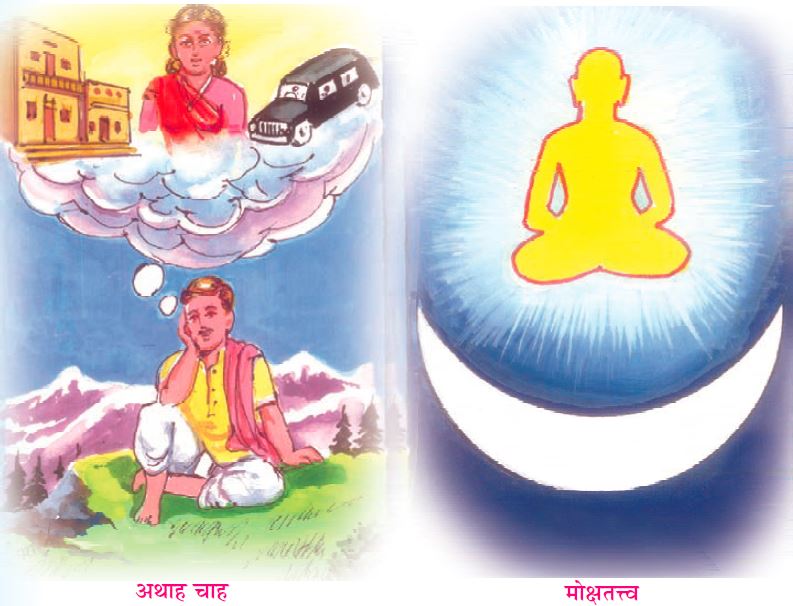
रोकी न चाह निजशक्ति खोय, शिवरूप निराकुलता न जोय
याही प्रतीतिजुत कछुक ज्ञान, सो दुखदायक अज्ञान जान ॥७॥
याही प्रतीतिजुत कछुक ज्ञान, सो दुखदायक अज्ञान जान ॥७॥
अन्वयार्थ : (मिथ्यादृष्टि जीव) [निजशक्ति] अपने आत्मा की शक्ति [खोय] खोकर [चाह] इच्छा को [न रोकी] नहीं रोकता, और [निराकुलता] आकुलता के अभाव को [शिवरूप] मोक्ष का स्वरूप [न जोय] नहीं मानता । [याही] इस [प्रतीतिजुत] मिथ्या मान्यता सहित [कछुक ज्ञान] जो कुछ ज्ञान है [सो] वह [दुखदायक] कष्ट देनेवाला [अज्ञान] अगृहीत मिथ्याज्ञान है - ऐसा [जान] समझना चाहिए ।
Meaning : When there is partial increase of purity then there is proportionate shedding of the impurity in the soul. This is known as the shedding associated with the stoppage of karma. This occurs only with the right faith from absolute point of view. When one is engrossed within oneself, then there is dissociation of auspicious and inauspicious desires. This is known as 'shedding' element or austerity.
Austerity is classified in two ways: 1. Austerity associated with the wrong faith and 2. Austerity associated with the right faith.
Austerity performed in the wrong faith cannot give any true or meaningful shedding of karma. Austerity performed with the right faith, when there is an absence of auspicious and inauspicious desires, is the real reason for shedding of karma.
The wrong believer does not understand this fact. He forgets his infinite strength from self-absorption and instead believes to have happiness derived from alien substances. He is unable to control his auspicious and inauspicious desires and the liking of the objects of five senses. This is the misconception regarding the 'shedding' element.
Pure and perfect tranquility with the bliss from within is the nature of the liberation element. In this state there is complete purity of the soul. This is the real nature of true happiness. However, the ignorant soul does not accept this fact. He thinks happiness comes with the help of body, five senses and objects of five senses. This is the misconception regarding 'liberation' element.
Inborn wrong knowledge (agruhit mithyaa gyaan): The presence of knowledge along with the inborn wrong faith is known as inborn wrong knowledge (anaadi mithyaa gyaan) and can produce intense misery. This knowledge is not acquired by listening to the sermons but is present with the soul since time infinite.
Austerity is classified in two ways: 1. Austerity associated with the wrong faith and 2. Austerity associated with the right faith.
Austerity performed in the wrong faith cannot give any true or meaningful shedding of karma. Austerity performed with the right faith, when there is an absence of auspicious and inauspicious desires, is the real reason for shedding of karma.
The wrong believer does not understand this fact. He forgets his infinite strength from self-absorption and instead believes to have happiness derived from alien substances. He is unable to control his auspicious and inauspicious desires and the liking of the objects of five senses. This is the misconception regarding the 'shedding' element.
Pure and perfect tranquility with the bliss from within is the nature of the liberation element. In this state there is complete purity of the soul. This is the real nature of true happiness. However, the ignorant soul does not accept this fact. He thinks happiness comes with the help of body, five senses and objects of five senses. This is the misconception regarding 'liberation' element.
Inborn wrong knowledge (agruhit mithyaa gyaan): The presence of knowledge along with the inborn wrong faith is known as inborn wrong knowledge (anaadi mithyaa gyaan) and can produce intense misery. This knowledge is not acquired by listening to the sermons but is present with the soul since time infinite.
अगृहीत मिथ्याचारित्र (कुचारित्र) का लक्षण
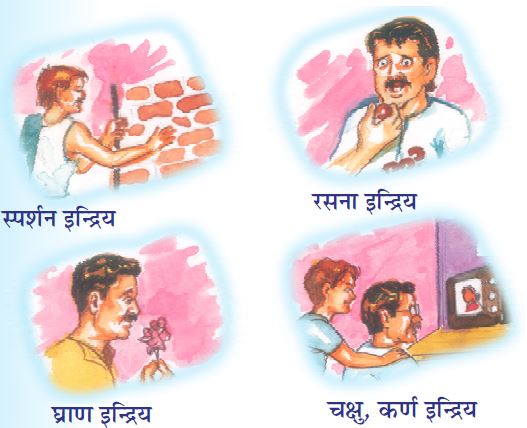
इन जुत विषयनि में जो प्रवृत्त, ताको जानो मिथ्याचरित्त
यों मिथ्यात्वादि निसर्ग जेह, अब जे गृहीत, सुनिये सु तेह ॥८॥
यों मिथ्यात्वादि निसर्ग जेह, अब जे गृहीत, सुनिये सु तेह ॥८॥
अन्वयार्थ : [जो] जो [विषयनि में] पाँच इन्द्रियों के विषयों में [इन जुत] इस-रूप (अगृहीत मिथ्यादर्शन तथा अगृहीत मिथ्याज्ञान सहित) [प्रवृत्त] प्रवृत्ति करता है [ताको] उसे [मिथ्याचरित्त] अगृहीत मिथ्याचारित्र [जानो] समझो । [यों] इस प्रकार [निसर्ग] अगृहीत [मिथ्यात्वादि] मिथ्यादर्शन, मिथ्याज्ञान और मिथ्याचारित्र है (वर्णन किया गया है) [अब जे गृहीत] अब जो गृहीत [मिथ्यादर्शन, ज्ञान, चारित्र ] है [तेह सुनिये] उसे सुनो ।
Meaning : With inborn wrong faith and knowledge, the soul conducts his activities with indulgence in sensual pleasures. This is known as the inborn wrong conduct. (agruhit mithyaachaaritra) All these three things are the reason for unhappiness. One has to remove them with the help of understanding the knowledge of truth (tattva gyaan). Without this understanding, one is unable to get rid of desires of the objects of the senses. Even if these are gracious attachments (shubha raaga) or auspicious objects, they are still the objects of the senses and need to be dismissed. The soul who is engrossed in them ends up forgetting his true nature of super sensuous bliss (atindriya aanand).
गृहीत मिथ्यादर्शन और कुगुरु के लक्षण
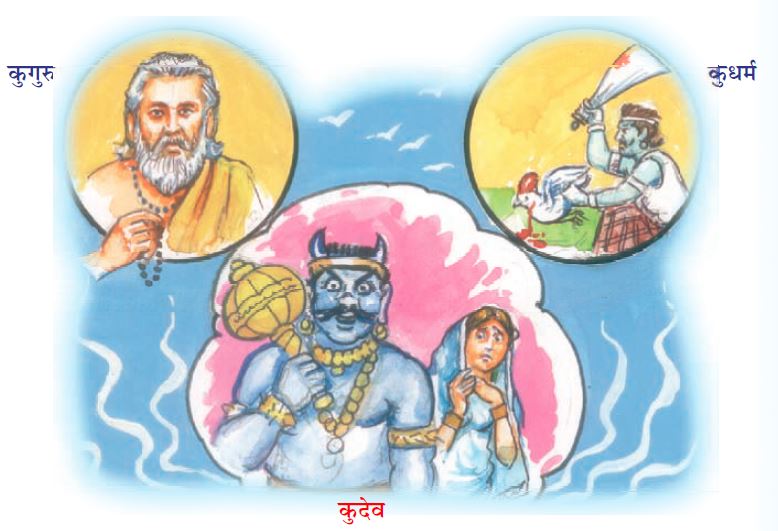
जे कुगुरु कुदेव कुधर्म सेव, पोषैं चिर दर्शनमोह एव
अंतर रागादिक धरैं जेह, बाहर धन अम्बरतैं सनेह ॥९॥
धारैं कुलिंग लहि महत भाव, ते कुगुरु जन्मजल उपलनाव
जो राग-द्वेष मलकरि मलीन, वनिता गदादिजुत चिह्न चीन ॥१०॥
अंतर रागादिक धरैं जेह, बाहर धन अम्बरतैं सनेह ॥९॥
धारैं कुलिंग लहि महत भाव, ते कुगुरु जन्मजल उपलनाव
जो राग-द्वेष मलकरि मलीन, वनिता गदादिजुत चिह्न चीन ॥१०॥
अन्वयार्थ : जो [कुगुरु कुदेव कुधर्म सेव] मिथ्या-गुरु, मिथ्या-देव और मिथ्या-धर्म की सेवा करता है, वह [पोषैं चिर दर्शनमोह एव] अति दीर्घकाल तक मिथ्यादर्शन ही पोषता है । [अंतर रागादिक धरैं जेह] कुगुरु अंतर में मिथ्यात्व-राग-द्वेष आदि धारण करता है और [बाहर धन अम्बरतैं सनेह] बाह्य में धन तथा वस्त्रादि से प्रेम रखता है ।
[धारैं कुलिंग लहि महत भाव] महात्मापने का भाव ग्रहण करके मिथ्यावेषों को धारण करता है, [ते कुगुरु जन्मजल उपलनाव] ऐसा कुगुरु संसाररूपी समुद्र में पत्थर की नौका के समान है (खुद भी डूबता है और शिष्यों को भी डुबोता है) । [जे राग-द्वेष मलकरि मलीन] जो (कुदेव) राग-द्वेषरूपी मैल से मलिन हैं और [वनिता गदादि जुत चिह्न चीन] स्त्री, गदा आदि सहित चिह्नों से पहिचाने जाते हैं ।
[धारैं कुलिंग लहि महत भाव] महात्मापने का भाव ग्रहण करके मिथ्यावेषों को धारण करता है, [ते कुगुरु जन्मजल उपलनाव] ऐसा कुगुरु संसाररूपी समुद्र में पत्थर की नौका के समान है (खुद भी डूबता है और शिष्यों को भी डुबोता है) । [जे राग-द्वेष मलकरि मलीन] जो (कुदेव) राग-द्वेषरूपी मैल से मलिन हैं और [वनिता गदादि जुत चिह्न चीन] स्त्री, गदा आदि सहित चिह्नों से पहिचाने जाते हैं ।
Meaning : One who worships the false preachers, false Lords and false religion (kudharma)is always feeding the right belief deluding karma (darshan mohaniya karma). This is known as the acquired wrong faith.
The false preacher has delusion from within and indulges in external wealth and clothes. He poses as an ascetic with the mark of clothing (dravya lingi muni). He has no attributes of a real ascetic as described in the scriptures. They are like a stone boat sinking in the ocean of transmigration.
The false gods are inherent with the filth of attachment and aversion and are identified with the signs of woman and club etc.
By worshiping false preachers and false gods, one increases his acquired wrong faith and as a result continues to wander in the transmigratory cycle.
The false preacher has delusion from within and indulges in external wealth and clothes. He poses as an ascetic with the mark of clothing (dravya lingi muni). He has no attributes of a real ascetic as described in the scriptures. They are like a stone boat sinking in the ocean of transmigration.
The false gods are inherent with the filth of attachment and aversion and are identified with the signs of woman and club etc.
By worshiping false preachers and false gods, one increases his acquired wrong faith and as a result continues to wander in the transmigratory cycle.
कुधर्म और गृहीत मिथ्यादर्शन का संक्षिप्त लक्षण
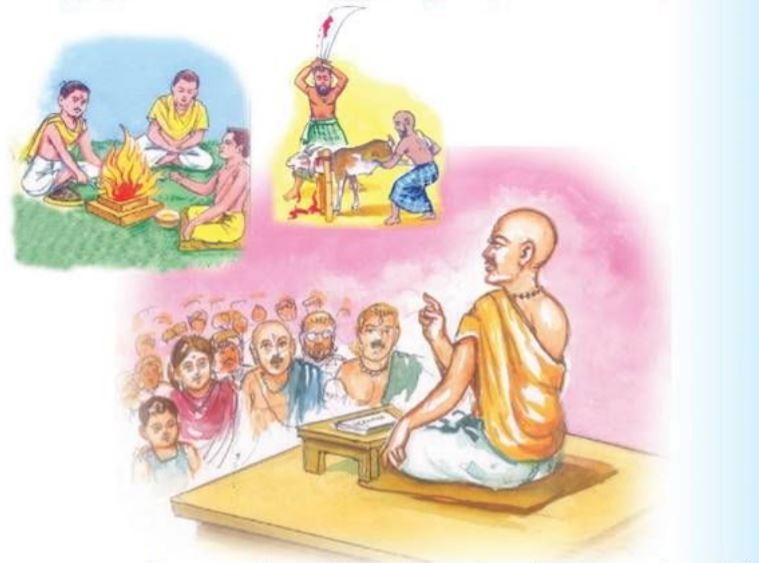
ते हैं कुदेव तिनकी जु सेव, शठ करत न तिन भवभ्रमण छेव
रागादि भावहिंसा समेत, दर्वित त्रस थावर मरण खेत ॥११॥
जे क्रिया तिन्हैं जानहु कुधर्म, तिन सरधै जीव लहै अशर्म
याकूँ गृहीत मिथ्यात्व जान, अब सुन गृहीत जो है अज्ञान ॥१२॥
रागादि भावहिंसा समेत, दर्वित त्रस थावर मरण खेत ॥११॥
जे क्रिया तिन्हैं जानहु कुधर्म, तिन सरधै जीव लहै अशर्म
याकूँ गृहीत मिथ्यात्व जान, अब सुन गृहीत जो है अज्ञान ॥१२॥
अन्वयार्थ : [ते हैं कुदेव] वे झूठे देव हैं, [तिनकी जु सेव शठ] उनकी जो मूर्ख सेवा करते हैं, [करत न तिन भवभ्रमण छेव] उनका संसार में भ्रमण करना नहीं मिटता । [रागादि भावहिंसा समेत] राग-द्वेष आदि भाव-हिंसा सहित तथा [दर्वित त्रस-थावर मरण खेत] त्रस और स्थावर मरण का स्थान द्रव्यहिंसा समेत (कुधर्म है) ।
[जे क्रिया तिन्हैं] जो (पूर्व-कतिथ) क्रियाएँ हैं उन्हें [जानहु कुधर्म] मिथ्याधर्म जानना चाहिये । [तिन सरधै जीव] उनकी श्रद्धा करने से आत्मा [लहै अशर्म] दुःख पाते हैं । [याकूं] इनको (कुगुरु, कुदेव और कुधर्म का श्रद्धान करने को) गृहीत मिथ्यादर्शन जानना, अब गृहीत मिथ्याज्ञान जिसे कहा जाता है उसका वर्णन सुनो ।
[जे क्रिया तिन्हैं] जो (पूर्व-कतिथ) क्रियाएँ हैं उन्हें [जानहु कुधर्म] मिथ्याधर्म जानना चाहिये । [तिन सरधै जीव] उनकी श्रद्धा करने से आत्मा [लहै अशर्म] दुःख पाते हैं । [याकूं] इनको (कुगुरु, कुदेव और कुधर्म का श्रद्धान करने को) गृहीत मिथ्यादर्शन जानना, अब गृहीत मिथ्याज्ञान जिसे कहा जाता है उसका वर्णन सुनो ।
Meaning : The foolish person worships false gods and as a result, keeps on wandering in the transmigratory cycle of life and death.
There is violence in his thought activity (bhaava hinsaa) in the deluded state. There is material violence (dravya hinsaa) in the killing of immobile and mobile lives. The religion, which propagates these two types of violence, is known as false religion.
Therefore to have faith in false preachers, false gods and false religions is known as the acquired wrong faith.
There is violence in his thought activity (bhaava hinsaa) in the deluded state. There is material violence (dravya hinsaa) in the killing of immobile and mobile lives. The religion, which propagates these two types of violence, is known as false religion.
Therefore to have faith in false preachers, false gods and false religions is known as the acquired wrong faith.
गृहीत मिथ्याज्ञान का लक्षण
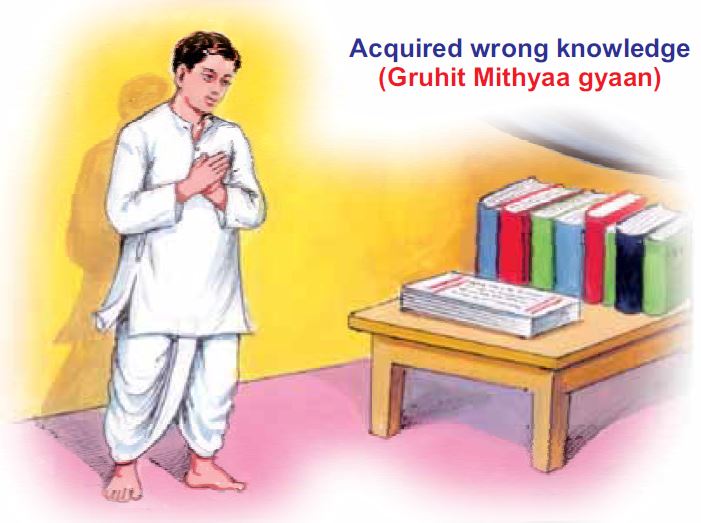
एकान्तवाद-दूषित समस्त, विषयादिक पोषक अप्रशस्त
कपिलादि रचित श्रुत को अभ्यास, सो है कुबोध बहु देन त्रास ॥१३॥
कपिलादि रचित श्रुत को अभ्यास, सो है कुबोध बहु देन त्रास ॥१३॥
अन्वयार्थ : अर्थात् – अनेक धर्मात्मक वस्तु के किसी एक ही धर्म को समस्त वस्तु कहने के कारण, दूषित तथा विषय कषाय आदि को पुष्ट करने वाले कपिल आदि कुगुरूओं के बनाये हुए सब प्रकार के खोटे शास्त्रों का पढ्ना, पढाना, सुनना, सुनाना, गृहीत मिथ्याज्ञान कहलाता है ।
Meaning : The reality comprises of multiple components. The false preceptor proposes only one such component and makes one believe it to be the whole reality. He also creates the scriptures, which feeds the passions and the sensual pleasures. To believe, teach and to learn these types of messages is known as acquired wrong knowledge. (gruhit mithyaagyaan)This type of knowledge brings intense misery.
गृहीत मिथ्याचारित्र का लक्षण

जो ख्याति लाभ पूजादि चाह, धरि करन विविध विध देहदाह
आतम अनात्म के ज्ञानहीन, जे जे करनी तन करन छीन ॥१४॥
आतम अनात्म के ज्ञानहीन, जे जे करनी तन करन छीन ॥१४॥
अन्वयार्थ : शरीर और आत्मा का भेदविज्ञान न होने से जो यश, धनसंपत्ति, आदर-सत्कार आदि की इच्छा से मानादि कषाय के वशीभूत होकर शरीर को क्षीण करनेवाली अनेक प्रकार की क्रियाएँ करता है, उसे "गृहीत मिथ्याचारित्र'' कहते हैं ।
Meaning : The person does not have proper knowledge of the realities. Therefore he does not understand the true nature of the discriminative science (bhed vigyaan) between the soul and the matter. As a result, he adores the wealth, body, the senses, self fame, respect, pride etc. He performs the activities of mortification of body without the understanding the discriminative knowledge of soul and alien substances. He does all these activities to fulfill his desires. This is known as acquired wrong conduct. (mithyaa chaaritra)
मिथ्याचारित्र के त्याग का तथा आत्महित में लगने का उपदेश
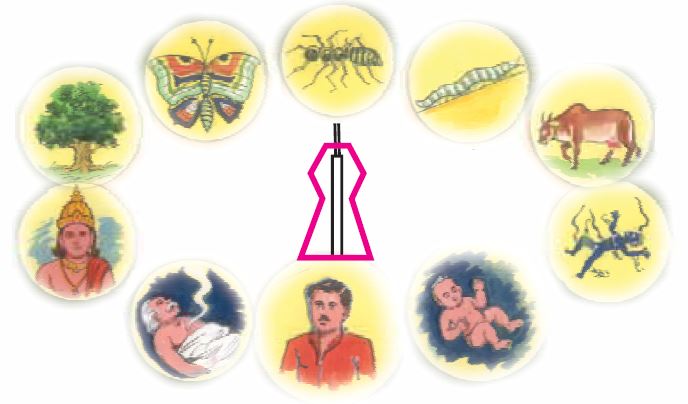
ते सब मिथ्याचारित्र त्याग, अब आतम के हित पंथ लाग
जगजाल-भ्रमण को देहु त्याग, अब दौलत! निज आतम सुपाग ॥१५॥
जगजाल-भ्रमण को देहु त्याग, अब दौलत! निज आतम सुपाग ॥१५॥
अन्वयार्थ : आत्महितैषी जीव को निश्चय सम्यग्दर्शन-ज्ञान-चारित्र ग्रहण करके गृहीत मिथ्यादर्शन-ज्ञान-चारित्र तथा अगृहीत मिथ्यादर्शन-ज्ञान-चारित्र का त्याग करके आत्मकल्याण के मार्ग में लगना चाहिए । श्री पण्डित दौलतरामजी अपनी आत्मा को सम्बोधन करके कहते हैं कि - हे आत्मन्! पराश्रयरूप संसार अर्थात् पुण्य-पाप में भटकना छोड़कर सावधानी से आत्मस्वरूप में लीन हो ॥
Meaning : The living being, for the benefit of the self, should discard the notion of inborn as well as acquired wrong faith, knowledge and conduct. He must practice the nature of the absolute right faith, knowledge and conduct. Pandit Daulatramji addresses his own soul and says that O my soul' The transmigratory cycle of life and death occurs due to the wrong dependency towards alien substances. So as soon as possible, please give up the notion of auspicious and inauspicious activities and get engrossed in the nature of one's own pure soul.
ढाल-3
आत्महित, सच्चा सुख वा द्विविध मोक्षमार्ग का लक्षण
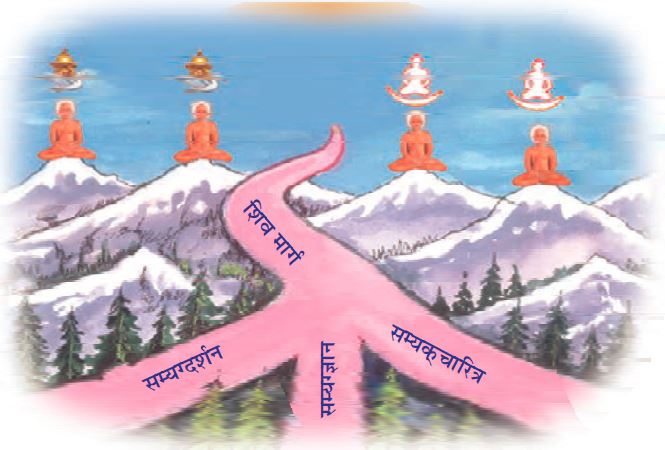
आतम को हित है सुख सो सुख, आकुलता-बिन कहिये
आकुलता शिवमाहिं न तातैं, शिव-मग लाग्यो चहिये ॥
सम्यग्दर्शन-ज्ञान-चरन शिव-मग सो द्विविध विचरो
जो सत्यारथ रूप सो निश्चय, कारण सो व्यवहारो ॥१॥
आकुलता शिवमाहिं न तातैं, शिव-मग लाग्यो चहिये ॥
सम्यग्दर्शन-ज्ञान-चरन शिव-मग सो द्विविध विचरो
जो सत्यारथ रूप सो निश्चय, कारण सो व्यवहारो ॥१॥
अन्वयार्थ : [आतम को हित] आत्मा का कल्याण [है सुख] है सुख की प्राप्ति, [सो सुख] वह सुख [आकुलता बिन] आकुलता रहित [कहिये] कहा जाता है । [आकुलता] आकुलता [शिवमांहि न] मोक्ष में नहीं है, [तातैं शिवमग] इसलिये मोक्षमार्ग में [लाग्यो चहिये] लगना चाहिये । [सम्यग्दर्शन-ज्ञान-चरन] सम्यग्दर्शन-ज्ञान-चारित्र इन तीनों की एकता वह [शिवमग] मोक्ष का मार्ग है । [सो] उस (मोक्षमार्ग) का [द्विविध] दो प्रकार से [विचारो] विचार करना चाहिये कि [जो] जो [सत्यारथरूप] वास्तविक स्वरूप है [सो] वह [निश्चय] निश्चय-मोक्षमार्ग है और [कारण] जो निश्चय-मोक्षमार्ग का निमित्त कारण है [सो] उसे [व्यवहारो] व्यवहार-मोक्षमार्ग कहते हैं ।
Meaning : The (spiritual) wellbeing of the soul is in attainment of spiritual bliss. Spiritual bliss means state of the soul free from disquiet. There is no disquiet in the state of salvation. Therefore one must follow the path of salvation. The path of salvation consists of the Right Faith, Right knowledge and Right Conduct all together and it is considered in two aspects. That which is actual or internal path is the path of salvation from the real point of view and that, which is the cause of actual path, is the path of salvation from the practical point of view.
निश्चय सम्यग्दर्शन ज्ञान चारित्र का लक्षण
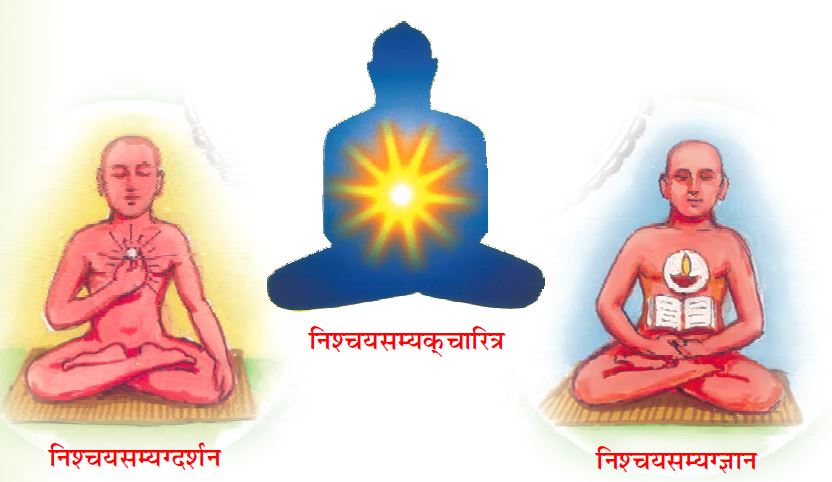
परद्रव्यनतै भिन्न आपमें, रुचि सम्यक्त्व भला है
आपरूप को जानपनो सो, सम्यग्ज्ञान कला है ॥
आपरूप में लीन रहे थिर, सम्यक्चारित्र सोई
अब व्यवहार मोक्ष मग सुनिये, हेतु नियत को होई ॥२॥
आपरूप को जानपनो सो, सम्यग्ज्ञान कला है ॥
आपरूप में लीन रहे थिर, सम्यक्चारित्र सोई
अब व्यवहार मोक्ष मग सुनिये, हेतु नियत को होई ॥२॥
अन्वयार्थ : [आप में] आत्मा में [परद्रव्यनतैं] पर-वस्तुओं से [भिन्न] भिन्नत्व की [रुचि] श्रद्धा करना सो [भला] निश्चय [सम्यक्त्व] सम्यग्दर्शन है; [आपरूप को] आत्मा के स्वरूप को [परद्रव्यनतैं भिन्न] पर-द्रव्यों से भिन्न [जानपनों] जानना [सो] वह [सम्यग्ज्ञान] निश्चय सम्यग्ज्ञान [कला] प्रकाश [है] है ।
[परद्रव्यनतैं भिन्न] पर-द्रव्यों से भिन्न ऐसे [आपरूप में] आत्म-स्वरूप में [थिर] स्थिरतापूर्वक [लीन रहे] लीन होना सो [सम्यक्चारित] निश्चय सम्यक्चारित्र [सोई] है । [अब] अब [व्यवहार मोक्षमग] व्यवहार-मोक्षमार्ग [सुनिये] सुनो कि जो व्यवहार मोक्षमार्ग [नियतको] निश्चय-मोक्षमार्ग का [हेतु] निमित्त कारण [होई] है ।
[परद्रव्यनतैं भिन्न] पर-द्रव्यों से भिन्न ऐसे [आपरूप में] आत्म-स्वरूप में [थिर] स्थिरतापूर्वक [लीन रहे] लीन होना सो [सम्यक्चारित] निश्चय सम्यक्चारित्र [सोई] है । [अब] अब [व्यवहार मोक्षमग] व्यवहार-मोक्षमार्ग [सुनिये] सुनो कि जो व्यवहार मोक्षमार्ग [नियतको] निश्चय-मोक्षमार्ग का [हेतु] निमित्त कारण [होई] है ।
Meaning : To hold a belief that one's soul is different from all other substances is the Right Faith. To know the real nature of one's soul is the Right Knowledge. To remain fully and firmly engrossed in one's soul is the Right Conduct. (This is the path of salvation from real point of view.) Now listen to the path of salvation from practical point of view, which is the cause of the path of salvation from real point of view.
व्यवहार सम्यग्दर्शन का स्वरूप
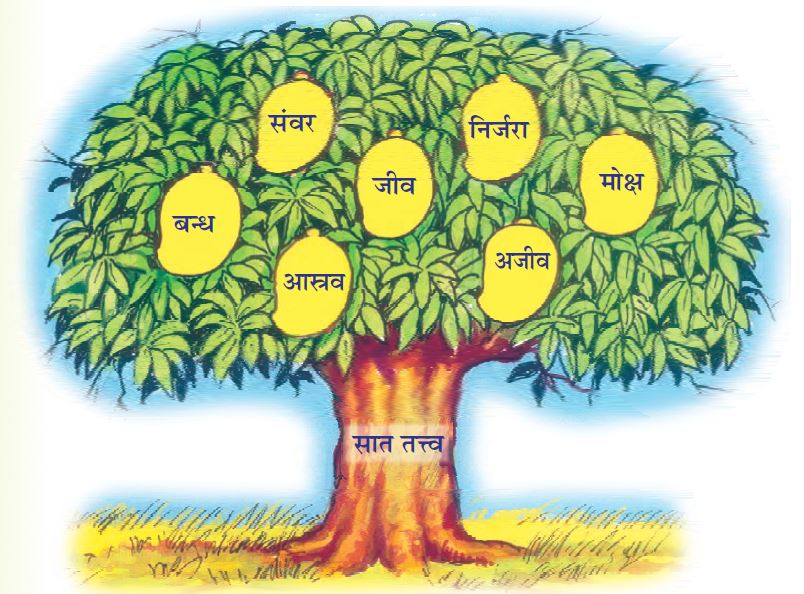
जीव अजीव तत्त्व अरु आस्रव, बंध रु संवर जानो
निर्जर मोक्ष कहे जिन तिनको, ज्यों का त्यों सरधानों
है सोई समकित व्यवहारी, अब इन रूप बखानो
तिनको सुन सामान्य विशेषैं, दिढ प्रतीत उर आनो ॥३॥
निर्जर मोक्ष कहे जिन तिनको, ज्यों का त्यों सरधानों
है सोई समकित व्यवहारी, अब इन रूप बखानो
तिनको सुन सामान्य विशेषैं, दिढ प्रतीत उर आनो ॥३॥
अन्वयार्थ : [जिन] जिनेन्द्रदेव ने [जीव] जीव, [अजीव] अजीव, [आस्रव] आस्रव, [बन्ध] बन्ध, [संवर] संवर, [निर्जरा] निर्जरा, [अरु] और [मोक्ष] मोक्ष [तत्त्व] यह सात तत्त्व [कहे] कहे हैं; [तिनको] उन सबकी [ज्योंका त्यों] यथावत्-यथार्थरूप से [सरधानो] श्रद्धा करो । [सोई] इस प्रकार श्रद्धा करना सो [समकित व्यवहारी] व्यवहारसे सम्यग्दर्शन है । अब [इन रूप] इन सात तत्त्वों के रूप का [बखानो] वर्णन करते हैं; [तिनको] उन्हें [सामान्य विशेषैं] संक्षेप से तथा विस्तार से [सुन] सुनकर [उर] मनमें [दिढ़] अटल [प्रतीत] श्रद्धा [आनो] करो ।
Meaning : To have faith in the nature of seven Tattvas (Realities) i.e. Jeev (Soul), Ajeev (Non-soul), Aashrav (Influx of karamas), Bandh (Bondage of karmas), Sanvar (Stoppage of the influx of karmas), Nirajaraa (Shedding of karmas) and Moksh (Freedom from karmas) as pronounced by Bhagawaan Jinendra is the Right Faith from the practical point of view. I (the author) am going to describe them. Listen them carefully in their general (Saamaany) and particular (Vishesh) aspects so as to keep firm faith in your hearts.
जीव के भेद, बहिरात्मा और उत्तम अंतरात्मा का लक्षण
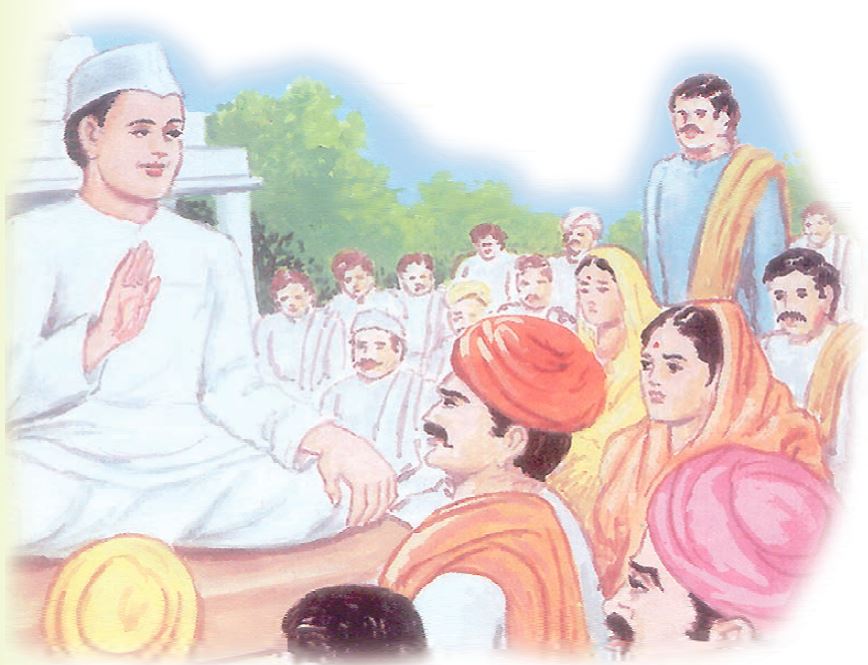
बहिरातम अन्तर आतम परमातम जीव त्रिधा है
देह जीव को एक गिनै बहिरातम तत्त्व मुधा है ॥
उत्तम मध्यम जघन त्रिविध के, अन्तर आतम ज्ञानी
द्विविध संग बिन शुध उपयोगी, मुनि उत्तम निज ध्यानी ॥४॥
देह जीव को एक गिनै बहिरातम तत्त्व मुधा है ॥
उत्तम मध्यम जघन त्रिविध के, अन्तर आतम ज्ञानी
द्विविध संग बिन शुध उपयोगी, मुनि उत्तम निज ध्यानी ॥४॥
अन्वयार्थ : [बहिरातम] बहिरात्मा, [अन्तरआतम] अन्तरात्मा [और ] [परमातम] परमात्मा [इस प्रकार ] [जीव त्रिधा है] जीव तीन प्रकार के हैं; (उनमें) [देह जीवको] शरीर और आत्मा को [एक गिने] एक मानते हैं वे [बहिरातम] बहिरात्मा हैं [और वे बहिरात्मा ] [तत्त्वमुधा] यथार्थ तत्त्वों से अजान अर्थात् तत्त्वमूढ़ मिथ्यादृष्टि हैं । [आतमज्ञानी] आत्मा को पर-वस्तुओं से भिन्न जानकर यथार्थ निश्चय करनेवाले [अन्तरआतम] अन्तरात्मा [कहलाते हैं; वे ] [उत्तम] उत्तम [मध्यम] मध्यम और [जघन] जघन्य –ऐसे [त्रिविध] तीन प्रकार के हैं; (उनमें) [द्विविध] दो प्रकार के (अंतरंग तथा बहिरंग) [संगबिन] परिग्रह रहित [शुध उपयोगी] शुद्ध उपयोगी [निजध्यानी] आत्मध्यानी [मुनि] दिगम्बर मुनि [उत्तम] उत्तम अन्तरात्मा हैं ।
Meaning : (With a view of spiritual development) the stages of Jeev or soul are classified in three states as Bahiraatmaa, Antaraatmaa and Paramaatmaa. One who considers his body and soul as one and the same and is ignorant of the Reality is called the Bahiraatmaa. One who possesses the Right Knowledge is called the Antaraatmaa. The Antaraatmaa is of three kinds Uttam, Madhyam and Jaghany. The Shudhopayogee monks, who are free from internal and external possessions and who are always engrossed in self-mediation are the Uttam Antaraatmaa.
मध्यम और जघन्य अन्तरात्मा तथा सकल परमात्मा
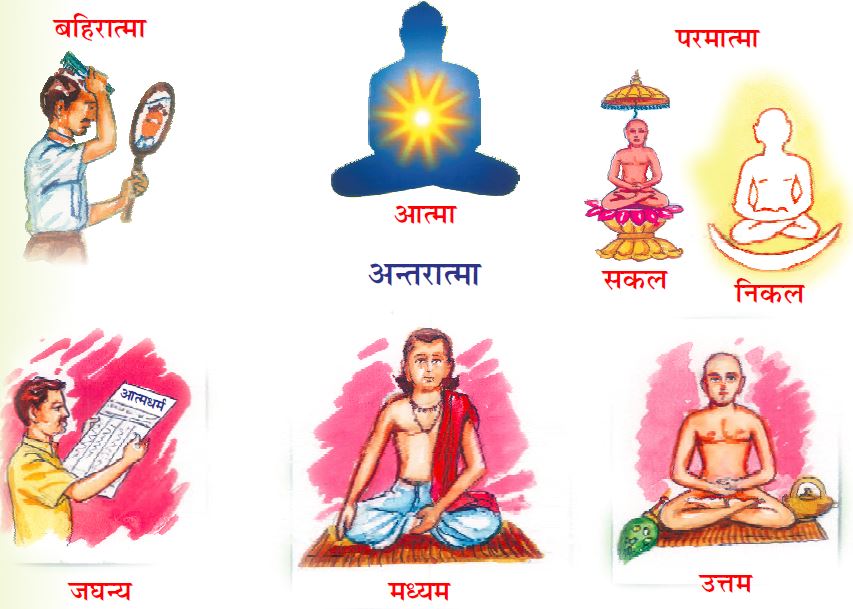
मध्यम अन्तर आतम हैं जे, देशव्रती अनगारी
जघन कहे अविरत समदृष्टि, तीनों शिव-मग चारी ॥
सकल निकल परमातम द्वैविध, तिनमें घाति निवारी
श्री अरिहन्त सकल परमातम, लोकालोक निहारी ॥५॥
जघन कहे अविरत समदृष्टि, तीनों शिव-मग चारी ॥
सकल निकल परमातम द्वैविध, तिनमें घाति निवारी
श्री अरिहन्त सकल परमातम, लोकालोक निहारी ॥५॥
अन्वयार्थ : [अनगारी] अन्तरंग और बहिरंग परिग्रह रहित यथाजातरूपधर भावलिंगी मुनि मध्यम अन्तरात्मा हैं तथा [देशव्रती] दो कषाय के अभाव सहित ऐसे पंचम गुणस्थानवर्ती सम्यग्दृष्टि श्रावक [मध्यम] मध्यम [अन्तर-आतम] अन्तरात्मा [हैं] हैं और [अविरत] व्रतरहित [समदृष्टि] सम्यग्दृष्टि जीव [जघन] जघन्य अन्तरात्मा [कहे] कहलाते हैं; [तीनों] यह तीनों [शिवमगचारी] मोक्षमार्ग पर चलनेवाले हैं । [सकल निकल] सकल और निकल के भेद से [परमातम] परमात्मा [द्वैविध] दो प्रकार के हैं [तिनमें] उनमें [घाति] चार घातिकर्मों को [निवारी] नाश करनेवाले [लोकालोक] लोक तथा अलोक को [निहारी] जानने-देखनेवाले [श्री अरिहन्त] अरहन्त परमेष्ठी [सकल] शरीर सहित [परमातम] परमात्मा हैं ।
Meaning : The house-holders who follow the Partial Vows and monks in the 6th stage of spiritual development with religious activities are Madhyam Antaraatmaa. Those souls who have Right Faith but do not follow any vows are the Jaghany Antaraatmaa. All these three are the followers of the path of salvation. Those who have attained the highest spiritual development are of two kinds i.e. with body and without body. They are called Parmaatmaa (omniscient). Amongs them, those who have destroyed all (four) Ghaatiyaa karmas are revered Arihantas known as Sakal Parmaatmaa. They have attained the power of perceiving the whole universe and beyond the universe.
निकल परमात्मा का लक्षण वा परमात्मा के ध्यान का उपदेश
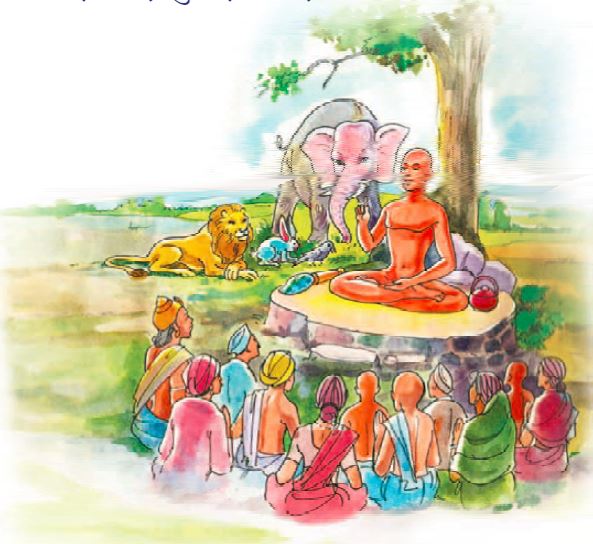
ज्ञानशरीरी त्रिविध कर्म-मल वर्जित सिद्ध महंता
ते हैं निकल अमल परमातम, भोगैं शर्म अनंता ॥
बहिरातमता हेय जानि तजि, अन्तर आतम हूजे
परमातम को ध्याय निरन्तर, जो नित आनंद पूजै ॥६॥
ते हैं निकल अमल परमातम, भोगैं शर्म अनंता ॥
बहिरातमता हेय जानि तजि, अन्तर आतम हूजे
परमातम को ध्याय निरन्तर, जो नित आनंद पूजै ॥६॥
अन्वयार्थ : [ज्ञानशरीरी] ज्ञानमात्र जिनका शरीर है ऐसे [त्रिविध] ज्ञानावरणादि द्रव्यकर्म, रागादि भावकर्म तथा औदारिक शरीरादि नोकर्म–ऐसे तीन प्रकारके [कर्ममल] कर्मरूपी मैल से [वर्जित] रहित, [अमल] निर्मल और [महन्ता] महान [सिद्ध] सिद्ध परमेष्ठी [निकल] निकल [परमातम] परमात्मा हैं ।
वे [अनन्त] अपरिमित [शर्म] सुख [भोगैं] भोगते हैं । इन तीनों में [बहिरातमता] बहिरात्मपने को [हेय] छोड़ने योग्य [जानि] जानकर और [तजि] उसे छोड़कर [अन्तर आतम] अन्तरात्मा [हूजै] होना चाहिये और [निरन्तर] सदा [परमातमको] [निज ] परमात्मपद का [ध्याय] ध्यान करना चाहिए; [जो] जिसके द्वारा [नित] अर्थात् निरंतर [आनन्द] आनन्द [पूजै] प्राप्त किया जाता है ।
वे [अनन्त] अपरिमित [शर्म] सुख [भोगैं] भोगते हैं । इन तीनों में [बहिरातमता] बहिरात्मपने को [हेय] छोड़ने योग्य [जानि] जानकर और [तजि] उसे छोड़कर [अन्तर आतम] अन्तरात्मा [हूजै] होना चाहिये और [निरन्तर] सदा [परमातमको] [निज ] परमात्मपद का [ध्याय] ध्यान करना चाहिए; [जो] जिसके द्वारा [नित] अर्थात् निरंतर [आनन्द] आनन्द [पूजै] प्राप्त किया जाता है ।
Meaning : One of the liberated Great Souls-the Siddhaas are without body. They have perfect knowledge and are completely free from all the three types of karmic filth. They shall remain forever in eternal spiritual bliss. Renounce the state of Bahiraatmaa realizing that it is worth renouncing, attain the state of Antaraatmaa and meditate always over Paramaatmaa for attaining eternal spiritual bliss.
अजीव तत्त्व का लक्षण वा भेद
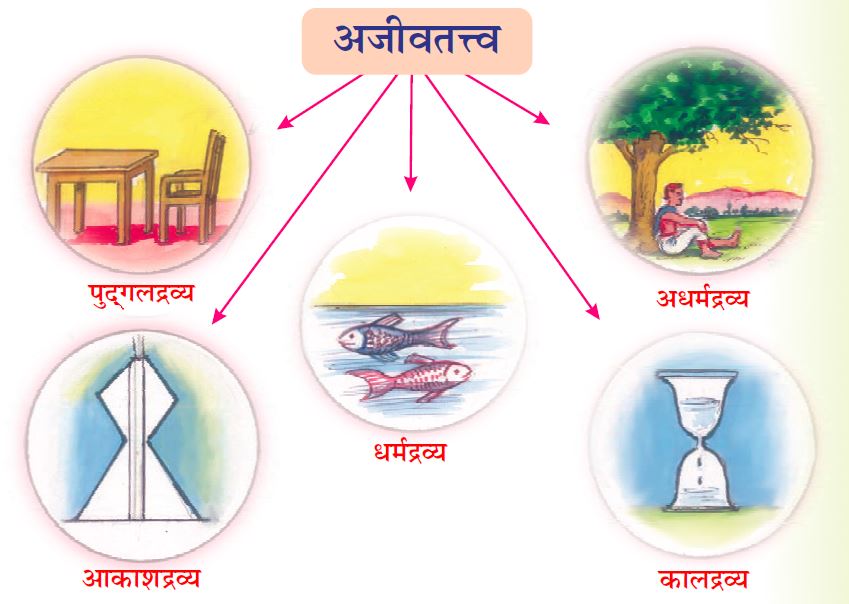
चेतनता-बिन सो अजीव है, पंच भेद ताके हैं
पुद्गल पंच वरन-रस गंध दो, फरस वसु जाके हैं ॥
जिय पुद्गल को चलन सहाई, धर्मद्रव्य अनुरूपी
तिष्ठत होय अधर्म सहाई, जिन बिनमूर्ति निरूपी ॥७॥
पुद्गल पंच वरन-रस गंध दो, फरस वसु जाके हैं ॥
जिय पुद्गल को चलन सहाई, धर्मद्रव्य अनुरूपी
तिष्ठत होय अधर्म सहाई, जिन बिनमूर्ति निरूपी ॥७॥
अन्वयार्थ : जो [चेतनता-बिन] चेतनता रहित है [सो] वह [अजीव] अजीव है; [ताके] उस अजीवके [पंच भेद] पाँच भेद हैं; [जाके पंच वरन-रस] जिसके पाँच वर्ण और रस, दो गन्ध और [वसू] आठ [फ रस] स्पर्श [हैं] होते हैं, वह पुद्गलद्रव्य है । जो [जिय] जीव को (और) [पुद्गल को] पुद्गल को [चलन सहाई] चलने में निमित्त [और ] [अनरूपी] अमूर्तिक है वह [धर्म] धर्म-द्रव्य है तथा [तिष्ठत] गतिपूर्वक स्थिति-परिणाम को प्राप्त (जीव और पुद्गल को) [सहाई] निमित्त [होय] होता है वह [अधर्म] अधर्म द्रव्य है । [जिन] जिनेन्द्र भगवान ने उस अधर्म-द्रव्य को [बिन-मूर्ति] अमूर्तिक, [निरूपी] अरूपी कहा है ।
Meaning : That which is without consciousness is called Ajeev-Tattv. It is of five kinds-Pudgal (Matter); Dharm (Medium of motion); Adharm (Medium of rest), Aakaash (Space) and Kaal (Time). Pudgal possesses five colours, five tastes, two odours and eight kinds of touch as its qualities. Dharm Dravy, which is without touch, taste, colour and odour, is helpful in movement of living beings & matter. Adharm Dravy, which is also without touch, taste, colour and odour, is helpful in rest of living beings & matter. All these are preached by Jinendra Bhagawaan.
आकाश, काल और आस्रव के लक्षण वा भेद
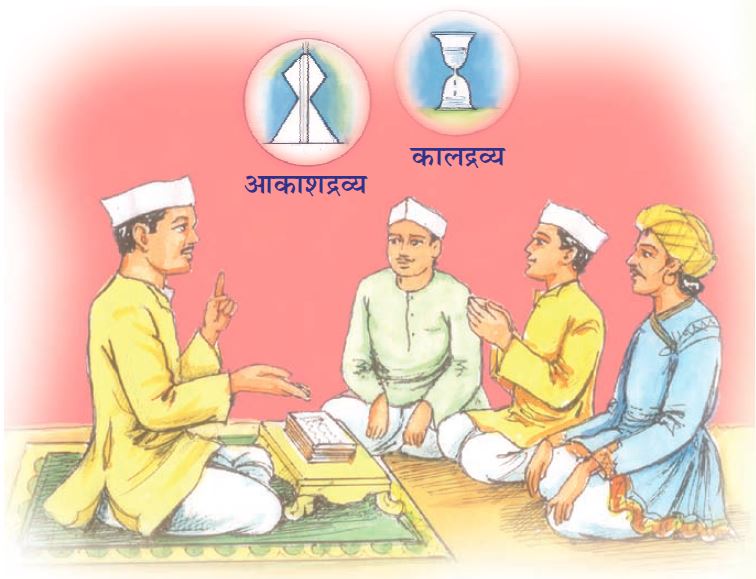
सकल द्रव्य को वास जास में, सो आकाश पिछानो
नियत वर्तना निशिदिन सो, व्यवहार काल परिमानो ॥
यों अजीव, अब आस्रव सुनिये, मन-वच-काय त्रियोगा
मिथ्या अविरत अरु कषाय परमाद सहित उपयोगा ॥८॥
नियत वर्तना निशिदिन सो, व्यवहार काल परिमानो ॥
यों अजीव, अब आस्रव सुनिये, मन-वच-काय त्रियोगा
मिथ्या अविरत अरु कषाय परमाद सहित उपयोगा ॥८॥
अन्वयार्थ : [जास में] जिसमें [सकल] समस्त [द्रव्य को] द्रव्यों का [वास] निवास है [सो] वह [आकाश] आकाश द्रव्य [पिछानो] जानना; [वर्तना] स्वयं प्रवर्तित हो और दूसरों को प्रवर्तित होने में निमित्त हो वह [नियत] निश्चय काल-द्रव्य है; तथा [निशिदिन] रात्रि, दिवस आदि [व्यवहारकाल] व्यवहारकाल [परिमानो] जानो । [यों] इस प्रकार [अजीव] अजीव-तत्त्व का वर्णन हुआ । [अब] अब [आस्रव] आस्रव-तत्त्व [सुनिये] सुनो । [मन-वच-काय] मन, वचन और काया के आलम्बन से आत्मा के प्रदेश चंचल होनेरूप [त्रियोगा] तीन प्रकार के योग तथा मिथ्यात्व, अविरत, कषाय [अरु] और [परमाद] प्रमाद [सहित] सहित [उपयोगा] उपयोग आत्मा की प्रवृत्ति वह [आस्रव] आस्रव-तत्त्व कहलाता है ।
Meaning : Aakaash (space) accommodates all the substances. Kaal Dravy is of two kinds -- Nishchaya Kaal and Vyavahaar Kaal. That which helps in changeability or continuity of all the substances is known as Vartnaa from real point of view (Nishchay Kaal). Night, day etc. are modes of measuring time from practical point of view (Vyavahaar Kaal). This is the description of the non-soul (Ajeev Dravy). Now, listen the principle of influx (or Aashrav). The vibrations (of the spacepoints of the soul) of mind, speech and body, Mithyaatv, Avirati, Kasaay and Pramaad are the causes of the influx of karma in the soul.
आस्रव त्याग का उपदेश और बंध, संवर ,निर्जरा का लक्षण
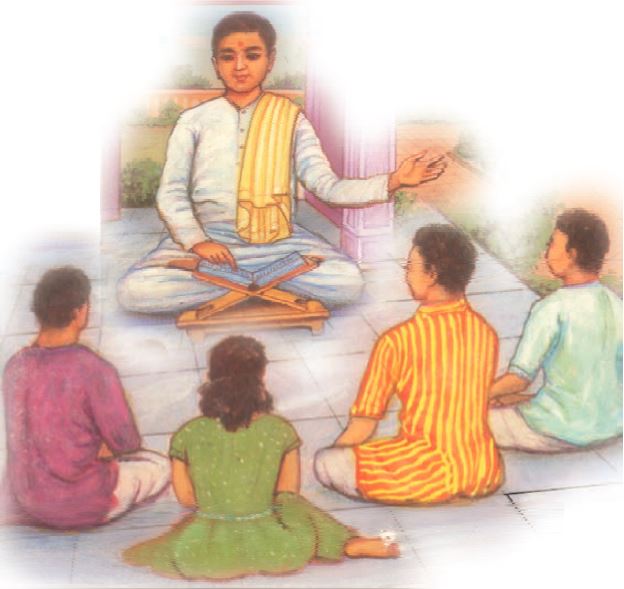
ये ही आतम को दुखकारण, तातैं इनको तजिये
जीव प्रदेश बंधै विधिसों सो बन्धन कबहूं न सजिये ॥
शम-दमतैं जो कर्म न आवैं, सो संवर आदरिये
तप-बलतैं विधि झरन निरजरा ताहि सदा आचरिये ॥९॥
जीव प्रदेश बंधै विधिसों सो बन्धन कबहूं न सजिये ॥
शम-दमतैं जो कर्म न आवैं, सो संवर आदरिये
तप-बलतैं विधि झरन निरजरा ताहि सदा आचरिये ॥९॥
अन्वयार्थ : [ये ही] यह मिथ्यात्वादि ही [आतमको] आत्मा को [दुःख-करण] दुःख के कारण हैं, [तातैं] इसलिये [इनको] इन मिथ्यात्वादि को [तजिये] छोड़ देना चाहिये [जीव-प्रदेश] आत्मा के प्रदेशों का [विधि सों] कर्मों से [बन्धै] बँधना वह [बंधन] बन्ध है [सो] वह (बन्ध) [कबहुँ] कभी भी [न सजिये] नहीं करना चाहिये । [शम] कषायों का अभाव (और) [दम तैं] इन्द्रियों तथा मन को जीतने से [कर्म] कर्म [न आवैं] नहीं आयें वह [संवर] संवर-तत्त्व है; [ताहि] उस संवर को [आदरिये] ग्रहण करना चाहिये । [तपबल तैं] तप की शक्ति से [विधि] कर्मों का [झरन] एकदेश खिर जाना सो [निरजरा] निर्जरा है । [ताहि] उस निर्जरा को [सदा] सदैव [आचरिये] प्राप्त करना चाहिये ।
Meaning : The causes of influx are the causes of sufferings and therefore these should be given up. Intermingling or union of karmas with the spacepoints of the soul is called bondage (or the Bandh Tattv.) One should never do such bondage. Subsidence of passions and control of the sense organs & mind result in stoppage of the influx of karmas. (This is known as Sanvar Tattv.) It should always be resorted to. (This needs to be practised respectfully.) To shed off the karmas with the help of penance is known as Nirajaraa-Tattav. It should always be practised faithfully.
मोक्ष का लक्षण, व्यवहार सम्यक्त्व का लक्षण तथा कारण
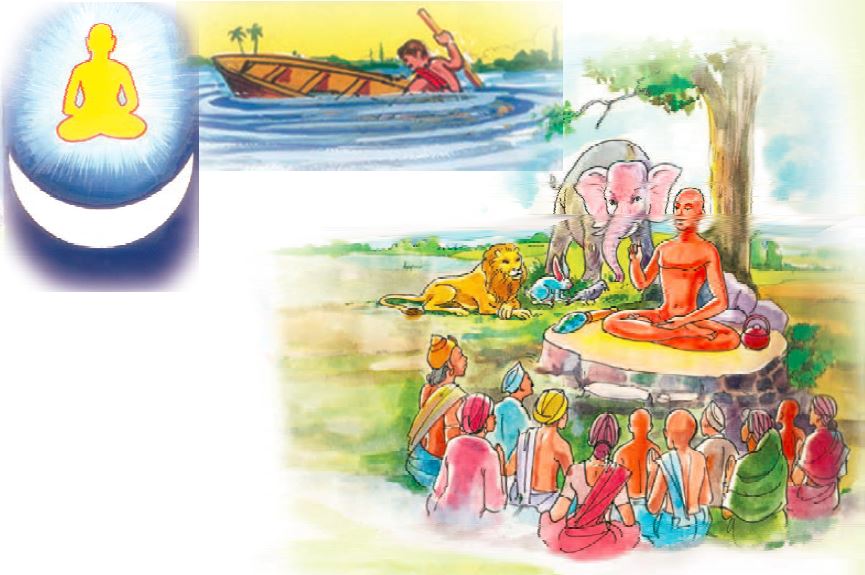
सकल कर्म तैं रहित अवस्था, सो शिव थिर सुखकारी
इहिविधि जो सरधा तत्त्वन की, सो समकित व्यवहारी ॥
देव जिनेन्द्र, गुरु परिग्रह बिन, धर्म दयाजुत सारो
येहु मान समकित को कारण, अष्ट-अंग-जुत धारो ॥१०॥
इहिविधि जो सरधा तत्त्वन की, सो समकित व्यवहारी ॥
देव जिनेन्द्र, गुरु परिग्रह बिन, धर्म दयाजुत सारो
येहु मान समकित को कारण, अष्ट-अंग-जुत धारो ॥१०॥
अन्वयार्थ : [सकल कर्मतैं] समस्त कर्मों से [रहित] रहित [थिर] स्थिर-अटल [सुखकारी] अनन्त सुखदायक [अवस्था] दशा-पर्याय सो [शिव] मोक्ष कहलाता है । [इहि विध] इस प्रकार [जो] जो [तत्त्वन की] सात तत्त्वों के भेद सहित [सरधा] श्रद्धा करना सो [व्यवहारी] व्यवहार [समकित] सम्यग्दर्शन है । [जिनेन्द्र] वीतराग, सर्वज्ञ और हितोपदेशी [देव] सच्चे देव [परिग्रह बिन] चौबीस परिग्रह से रहित [गुरु] वीतराग गुरु (तथा) [सारो] सारभूत [दयाजुत] अहिंसामय [धर्म] जैनधर्म [येहु] इन सबको [समकितको] सम्यग्दर्शन का [कारण] निमित्त कारण [मान] जानना चाहिये । सम्यग्दर्शन को उसके [अष्ट] आठ [अंगजुत] अंगों सहित [धारो] धारण करना चाहिये ।
Meaning : Moksh or salvation is the state completely free from the karmas. It is permanent and blissful. (This is the description of Moksh Tattv.) To have faith on the seven Tattvas as described above is Right Faith from practical point of view. Also belief in Jinendra Bhagawaan, Nirgranth or passionless preceptor and compassionate religion is the cause of the Right Faith. This Right Faith is to be attained along with all its eight limbs (qualities).
सम्यक्त्व के पच्चीस दोष और आठ गुण
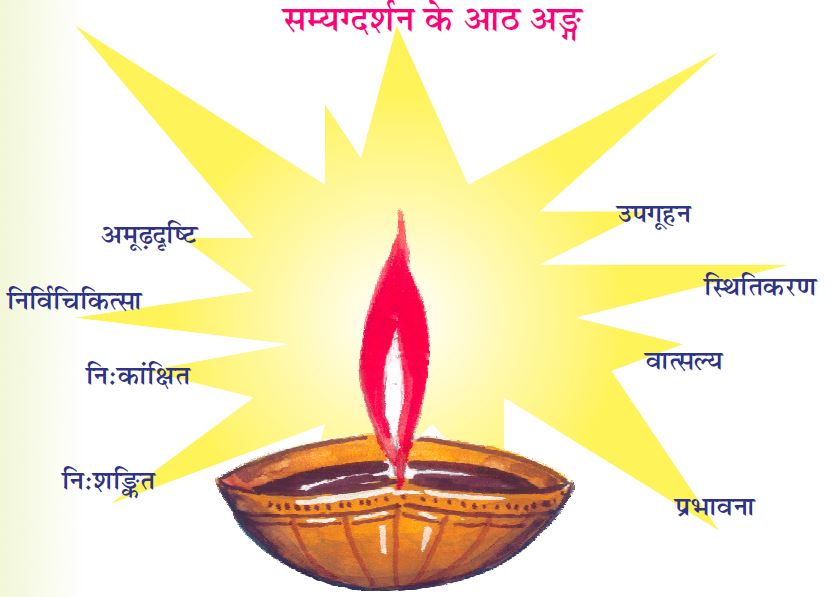
वसु मद टारि निवारि त्रिशठता, षट् अनायतन त्यागो
शंकादिक वसु दोष बिना, संवेगादिक चित पागो
अष्ट अंग अरु दोष पचीसों, तिन संक्षेप हु कहिये
बिन जानें तैं दोष गुननकों, कैसे तजिये गहिये ॥११॥
शंकादिक वसु दोष बिना, संवेगादिक चित पागो
अष्ट अंग अरु दोष पचीसों, तिन संक्षेप हु कहिये
बिन जानें तैं दोष गुननकों, कैसे तजिये गहिये ॥११॥
अन्वयार्थ : [वसु मद टारि] आठ मद का त्याग करके, [निवारि त्रिशठता] तीन प्रकार की मूढता को हटाकर, [षट् अनायतन] छह अनायतनों का [त्यागो] त्याग करना चाहिये । [शंकादिक वसु] शंकादि आठ [दोष विना] दोषों से रहित होकर [संवेगादिक] संवेग, अनुकम्पा, आस्तिक्य और प्रशम में [चित] मनको [पागो] लगाना चाहिये । अब, सम्यक्त्व के [अष्ट अंग अरु] आठ अंग और [पचीसों दोष] पच्चीस दोषों को [संक्षेपै] संक्षेप में [कहिये] कहा जाता है; क्योंकि [बिन जाने तैं] उन्हें जाने बिना [दोष] दोषों को [कैसे] किस प्रकार [तजिये] छोड़ें और [गुनन को] गुणों को किस प्रकार [गहिये] ग्रहण करें ?
Meaning : In order to attain Right Faith, one should avoid the eight prides, give up three follies & association with six places of false religion without eight infirmities like doubt etc. Also one should remain engrossed in self and be fearful of miseries etc. Now I (the author) shall describe the eight attributes and twenty-five infirmities (of Right Faith). How can one give up or accept without knowing demerits and merits? (Therefore its knowledge is necessary.)
सम्यक्त्व के आठ अंगों और शंकादिक आठ दोषों के लक्षण
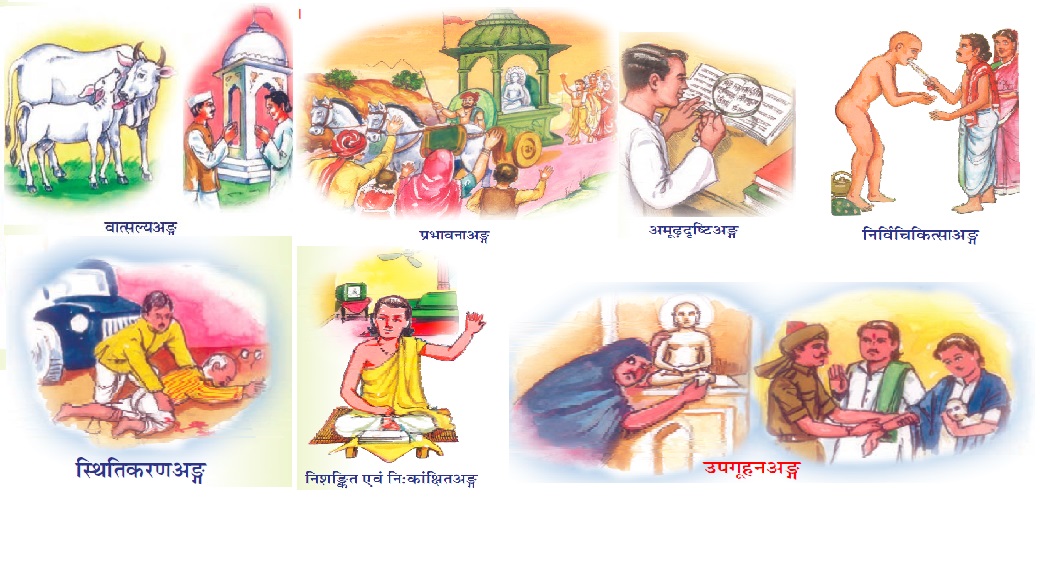
जिन वच में शंका न धार वृष, भव -सुख वांछा भानै
मुनि तन मलिन न देख घिनावै, तत्त्व कुतत्त्व पिछानै ॥
निजगुण अरु पर औगुण ढांकै, वा निज धर्म बढावै
कामादिक कर वृषतैं, चिगते, निज पर को सु दिढावै ॥१२॥
धर्मीसों गौ वच्छ प्रीति सम, कर जिनधर्म दिपावै
इन गुणतैं विपरीत दोष वसु, तिनकों सतत खिपावै ॥
मुनि तन मलिन न देख घिनावै, तत्त्व कुतत्त्व पिछानै ॥
निजगुण अरु पर औगुण ढांकै, वा निज धर्म बढावै
कामादिक कर वृषतैं, चिगते, निज पर को सु दिढावै ॥१२॥
धर्मीसों गौ वच्छ प्रीति सम, कर जिनधर्म दिपावै
इन गुणतैं विपरीत दोष वसु, तिनकों सतत खिपावै ॥
अन्वयार्थ : [जिन वचमें] सर्वज्ञदेव के कहे हुए तत्त्वों में [शंका] संशय-सन्देह [न धार] धारण नहीं करना (सो निःशंकित अंग है); [वृष] धर्म को [धार] धारण करके [भव-सुख-वाँछा] सांसारिक सुखों की इच्छा [भानै] न करे (सो निःकांक्षित अंग है); [मुनि-तन] मुनियों के शरीरादि [मलिन] मैले [देख] देखकर [न घिनावै] घृणा न करना (सो निर्विचिकित्सा अंग है); [तत्त्व-कुतत्त्व] सच्चे और झूठे तत्त्वों की [पिछानै] पहिचान रखे (सो अमूढ़दृष्टि अंग है); [निजगुण] अपने गुणों को [अरु] और [पर औगुण] दूसरे के अवगुणों को [ढाँके] छिपाये [वा] तथा [निजधर्म] अपने आत्म-धर्म को [बढ़ाये] बढ़ये अर्थात् निर्मल बनाए (सो उपगूहन अंग है); [कामादिक कर] काम-विकारादि के कारण [वृषतैं] धर्म से [चिगते] च्युत होते हुए [निज-परको] अपने को तथा पर को [सु दिढावै] उसमें पुनः दृढ़ करे (सो स्थितिकरण अंग है); [धर्मीसों] अपने साधर्मीजनों से [गौ-वच्छ-प्रीति सम] बछड़े पर गाय की प्रीति समान [कर] प्रेम रखना (सो वात्सल्य अंग है) और [जिनधर्म] जैनधर्म की [दिपावै] शोभा में वृद्धि करना (सो प्रभावना अंग है); [इन गुणतैं] इन (आठ) गुणों से [विपरीत] उल्टे [वसु] आठ [दोष] दोष हैं, [तिनको] उन्हें [सतत] हमेशा [खिपावै] दूर करना चाहिये ।
Meaning : Eight limbs of Samygdarshan are now being described. One must have faith without any doubt in the preaching of Bhagawaan Jinendra (it is the first quality of Right Faith). Not to have desire for sensual comforts by following Dharm (is the second quality). Not to feel disgust on seeing the unclean bodies of the monks (is the third quality). To have proper discrimination between the reality and false principles (is the fourth quality). Not to publicize one's merits and others' demerits and to propagate qualities of soul (is the fifth quality). To re-establish one-self and others in the true path when they deviate from (the path of) religion due to passionate feelings like unchastity etc. (is the sixth quality). To have affection with co-religious fellow as the cow keeps affection with its calf (is the seventh quality). To glorify and propagate the religion of Jin (is the eighth quality). Opposite these eight virtues are the eight infirmities, which are to be incessantly destroyed.
सम्यक्त्व के मदनामक आठ दोष
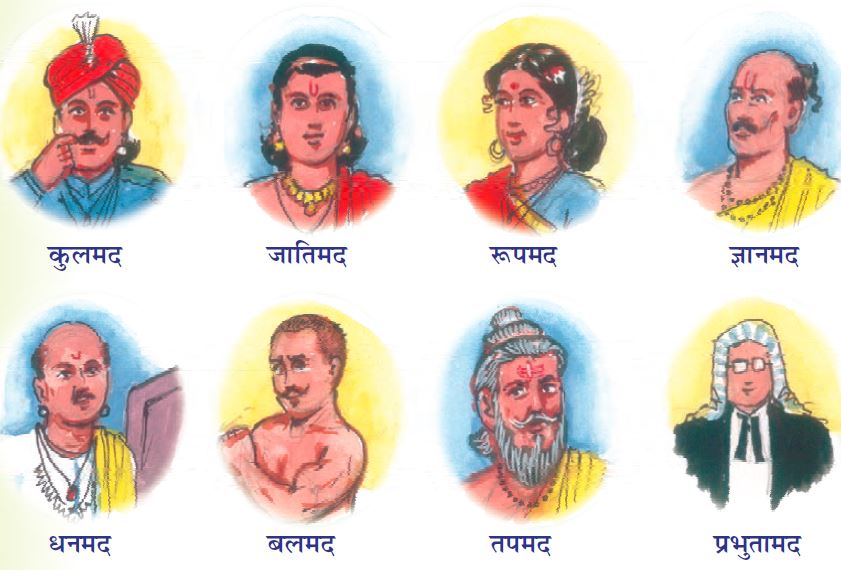
पिता भूप वा मातुल नृप जो, होय न तो मद ठानै
मद न रूप को मद न ज्ञान को, धन बल को मद भानै ॥१३॥
तपकौ मद न मद जु प्रभुता को, करै न सो निज जानै
मद धारै तौ यही दोष वसु, समकित को मल ठानै ॥
मद न रूप को मद न ज्ञान को, धन बल को मद भानै ॥१३॥
तपकौ मद न मद जु प्रभुता को, करै न सो निज जानै
मद धारै तौ यही दोष वसु, समकित को मल ठानै ॥
अन्वयार्थ : (जो जीव) [जो] यदि [पिता] पिता आदि पितृपक्ष के स्वजन [भूप] राजादि [होय] हों [तौ] तो [मद] अभिमान [न ठानै] नहीं करता, (यदि) [मातुल] मामा आदि मातृपक्ष के स्वजन [नृप होय] राजादि हों तो [मद न] अभिमान नहीं करता, [ज्ञान कौ] विद्या का [मद न] अभिमान नहीं करता, [धन कौ] लक्ष्मी का [मद भानै] अभिमान नहीं करता, [बल कौ] शक्ति का [मद भानै] अभिमान नहीं करता, [तप कौ] तप का [मद न] अभिमान नहीं करता, [जु] और [प्रभुताकौ] ऐश्वर्य, बड़प्पनका [मद न करै] अभिमान नहीं करता [सो] वह [निज] अपने आत्माको [जानै] जानता है । (यदि जीव उनका) [मद] अभिमान [धारै] रखता है तो [यही वसु] ऊपर कहे हुए मद आठ [दोष] दोष रूप होकर [समकितकौ] सम्यक्त्वको-सम्यक्दर्शन को [मल ठानै] दूषित करते हैं ।
Meaning : If one's father or maternal uncle happens to be the king, one should not entertain pride (on this account). One should neither have proud of handsome appearance, proud of knowledge, proud of wealth nor proud of power. One should not feel proud of one's austerities (penance) and (one's) authority. If one does not feel proud in its various forms, one can know one's self. If one keeps these prides, it pollutes one's Right Faith with these eight infirmities.
सम्यक्त्व के छः अनायतन दोष और तीन मूढता दोष
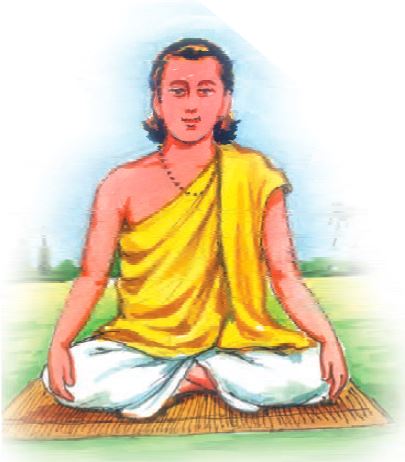
कुगुरू-कुदेव-कुवृष-सेवक की, नहीं प्रशंस उचरै है
जिनमुनि जिनश्रुत बिन, कुगुरादिक, तिन्हें न नमन करै है ॥१४॥
जिनमुनि जिनश्रुत बिन, कुगुरादिक, तिन्हें न नमन करै है ॥१४॥
अन्वयार्थ : (सम्यग्दृष्टि जीव) [कुगुरु-कुदेव-कुवृष-सेवक की] कुगुरु, कुदेव और कुधर्म-सेवक की [प्रशंस] प्रशंसा [नहिं उचरै है] नहीं करता । [जिन] जिनेन्द्रदेव [मुनि] वीतरागी मुनि [और ] [जिनश्रुत] जिनवाणी [विन] के अतिरिक्त (जो) [कुगुरादि] कुगुरु, कुदेव, कुधर्म हैं [तिन्हें] उन्हें [नमन] नमस्कार [न करै है] नहीं करता ।
Meaning : A Right Believer never praises the false preceptors, false Dev and false religion and also their followers. He never pays reverence to false preceptors etc. He only pays obeisance to Jinendra Bhagawaan, Nirgranth Muni & Ahinsaa Dharm.
सम्यक्त्व का महत्व
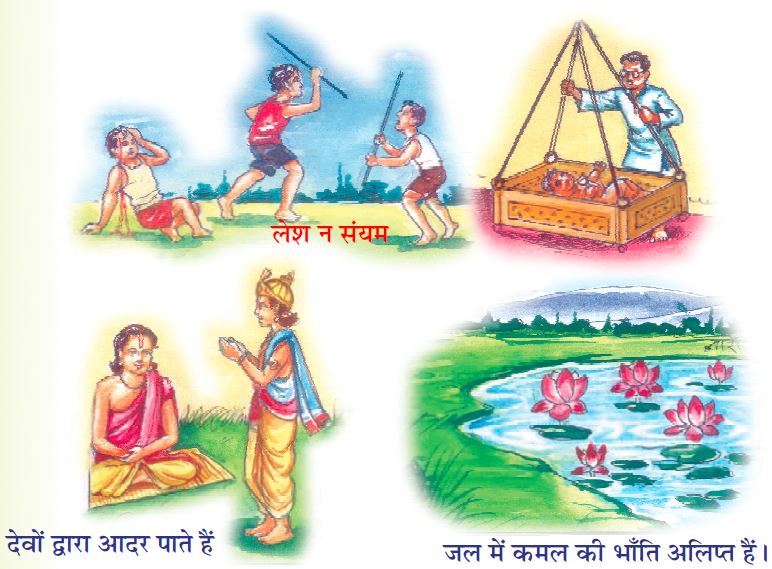
दोष रहित गुण सहित सुधी जे, सम्यक् दरश सजै हैं
चरित मोहवश लेश न संजम, पै सुरनाथ जजै हैं ॥
गेही पै गृह में न रचै ज्यों, जलतैं भिन्न कमल है
नगरनारि को प्यार यथा कादे में हेम अमल है ॥१५॥
चरित मोहवश लेश न संजम, पै सुरनाथ जजै हैं ॥
गेही पै गृह में न रचै ज्यों, जलतैं भिन्न कमल है
नगरनारि को प्यार यथा कादे में हेम अमल है ॥१५॥
अन्वयार्थ : [जे] जो [सुधी] बुद्धिमान पुरुष (ऊपर कहे हुए) [दोष रहित] पच्चीस दोष रहित (तथा) [गुणसहित] निःशंकादि आठ गुणों सहित [सम्यग्दरश] सम्यग्दर्शन से [सजैं हैं] भूषित हैं [उन्हें ] [चरितमोहवश] (अप्रत्याख्यानावरणीय) चारित्रमोहनीय कर्म के उदयवश [लेश] किंचित् भी [संजम] संयम [न] नहीं है [पै] तथापि [सुरनाथ] देवों के स्वामी इन्द्र (उनकी) [जजैं हैं] पूजा करते हैं; (यद्यपि वे) [गेही] गृहस्थ हैं [पै] तथापि [गृह में] घर में [न रचैं] नहीं रचते । [ज्यों] जिस प्रकार [कमल] कमल [जलतैं] जल से [भिन्न] भिन्न है [तथा ] [यथा] जिस प्रकार [कादे में] कीचड़ में [हेम] सुवर्ण [अमल है] शुद्ध रहता है, (उसीप्रकार उनका घर में) [नगरनारि कौ] वेश्या के [प्यार यथा] प्रेम की भाँति [प्यार] प्रेम (होता है) ।
Meaning : Pious & wise persons, who cherish Right Faith without any infirmities and with (all eight) qualities are praised by the Lord of Heaven, though they (Right Believers) may not have even small restrained conduct due to fruition of conduct deluding karm. Such Right Believers although remain in their houses (with their families) but do not indulge in them in the same manner as the lotus, though in water, remains different from (untouched from) water, as the transient love of a prostitute and as the gold lying in mud remain free from filth.
सम्यग्दृष्टि कहां कहां उत्पन्न नहीं होता तथा सर्वोत्तम सुख
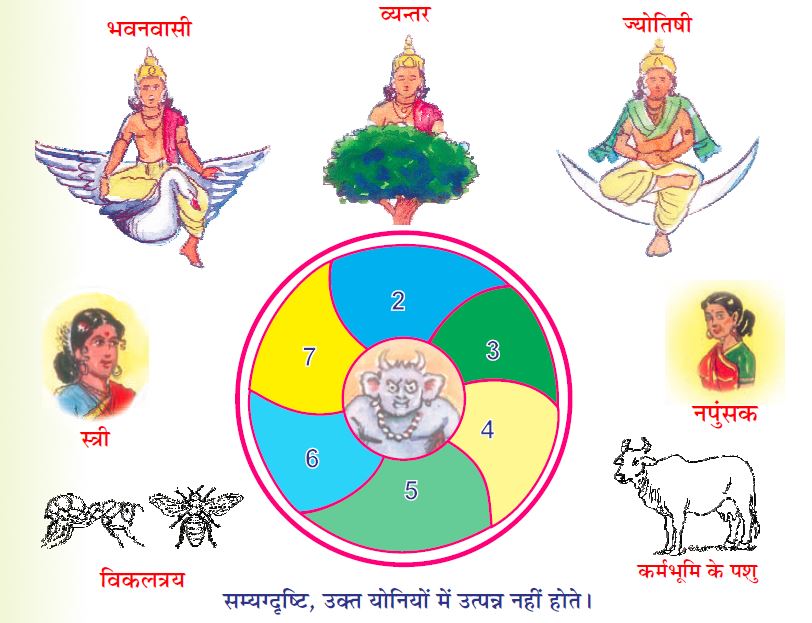
प्रथम नरक बिन षट भू ज्योतिष, वान भवन षंड नारी
थावर विकलत्रय पशु में नहिं उपजत सम्यकधारी ॥
तीन-लोक तिहुं-काल माहिं नहिं, दर्शन सो सुखकारी
सकल धरम को मूल यही इस, बिन करनी दुखकारी ॥१६॥
थावर विकलत्रय पशु में नहिं उपजत सम्यकधारी ॥
तीन-लोक तिहुं-काल माहिं नहिं, दर्शन सो सुखकारी
सकल धरम को मूल यही इस, बिन करनी दुखकारी ॥१६॥
अन्वयार्थ : [सम्यक्धारी] सम्यग्दृष्टि जीव [प्रथमनरक विन] पहले नरक के अतिरिक्त [षट् भू] शेष छह नरकों में, [ज्योतिष] ज्योतिषी देवों में, [वान] व्यंतर देवों में, [भवन] भवनवासी देवों में [षंढ] नुपंसकों में [नारी] स्त्रियों में, [थावर] पाँच स्थावरों में, [विकलत्रय] द्वीन्द्रिय, त्रीन्द्रिय और चतुरिन्द्रिय जीवों में तथा [पशु में] पशुओं में [नहिं उपजत] उत्पन्न नहीं होते । [तीनलोक] तीनलोक [तिहुंकाल] तीनकाल में [दर्शन सो] सम्यग्दर्शन के समान [सुखकारी] सुखदायक [नहिं] अन्य कुछ नहीं है, [यही] यह सम्यग्दर्शन ही [सकल धरमको] समस्त धर्मों का [मूल] मूल है; [इस बिन] इस सम्यग्दर्शन के बिना [करनी] समस्त क्रियाएँ [दुखकारी] दुःखदायक हैं ।
Meaning : A Right Believer is not born in his next incarnations as inhabitant of hell except the first earth (out of seven), as a Jyotis, as a Vyantar and as Bhavanavaasee celestial, as a hermaphrodite, as a female, as an immobile organism and as a Vikalatray Jeev. In all the three parts of universe and in past, present & future time, there is nothing else as bliss-yielding as the Right Faith. This Right Faith is the root of religion (or religious life). All activities in its absence brew suffering.
सम्यग्दर्शन के बिना ज्ञान चारित्र के मिथ्यापना
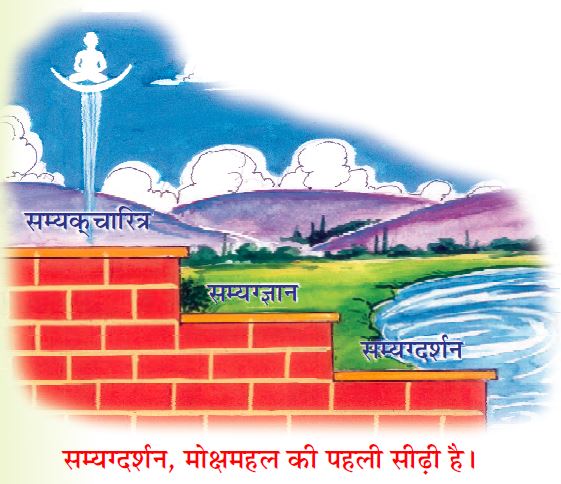
मोक्षमहल की परथम सीढी, या बिन ज्ञान चरित्रा
सम्यकता न लहैं सो दर्शन, धारो भव्य पवित्रा ॥
दौल समझ सुन चेत सयाने, काल वृथा मत खोवै
यह नरभव फिर मिलन कठिन है, जो सम्यक नहिं होवै ॥१७॥
सम्यकता न लहैं सो दर्शन, धारो भव्य पवित्रा ॥
दौल समझ सुन चेत सयाने, काल वृथा मत खोवै
यह नरभव फिर मिलन कठिन है, जो सम्यक नहिं होवै ॥१७॥
अन्वयार्थ : (यह सम्यग्दर्शन) [मोक्षमहल की] मोक्षरूपी महल की [परथम] प्रथम [सीढ़ी] सीढ़ी है; [या बिन] इस (सम्यग्दर्शन) के बिना [ज्ञान चरित्रा] ज्ञान और चारित्र [सम्यक्ता] सच्चाई [न लहै] प्राप्त नहीं करते; इसलिये [भव्य] हे भव्य जीवों ! [सो] ऐसे [पवित्रा] पवित्र [दर्शन] सम्यग्दर्शन को [धारो] धारण करो । [सयाने 'दौल'] हे समझदार दौलतराम ! [सुन] सुन [समझ] समझ और [चेत] सावधान हो, [काल] समय को [वृथा] व्यर्थ [मत खोवै] न गँवा; (क्योंकि) [जो] यदि [सम्यक्] सम्यग्दर्शन [नहिं होवै] नहीं हुआ तो [यह] यह [नरभव] मनुष्य पर्याय [फिर] पुनः [मिलन] मिलना [कठिन है] दुर्लभ है ।
Meaning : Right Faith is the first step of (leading to) the palace of Moksh. In its absence, Knowledge and Conduct do not earn the quality of righteousness. This Right Faith is, therefore attained by liberable and holy ones (Bhavy Jeev). O Doulatram! Understand, listen and be awake. Do not waste your time vainly; (Author is exhorting everyone as well as himself) because it is difficult to get this human life again if you do not earn the Right Faith.
ढाल-4
सम्यग्ज्ञान की प्रेरणा

सम्यक् श्रद्धा धारि पुनि, सेवहु सम्यग्ज्ञान
स्व-पर अर्थ बहु धर्मजुत, जो प्रगटावन भान ॥१॥
स्व-पर अर्थ बहु धर्मजुत, जो प्रगटावन भान ॥१॥
अन्वयार्थ : [सम्यक् श्रद्धा] सम्यग्दर्शन [धारि] धारण करके[पुनि] फि र [सम्यग्ज्ञान] सम्यग्ज्ञानका [सेवहु] सेवन करो; (जो सम्यग्ज्ञान) [बहु धर्मजुत] अनेक धर्मात्मक [स्व-पर अर्थ] अपना और दूसरे पदार्थोंका [प्रगटावन] ज्ञान करानेमें [भान] सूर्य समान है ।
Meaning : On attaining Right Faith, one must attempt to acquire Right Knowledge, which is like the sun illuminating the self (Swa) and other (Par) with their many characteristics.
सम्यक्दर्शन और ज्ञान में भेद

सम्यक् साथै ज्ञान होय, पै भिन्न अराधौ
लक्षण श्रद्धा जान, दुहू में भेद अबाधौ
सम्यक् कारण जान, ज्ञान कारज है सोई
युगपत् होते हू, प्रकाश दीपकतैं होई ॥२॥
लक्षण श्रद्धा जान, दुहू में भेद अबाधौ
सम्यक् कारण जान, ज्ञान कारज है सोई
युगपत् होते हू, प्रकाश दीपकतैं होई ॥२॥
अन्वयार्थ : [सम्यक् साथै] सम्यग्दर्शनके साथ[ज्ञान] सम्यग्ज्ञान [होय] होता है । [पै] तथापि (उन दोनोंको) [भिन्न] भिन्न [अराधौ] समझना चाहिये; क्योंकि [लक्षण] उन दोनोंके लक्षण (क्रमशः) [श्रद्धा] श्रद्धा करना और [जान] जानना है तथा [सम्यक्] सम्यग्दर्शन [कारण] कारण है और [ज्ञान] सम्यग्ज्ञान [कारज] कार्य है । [सोई] यह भी [दुहूमें] दोनोंमें [भेद] अन्तर [अबाधौ] निर्बाध है । (जिसप्रकार) [युगपत्] एक साथ [होते हू] होने पर भी [प्रकाश] उजाला [दीपकतैं] दीपककी ज्योतिसे [होई] होता है उसीप्रकार ।
Meaning : Right Faith and Right Knowledge manifest simultaneously but they should be understood distinctively. The characteristic of Right Faith is the belief while that of Right Knowledge is knowing. This distinction (between them) is uncontradicted. Right Faith is the cause and Right Knowledge is its effect, although both of them occur simultaneously, like lighting the lamp and emission of light from it.
सम्यग्ज्ञान के भेद
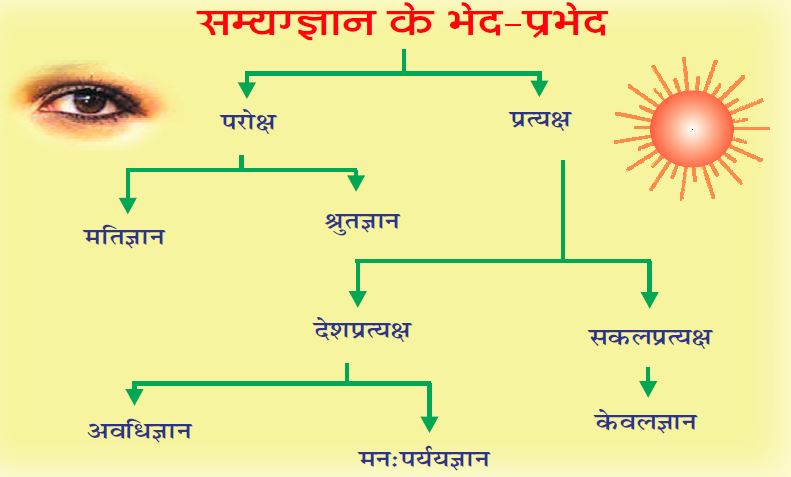
तास भेद दो हैं, परोक्ष परतछि तिन माहिं
मति श्रुत दोय परोक्ष, अक्ष मनतैं उपजाहीं
अवधिज्ञान मनपर्जय दो हैं देश-प्रतच्छा
द्रव्य क्षेत्र परिमाण लिये जानै जिय स्वच्छा ॥३॥
मति श्रुत दोय परोक्ष, अक्ष मनतैं उपजाहीं
अवधिज्ञान मनपर्जय दो हैं देश-प्रतच्छा
द्रव्य क्षेत्र परिमाण लिये जानै जिय स्वच्छा ॥३॥
अन्वयार्थ : [तास] उस सम्यग्ज्ञानके [परोक्ष] परोक्षऔर [परतछि] प्रत्यक्ष [दो] दो [भेद हैं] भेद हैं; [तिन मांहीं]उनमें [मति श्रुत] मतिज्ञान और श्रुतज्ञान [दोय] यह दोनों [परोक्ष] परोक्षज्ञान हैं । (क्योंकि वे) [अक्ष मनतैं] इन्द्रियों तथामनके निमित्तसे [उपजाहीं] उत्पन्न होते हैं । [अवधिज्ञान] अवधिज्ञान और [मनपर्जय] मनःपर्ययज्ञान [दो] यह दोनों ज्ञान[देश-प्रतच्छा] देशप्रत्यक्ष [हैं] हैं; (क्योंकि इन ज्ञानोंसे) [जिय]जीव [द्रव्य क्षेत्र परिमाण] द्रव्य और क्षेत्रकी मर्यादा [लिये] लेकर[स्वच्छा] स्पष्ट [जानै] जानता है ।
Meaning : Right Knowledge is of two kinds-direct or immediate (Pratyaksh) and indirect or mediate (Paroksh). Among them the Sensual Knowledge and Scriptural Knowledge are indirect, because these are acquired with the help of sense organs and mind. Avadhi (clairvoyance) and Manaparjay (telepathy) are partially direct, as with these a Jeev knows (things) directly with limitations of substances and places.
केवलज्ञान
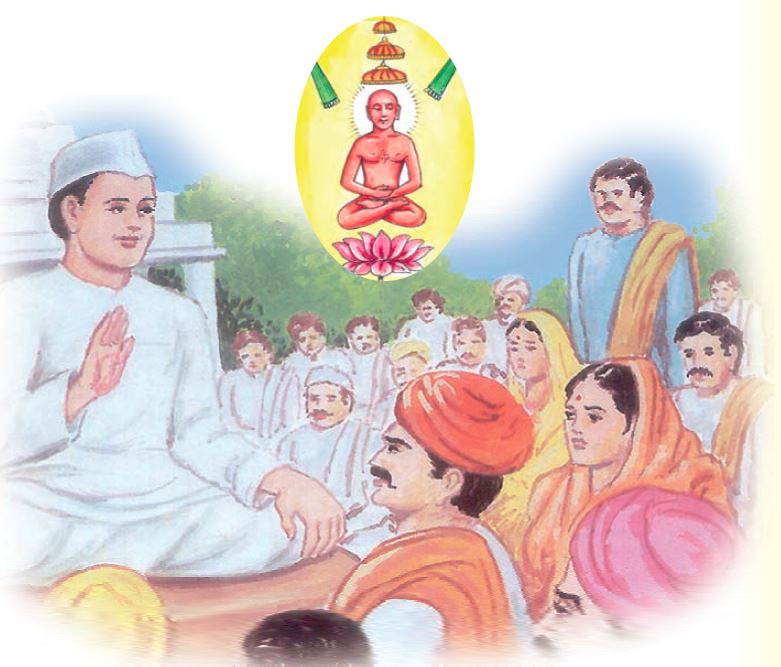
सकल द्रव्य के गुन अनंत, परजाय अनंता
जानैं एकै काल, प्रकट केवलि भगवन्ता
ज्ञान समान न आन जगत में सुख कौ कारन
इहि परमामृत जन्मजरामृति-रोग-निवारन ॥४॥
जानैं एकै काल, प्रकट केवलि भगवन्ता
ज्ञान समान न आन जगत में सुख कौ कारन
इहि परमामृत जन्मजरामृति-रोग-निवारन ॥४॥
अन्वयार्थ : (जिस ज्ञान से) [केवलि भगवन्ता] केवलज्ञानी भगवान [सकल द्रव्य के] छहों द्रव्यों के [अनन्त] अपरिमित [गुन] गुणों को और [अनन्ता] अनन्त [परजाय] पर्यायों को [एकै काल] एक साथ [प्रगट] स्पष्ट [जानै] जानते हैं (उस ज्ञान को) [सकल] सकल-प्रत्यक्ष अथवा केवलज्ञान कहते हैं । [जगत में] इस जगत में [ज्ञान समान] सम्यग्ज्ञान जैसा [आन] दूसरा कोई पदार्थ [सुख कौ] सुख का [न कारन] कारण नहीं है । [इहि] यह सम्यग्ज्ञान ही [जन्मजरामृति-रोग-निवारन] जन्म, जरा (वृद्धावस्था) और मृत्युरूपी रोगों को दूर करने के लिये [परमामृत] उत्कृष्ट अमृत-समान है ।
Meaning : All the substances have infinite attributes (Gunn) and also infinite modes (Parjaay). The Omniscient (Kevali Bhagawaan) knows all of them directly and also simultaneously at the same time. In the universe, there is no other cause of spiritual bliss except the Right Knowledge. This Right Knowledge is like supreme nectar, which cures the disease of birth, old age and death.
ज्ञानी और अज्ञानी में अंतर
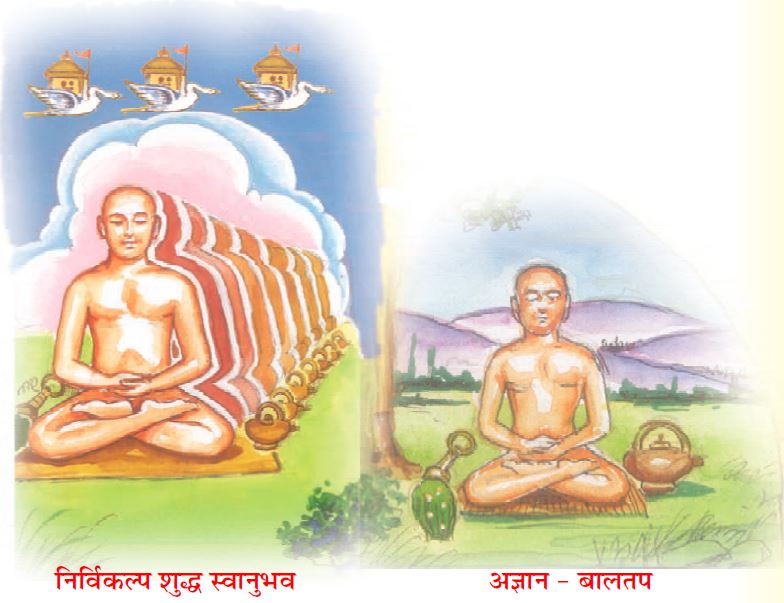
कोटि जन्म तप तपैं, ज्ञान बिन कर्म झरैं जे
ज्ञानी के छिनमांहि त्रिगुप्ति तैं सहज टरैं ते
मुनिव्रत धार अनन्तबार ग्रीवक उपजायो
पै निज आतमज्ञान बिना, सुख लेश न पायौ ॥५॥
ज्ञानी के छिनमांहि त्रिगुप्ति तैं सहज टरैं ते
मुनिव्रत धार अनन्तबार ग्रीवक उपजायो
पै निज आतमज्ञान बिना, सुख लेश न पायौ ॥५॥
अन्वयार्थ : [ज्ञान बिना] सम्यग्ज्ञान के बिना [कोटि जन्म] करोड़ों जन्मों तक [तप तपैं] तप करने से [जे कर्म] जितने कर्म [झरैं] नाश होते हैं [ते] उतने कर्म [ज्ञानी के] सम्यग्ज्ञानी जीव के [त्रिगुप्ति तैं] मन, वचन और काय की ओर की प्रवृत्ति को रोकने से (निर्विकल्प शुद्ध स्वभाव से) [छिन में] क्षणमात्र में [सहज] सरलता से [टरै] नष्ट हो जाते हैं । (यह जीव) [मुनिव्रत] मुनियों के महाव्रतों को [धार] धारण करके [अनन्तबार] अनन्तबार [ग्रीवक] नवें ग्रैवेयक तक [उपजायो] उत्पन्न हुआ, [पै] परन्तु [निज आतम] अपने आत्मा के [ज्ञान विना] ज्ञान बिना [लेश] किंचित्मात्र [सुख] सुख [न पायो] प्राप्त न कर सका ।
Meaning : The Right knower sheds off his karmas in a moment through three Restraints (Trigupti). These karmas shall not be shed off even by performing penance without Right knowledge over millions of births. The Jeev is born in Greveyak (higher heavens) infinite times after having the Great Vows of the monks but without the true Knowledge of own-self, but it could not get even an iota of spiritual bliss.
दुर्लभ मनुष्य पर्याय ज्ञानाभ्यास द्वारा सफल
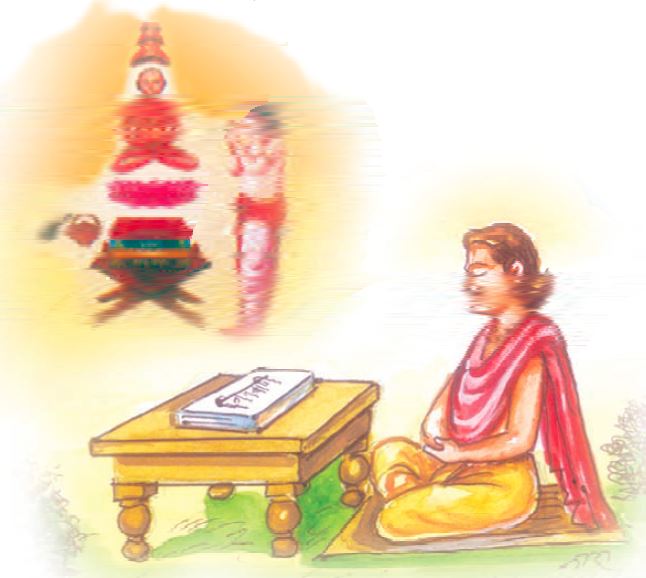
तातैं जिनवर-कथित तत्त्व अभ्यास करीजे
संशय विभ्रम मोह त्याग, आपो लख लीजे
यह मानुष पर्याय, सुकुल, सुनिवौ जिनवानी
इह विध गये न मिले, सुमणि ज्यौं उदधि समानी ॥६॥
संशय विभ्रम मोह त्याग, आपो लख लीजे
यह मानुष पर्याय, सुकुल, सुनिवौ जिनवानी
इह विध गये न मिले, सुमणि ज्यौं उदधि समानी ॥६॥
अन्वयार्थ : [तातैं] इसलिये [जिनवर-कथित] जिनेन्द्र भगवान के कहे हुए [तत्त्व] परमार्थ तत्त्व का [अभ्यास] अभ्यास [करीजे] करना चाहिये और [संशय] संशय [विभ्रम] विपर्यय तथा [मोह] अनध्यवसाय (अनिश्चितता) को [त्याग] छोड़कर [आपो] अपने आत्मा को [लख लीजे] लक्ष में लेना चाहिये अर्थात् जानना चाहिये । (यदि ऐसा नहीं किया तो) [यह] यह [मानुष पर्याय] मनुष्य भव [सुकुल] उत्तम कुल और [जिनवानी] जिनवाणी का [सुनिवौ] सुनना [इह विध] ऐसा सुयोग [गये] बीत जाने पर, [उदधि] समुद्र में [समानी] समाये-डूबे हुए [सुमणि ज्यौं] सच्चे रत्न की भाँति (पुनः) [न मिलै] मिलना कठिन है ।
Meaning : Therefore one must study (or practice) the principles (Tattvas) as pronounced by Bhagawaan Jinendra, and realize the nature of pure soul by keeping off Sanshay (doubt), Vibhram (perversion) and Moh (indifference). It is very rare to get this human birth, noble family (higher clan) and the opportunity to listen to the preachings of Jinendra. After all this, if one does not take full advantage of this opportunity, it is like not regaining a ruby that (after being thrown) has gone deep in the ocean.
ज्ञान की महिमा
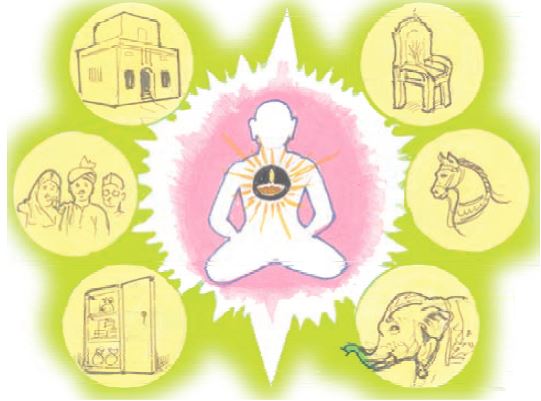
धन समाज गज बाज, राज तो काज न आवै
ज्ञान आपकौ रूप भये, फिर अचल रहावै
तास ज्ञान को कारन, स्व-पर विवेक बखानौ
कोटि उपाय बनाय भव्य, ताको उर आनौ ॥७॥
ज्ञान आपकौ रूप भये, फिर अचल रहावै
तास ज्ञान को कारन, स्व-पर विवेक बखानौ
कोटि उपाय बनाय भव्य, ताको उर आनौ ॥७॥
अन्वयार्थ : [धन] पैसा, [समाज] परिवार, [गज] हाथी, [बाज] घोड़ा, [राज] राज्य [तो] तो [काज] अपने काममें [न आवै] नहीं आते; किन्तु [ज्ञान] सम्यग्ज्ञान [आपको रूप] आत्मा का स्वरूप (जो) [भये] प्राप्त होने के [फिर] पश्चात् [अचल] अचल [रहावै] रहता है । [तास] उस [ज्ञान को] सम्यग्ज्ञान का [कारन] कारण [स्व-पर विवेक] आत्मा और परवस्तुओं का भेदविज्ञान [बखानौ] कहा है, (इसलिये) [भव्य] हे भव्य जीवों ! [कोटि] करोड़ों [उपाय] उपाय [बनाय] करके [ताको] उस भेदविज्ञान को [उर आनौ] हृदय में धारण करो ।
Meaning : Wealth, society, elephants, horses, kingdoms etc. are not useful for the emancipation of soul. Right Knowledge is the intrinsic quality of the soul and once attained remains permanently with the soul. The primary cause in the attainment of omniscience is the Right Knowledge of discrimination between "Self" and "Others". Therefore O Bhavy Jeev! Make crores of effort to attain it and to keep it close to your heart.
सम्यग्ज्ञान की महिमा
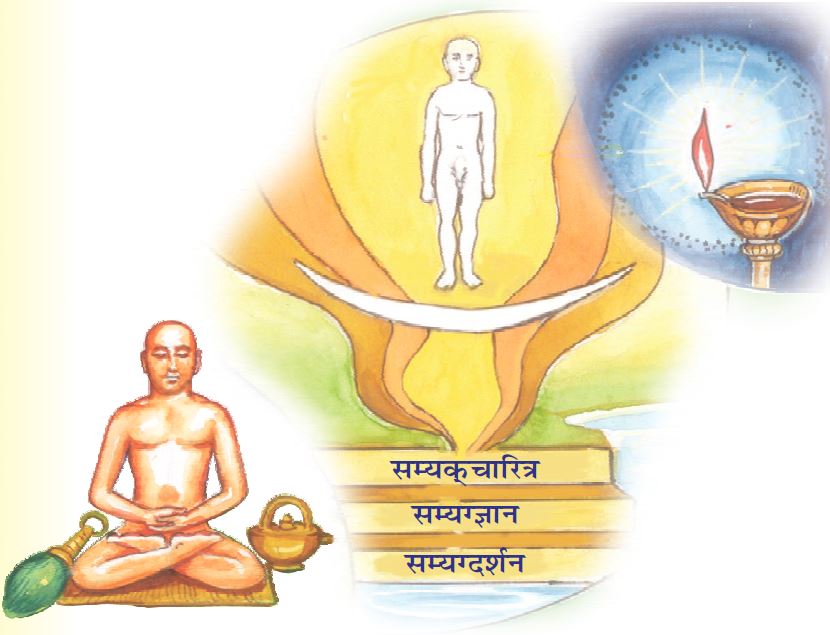
जे पूरब शिव गये, जाहिं, अरु आगे जैहैं
सो सब महिमा ज्ञान-तनी, मुनिनाथ कहै हैं
विषय-चाह दव-दाह, जगत-जन अरनि दझावै
तास उपाय न आन, ज्ञान-घनघान बुझावै ॥८॥
सो सब महिमा ज्ञान-तनी, मुनिनाथ कहै हैं
विषय-चाह दव-दाह, जगत-जन अरनि दझावै
तास उपाय न आन, ज्ञान-घनघान बुझावै ॥८॥
अन्वयार्थ : [पूरव] पूर्वकाल में [जे] जो जीव [शिव] मोक्ष में [गये] गये हैं, (वर्तमानमें) [जाहिं] जा रहे हैं [अरु] और [आगे] भविष्य में [जैहैं] जायेंगे [सो] वह [सब] सब [ज्ञान-तनी] सम्यग्ज्ञान की [महिमा] महिमा है -- ऐसा [मुनिनाथ] जिनेन्द्रदेव ने कहा है । [विषय-चाह] पाँच इन्द्रियों के विषयों की इच्छारूपी [दव-दाह] भयंकर दावानल [जगत-जन] संसारी जीवों रूपी [अरनि] अरण्य (पुराने वन) को [दझावै] जला रहा है [तास] उसकी शान्ति का [उपाय] उपाय [आन] दूसरा [न] नहीं है; (मात्र) [ज्ञान-घनघान] ज्ञानरूपी वर्षाका समूह [बुझावै] शान्त करता है ।
Meaning : Jinendra Bhagawaan has stated that whosoever (those) persons have attained salvation in the past, whosoever are attaining at present and whosoever shall attain in the future, is all due to the glory of Right Knowledge. In this mundane world, the desires of mundane pleasures like forest-fire are burning the people (Jeevas). There is no other way of safety; only the Right Knowledge like dense clouds can extinguish the fire of mundane pleasures.
सम्पूर्ण कथन का सार
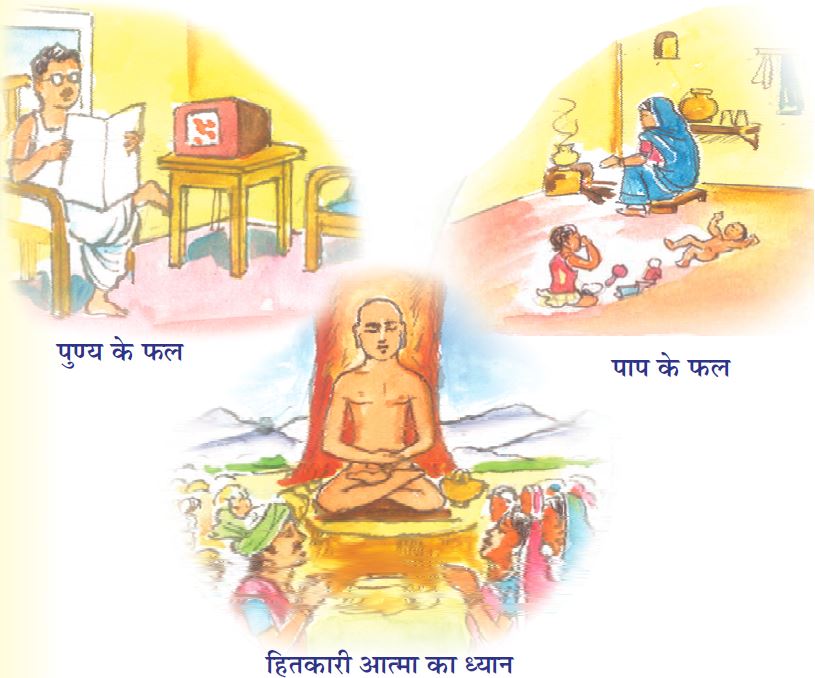
पुण्य-पाप-फलमाहिं, हरख बिलखौ मत भाई
यह पुद्गल परजाय, उपजि विनसै फिर थाई
लाख बात की बात यही, निश्चय उर लाओ
तोरि सकल जग दंद-फंद, नित आतम ध्याओ ॥९॥
यह पुद्गल परजाय, उपजि विनसै फिर थाई
लाख बात की बात यही, निश्चय उर लाओ
तोरि सकल जग दंद-फंद, नित आतम ध्याओ ॥९॥
अन्वयार्थ : [भाई] हे आत्मार्थी प्राणी ! [पुण्य-फलमाहिं] पुण्य के फल में [हरख मत] हर्ष न कर और [पाप-फलमाहिं] पाप के फल में [विलखौ मत] द्वेष न कर (क्योंकि यह पुण्य और पाप) [पुद्गल परजाय] पुद्गल की पर्यायें हैं । (वे) [उपजि] उत्पन्न होकर [विनसै] नष्ट हो जाती हैं और [फिर] पुनः [थाई] उत्पन्न होती हैं । [उर] अपने अन्तर में [निश्चय] निश्चयसे - वास्तव में [लाख बातकी बात] लाखों बातों का सार [यही] इसीप्रकार [लाओ] ग्रहण करो कि [सकल] पुण्य-पापरूप समस्त [जग-दंद-फंद] जन्म-मरण के द्वन्द (राग-द्वेष) रूप विकारी- मलिन भाव [तोरि] तोड़कर [नित] सदैव [आतम ध्याओ] अपने आत्मा का ध्यान करो ।
Meaning : The author says that O Bhaaee (Bhavy Jeev) ! You must neither feel pleasure on fruition of meritorious karmas nor weep on fruition of non-meritorious karmas. The fruition of meritorious or non-meritorious karmas is modification of matter (Pudgal), which continues to appear and disappear and can not remain permanent. This is the only essence of the entire discourse. Therefore this must be kept in heart with full faith (firmness), breaking the knots of all conflicts & entanglements of the world and to remain engrossed in the pure nature of one's soul.
अणुव्रत की प्रेरणा
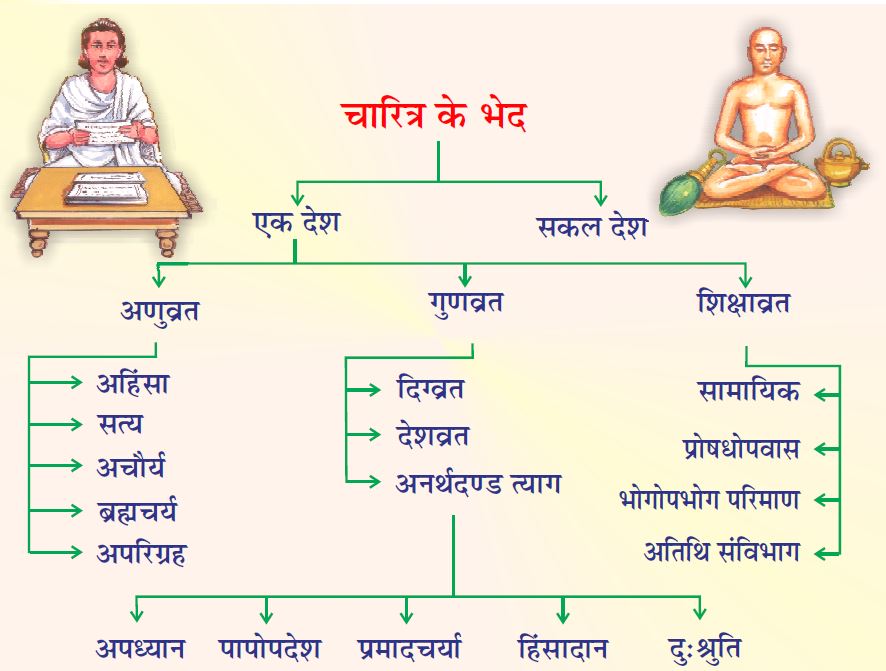
सम्यज्ञानी होय, बहुरि दिढ़ चारित लीजै
एकदेश अरु सकलदेश, तसु भेद कहीजै
त्रसहिंसा को त्याग, वृथा थावर न सँहारै
पर-वधकार कठोर निंद्य नहिं वयन उचारै ॥१०॥
एकदेश अरु सकलदेश, तसु भेद कहीजै
त्रसहिंसा को त्याग, वृथा थावर न सँहारै
पर-वधकार कठोर निंद्य नहिं वयन उचारै ॥१०॥
अन्वयार्थ : [सम्यग्ज्ञानी] सम्यग्ज्ञानी [होय] होकर [बहुरि] फिर [दिढ़] दृढ़ [चारित] सम्यक्चारित्र [लीजै] का पालन करना चाहिये; [तसु] उसके (उस सम्यक्चारित्र के) [एकदेश] एकदेश [अरु] और [सकलदेश] सर्वदेश (ऐसे दो) [भेद] भेद [कहीजै] कहे गये हैं । (उनमें) [त्रसहिंसा को] त्रस जीवों की हिंसा का [त्याग] त्याग करना और [वृथा] बिना कारण [थावर] स्थावर जीवों का [न सँहारै] घात न करना (वह अहिंसा-अणुव्रत कहलाता है) [पर-वधकार] दूसरों को दुःखदायक [कठोर] कठोर (और) [निंद्य] निंद्यनीय [वयन] वचन [नहिं उचारै] न बोलना (वह सत्य-अणुव्रत कहलाता है ।)
Meaning : With Right Knowledge, one should follow firmly the course of Right Conduct. Such Right Conduct is described as of two kinds-Partial (Eakadesh) and Complete (Sakal). In respect of the partial right conduct, one refrains from violence to mobile organism and does not purposelessly destroy the immobile organism. One does not speak words, which lead to killing of others and are harsh and condemnable (derogatory).
गुणव्रत
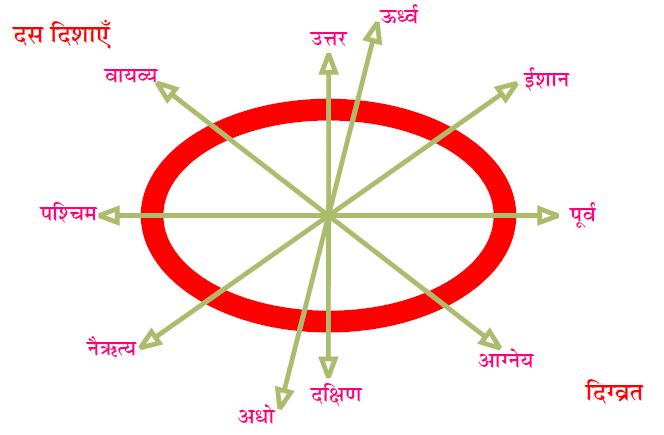
जल-मृतिका बिन और नाहिं कछु गहै अदत्ता
निज वनिता बिन सकल नारिसौं रहै विरत्ता
अपनी शक्ति विचार, परिग्रह थोरो राखै
दश दिश गमन प्रमाण ठान, तसु सीम न नाखै ॥११॥
निज वनिता बिन सकल नारिसौं रहै विरत्ता
अपनी शक्ति विचार, परिग्रह थोरो राखै
दश दिश गमन प्रमाण ठान, तसु सीम न नाखै ॥११॥
अन्वयार्थ : [जल-मृतिका विन] पानी और मिट्टी के अतिरिक्त [और कछु] अन्य कोई वस्तु [अदत्ता] बिना दिये [नाहिं] नहीं [ग्रहे] लेना (उसे अचौर्याणुव्रत कहते हैं) [निज] अपनी [वनिता विन] स्त्री के अतिरिक्त [सकल नारि सों] अन्य सर्व स्त्रियों से [विरत्ता] विरक्त [रहे] रहना (वह ब्रह्मचर्याणुव्रत है) [अपनी] अपनी [शक्ति विचार] शक्ति का विचार करके [परिग्रह] परिग्रह [थोरो] मर्यादित [राखै] रखना (सो परिग्रह-परिमाणाणुव्रत है) [दस दिश] दस दिशाओं में [गमन] जाने-आने की [प्रमाण] मर्यादा [ठान] रखकर [तसु] उस [सीम] सीमा का [न नाखै] उल्लंघन न करना (सो दिग्व्रत है) ।
Meaning : A religious house-holder does not accept any thing other than natural water and earth, if not offered to him. He does not keep sexual relations with any other person except his own spouse. He would keep little (limited) possessions according to his needs. After delimiting area of his movement in all ten directions, he would not transgress those limits.
देशव्रत

ताहू में फिर ग्राम गली, गृह बाग बजारा
गमनागमन प्रमाण ठान अन, सकल निवारा ॥१२॥
गमनागमन प्रमाण ठान अन, सकल निवारा ॥१२॥
अन्वयार्थ : [फिर] फिर [ताहू में] उसमें (किन्हीं प्रसिद्ध-प्रसिद्ध) [ग्राम] गाँव, [गली] गली, [गृह] मकान, [बाग] उद्यान तथा [बजार] बाजार तक [गमनागमन] जाने-आने का [प्रमाण] माप [ठान] रखकर [अन] अन्य [सकल] सब का [निवारा] त्याग करना (उसे देशव्रत अथवा देशावकाशिक व्रत कहते हैं ।)
Meaning : Within the limits (under the vow of Digvrat), a further limitation of the area for movement is effected by limiting it with destinations like a village, a lane, a house, a garden and a market (for some time) and the concerns beyond that are all eliminated.
अनर्थदण्ड व्रत
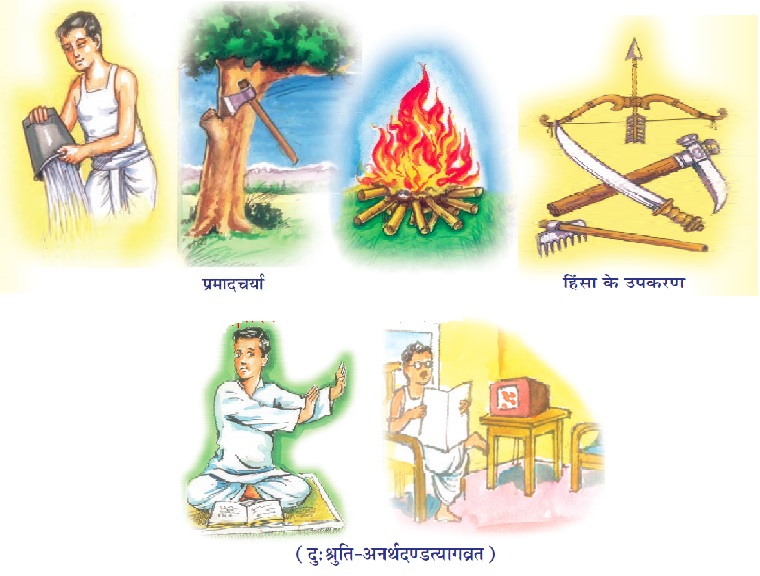
काहू की धनहानि, किसी जय-हार न चिन्तै
देय न सो उपदेश, होय अघ वनज कृषी तैं ॥१२॥
कर प्रमाद जल भूमि वृक्ष पावक न विराधै
असि धनु हल हिंसोपकरण नहिं दे यश लाधै
राग-द्वेष-करतार, कथा कबहूँ न सुनीजै
और हु अनरथ दंड, हेतु अघ तिन्हैं न कीजै ॥१३॥
देय न सो उपदेश, होय अघ वनज कृषी तैं ॥१२॥
कर प्रमाद जल भूमि वृक्ष पावक न विराधै
असि धनु हल हिंसोपकरण नहिं दे यश लाधै
राग-द्वेष-करतार, कथा कबहूँ न सुनीजै
और हु अनरथ दंड, हेतु अघ तिन्हैं न कीजै ॥१३॥
अन्वयार्थ : १. [काहूकी] किसी के [धनहानि] धन के नाश का, [किसी] किसी की [जय] विजय का (अथवा) [हार] किसी की हार का [न चिन्तै] विचार न करना (उसे अपध्यान-अनर्थदंडव्रत कहते हैं ।) २. [बनज] व्यापार और [कृषी तैं] खेती से [अघ] पाप [होय] होता है; इसलिये [सो] उसका [उपदेश] उपदेश [न देय] न देना (उसे पापोपदेश-अनर्थदंडव्रत कहा जाता है ।) ३. [प्रमाद कर] प्रमाद से (बिना प्रयोजन) [जल] जलकायिक, [भूमि] पृथ्वीकायिक, [वृक्ष] वनस्पतिकायिक, [पावक] अग्निकायिक (और वायुकायिक) जीवों का [न विराधै] घात न करना (सो प्रमादचर्या-अनर्थदंडव्रत कहलाता है ।) ४. [असि] तलवार, [धनु] धनुष्य, [हल] हल (आदि) [हिंसोपकरण] हिंसा होने में कारणभूत पदार्थों को [दे] देकर [यश] यश [नहिं लाधै] न लेना (सो हिंसादान-अनर्थदंडव्रत कहलाता है ।) ५. [राग-द्वेष-करतार] राग और द्वेष उत्पन्न करनेवाली [कथा] कथाएँ [कबहूँ] कभी भी [न सुनीजै] नहीं सुनना (सो दुःश्रुति अनर्थदंडव्रत कहा जाता है ।) [और हु] तथा अन्य भी [अघहेतु] पाप के कारण [अनरथ दंड] अनर्थदंड हैं [तिन्हैं] उन्हें भी [न कीजै] नहीं करना चाहिये ।
Meaning : One should not indulge in thoughts of some one's loss of wealth and victory or defeat. One should not advice ways of such trade and agriculture that lead to sinful (violent) activities. One should not commit violence of water based, earth based, vegetable based, air & fire based organism purposelessly. One should not try to gain repute by donating a sword, an arrow, a plough, and other implements of committing violence. One should never listen to such narrations, which produce feeling of attachment & aversion. In addition one should not do such other similar and purposeless sinful activities, which cause sins.
शिक्षाव्रत
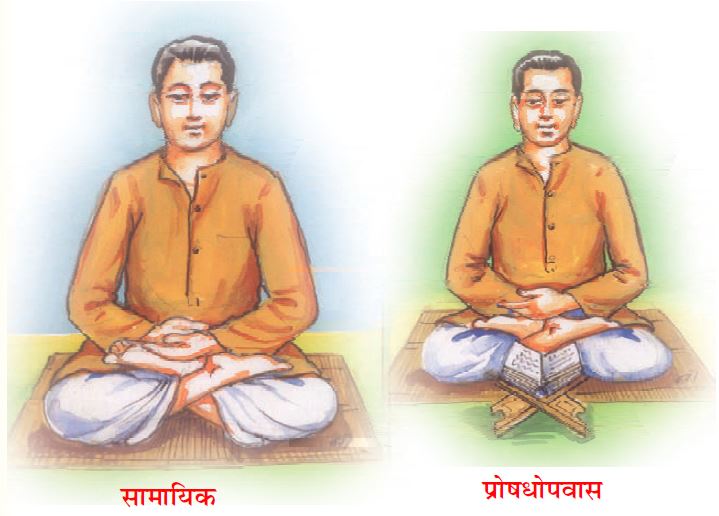
धर उर समताभाव, सदा सामायिक करिये
परव चतुष्टयमाहिं, पाप तज प्रोषध धरिये
भोग और उपभोग, नियमकरि ममत निवारै
मुनि को भोजन देय फेर, निज करहि अहारै ॥१४॥
परव चतुष्टयमाहिं, पाप तज प्रोषध धरिये
भोग और उपभोग, नियमकरि ममत निवारै
मुनि को भोजन देय फेर, निज करहि अहारै ॥१४॥
अन्वयार्थ : [उर] मन में [समताभाव] निर्विकल्पता अर्थात् शल्य के अभाव को [धर] धारण करके [सदा] हमेशा [सामायिक] सामायिक [करिये] करना (सो सामायिक-शिक्षाव्रत है;) [परव चतुष्टयमांहि] चार पर्व के दिनों में [पाप] पाप-कार्यों को छोड़कर [प्रोषध] प्रोषधोपवास [धरिये] करना (सो प्रोषध-उपवास शिक्षाव्रत है;) [भोग] एक बार भोगा जा सके ऐसी वस्तुओं का तथा [उपभोग] बारम्बार भोगा जा सके ऐसी वस्तुओं का [नियमकरि] परिमाण करके-मर्यादा रखकर [ममत] मोह [निवारै] छोड़ दे (सो भोग-उपभोग परिमाणव्रत है;) [मुनि को] वीतरागी मुनि को [भोजन] आहार [देय] देकर [फेर] फिर [निज आहारै] स्वयं भोजन करे (सो अतिथि-संविभागव्रत कहलाता है ।)
Meaning : To do religious meditation every day with equanimity is known as Saamaayik. During the four religious days (i.e. two Ashtmee and two Chaturdashee in a month), to abandon the sinful activities and to fast or to take meals only once in a day is known as Prosadh. To regulate the use of things of daily use (Bhog and Upabhog) so that one gets rid of the feeling of attachment with them is known as Bhog Upabhog Parimaann. To take meals only after offering meals to monk is known as Athiti Sanvibhaag.
व्रतों का फल
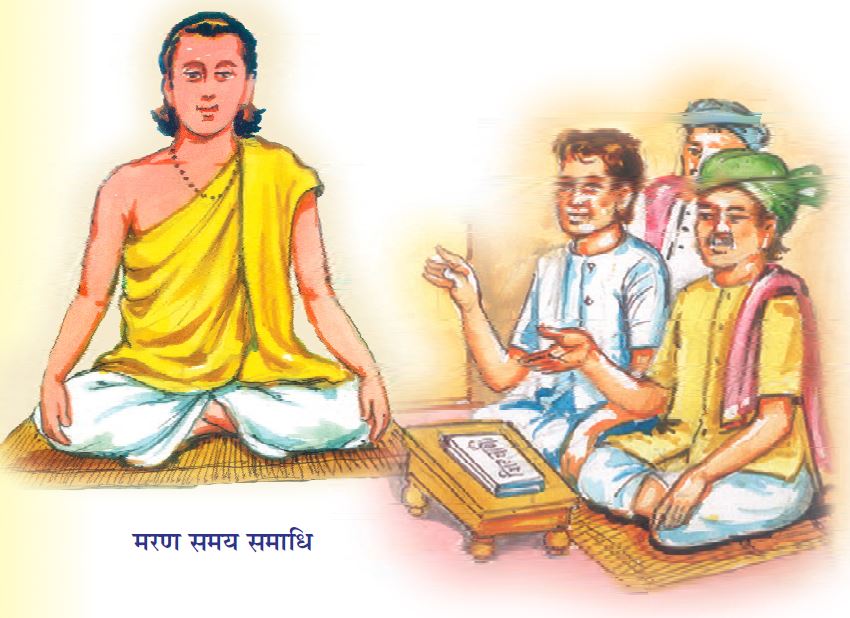
बारह व्रत के अतीचार, पन-पन न लगावै
मरण-समय संन्यास धारि तसु दोष नशावै
यों श्रावक-व्रत पाल, स्वर्ग सोलह उपजावै
तहँतें चय नरजन्म पाय, मुनि ह्वै शिव जावै ॥१५॥
मरण-समय संन्यास धारि तसु दोष नशावै
यों श्रावक-व्रत पाल, स्वर्ग सोलह उपजावै
तहँतें चय नरजन्म पाय, मुनि ह्वै शिव जावै ॥१५॥
अन्वयार्थ : जो जीव [बारह व्रत के] बारह व्रतों के [पन पन] पाँच-पाँच [अतिचार] अतिचारों को [न लगावै] नहीं लगाता और [मरण-समय] मृत्यु-काल में [संन्यास] समाधि [धार] धारण करके [तसु] उनके [दोष] दोषों को [नशावै] दूर करता है वह [यों] इस प्रकार [श्रावक व्रत] श्रावक के व्रत [पाल] पालन करके [सोलम] सोलहवें [स्वर्ग] स्वर्ग तक [उपजावै] उत्पन्न होता है, (और) [तहँतैं] वहाँ से [चय] मृत्यु प्राप्त करके [नरजन्म] मनुष्य-पर्याय [पाय] पाकर [मुनि] मुनि [ह्वै] होकर [शिव] मोक्ष [जावै] जाता है ।
Meaning : Each of the twelve vows of a religious house-holder has five infirmities, which should be avoided. At the time of death, one should follow the ideal religious death (Sannyaas) and avoid the infirmities of this vow also. The house-holder, who observes these twleve vows as laid down here without infirmities, would be able to take birth in any of the sixteen heavenly abodes. After completing the life in the heaven, taking human birth and becoming monk, one attains salvation.
ढाल-5
वैराग्य-जननी बारह भावना
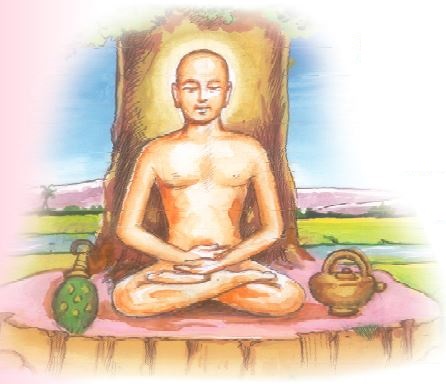
मुनि सकलव्रती बड़भागी भव-भोगनतैं वैरागी
वैराग्य उपावन माई, चिन्तैं अनुप्रेक्षा भाई ॥१॥
वैराग्य उपावन माई, चिन्तैं अनुप्रेक्षा भाई ॥१॥
अन्वयार्थ : [भाई] हे भव्यजीव! [सकलव्रती] महाव्रतों के धारक [मुनि] मुनिराज [बड़भागी] बड़े भाग्यवान हैं कि वे [भोगनतैं वैरागी] संसार और भोगों से विरक्त होते हैं और [वैराग्य उपावन माई] वीतरागता को उत्पन्न करने में, माता के समान [चिन्तैं अनुप्रेक्षा] बारह भावनाओं का चिंतवन करते हैं ।
Meaning : Most fortunate are the monks, who observe the Great Vows (of Ahinsaa etc.) and who are detached with sensuous pleasures of the world. O Bhavy-Jeev! They practice by concentrating on the reflections (Anuprekshaa) like a mother to arouse the spirit of renunciation.
बारह भावनाओं का कार्य
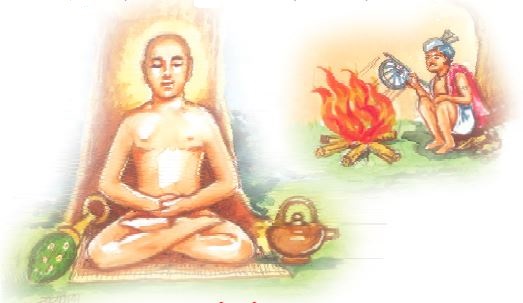
इन चिन्तत सम-सुख जागै, जिमि ज्वलन पवन के लागै
जब ही जिय आतम जानै, तब ही जिय शिवसुख ठानै ॥२॥
जब ही जिय आतम जानै, तब ही जिय शिवसुख ठानै ॥२॥
अन्वयार्थ : [इन चिंतत] इन (बारह भावनाओं) के चिंतवन से [सम-सुख जागै] समतारूपी सुख प्रकट होता है [जिमि ज्वलन] जैसे अग्नि [पवन के लागै] वायु के लगने से (भभक उठती है) । [जब ही जिय आतम जानै] जब जीव आत्मस्वरूप को जानता है, [तब ही जिय] तभी जीव [शिवसुख ठानै] मोक्षसुख को प्राप्त करता है ।
Meaning : From their practice (in the form of repeated reflections) the bliss of equanimity arises as fire rises by a gust of wind. As a result, the Jeev is able to know itself and then he attains the bliss of liberation.
अनित्य भावना
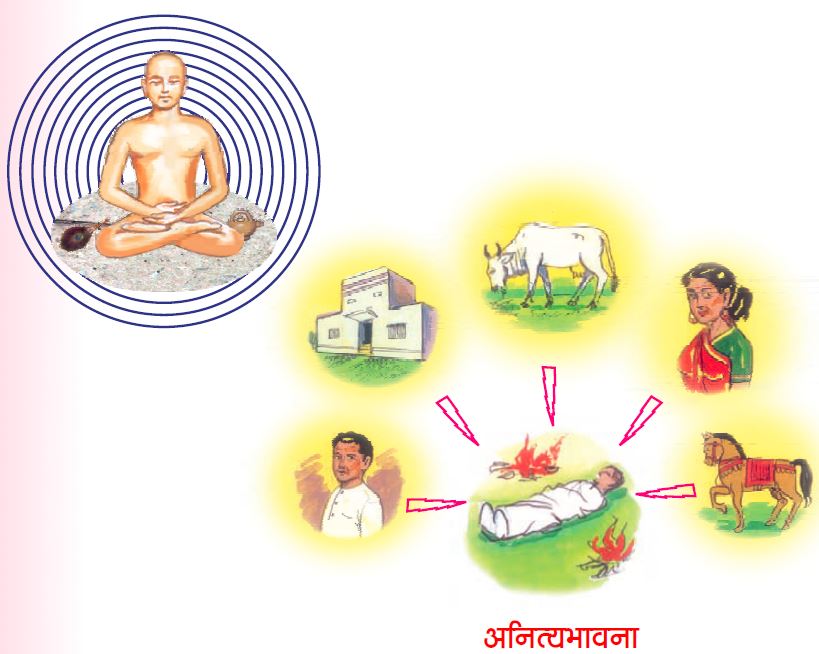
जोबन गृह गोधन नारी, हय गय जन आज्ञाकारी
इन्द्रिय-भोग छिन थाई, सुरधनु चपला चपलाई ॥३॥
इन्द्रिय-भोग छिन थाई, सुरधनु चपला चपलाई ॥३॥
अन्वयार्थ : [जोबन गृह गौ धन नारी] यौवन, मकान, गाय-भैंस, लक्ष्मी, स्त्री [हय गय जन आज्ञाकारी] घोड़ा, हाथी, कुटुम्ब, नौकर-चाकर तथा [इन्द्रिय-भोग] पांच इन्द्रियों के भोग-ये सब [सुरधनु चपला चपलाई] इन्द्रधनुष तथा बिजली की चंचलता-क्षणिकता की भांति [छिन थाई] क्षणमात्र रहनेवाले हैं ।
Meaning : Youth, houses, wealth of cows, women, horses, elephants, obedient persons and the sensual pleasures are all shortlived like the transitory nature of the rainbow and lightening. (Reflection in this manner is known as Anitya Anuprekshaa).
अशरण भावना
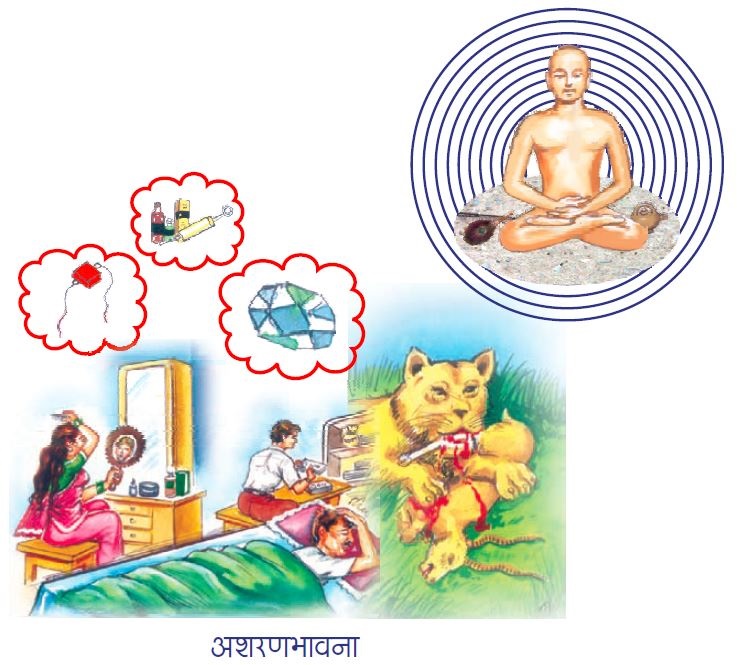
सुर असुर खगाधिप जेते, मृग ज्यों हरि, काल दले ते
मणि मंत्र तंत्र बहु होई, मरते न बचावै कोई ॥४॥
मणि मंत्र तंत्र बहु होई, मरते न बचावै कोई ॥४॥
अन्वयार्थ : [सुर असुर खगाधिप जेते] देवों के इन्द्र, असुरों के इन्द्र और खगेन्द्र (गरूड़, हंस) जो-जो हैं, [मृग हरि ज्यों] जिसप्रकार हिरन को सिंह मार डालता है, उसीप्रकार [काल दले] मृत्यु उन सबको नाश करती है । [मणि मंत्र तंत्र बहु होई] मणि, मंत्र, तंत्र बहुत से होने पर भी [मरते न बचावै कोई] मरनेवाले को कोई नहीं बचा सकते।
Meaning : Celestial beings like Sur and Asur, emperor etc. all are hunt by Kaal (death) as is the deer before a lion. There are many precious gems (Manni), texts (Mantra) and mystical devices (Tantra) but none of them is able to save one while dying. (Reflection in this manner is Asharann Anuprekshaa).
संसार भावना
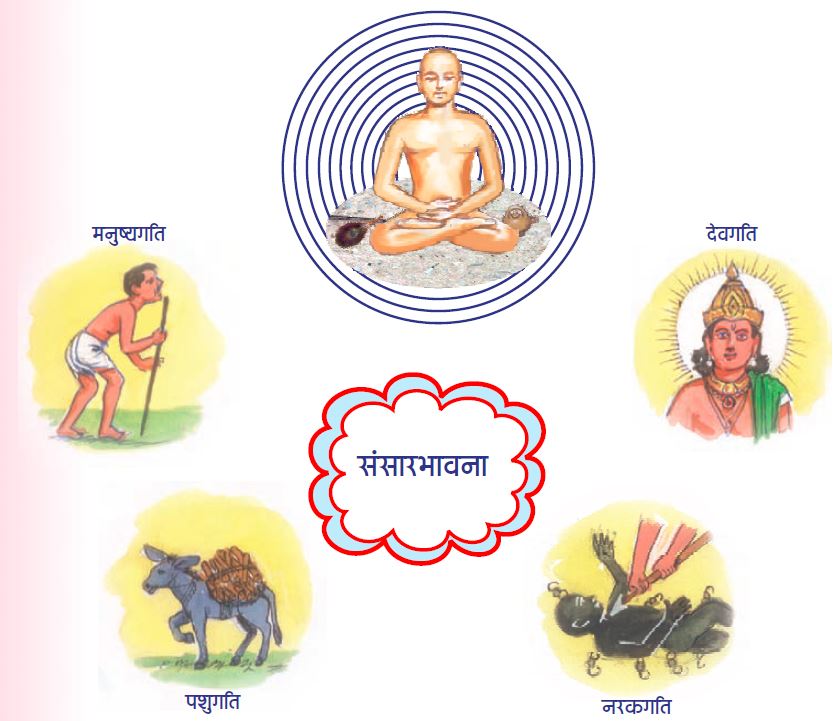
चहुँगति दु:ख जीव भरै है, परिवर्तन पंच करै है
सब विधि संसार असारा, यामें सुख नाहिं लगारा ॥५॥
सब विधि संसार असारा, यामें सुख नाहिं लगारा ॥५॥
अन्वयार्थ : [चहुंगति दुःख जीव भरै है] चारों गति में जीव दुःख भोगता है और [परिवर्तन पंच करै है] पांच प्रकार से परिभ्रमण करता है; [सब विधि संसार असारा] संसार सर्व प्रकार से असार है, [यामें सुख नाहिं लगारा] इसमें सुख लेशमात्र भी नहीं है ।
Meaning : The souls face sufferings in all the four incarnations of life and (thus) complete the course of five forms of wanderings. The world (Sansaar) is completely worthless (Asaar) and there is not the slightest happiness here. (Reflection in this manner is Sansaar Anupreskshaa).
एकत्व भावना
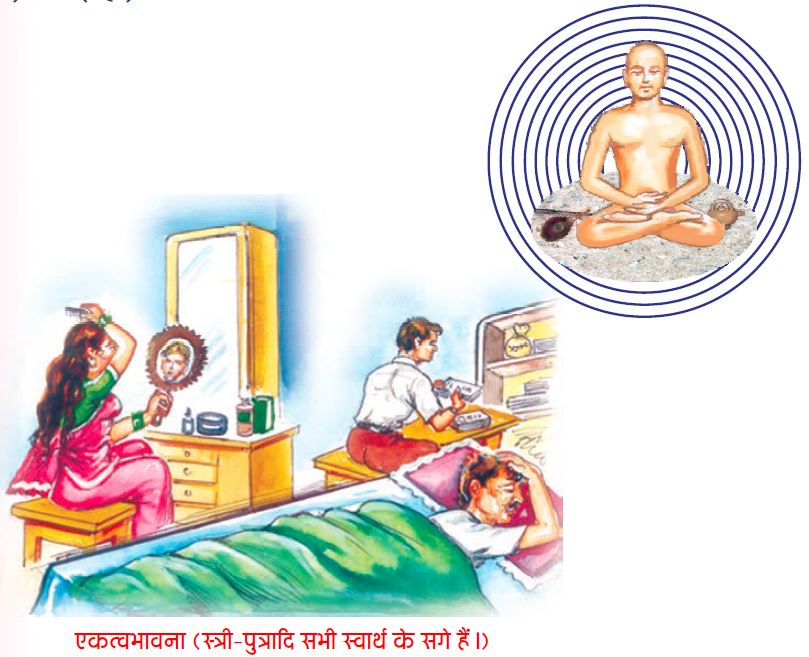
शुभ अशुभ करम फल जेते, भोगै जिय एक हि ते ते
सुत दारा होय न सीरी, सब स्वारथ के हैं भीरी ॥६॥
सुत दारा होय न सीरी, सब स्वारथ के हैं भीरी ॥६॥
अन्वयार्थ : [शुभ-अशुभ करमफल जेते] शुभ और अशुभ कर्म के फल जितने हैं, [भौगे जिय एक हि ते ते] उनको यह जीव अकेला ही भोगता है; [सुत दारा] पुत्र, स्त्री [होय न सीरी] साथी नही होते, [सब स्वारथ के हैं भीरी] सब स्वार्थ के सगे हैं ।
Meaning : Every one is alone to feel the fruition of meritorious and demeritorious karmas and the companions like son and wife do not share them. They all maintain their relations only on account of their own interests. (Reflection in this manner is Eakaty Anuprekshaa.)
अन्यत्व भावना
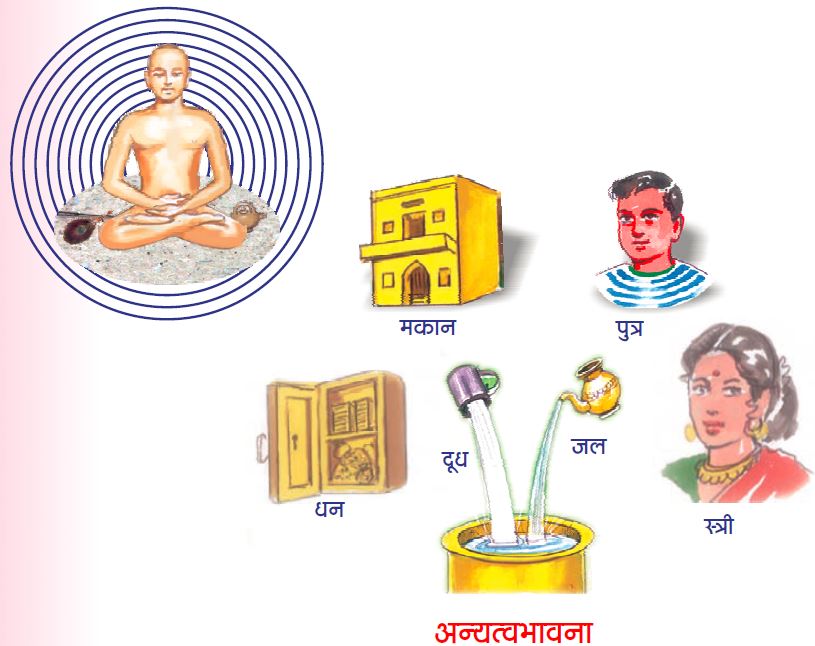
जल-पय ज्यों जिय-तन मेला, पै भिन्न-भिन्न नहिं भेला
तो प्रकट जुदे धन धामा, क्यों ह्वै इक मिलि सुत रामा ॥७॥
तो प्रकट जुदे धन धामा, क्यों ह्वै इक मिलि सुत रामा ॥७॥
अन्वयार्थ : [जल-पय-ज्यों जिय-तन मेला] पानी और दूध की भांति जीव और शरीर मिले हुए हैं, [पै भिन्न-भिन्न नहिं भेला] तथापि पृथक्-पृथक् हैं, एकरूप नहीं हैं, [तो प्रकट जुदे] फिर जो स्पष्ट पृथक् दिखई देते हैं - ऐसे [धन धामा] लक्ष्मी, मकान, [सुत रामा] पुत्र और स्त्री आदि [इक मिलि] मिलकर एक [क्यों ह्वै] कैसे हो सकते हैं?
Meaning : (In the mundane world) the soul and the body are intermingled as water and milk but they are really distinct and have not become one. The wealth, house, son, wife, which are evidently separate, how can these be one with the soul? All these are separate from the nature of the soul. (Reflection in this manner is Anyatva Anuprekshaa.)
अशुचि भावना
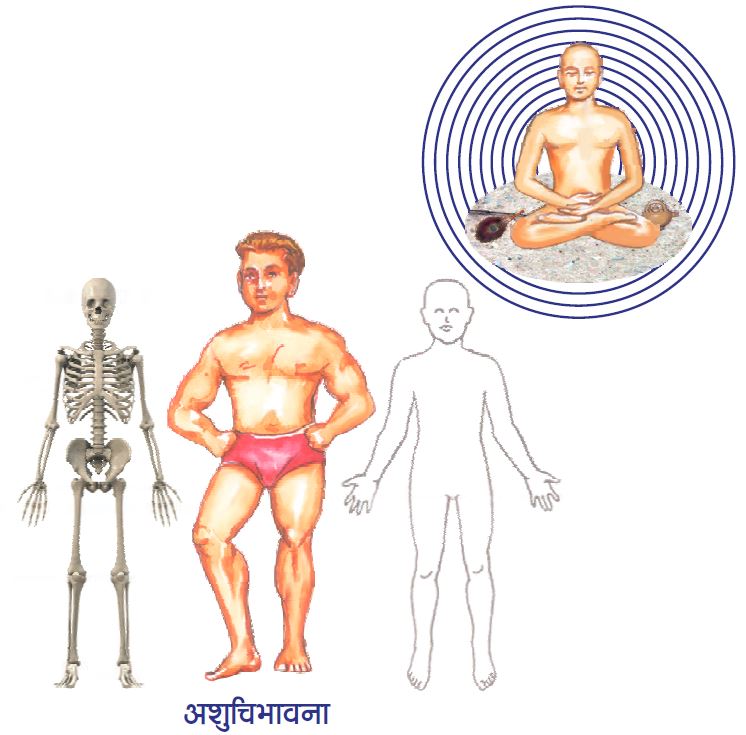
पल रुधिर राध मल थैली, कीकस वसादितैं मैली
नव द्वार बहैं घिनकारी, अस देह करे किम यारी ॥८॥
नव द्वार बहैं घिनकारी, अस देह करे किम यारी ॥८॥
अन्वयार्थ : [पल रूधिर राध] मांस, रक्त, पीव और [मल थैली] विष्टा की थैली, [कीकस वसादितैं मैली] हड्डी, चरबी आदि से अपवित्र, [नव द्वार बहैं घिनकारी] घृणा (ग्लानि) उत्पन्न करनेवाले नौ दरवाजे बहते हैं, [अस देह यारी किमि करै] ऐसे शरीर में प्रेम कैसे किया जा सकता है?
Meaning : The physical body is a container of flesh, blood, pus and muck. It has been made filthy by the bones, fat etc. In it there are nine disgusting openings with oozing filth. With such a body, how should one feel attachment? (Reflection in this manner is Ashuchi Anuprekshaa.)
आस्रव-भावना
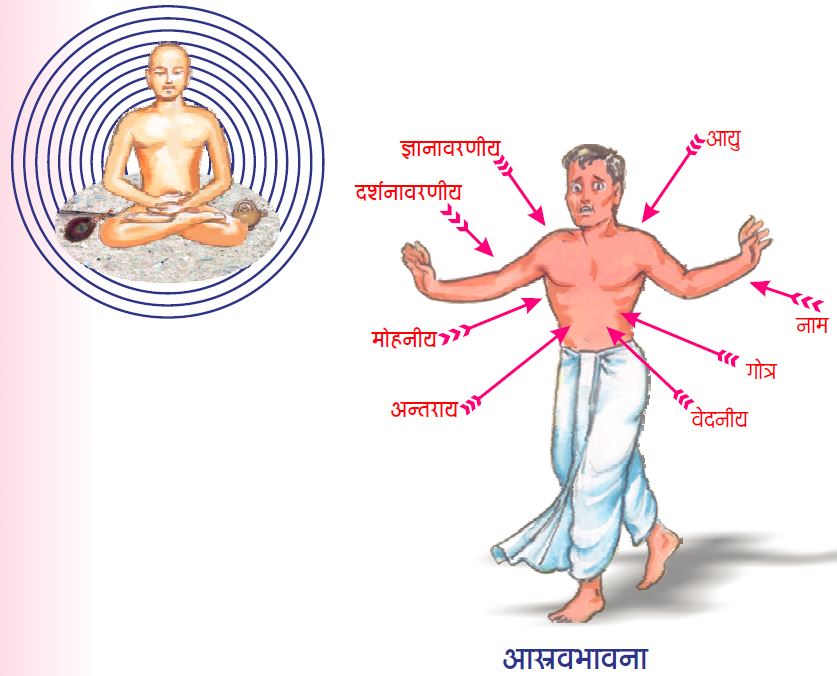
जो योगन की चपलाई, तातैं ह्वै आस्रव भाई
आस्रव दुखकार घनेरे, बुधिवन्त तिन्हें निरवेरे ॥९॥
आस्रव दुखकार घनेरे, बुधिवन्त तिन्हें निरवेरे ॥९॥
अन्वयार्थ : हे भाई! [जो योगन की चपलाई] जो योगों की चंचलता है, [तातैं आस्रव ह्] उससे आस्त्रव होता है; [आस्रव दुःखकार घनेरे] आस्रव अत्यन्त दुःखदायक है, इसलिए [बुधिवन्त तिन्हैं निरवेरे] बुद्धिमान उसे दूर करते हैं ।
Meaning : O Bhavy Jeev! The influx of karm is caused by vibration of Yoga. This influx produces severe sufferings. The wise persons always try to keep them away. (Reflection in this manner is Aashrav Anuprekshaa.)
संवर भावना
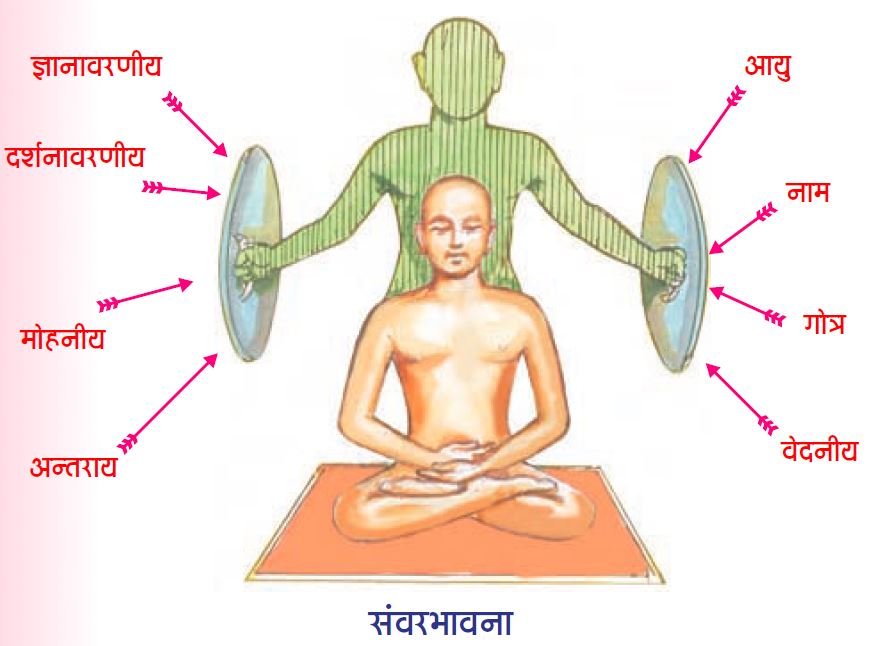
जिन पुण्य-पाप नहिं कीना, आतम अनुभव चित दीना
तिनही विधि आवत रोके, संवर लहि सुख अवलोके ॥१०॥
तिनही विधि आवत रोके, संवर लहि सुख अवलोके ॥१०॥
अन्वयार्थ : [जिन पुण्य पाप] जिन्होंने शुभभाव और अशुभभाव [नहिं कीना] नहीं किये; [आतम अनुभव] आत्मा के अनुभव में [चित दीना] मन को लगाया, [तिनही विधि] उन्होंने ही कर्मों को [आवत रोके] आने से रोका और [संवर लहि] संवर प्राप्त करके [सुख अवलोके] सुख का साक्षात्कार किया है।
Meaning : Those who do not indulge in meritorious & demeritorious activities and remain engrossed in the nature of the soul, are able to check the influx of the karmas. Only such persons accomplish the shedding of the karmas and can realize the spiritual bliss. (Reflection in this manner is Sanvar).
निर्जरा भावना
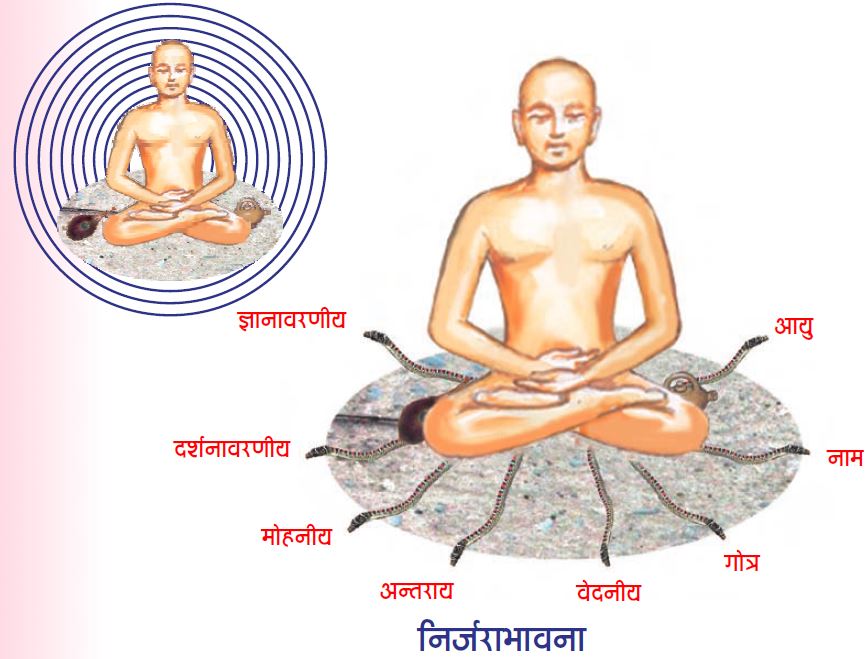
निज काल पाय विधि झरना, तासों निज काज न सरना
तप करि जो कर्म खिपावै, सोई शिवसुख दरसावै ॥११॥
तप करि जो कर्म खिपावै, सोई शिवसुख दरसावै ॥११॥
अन्वयार्थ : [निज काल पाय] अपनी-अपनी स्थिति पूर्ण होने पर [विधि झरना] कर्म खिर जाते हैं, [तासों निज काज] उससे (सविपाक निर्जरा से) जीव का धर्मरूपी कार्य [न सरना] नहीं होता; [तप करि जो] जो तप द्वारा [कर्म खिपावै] कर्मों का नाश करती है, [सोई शिवसुख दरसावै] वह (अविपाक निर्जरा) मोक्ष का सुख दिखलाती है ।
Meaning : The aim of life can not be achieved by shedding off the Karmas from the soul after completion of their duration. One, who destroys the karmas by performing penance is able to manifest the spiritual bliss of liberation (for himself). (Reflection in this manner is the Nirajaraa Anuprekshaa.)
लोक-भावना
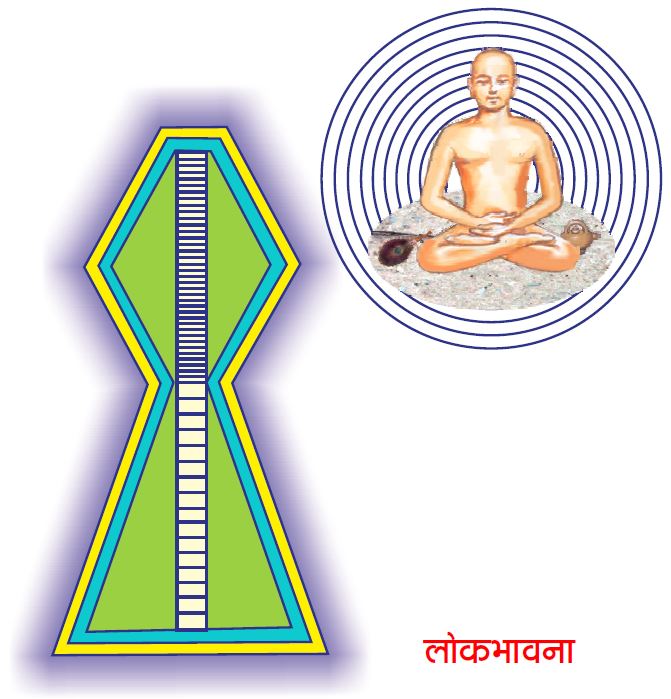
किनहू न करौ न धरै को, षड् द्रव्यमयी न हरै को
सो लोकमाहिं बिन समता, दुख सहै जीव नित भ्रमता ॥१२॥
सो लोकमाहिं बिन समता, दुख सहै जीव नित भ्रमता ॥१२॥
अन्वयार्थ : इस लोक को [किनहू न करौ] किसी ने बनाया नहीं है [न धरै को] किसी ने टिका नहीं रखा है, [न हरै को] कोई नाश नहीं कर सकता [षड् द्रव्यमयी] छह प्रकार के द्रव्यमय [सो लोकमाहिं] ऐसे लोक में [बिन समता] समता बिना [जीव नित भ्रमता] सदैव भटकता हुआ जीव [दुख लहै] दुःख सहता है ।
Meaning : The universe (Lok) is not created by any one nor maintained by any one. It is made of six substances by nature and no one can even destroy it. Without equanimity, the Jeev wanders in this universe and aces sufferings continuously. (Reflection in this manner is Lok Anuprekshaa.)
बोधि-दुर्लभ भावना
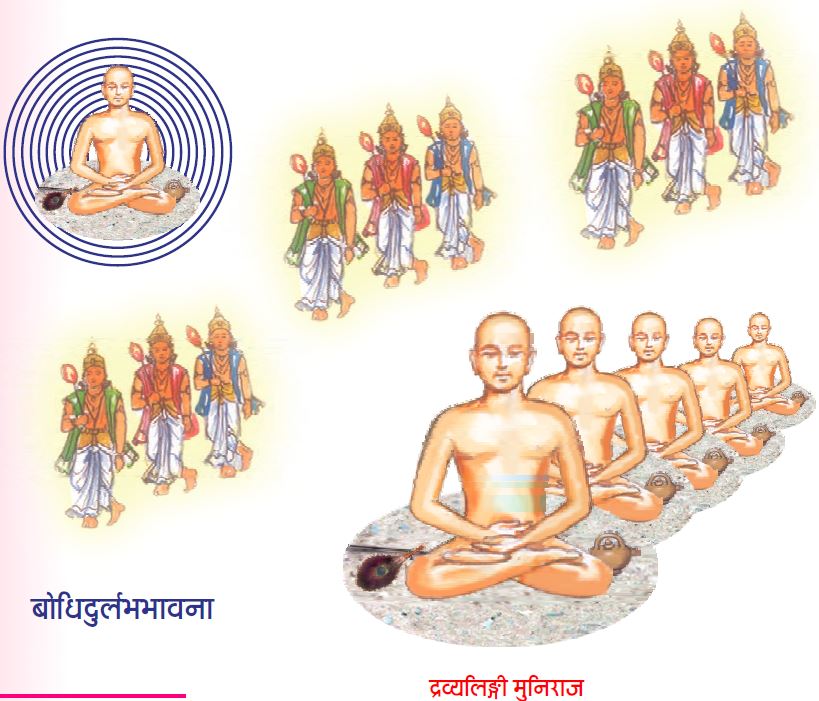
अंतिम-ग्रीवकलौं की हद, पायो अनन्त विरियाँ पद
पर सम्यग्ज्ञान न लाधौ, दुर्लभ निज में मुनि साधौ ॥१३॥
पर सम्यग्ज्ञान न लाधौ, दुर्लभ निज में मुनि साधौ ॥१३॥
अन्वयार्थ : [अंतिम ग्रीवकलौं की हद] नवें ग्रैवेयक तक के पद [पायो अनन्त विरियां] अनन्तबार प्राप्त किये, [पर सम्यग्ज्ञान] तथापि सम्यग्ज्ञान [न लाधौ] प्राप्त न हुआ; [दुर्लभ] एसे दुर्लभ सम्यग्ज्ञान को [निज में मुनि साधौ] अपने आत्मा में मुनि धारण करते हैं ।
Meaning : (In absence of the Right Knowledge) this Jeev has attained the state of the higher positions in the Greveyak limitlessly but it has not been able to attain the Right Knowledge. This rare opportunity of attaining Right Knowledge is attained only by monks within themselves. (Reflection in this manner is Bodhee Durlabh Anuprekshaa.)
धर्म-भावना
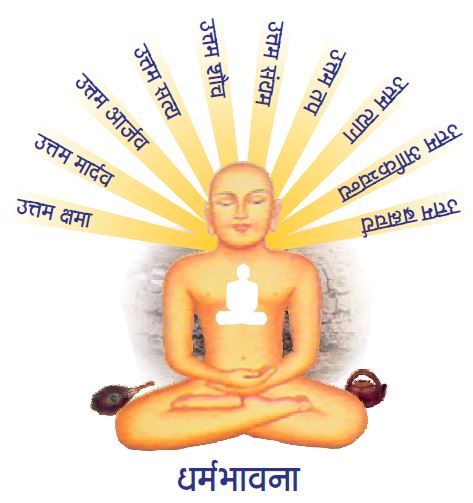
जो भाव मोहतैं न्यारे, दृग-ज्ञान-व्रतादिक सारे
सो धर्म जबै जिय धारै, तब ही सुख अचल निहारे ॥१४॥
सो धर्म जबै जिय धारै, तब ही सुख अचल निहारे ॥१४॥
अन्वयार्थ : [जो भाव मोह तैं न्यारे] जो भाव, मोह से रहित, [दृग-ज्ञान-व्रतादिक सारे] साररूप (निश्चय) दर्शन-ज्ञान-चारित्ररूप रत्नत्रय आदिक [सो धर्म] ऐसे धर्म को [जबै जिय धारै] जब जीव धारण करता है, तब ही [सुख अचल निहारै ] अचल सुख (मोक्ष) को प्राप्त करता है ।
Meaning : Right Faith, Right Knowledge, Course of vows, penance etc. are the spiritual manifestations devoid of delusion. These all constitute religion. When the Jeev happens to own religion, then only it perceives the permanent bliss. (Reflection in this manner is Dharm Anuprekshaa.)
मुनि-धर्म के निरूपण की प्रतिज्ञा
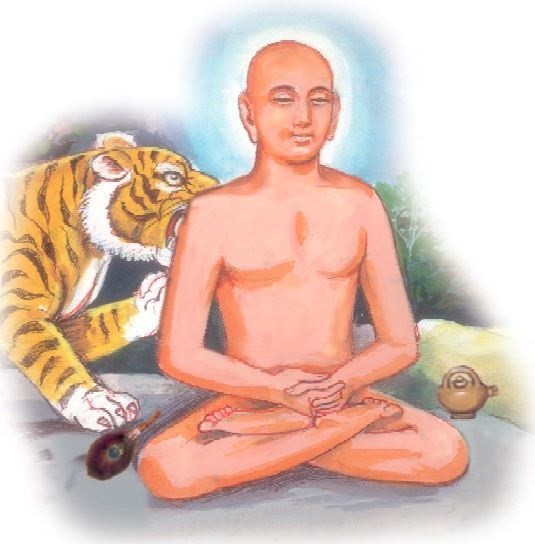
सो धर्म मुनिनकरि धरिये, तिनकी करतूत उचरिये
ताको सुनिये भवि प्रानी, अपनी अनुभूति पिछानी ॥१५॥
ताको सुनिये भवि प्रानी, अपनी अनुभूति पिछानी ॥१५॥
अन्वयार्थ : [सो धर्म] ऐसा रत्नत्रय धर्म [मुनिनकरि धरिये] मुनियों द्वारा धारण किया जाता है, [तिनकी करतूत] उन मुनियों की क्रियाएं [उचरिये] कही जाती है, [भवि प्रानी] हे भव्यजीवों! [ताको सुनिये] उसे सुनो और [अपनी अनुभूति पिछानी] आत्मा को अनुभव द्वारा पहिचानो ।
Meaning : This religion is completely followed by monks. Their course of conduct will be discussed in the next Canto. O Bhavy Jeev ! Listen to it and recognize the nature of one's soul.
ढाल-6
पंच महाव्रत
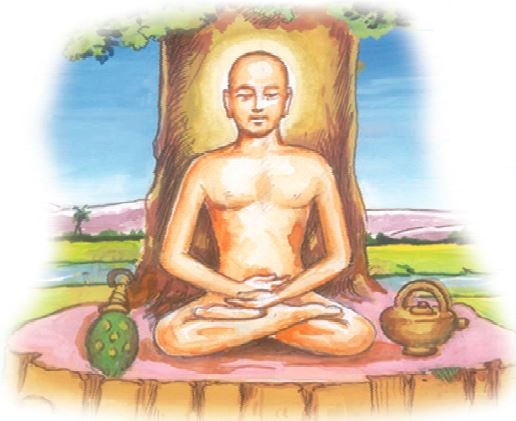
षट्काय जीव न हननतैं, सब विध दरवहिंसा टरी
रागादि भाव निवारतैं, हिंसा न भावित अवतरी
जिनके न लेश मृषा न जल, मृण हू बिना दीयो गहैं
अठदश सहस विध शील धर, चिद्ब्रह्म में नित रमि रहैं ॥१॥
रागादि भाव निवारतैं, हिंसा न भावित अवतरी
जिनके न लेश मृषा न जल, मृण हू बिना दीयो गहैं
अठदश सहस विध शील धर, चिद्ब्रह्म में नित रमि रहैं ॥१॥
अन्वयार्थ : [षट्काय जीव] छह कायके जीवों को [न हननतैं] घात न करने से [सब विध] सर्व प्रकार से [दरवहिंसा] द्रव्य-हिंसा [टरी] दूर हो जाती है और [रागादि भाव] रागादि (राग-द्वेष, काम, क्रोध, मान, माया, लोभ आदि) भावों को [निवारतैं] दूर करने से [भावित हिंसा] भाव-हिंसा भी [न अवतरी] नहीं होती, [जिनके] उन मुनियों को [लेश] किंचित् [मृषा] झूठ [न] नहीं होती, [जल] पानी और [मृण] मिट्टी [हू] भी [बिना दीयो] दिये बिना [न गहैं] ग्रहण नहीं करते तथा [अठदशसहस] अठारह हजार [विध] प्रकार के [शील] शील (ब्रह्मचर्य) को [धर] धारण
करके [नित] सदा [चिद्ब्रह्ममें] चैतन्य-स्वरूप आत्मा में [रमि रहैं] लीन रहते हैं ।
करके [नित] सदा [चिद्ब्रह्ममें] चैतन्य-स्वरूप आत्मा में [रमि रहैं] लीन रहते हैं ।
Meaning : Avoiding the fortysix infirmities, they (monks) visit the houses of religious reputed families (house-holders) to partake the food for enhancement of penance only. By giving up Ras articles of food i.e. oil, salt, sugar, milk etc., they do not nourish their bodies (This is known as Eesanaa Samiti.) They pick up and place the helping implements for sanitation, knowledge and self-restraints (Kamandalu, Shaashtr & Pichhee) after careful examination. (This is known as Aadaan Nikshepann Samiti.) They discharge excreta, urine, cough etc. on clean spot, which is free from insects, carefully without committing any violence. (This is known as Vyutsarg or Pratishtthaapan Samiti.)
अपरिग्रह और समिति
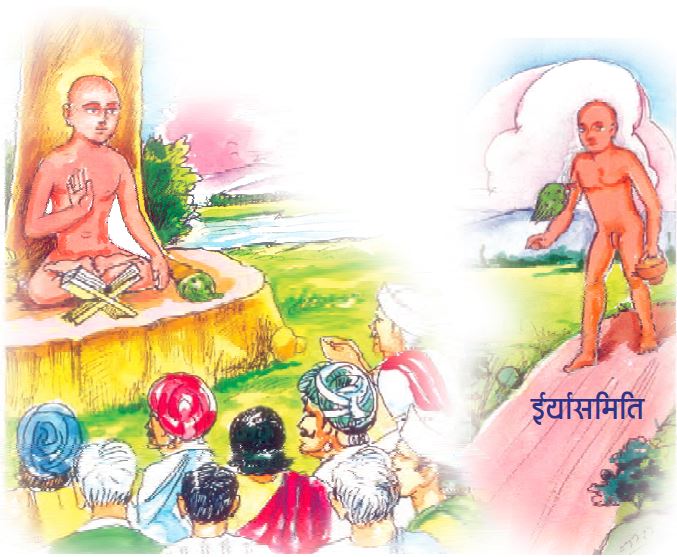
अंतर चतुर्दस भेद बाहिर, संग दसधा तैं टलैं
परमाद तजि चौकर मही लखि, समिति ईर्या तैं चलैं
जग-सुहितकर सब अहितहर, श्रुति सुखद सब संशय हरैं
भ्रमरोग-हर जिनके वचन-मुखचन्द्र तैं अमृत झरैं ॥२॥
परमाद तजि चौकर मही लखि, समिति ईर्या तैं चलैं
जग-सुहितकर सब अहितहर, श्रुति सुखद सब संशय हरैं
भ्रमरोग-हर जिनके वचन-मुखचन्द्र तैं अमृत झरैं ॥२॥
अन्वयार्थ : (वे वीतरागी दिगम्बर जैन मुनि) [चतुर्दस भेद] चौदह प्रकार के [अन्तर] अंतरंग तथा [दसधा] दस प्रकार के [बाहिर] बहिरंग [संग] परिग्रह से [टलैं] रहित होते हैं । [परमाद] प्रमाद (असावधानी) [तजि] छोड़कर [चौकर] चार हाथ [मही] जमीन [लखि] देखकर [ईर्या] ईयापथ [समिति तैं] समिति से [चलैं] चलते हैं और [जिनके] जिन (मुनिराजों) के [मुखचन्द्र तैं] मुखरूपी चन्द्रमा से [जग सुहितकर] जगत का सच्चा हित करनेवाला तथा [सब अहितकर] सर्व अहित का नाश करनेवाला, [श्रुति सुखद] सुनने में प्रिय लगे ऐसा [सब संशय] समस्त संशयों का [हरैं] नाशक और [भ्रम रोगहर] मिथ्यात्वरूपी रोग को हरनेवाला [वचन-अमृत] वचनरूपी अमृत [झरैं] झरता है ।
Meaning : They (monks) meditate on the nature of their souls by controlling the activities of (their) mind, speech and body in a proper manner. Seeing their stable posture and taking them to be a slab of stone, the group of deer rub against them for (removing) their itching sensation. They do not feel attachment or aversion in liking and disliking taste, colour, smell, touch and sound to attain the status of the conquerer of the five senses.
शेष तीन समिति
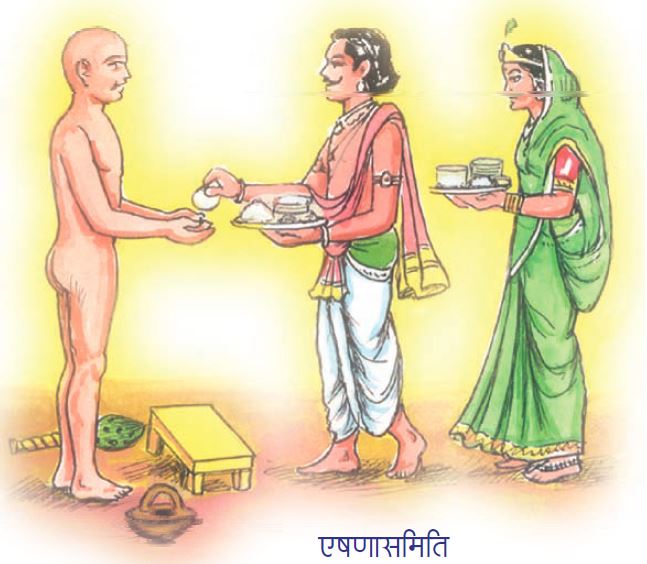
छ्यालीस दोष बिना सुकुल, श्रावकतनैं घर अशन को
लैं तप बढ़ावन हेतु, नहिं तन-पोषते तजि रसन को
शुचि ज्ञान संयम उपकरण, लखिकैं गहैं लखिकैं धरैं
निर्जन्तु थान विलोकि तन-मल मूत्र श्लेष्म परिहरैं ॥३॥
लैं तप बढ़ावन हेतु, नहिं तन-पोषते तजि रसन को
शुचि ज्ञान संयम उपकरण, लखिकैं गहैं लखिकैं धरैं
निर्जन्तु थान विलोकि तन-मल मूत्र श्लेष्म परिहरैं ॥३॥
अन्वयार्थ : (वीतरागी मुनि) [सुकुल] उत्तम-कुल वाले [श्रावकतनैं] श्रावक के घर और [रसन को] छहों-रस अथवा एक-दो रसों को [तजि] छोड़कर [तन] शरीर को [नहिं पोषतैं] पुष्ट न करते हुए - मात्र [तप] तप की [बढ़ावन हेतु] वृद्धि करने के हेतु से (आहार के) [छयालीस] छियालीस [दोष बिना] दोषों को दूर करके [अशनको] भोजन को [लैं] ग्रहण करते हैं । [शुचि] पवित्रता के [उपकरण] साधन (कमण्डल) को, [ज्ञान] ज्ञान के [उपकरण] साधन (शास्त्र) को, तथा [संयम] संयम के [उपकरण] साधन (पींछी) को [लखिकैं] देखकर [गहैं] ग्रहण करते हैं और [लखिकैं] देखकर [धरैं] रखते हैं; [मूत्र] पेशाब, [श्लेष्म] श्लेष्म (कफ) [तन-मल] शरीर के मैल को [निर्जन्तु] जीव-रहित [थान] स्थान [विलोकि] देखकर [परिहरैं] त्यागते हैं ।
Meaning : The monks keep equanimity, pronounce eulogies, obeisance to Bhagawaan Jinendra, always remain engaged in (the study of) religious books; perform self-introspection and give up attachment with the body. (These are knows as Six Essentials.) They do not take bath, do not brush their teeth, do not use any cloth to cover their bodies. They take short sleep on ground in one posture in the later part of the night.
गुप्ति और इंद्रियजय

सम्यक् प्रकार निरोध मन वच काय, आतम ध्यावते
तिन सुथिर मुद्रा देखि मृगगण उपल खाज खुजावते
रस रूप गंध तथा फरस अरु शब्द शुभ असुहावने
तिनमें न राग विरोध पंचेन्द्रिय-जयन पद पावने ॥४॥
तिन सुथिर मुद्रा देखि मृगगण उपल खाज खुजावते
रस रूप गंध तथा फरस अरु शब्द शुभ असुहावने
तिनमें न राग विरोध पंचेन्द्रिय-जयन पद पावने ॥४॥
अन्वयार्थ : (वीतरागी मुनि) [मन वच काय] मन-वचन-काया का [सम्यक् प्रकार] भली-भाँति-बराबर [निरोध] निरोध करके, जब [आतम] अपने आत्मा का [ध्यावते] ध्यान करते हैं, तब [तिन] उन मुनियोंकी [सुथिर] सुथिर-शांत [मुद्रा] मुद्रा [देखि] देखकर, उन्हें [उपल] पत्थर समझकर [मृगगण] हिरन (चौपाये प्प्राणी) समूह [खाज] अपनी खाज (खुजली) को [खुजावते] खुजाते हैं । (जो) [शुभ] प्रिय और [असुहावने] अप्रिय (पाँच इन्द्रियों सम्बन्धी) [रस] पाँच रस, [रूप] पाँच वर्ण, [गंध] दो गंध, [फरस] आठ प्रकार के स्पर्श, [अरु] और [शब्द] शब्द–[तिनमें] उन सब में [राग-विरोध] राग या द्वेष [न] मुनि को नहीं होते, (इसलिये वे मुनि) [पंचेन्द्रिय जयन] पाँच इन्द्रियों को
जीतनेवाला अर्थात् जितेन्द्रिय [पद] पद [पावने] प्राप्त करते हैं ।
जीतनेवाला अर्थात् जितेन्द्रिय [पद] पद [पावने] प्राप्त करते हैं ।
Meaning : They (monks) meditate on the nature of their souls by controlling the activities of (their) mind, speech and body in a proper manner. Seeing their stable posture and taking them to be a slab of stone, the group of deer rub against them for (removing) their itching sensation. They do not feel attachment or aversion in liking and disliking taste, colour, smell, touch and sound to attain the status of the conquerer of the five senses.
छह आवश्यक
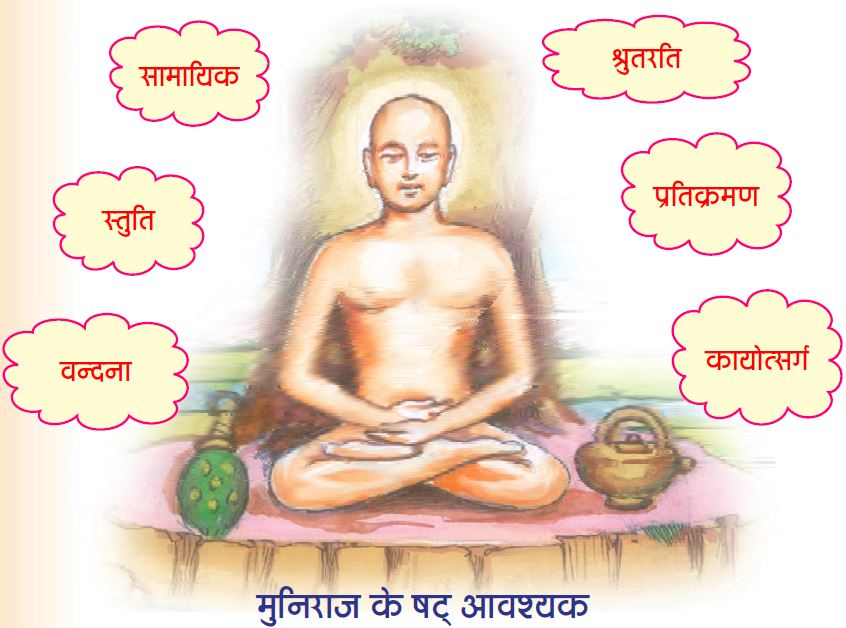
समता सम्हारैं, थुति उचारैं, वन्दना जिनदेव को
नित करैं श्रुति-रति, करैं प्रतिक्रम, तजैं तन अहमेव को
जिनके न न्हौन, न दंतधोवन, लेश अम्बर आवरन
भू माहिं पिछली रयनि में कछु शयन एकासन करन ॥५॥
नित करैं श्रुति-रति, करैं प्रतिक्रम, तजैं तन अहमेव को
जिनके न न्हौन, न दंतधोवन, लेश अम्बर आवरन
भू माहिं पिछली रयनि में कछु शयन एकासन करन ॥५॥
अन्वयार्थ : (वीतरागी मुनि) [नित] सदा [समता] सामायिक [सम्हारैं] सम्हालकर करते हैं, [थुति] स्तुति [उचारैं] बोलते हैं । [जिनदेव को] जिनेन्द्र भगवान की [वन्दना] वन्दना करते हैं । [श्रुतिरति] स्वाध्याय में प्रेम [करैं] करते हैं, [प्रतिक्रम] प्रतिक्रमण [करैं] करते हैं, [तन] शरीर की [अहमेव को] ममता को [तजैं] छोड़ते हैं । [जिनके] उन (मुनियों) के [न न्हौन न दंतधोवन] स्नान और दाँतों को स्वच्छ करना नहीं होता, [अंबर आवरन] शरीर ढँकने के लिये वस्त्र [लेश] किंचित् भी उनके [न] नहीं होता और [पिछली रयनिमें] रात्रिके पिछले भाग में [भूमाहिं]
धरती पर [एकासन] एक करवट [कछु] कुछ समय तक [शयन करन] शयन करते हैं ।
धरती पर [एकासन] एक करवट [कछु] कुछ समय तक [शयन करन] शयन करते हैं ।
Meaning : The monks keep equanimity, pronounce eulogies, obeisance to Bhagawaan Jinendra, always remain engaged in (the study of) religious books; perform self-introspection and give up attachment with the body. (These are knows as Six Essentials.) They do not take bath, do not brush their teeth, do not use any cloth to cover their bodies. They take short sleep on ground in one posture in the later part of the night.
परीषह-जय
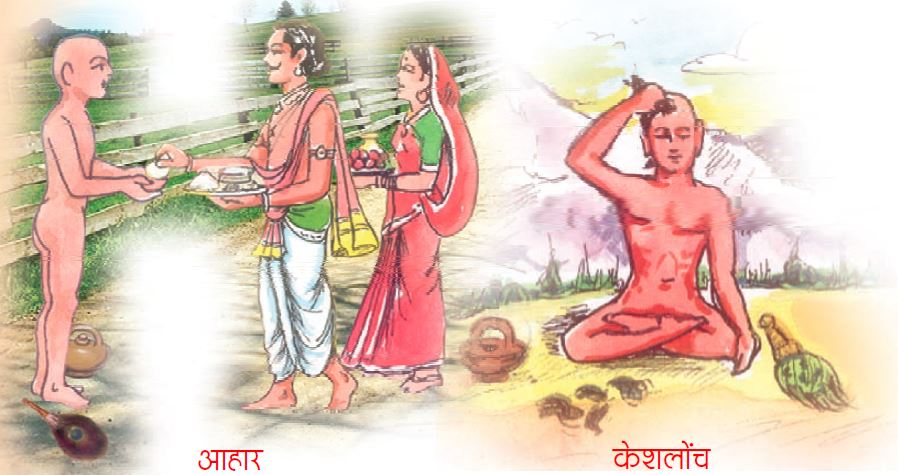
इक बार दिन में लें अहार, खड़े अलप निज-पान में
कचलोंच करत न डरत परिषह सौं, लगे निज ध्यान में
अरि मित्र महल मसान कंचन, काँच निन्दन थुति करन
अर्घावतारन असि-प्रहारन में सदा समता धरन ॥६॥
कचलोंच करत न डरत परिषह सौं, लगे निज ध्यान में
अरि मित्र महल मसान कंचन, काँच निन्दन थुति करन
अर्घावतारन असि-प्रहारन में सदा समता धरन ॥६॥
अन्वयार्थ : (वे वीतरागी मुनि) [इकबार दिन में] दिन में एक बार [खड़े] खड़े रहकर और [निज-पान में] अपने हाथ में रखकर [अल्प] थोड़ा-सा [लें अहार] आहार लेते हैं; [कचलोंच करत] केशलोंच करते हैं, [निज ध्यान में] अपने आत्मा के ध्यान में [लगे] तत्पर होकर [परिषह सौं] (बाईस प्रकार के) परिषहों से [न डरत] नहीं डरते और [अरि मित्र] शत्रु या मित्र, [महल मसान] महल या श्मशान, [कंचन काँच] सोना या काँच [निन्दन थुति करन] निन्दा या स्तुति करनेवाले, [अर्घावतारन] पूजा करनेवाले और [असि-प्रहारन] तलवार से प्रहार करनेवाले उन सब में [सदा] सदा [समता धरन] समताभाव धारण करते हैं ।
Meaning : They (monks) take little food from their palms in the standing posture only once in a day. They pull out their hairs of the head, are not afraid of the afflictions and keep themselves engaged in self-meditation. (These are their remaining Seven Virtues.) They always keep equanimity in between friend and foe, palace and cremation ground, gold and glass, criticism and praise, worship with reverence and the attack by a sword. Thus they always remain equanimous in all circumstances.
रत्नत्रय के धारी
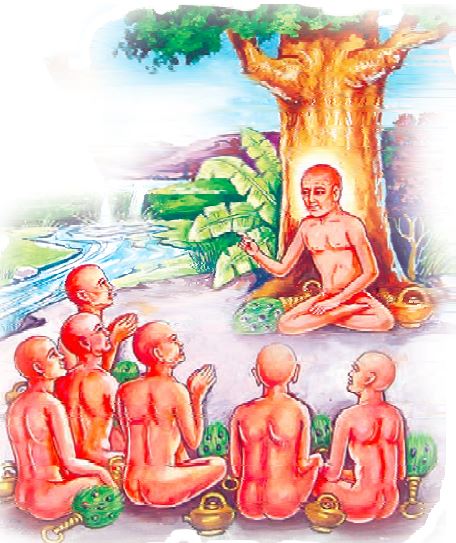
तप तपैं द्वादश, धरैं वृष दश, रतनत्रय सेवैं सदा
मुनि साथ में वा एक विचरैं चहैं नहिं भवसुख कदा
यों है सकल संयम चरित, सुनिये स्वरूपाचरन अब
जिस होत प्रकटै आपनी निधि, मिटै पर की प्रवृत्ति सब ॥७॥
मुनि साथ में वा एक विचरैं चहैं नहिं भवसुख कदा
यों है सकल संयम चरित, सुनिये स्वरूपाचरन अब
जिस होत प्रकटै आपनी निधि, मिटै पर की प्रवृत्ति सब ॥७॥
अन्वयार्थ : (वे वीतरागी मुनि सदा) [तप तपैं द्वादश] बारह प्रकार के तप करते हैं; [वृष दश] दस प्रकार के धर्म को [धरैं] धारण करते हैं और [रतनत्रय] सम्यग्दर्शन, सम्यग्ज्ञान तथा सम्यक्चारित्र का [सदा] सदा [सेवैं] सेवन करते हैं । [मुनि साथ में] मुनियों के संघ में [वा] अथवा [एक विचरैं] अकेले विचरते हैं और [भवसुख कदा] किसी भी समय (सांसारिक) सुखों की [नहिं चहैं] इच्छा नहीं करते । [यों] इसप्रकार [है सकल संयम चरित] सकल संयम चारित्र है; [सुनिए स्वरूपाचरण अब] अब स्वरूपाचरण चारित्र सुनो । [जिस होत प्रकटे] जो (स्वरूपाचरण चारित्र) के प्रगट होने से [प्रगटै आपनी निधि] अपने आत्मा की (ज्ञानादिक) सम्पत्ति प्रगट होती है तथा [सब] सर्व प्रकार से [मिटै पर की प्रवृत्ति] पर-वस्तुओं की ओर की प्रवृत्ति मिट जाती है ।
Meaning : The monks perform penance of twelve kinds, observe ten kinds of Dharm and always try to follow three Jewels. They with other monks or alone and never desire mundane pleasures. Thus description of the Complete Conduct of monks is given. (Now) you may listen to the supreme conduct of pure soul, manifests its true nature and stops all inclinations other than self, which are deterimental to the purity of soul.
स्वरूप-स्थिरता

जिन परम पैनी सुबुधि छैनी, डारि अन्तर भेदिया
वरणादि अरु रागादितैं निज भाव को न्यारा किया
निजमाहिं निज के हेतु निजकर, आपको आपै गह्यो
गुण गुणी ज्ञाता ज्ञान ज्ञेय मँझार कछु भेद न रह्यो ॥८॥
वरणादि अरु रागादितैं निज भाव को न्यारा किया
निजमाहिं निज के हेतु निजकर, आपको आपै गह्यो
गुण गुणी ज्ञाता ज्ञान ज्ञेय मँझार कछु भेद न रह्यो ॥८॥
अन्वयार्थ : [जिन] उन (वीतरागी मुनिराज) ने [परम पैनी] अत्यंत तीक्ष्ण [सुबुधि] सम्यग्ज्ञान अर्थात् भेदविज्ञानरूपी [छैनी डारि] छैनी पटककर [अन्तर भेदिया] अन्तरंग में भेदकर के [निजभाव को] आत्मा के वास्तविक स्वरूप को [वरणादि] वर्ण, रस, गंध, तथा स्पर्शरूप द्रव्य-कर्म से [अरु] और [रागादितैं] राग-द्वेषादिरूप भाव-कर्म से [न्यारा किया] भिन्न करके [निजमांहिं] अपने आत्मा में [निज के हेतु] अपने लिये [निजकर] अपने द्वारा [आपको] आत्मा को [आपै] स्वयं अपने से [गह्यो] ग्रहण करते हैं, तब [गुण गुणी] गुण और गुणी (द्रव्य), [ज्ञाता ज्ञान ज्ञेय मँझार] ज्ञाता (आत्मा), ज्ञान (साधन, करण), ज्ञान का विषय के मध्य [कछु भेद न रह्यो] किंचित्मात्र भेद (विकल्प) नहीं रहा ।
Meaning : They (monks) have broken (their) ignorance with the help of a highly sharp chisel of spiritually evolved intellect (Bhed Vijnaan) and they feel separated themselves from all attributes of Pudgal like colour etc. and passionate feelings like attachment etc. They have realized themselves, for themselves and by themselves. In such a state there remains no distinction between pure nature of self & its attributes and among knowledge (Jnaan), the knower (Jnaataa) & the object to be known (Jneya).
आत्मानुभूति
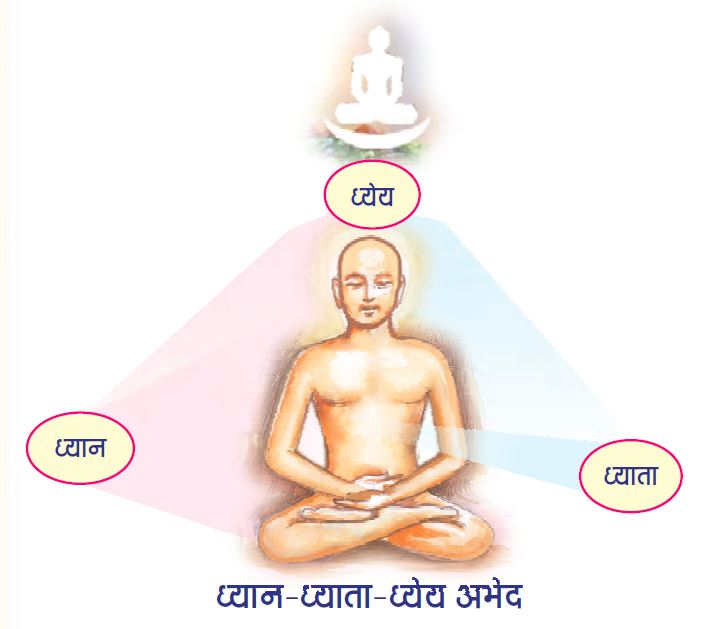
जहँ ध्यान ध्याता ध्येय को न विकल्प, वच भेद न जहाँ
चिद्भाव कर्म, चिदेश करता, चेतना किरिया तहाँ
तीनों अभिन्न अखिन्न शुध उपयोग की निश्चल दशा
प्रकटी जहाँ दृग-ज्ञान-व्रत ये, तीनधा एकै लसा ॥९॥
चिद्भाव कर्म, चिदेश करता, चेतना किरिया तहाँ
तीनों अभिन्न अखिन्न शुध उपयोग की निश्चल दशा
प्रकटी जहाँ दृग-ज्ञान-व्रत ये, तीनधा एकै लसा ॥९॥
अन्वयार्थ : [जहँ] जिस स्वरूपाचरण-चारित्र में [ध्यान] ध्यान, [ध्याता] ध्याता और [ध्येयको] ध्येय - इन तीनों के [विकल्प] भेद [न] नहीं होते तथा [जहाँ] जहाँ [वच] वचन का [भेद न] विकल्प नहीं होता, [तहाँ] वहाँ तो [चिद्भाव] आत्मा का स्वभाव ही [कर्म] कर्म, [चिदेश] आत्मा ही [करता] कर्ता, [चेतना] चैतन्यस्वरूप आत्मा ही [किरिया] क्रिया होता है -- अर्थात् कर्ता, कर्म और क्रिया–ये तीनों [अभिन्न] भेदरहित-एक, [अखिन्न] अखण्ड (बाधारहित) हो जाते हैं और [शुध उपयोगकी] शुद्ध-उपयोग की [निश्चल] निश्चल [दशा] पर्याय [प्रगटी] प्रगट होती है; [जहाँ] जिसमें [दृग-ज्ञान-व्रत] सम्यग्दर्शन, सम्यग्ज्ञान और सम्यक्चारित्र [ये तीनधा] यह तीनों [एकै] एकरूप (अभेदरूप) से [लसा] शोभायमान होते हैं ।
Meaning : It is the stage where there remains no distinction of meditation, meditator and the object of meditation; nor is there any other distinction of expression through language. There the conscious manifestations (chidbhaav) are the objects (karma), the conscious souls (Chidesh) are the doers (subjects) and the consciousness (itself) is the action. All these three are non-distinct, undisturbed and steady state of pure self meditation. When such a state arises, (Right) Faith, (Right) Knowledge and (Right) Conduct-all the three thought lines shine as one.
निर्विकल्प दशा
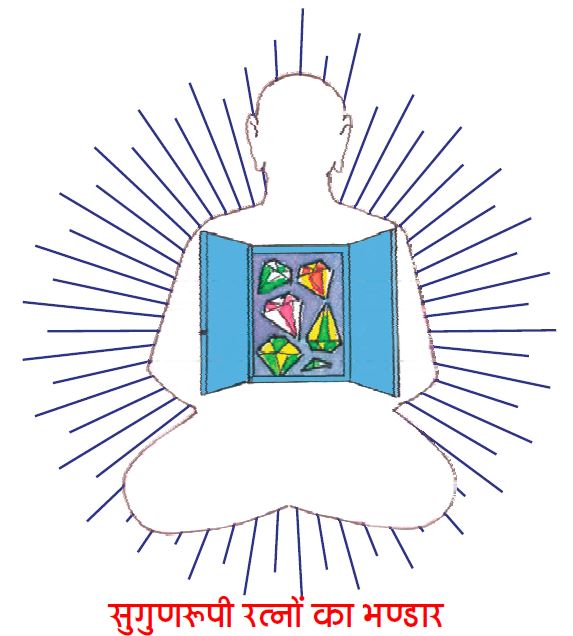
परमाण नय निक्षेप को न उद्योत अनुभव में दिखै
दृग-ज्ञान-सुख-बलमय सदा, नहिं आन भाव जु मो विखै
मैं साध्य साधक मैं अबाधक, कर्म अरु तसु फलनितैं
चित् पिंड चंड अखंड सुगुणकरंड च्युत पुनि कलनितैं ॥१०॥
दृग-ज्ञान-सुख-बलमय सदा, नहिं आन भाव जु मो विखै
मैं साध्य साधक मैं अबाधक, कर्म अरु तसु फलनितैं
चित् पिंड चंड अखंड सुगुणकरंड च्युत पुनि कलनितैं ॥१०॥
अन्वयार्थ : (उस स्वरूपाचरण-चारित्र के समय मुनियों के) [अनुभवमें] आत्मानुभव में [परमाण] प्रमाण, [नय] नय और [निक्षेप को] निक्षेप का विकल्प [उद्योत] प्रगट [न दिखै] दिखाई नहीं देता, (परन्तु ऐसा विचार होता है कि) [मैं] मैं [सदा] सदा [दृग-ज्ञान-सुख-बलमय] अनन्तदर्शन-अनन्तज्ञान-अनन्तसुख और अनन्तवीर्यमय हूँ । [मो विखै] मेरे स्वरूप में [आन] अन्य राग-द्वेषादि [भाव] भाव [नहिं] नहीं हैं, [मैं] मैं [साध्य] साध्य, [साधक] साधक तथा [कर्म] कर्म [अरु] और [तसु] उसके [फलनितैं] फलों के [अबाधक] विकल्प-रहित [चित् पिंड] ज्ञान-दर्शन-चेतनास्वरूप [चण्ड] निर्मल तथा ऐश्वर्यवान [अखंड] अखंड [सुगुण करंड] सुगुणों का भंडार [पुनि] और [कलनितैं] अशुद्धता से [च्युत] रहित हूँ ।
Meaning : In the stage of pure self-meditation flash of comprehensive knowledge, partial cognitions with standpoints and the installations of objects are not experienced. (The soul) is bestowed only with (infinite) perception, (infinite) knowledge, (infinite) bliss and (infinite) power. Nothing else exists in the soul. The only manifestation is "I am to be achieved; I am the achiever. I stand unhampered by the karmas and their fruition. I am a mass of consciousness, I am glorious, I am undivided, I am a basket of excellent qualities and I am devoid of all sins & body."
आत्मध्यान का फल केवलज्ञान
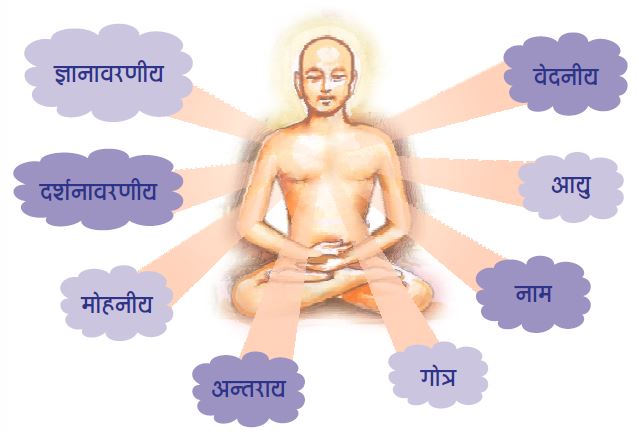
यों चिन्त्य निज में थिर भये, तिन अकथ जो आनंद लह्यो
सो इन्द्र नाग नरेन्द्र वा अहमिन्द्रकैं नाहीं कह्यो
तब ही शुकल ध्यानाग्नि करि, चउघाति विधि कानन दह्यो
सब लख्यो केवलज्ञानकरि, भविलोक को शिवमग कह्यो ॥११॥
सो इन्द्र नाग नरेन्द्र वा अहमिन्द्रकैं नाहीं कह्यो
तब ही शुकल ध्यानाग्नि करि, चउघाति विधि कानन दह्यो
सब लख्यो केवलज्ञानकरि, भविलोक को शिवमग कह्यो ॥११॥
अन्वयार्थ : )स्वरूपाचरण-चारित्र में) [यों] इस प्रकार [चिन्त्य] चिंतवन करके [निज में] आत्मस्वरूप में [थिर भये] लीन होने पर [तिन] उन मुनियोंको [जो] जो [अकथ] कहा न जा सके ऐसा (वचन से पार) [आनन्द] आनन्द [लह्यो] होता है [सो]वह आनन्द [इन्द्र] इन्द्र को, [नाग] नागेन्द्र को, [नरेन्द्र] चक्रवर्ती को [वा अहमिन्द्रको] या अहमिन्द्र को [नहीं कह्यो] कहने में नहीं आया (नहीं होता) । [तब ही] वह स्वरूपाचरण-चारित्र प्रगट होने के पश्चात् जब [शुक्ल ध्यानाग्नि करि] शुक्ल-ध्यानरूपी अग्नि द्वारा [चउघाति विधि कानन] चार घाति-कर्मोंरूपी वन [दह्यो] जल जाता है और [केवलज्ञानकरि] केवलज्ञान से [सब] तीनकाल और तीन-लोक में होनेवाले समस्त पदार्थों के सर्वगुण तथा पर्यायों को [लख्यो] प्रत्यक्ष जान लेते हैं, तब [भविलोकको] भव्य-जीवों को [शिवमग] मोक्षमार्ग [कह्यो] बतलाते हैं ।
Meaning : (In the state of pure Self-meditation), the monks engross in themselves by meditating in this manner (thus). The unexpressible bliss they attain is described as not enjoyed even by the Lord of heaven, the Lord of Bhavanavaasee Devas, the Lord of human beings and the Self-Lord of the highest heaven. With the fire of the pure Self-meditation, the monks burn the jungle of four destructive karmas. They thus perceive all with omniscience and reveal the way of spiritual well-being to the people, who are capable of liberation.
सिद्ध दशा

पुनि घाति शेष अघाति विधि, छिनमाहिं अष्टम भू वसैं
वसु कर्म विनसैं सुगुण वसु, सम्यक्त्व आदिक सब लसैं
संसार खार अपार पारावार तरि तीरहिं गये
अविकार अकल अरूप शुचि, चिद्रूप अविनाशी भये ॥१२॥
वसु कर्म विनसैं सुगुण वसु, सम्यक्त्व आदिक सब लसैं
संसार खार अपार पारावार तरि तीरहिं गये
अविकार अकल अरूप शुचि, चिद्रूप अविनाशी भये ॥१२॥
अन्वयार्थ : [पुनि] केवलज्ञान प्राप्त करने के पश्चात् [शेष] शेष चार [अघाति विधि] अघातिया कर्मों का [घाति] नाश करके [छिनमांहि] कुछ ही समयमें [अष्टम भू] आठवीं पृथ्वी (ईषत् प्राग्भार) मोक्ष-क्षेत्र में [वसैं] निवास करते हैं; उनको [वसु कर्म] आठ कर्मों का [विनसैं] नाश हो जाने से [सम्यक्त्व आदिक] सम्यक्त्वादि [सब] समस्त [वसु सुगुण] आठ मुख्य गुण [लसैं] शोभायमान होते हैं । (ऐसे सिद्ध होनेवाले मुक्तात्मा) [संसार खार अपार पारावार] संसाररूपी खारे तथा अगाध समुद्र को [तरि] पार करके [तीरहिं] किनारे पर [गये] पहुँच जाते हैं और [अविकार] विकार-रहित, [अकल] शरीर-रहित, [अरूप] रूप-रहित, [शुचि] शुद्ध-निर्दोष [चिद्रूप] दर्शन-ज्ञान-चेतनास्वरूप तथा [अविनाशी] नित्य-स्थायी [भये] होते हैं ।
Meaning : After destroying the remaining (four) non-destructive karmas, they enter the state of Siddhas within a moment to live in the eighth earth (abode of Siddhas). This is the state of Siddh hood. On account of the destruction of the eight karmas, eight excellent qualities like Right Faith etc. shine in them. They reach the final shore after crossing the ocean of Sansaar (world) which is salty (full of sufferings) and huge (limitless) in dimension. Then they become free from distortions, embodiment and the material qualities; and consequently become pure, fully conscious and immortal.
सिद्ध जीव धन्य
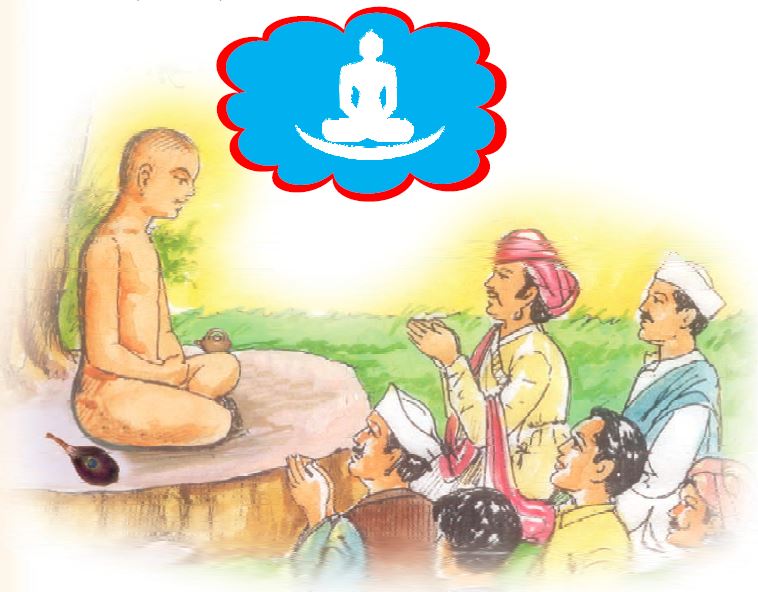
निजमाहिं लोक-अलोक गुण, परजाय प्रतिबिम्बित थये
रहिहैं अनन्तानन्त काल, यथा तथा शिव परिणये
धनि धन्य हैं जे जीव, नरभव पाय यह कारज किया
तिनही अनादि भ्रमण पंच प्रकार तजि वर सुख लिया ॥१३॥
रहिहैं अनन्तानन्त काल, यथा तथा शिव परिणये
धनि धन्य हैं जे जीव, नरभव पाय यह कारज किया
तिनही अनादि भ्रमण पंच प्रकार तजि वर सुख लिया ॥१३॥
अन्वयार्थ : [निजमांहि] (उन सिद्धभगवान के) आत्मा में [लोक-अलोक] लोक तथा अलोक के [गुण, परजाय] गुण और पर्यायें [प्रतिबिम्बित थये] झलकने लगते हैं (ज्ञात होने लगते हैं); वे [यथा] जिसप्रकार [शिव] मोक्षरूप से [परिणये] परिणमित हुए हैं [तथा] उसीप्रकार [अनन्तानन्त काल] अनन्त-अनन्त काल तक [रहिहैं] रहेंगे ।[जे] जिन [जीव] जीवों ने [नरभव पाय] पुरुष-पर्याय प्राप्त करके [यह] यह (मुनिपद आदि की प्राप्तिरूप) [कारज] कार्य [किया] किया है, वे जीव [धनि धन्य हैं] धन्य हैं और धन्यवाद के पात्र हैं और [तिनही] उन्हीं जीवों ने [अनादि] अनादिकाल से चले आ रहे [पंच प्रकार] पाँच प्रकार के परिवर्तनरूप [भ्रमण] संसार-परिभ्रमण को [तजि] छोड़कर [वर] उत्तम [सुख] सुख [लिया] प्राप्त किया है ।
Meaning : In the state of salvation, the universe and beyond the universe, attributes and all their modes are reflected in one-self. They (Siddhas) will reside there for an endless period of time in the status of Siddha. Such Jeevas deserve all praise as they could accomplish this task of attaining the supreme status of human-life. Such souls, dissociating from the beginningless worldly wanderings of five types had finally attained the excellent bliss.
निजहित के लिए प्रेरणा
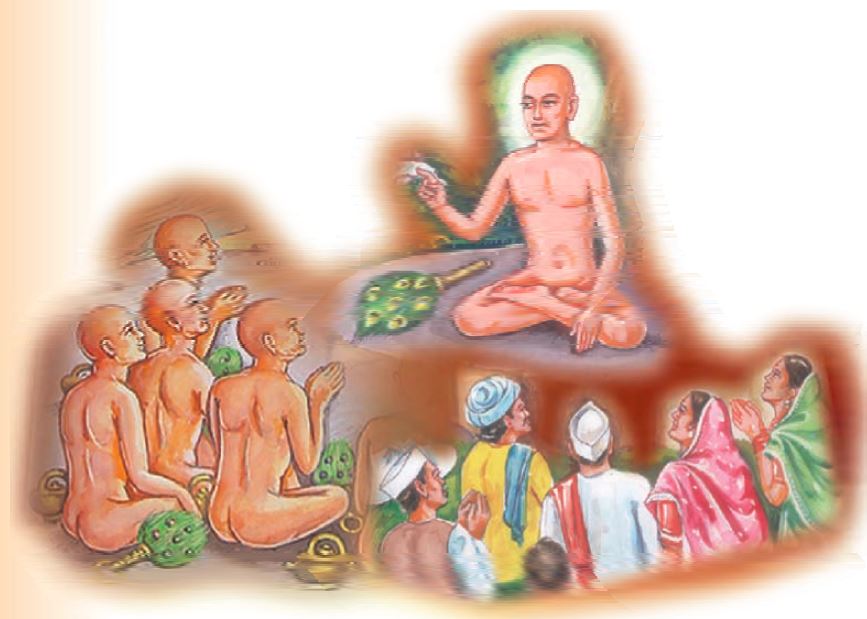
मुख्योपचार दु भेद यों बड़भागि रत्नत्रय धरैं
अरु धरेंगे ते शिव लहैं, तिन सुयश-जल-जग-मल हरैं
इमि जानि आलस हानि साहस ठानि, यह सिख आदरौ
जबलों न रोग जरा गहै, तबलौं झटिति निज हित करौ ॥१४॥
अरु धरेंगे ते शिव लहैं, तिन सुयश-जल-जग-मल हरैं
इमि जानि आलस हानि साहस ठानि, यह सिख आदरौ
जबलों न रोग जरा गहै, तबलौं झटिति निज हित करौ ॥१४॥
अन्वयार्थ : [बढ़भागि] जो महा पुरुषार्थी जीव [यों] इसप्रकार [मुख्योपचार] निश्चय और व्यवहार [दुभेद] ऐसे दो प्रकार के [रत्नत्रय] रत्नत्रय को [धरैं अरु धरेंगे] धारण करते हैं और करेंगे [ते] वे [शिव] मोक्ष [लहैं] प्राप्त करते हैं और [तिन] उन जीवों का [सुयश-जल] सुकीर्तिरूपी जल [जग-मल] संसाररूपी मैल को [हरैं] नाश करता है । [इमि] ऐसा [जानि] जानकर [आलस] प्रमाद (स्वरूप में असावधानी) [हानि] छोड़कर [साहस] पुरुषार्थ [ठानि] करके [यह] यह [सिख] शिक्षा-उपदेश [आदरौ] ग्रहण करो कि [जबलौं] जब तक [रोग जरा] रोग या वृद्धावस्था [न गहै] न आये [तबलौं] तब तक [झटिति] शीघ्र [निज हित] आत्मा का हित [करौ] कर लेना चाहिये ।
Meaning : The most fortunate persons practice the course of three jewels in its both aspects-absolute and practical. Such souls and those who will follow the way will surely attain salvation. The filth of the mundane world will be washed only by the waters of the auspicious glory of these souls. Knowing thus, by giving up indolence and gathering courage, respect the advice to achieve the spiritual wellbeing of the self without losing any time, untill disease & old age overcome you.
हेय उपादेय
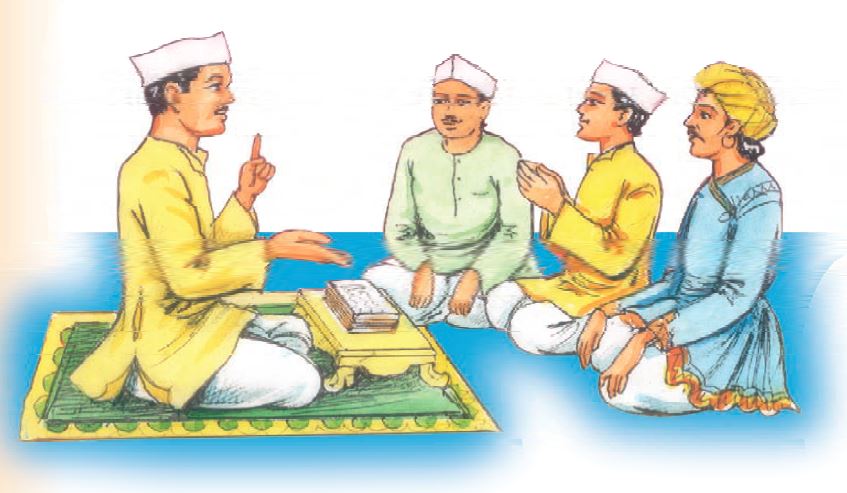
यह राग-आग दहै सदा, तातैं समामृत सेइये
चिर भजे विषय-कषाय अब तो, त्याग निजपद बेइये
कहा रच्यो पर पद में, न तेरो पद यहै, क्यों दुख सहै
अब "दौल''! होउ सुखी स्वपद-रचि, दाव मत चूकौ यहै ॥१५॥
चिर भजे विषय-कषाय अब तो, त्याग निजपद बेइये
कहा रच्यो पर पद में, न तेरो पद यहै, क्यों दुख सहै
अब "दौल''! होउ सुखी स्वपद-रचि, दाव मत चूकौ यहै ॥१५॥
अन्वयार्थ : [यह] यह [राग-आग] रागरूपी अग्नि [सदा] अनादिकाल से निरन्तर जीव को [दहै] जला रही है, [तातैं] इसलिये [समामृत] समतारूप अमृत का [सेइये] सेवन करना चाहिये । [विषय-कषाय] विषय-कषाय का [चिर भजे] अनादिकाल से सेवन किया है, [अब तो] अब तो [त्याग] उसका त्याग करके [निजपद] आत्म-स्वरूप को [बेइये] जानना चाहिये (प्राप्त करना चाहिये) । [पर पद में] पर-पदार्थों में (परभावों में) [कहा] क्यों [रच्यो] आसक्त-सन्तुष्ट हो रहा है? [पद यहै] यह पद [न तेरो] तेरा नहीं है । [क्यों दुख सहै] दुःख किसलिये सहन करता है? [दौल !] हे दौलतराम ! [अब] अब [स्वपद] अपने आत्मपद (सिद्धपद) में [रचि] लगकर [सुखी] सुखी [होउ] होओ !
[यह] यह [दाव] अवसर [मत चूकौ] न गँवाओ !
[यह] यह [दाव] अवसर [मत चूकौ] न गँवाओ !
Meaning : The feeling of attachment always burns like a fire and therefore you should enjoy the nectar of equanimity. You have been indulging in passions and sensual pleasures from very beginning. Now give up them. You should realize your own true nature (position). Why are you interested in others? It is not your nature. For what are you facing inflictions? O Doulatram! be happy by being engrossed in your own nature and do not miss this chance or opportunity.
प्रशस्ति छन्द
इक नव वसु इक वर्ष की, तीज शुक्ल वैशाख
कर्यो तत्त्व-उपदेश यह, लखि बुधजन की भाख
लघु-धी तथा प्रमादतैं, शब्द अर्थ की भूल
सुधी सुधार पढ़ो सदा, जो पावो भव-कूल ॥
कर्यो तत्त्व-उपदेश यह, लखि बुधजन की भाख
लघु-धी तथा प्रमादतैं, शब्द अर्थ की भूल
सुधी सुधार पढ़ो सदा, जो पावो भव-कूल ॥
अन्वयार्थ : पण्डित बुधजनकृत छहढाला के कथन का आधार लेकर (पंडित जनों के लिए) मैंने (दौलतराम ने) विक्रम संवत १८९१, वैशाख शुक्ला ३ (अक्षय तृतीया) के दिन इस छहढाला ग्रन्थ की रचना की है । मेरी अल्पबुद्धि तथा प्रमादवश उसमें कहीं शब्द की या अर्थ की भूल रह गई हो तो बुद्धिमान उसे सुधारकर पढ़ें, ताकि जीव संसार-समुद्र को पार करने में शक्तिमान हो ।
Meaning : The author has composed these Six Cantos based on the similar work done by Pandit Budhjan on Beashaakh Shukl Tratiyaa, Vikram Samvat 1891. The author exhibits his humility by stating that because of limited knowledge and carelessness (Pramaad), some errors might have crept in. Therefore the learned may correct them and attain power to swim this mundane ocean.
